
Welcome to the only platform where you can connect with MASLD/MASH experts in your geographic area and stay up to date with disease state education in the form of short video modules and news articles.
Thought Leader
Mission of the MASLD Community
Dedicated to fostering collaboration, driving innovation, and improving outcomes for patients living with Metabolic Associated Steatotic Liver Disease.


Engage with MASLD/MASH Experts in Your Region
Connect with regional specialists for personalized guidance, professional training, and continuous support in MASLD/MASH.


Expert Insights
Benefit from expert-driven resources, including podcasts, publications, and practical tools designed for clinicians and patients.


Tailored Education for Your Community
Join your regional community network, where education is tailored to meet local needs. Collaborate with peers from local and regional communities, share knowledge, and drive impactful changes together.
Explore Our Events
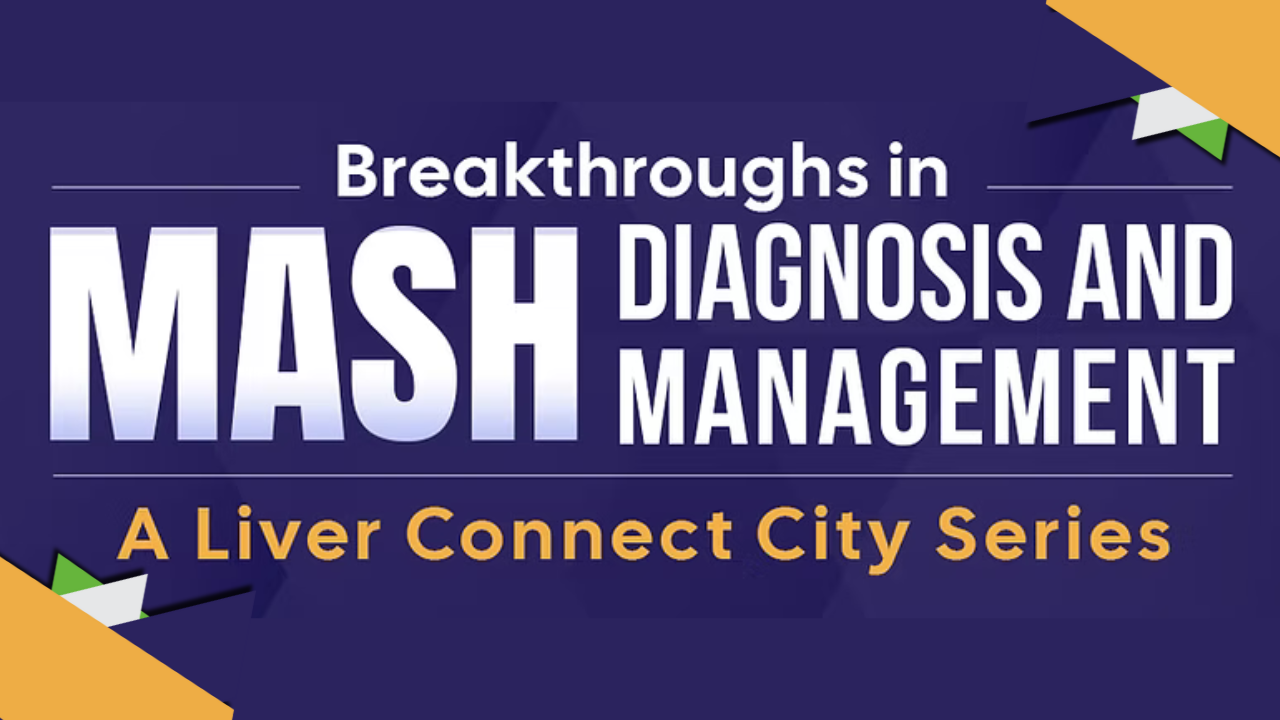
Breakthroughs in MASH Diagnosis & Management

Register to join us at a Liver Connect City Series Event, Breakthroughs in MASH Diagnosis & Management with speakers Naim Alkhouri, MD, FAASLD, Pi..
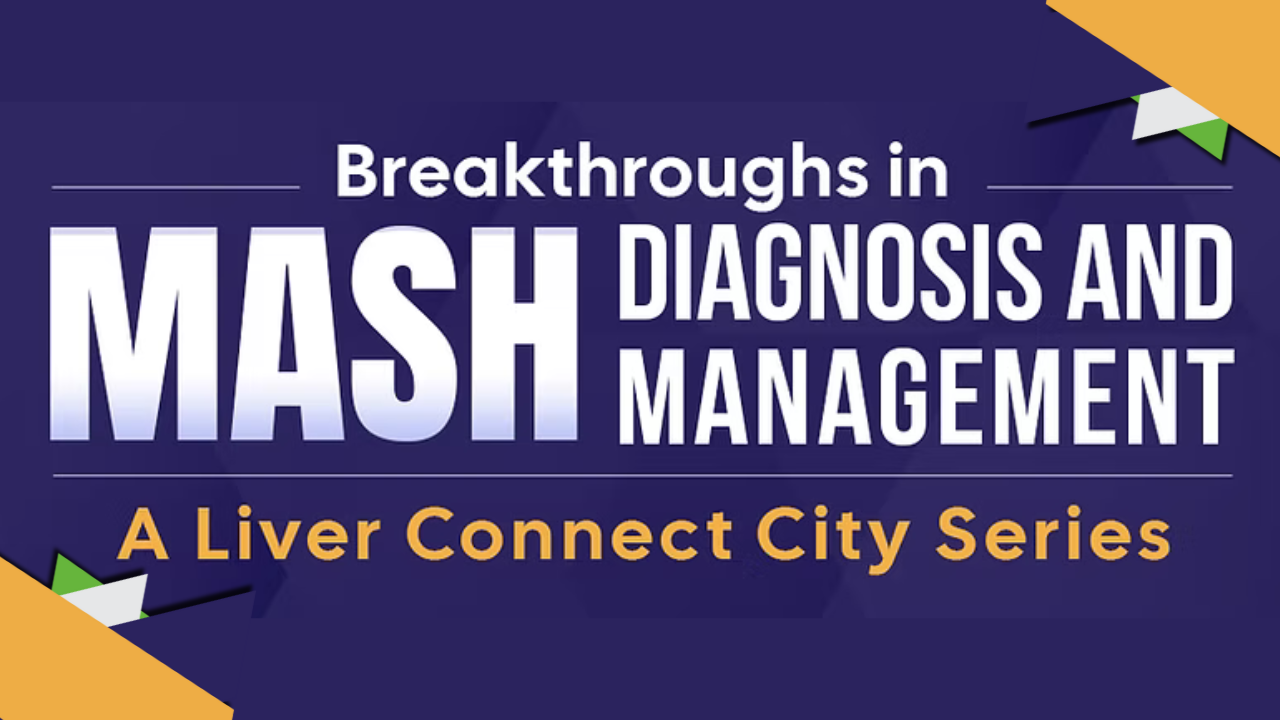
Breakthroughs in MASH Diagnosis & Management

Register to join us at a Liver Connect City Series Event, Breakthroughs in MASH Diagnosis & Management with speakers Fredric Regenstein, MD, Brian..
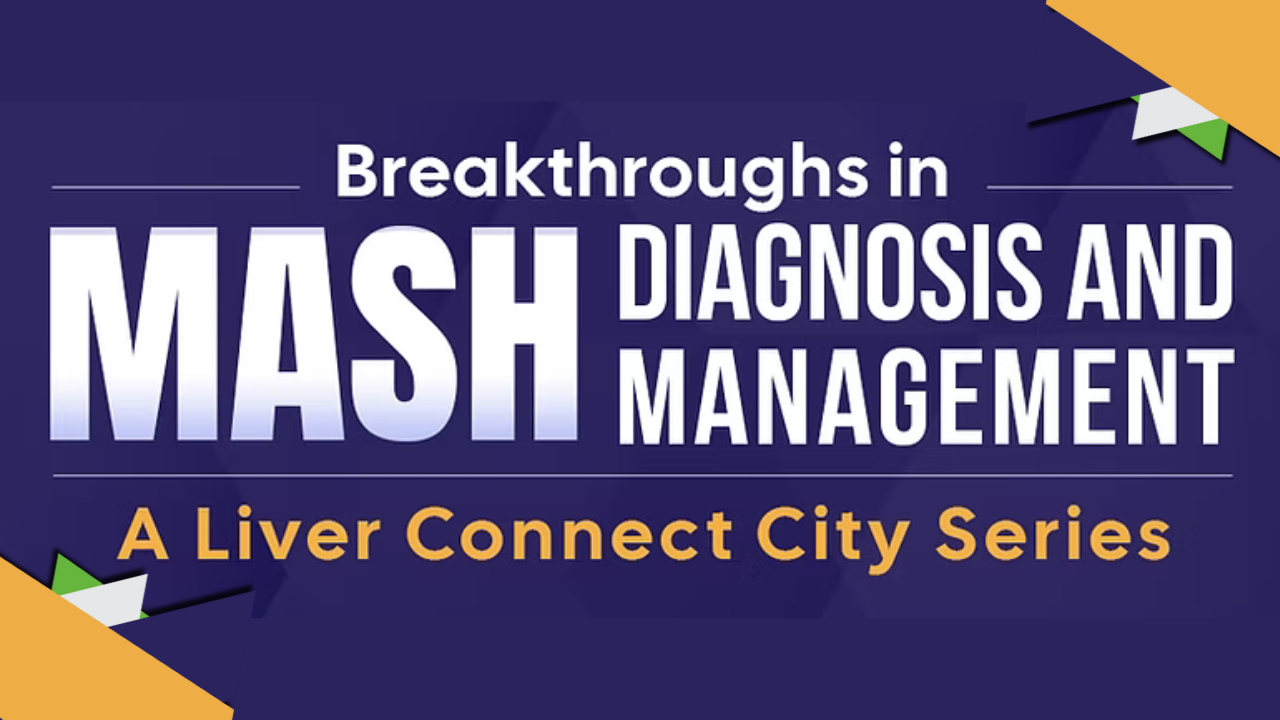
Breakthroughs in MASH Diagnosis & Management

Register to join us at a Liver Connect City Series Event, Breakthroughs in MASH Diagnosis & Management with speakers Haripriya Maddur, MD, Geoffre..
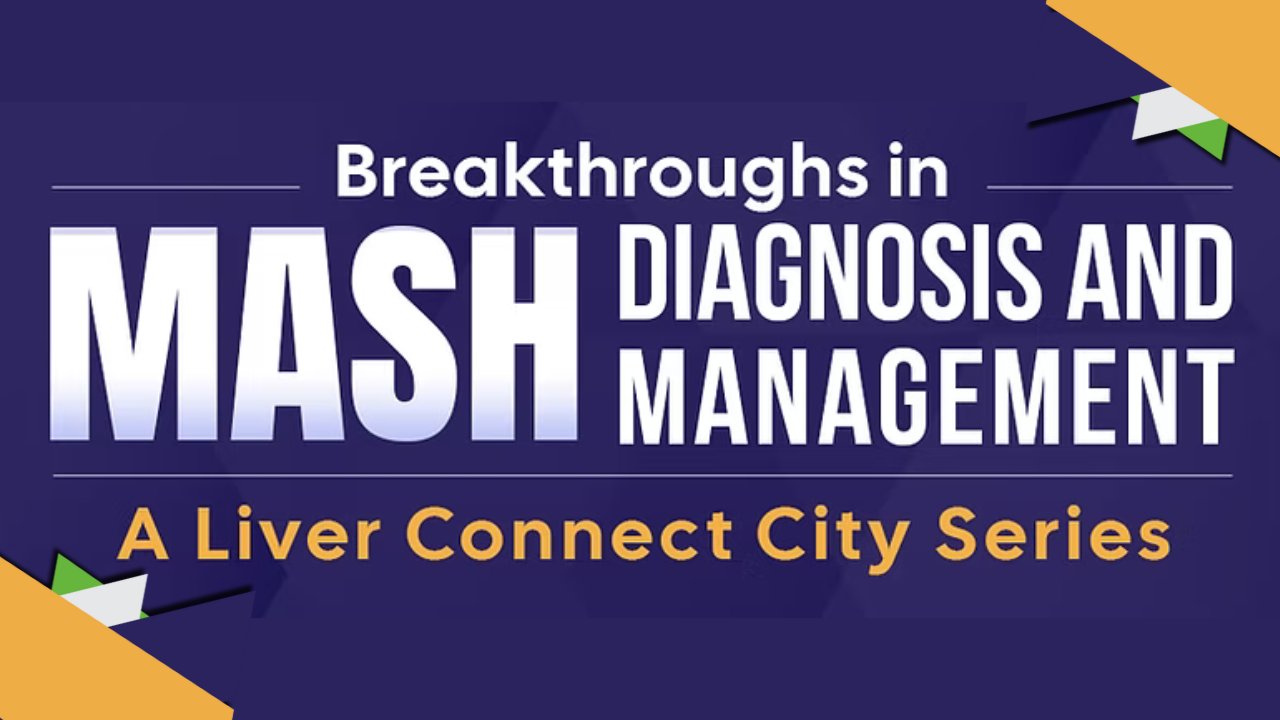
Breakthroughs in MASH Diagnosis & Management

Register to join us at a Liver Connect City Series Event, Breakthroughs in MASH Diagnosis & Management with speakers Hetal Karsan, MD, Julius Wild..
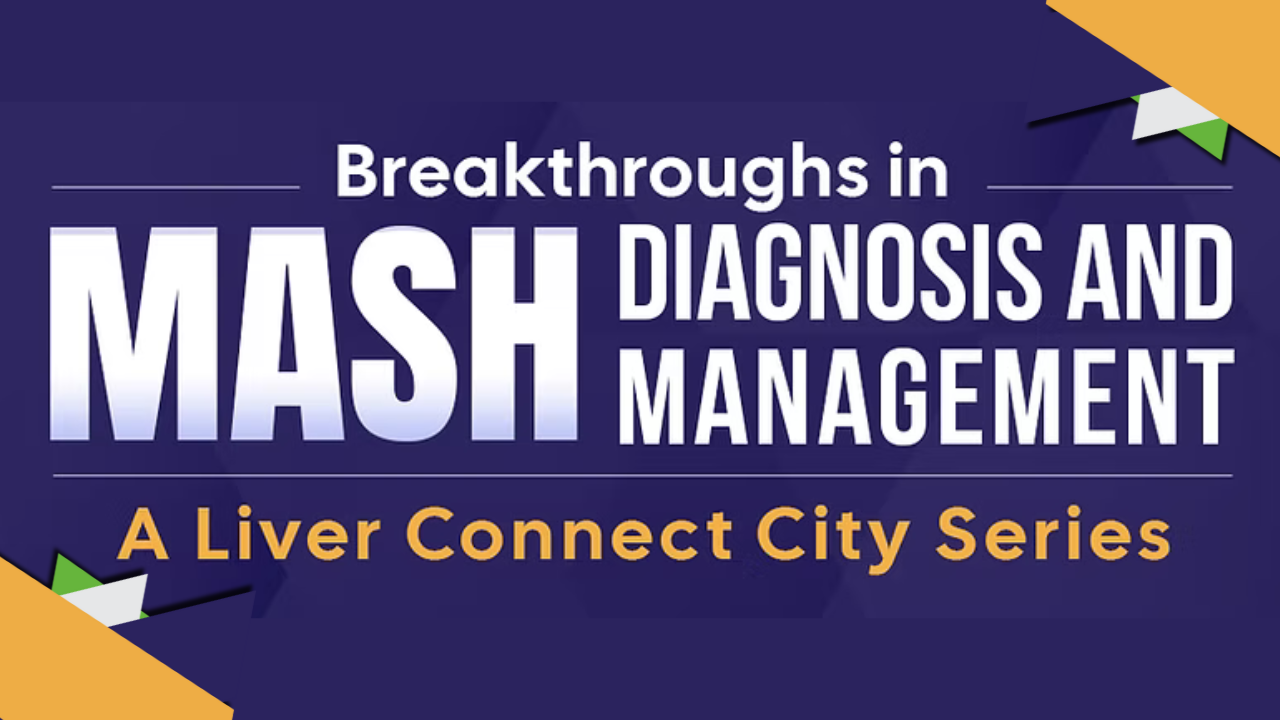
Breakthroughs in MASH Diagnosis & Management

Register to join us at a Liver Connect City Series Event, Breakthroughs in MASH Diagnosis & Management with Bradley Freilich, MD, AGAF, Steven Fla..
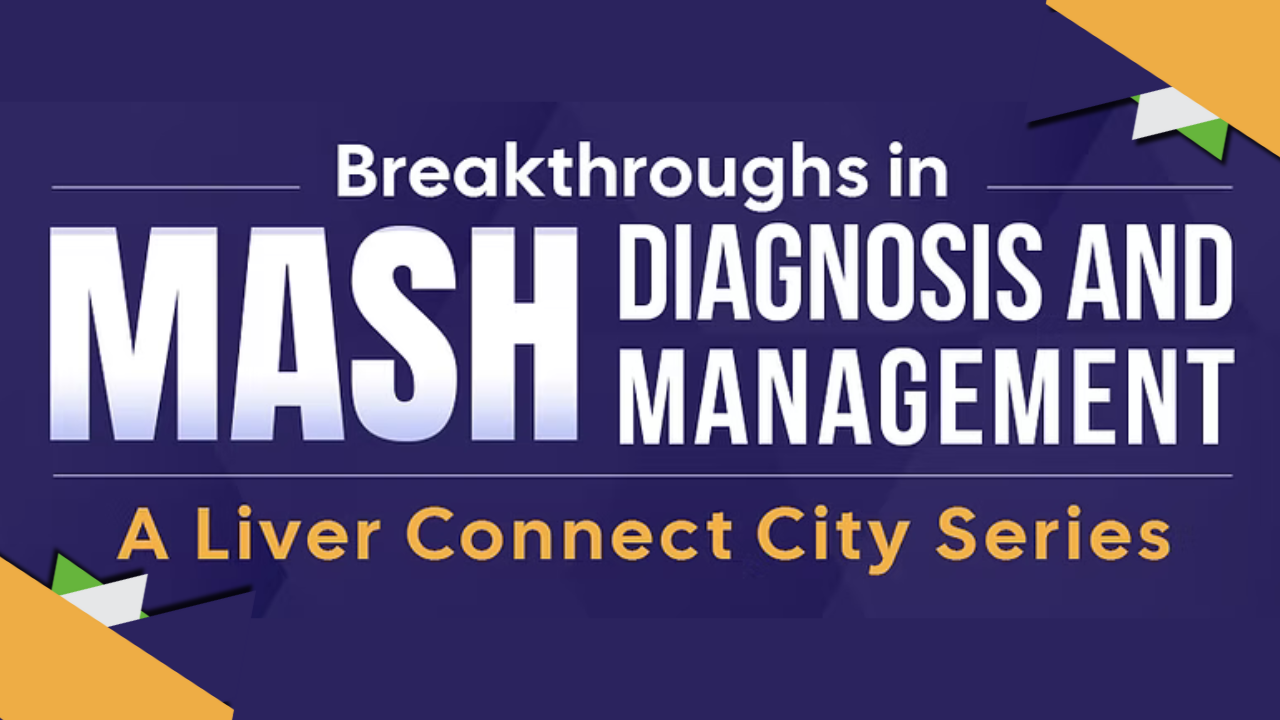
Breakthroughs in MASH Diagnosis & Management

Register to join us at a Liver Connect City Series Event, Breakthroughs in MASH Diagnosis & Management with Satheesh Nair, MD, Ziad Younes, MD, &a..
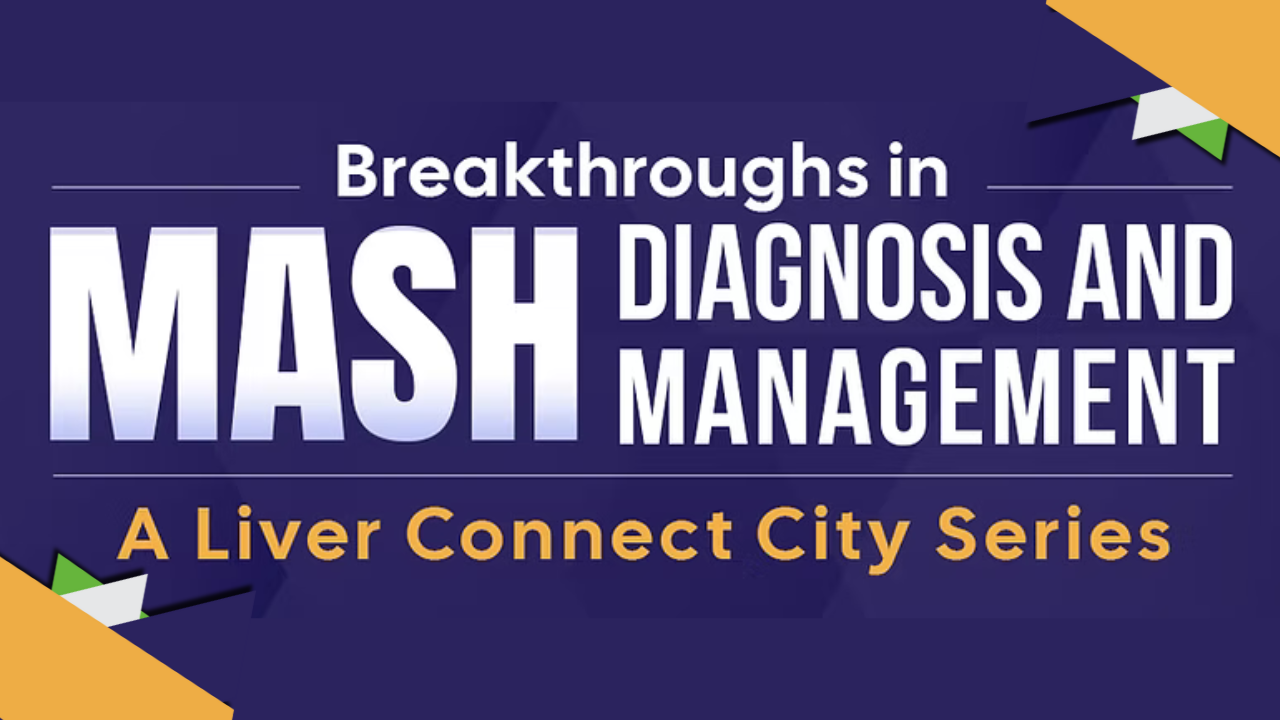
Breakthroughs in MASH Diagnosis & Management

Register to join us at a Liver Connect City Series Event, Breakthroughs in MASH Diagnosis & Management with Sammy Saab, MD, MPH, Ke-Qin Hu, MD &am..
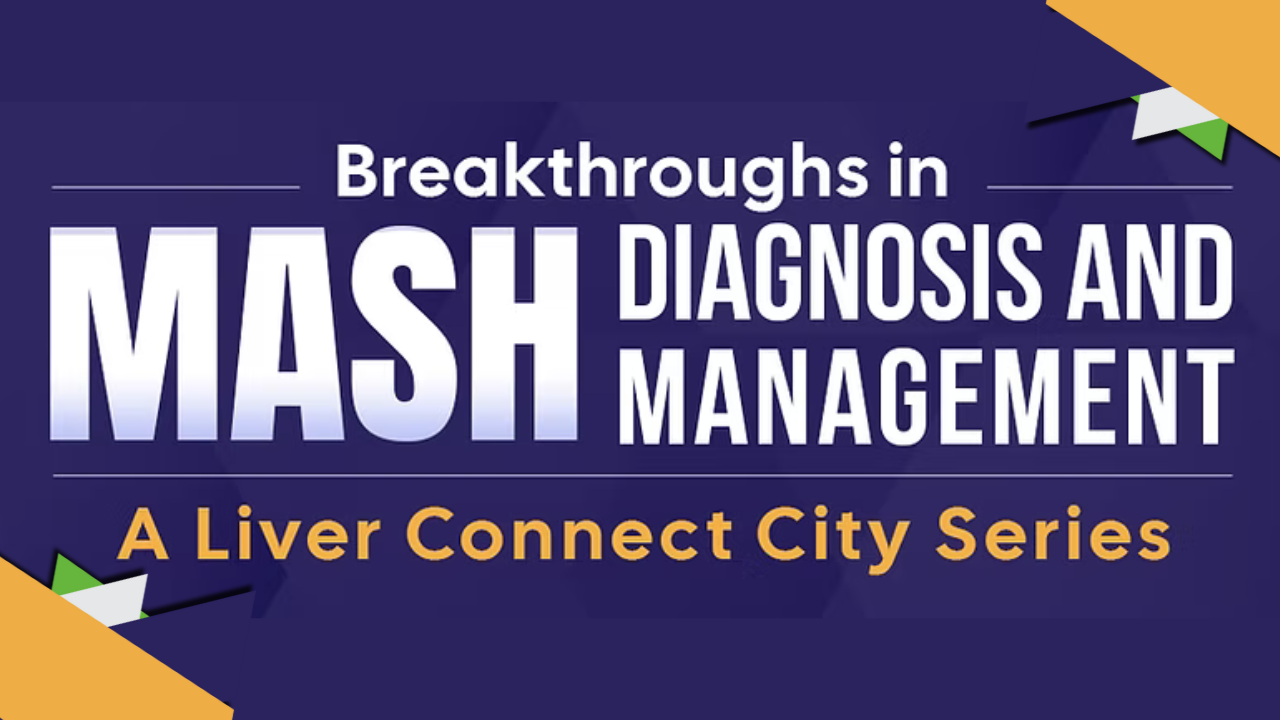
Breakthroughs in MASH Diagnosis & Management

Register to join us at a Liver Connect City Series Event, Breakthroughs in MASH Diagnosis & Management with Robert Wong, MD, M.S, Bilal Hameed, MD..
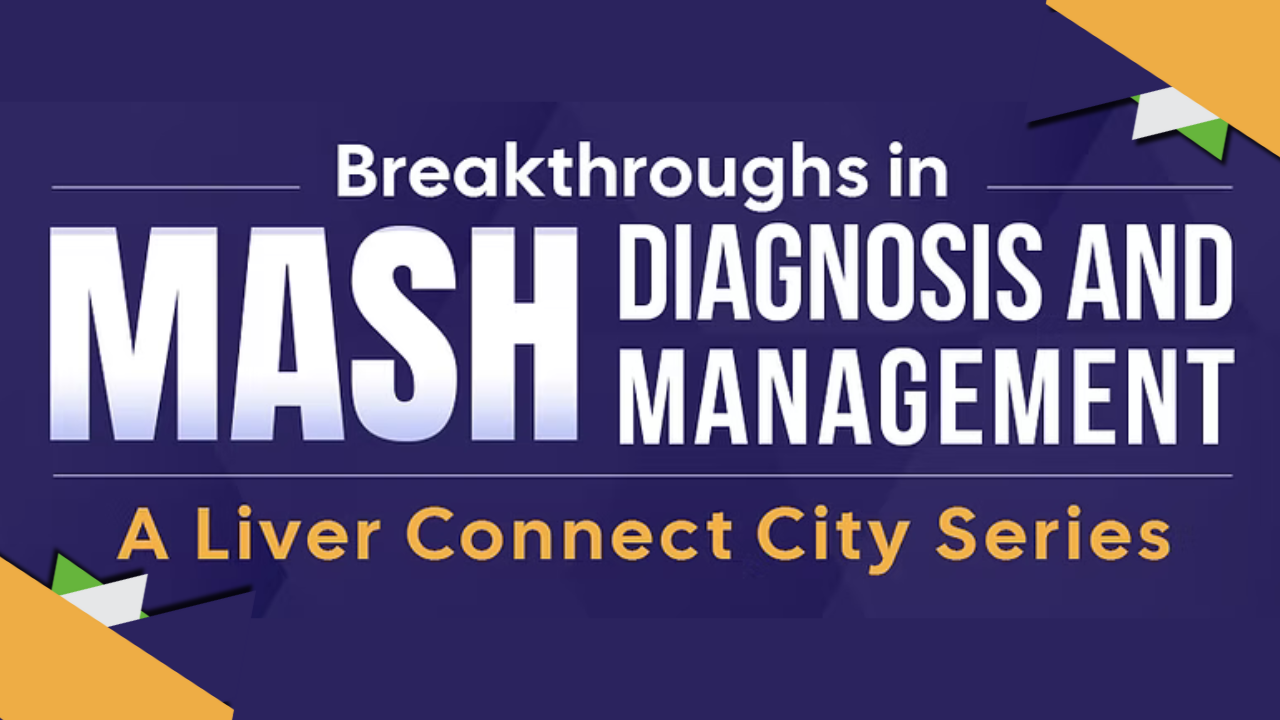
Breakthroughs in MASH Diagnosis & Management

Register to join us at a Liver Connect City Series Event, Breakthroughs in MASH Diagnosis & Management with Marina Roytman, MD, Paul Kwo, MD, &..
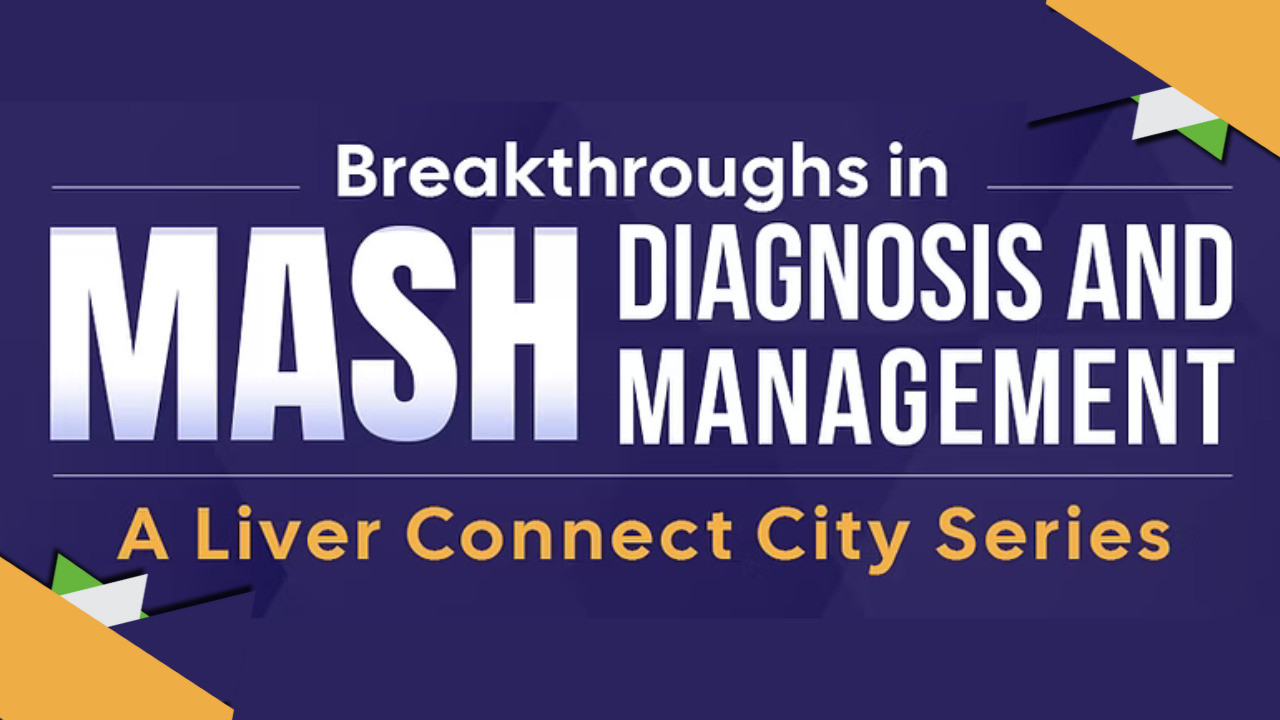
Breakthroughs in MASH Diagnosis & Management

Register to join us at a Liver Connect City Series Event, Breakthroughs in MASH Diagnosis & Management with Marcelo Kugelmas, MD, FAASLD, FACP, Ch..
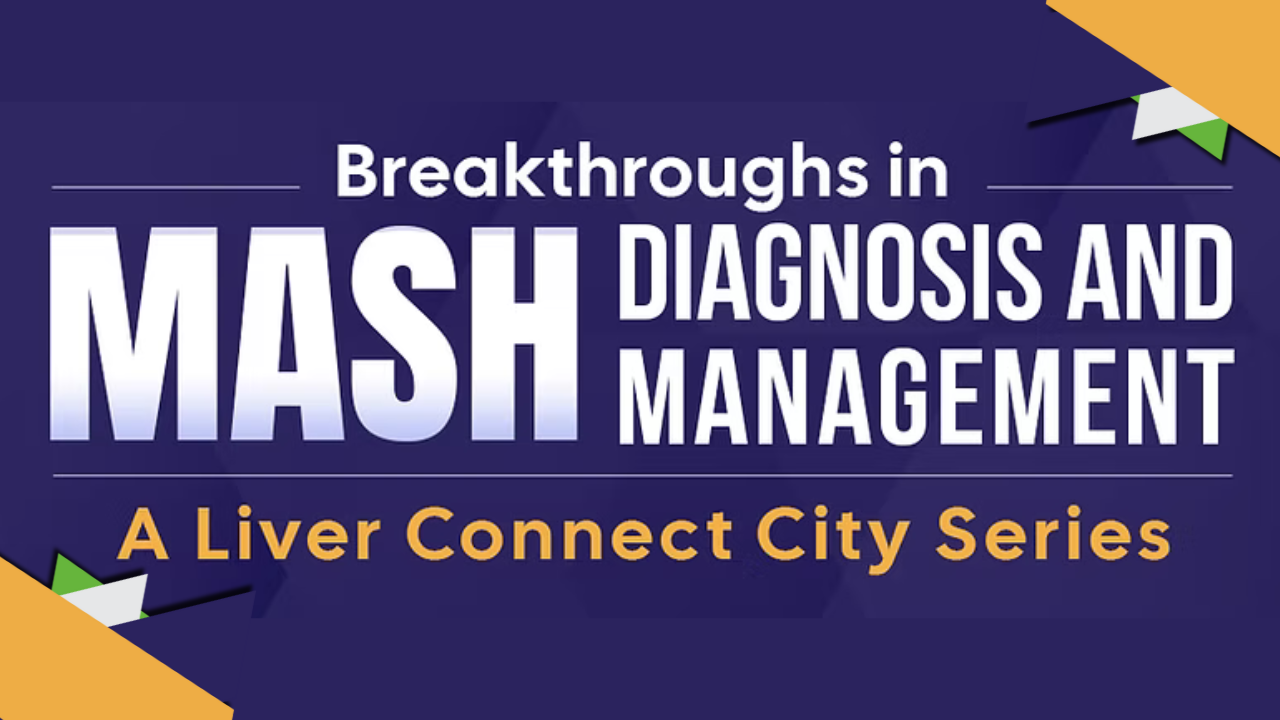
Breakthroughs in MASH Diagnosis & Management

Register to join us at a Liver Connect City Series Event, Breakthroughs in MASH Diagnosis & Management with Mazen Noureddin, MD, MHSc. &nbs..
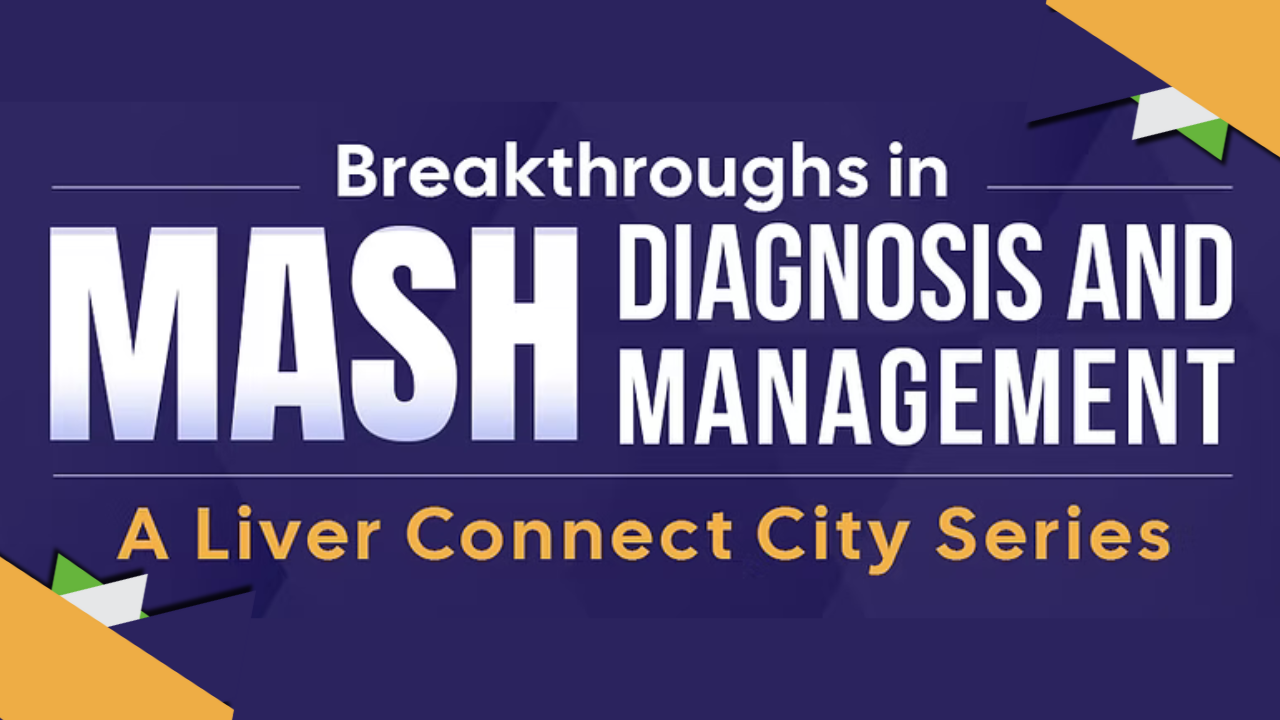
Breakthroughs in MASH Diagnosis & Management

Register to join us at a Liver Connect City Series Event, Breakthroughs in MASH Diagnosis & Management with David Bernstein, MD, Robert S. Brown, ..
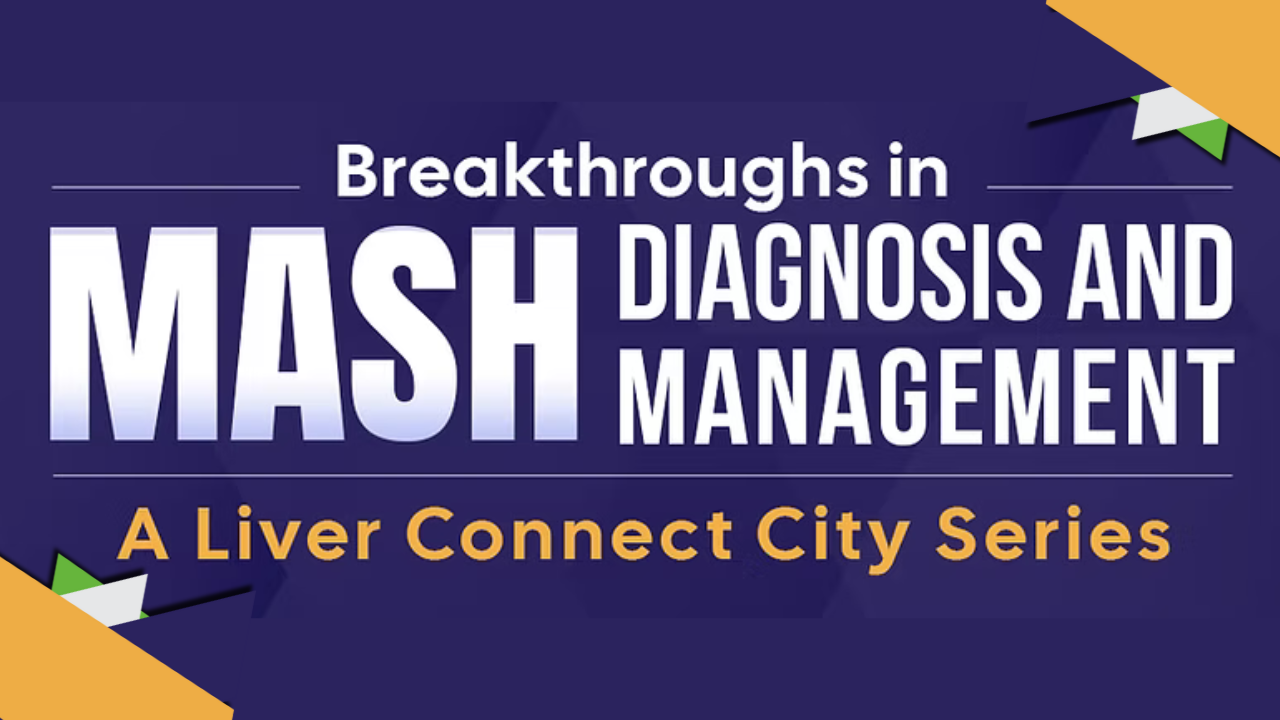
Breakthroughs in MASH Diagnosis & Management

Register to join us at a Liver Connect City Series Event, Breakthroughs in MASH Diagnosis & Management with John Binu, MD, MPH, Pierre Gholam, MD,..
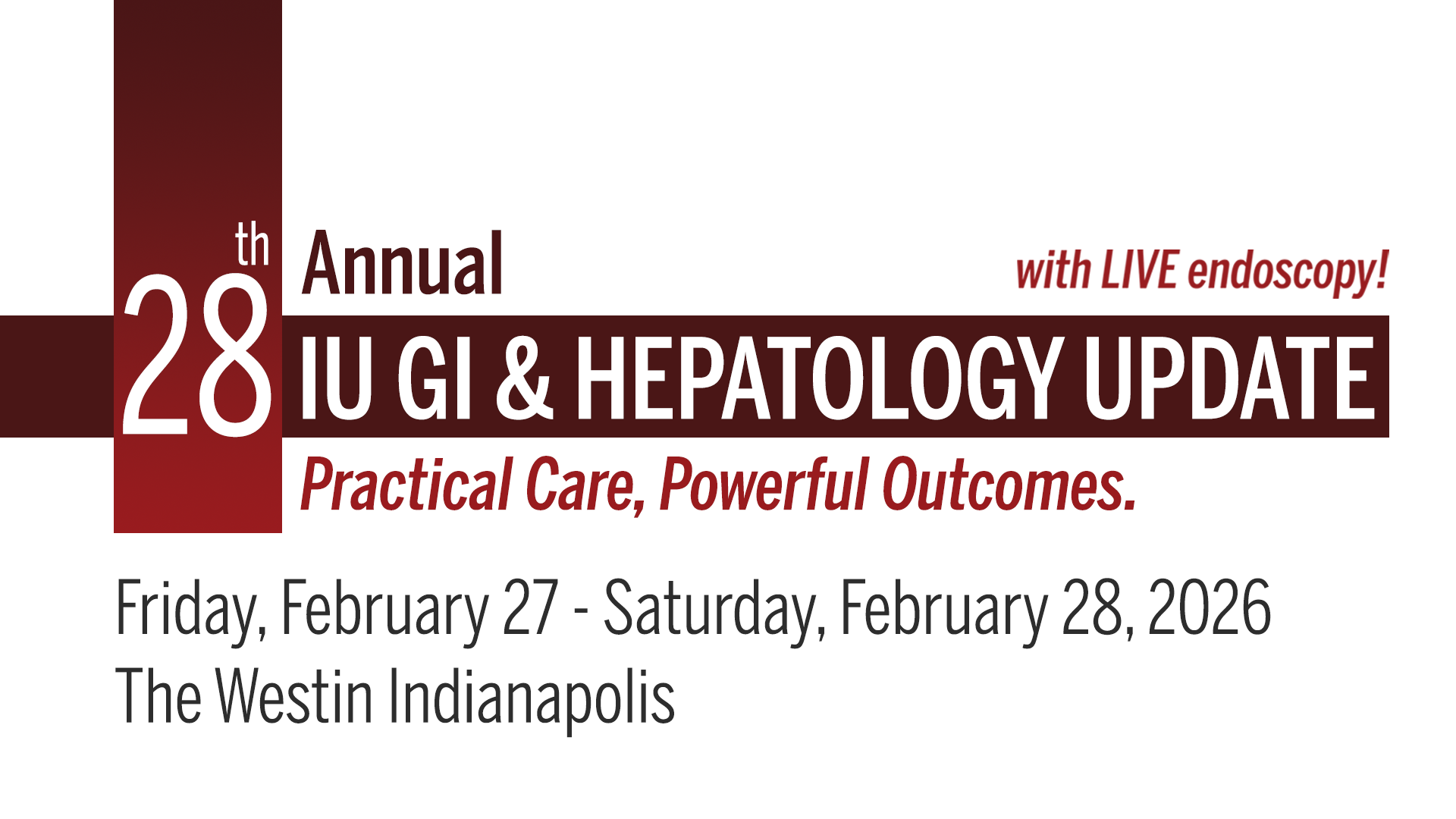
28th IU GI & Hepatology Update

The IU Gastroenterology & Hepatology Update is an annual educational program designed for physicians, advanced practice providers (APPs), nurses, ..
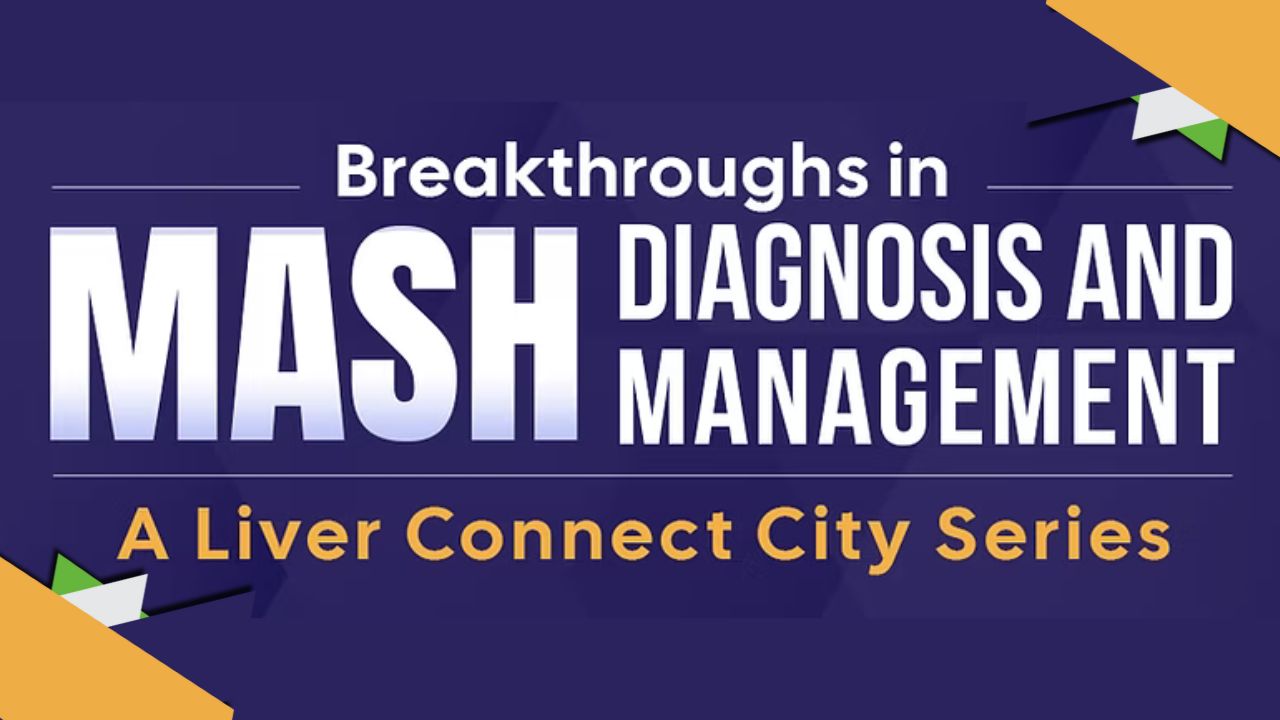
Breakthroughs in MASH Diagnosis & Management

Register to join us at a Liver Connect City Series Event, Breakthroughs in MASH Diagnosis & Management with Niharika Samala, MD...
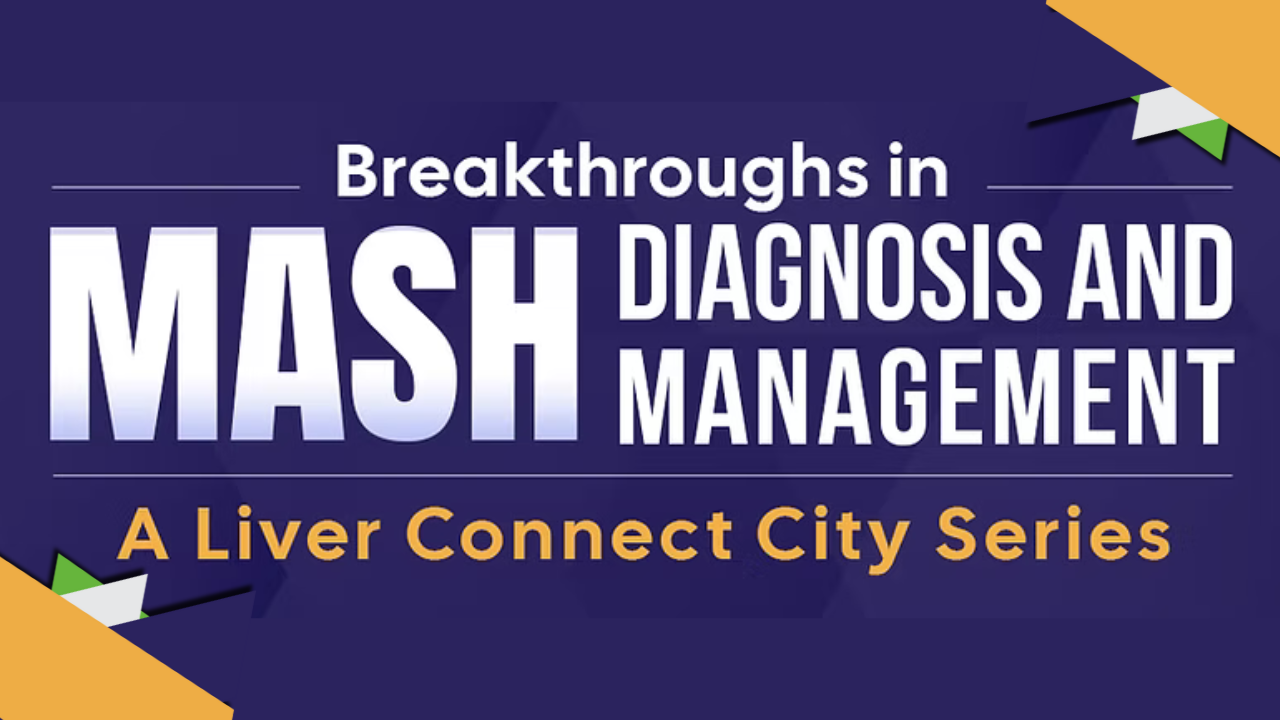
Breakthroughs in MASH Diagnosis & Management

Register to join us at a Liver Connect City Series Event, Breakthroughs in MASH Diagnosis & Management with Nancy Reau, MD, Sujit Janardhan, MD, P..
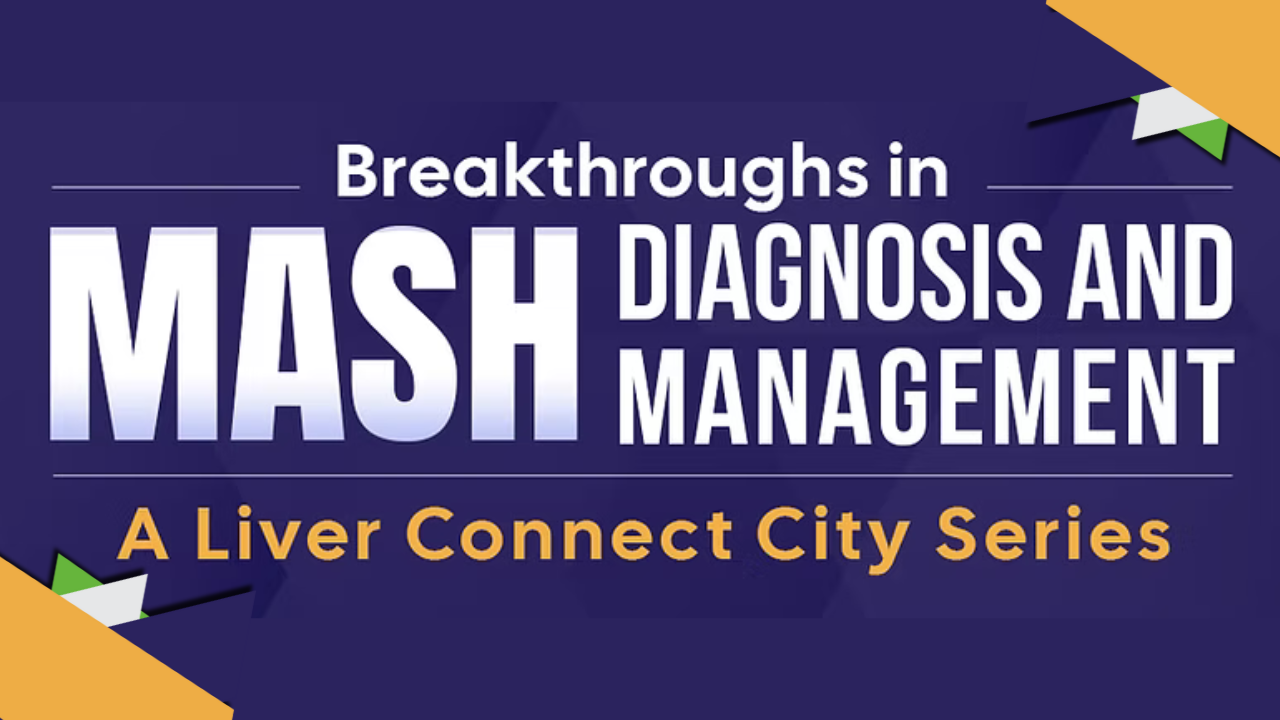
Breakthroughs in MASH Diagnosis & Management

Register to join us at a Liver Connect City Series Event, Breakthroughs in MASH Diagnosis & Management with Scott Minchenberg, MD, PhD, Michelle L..
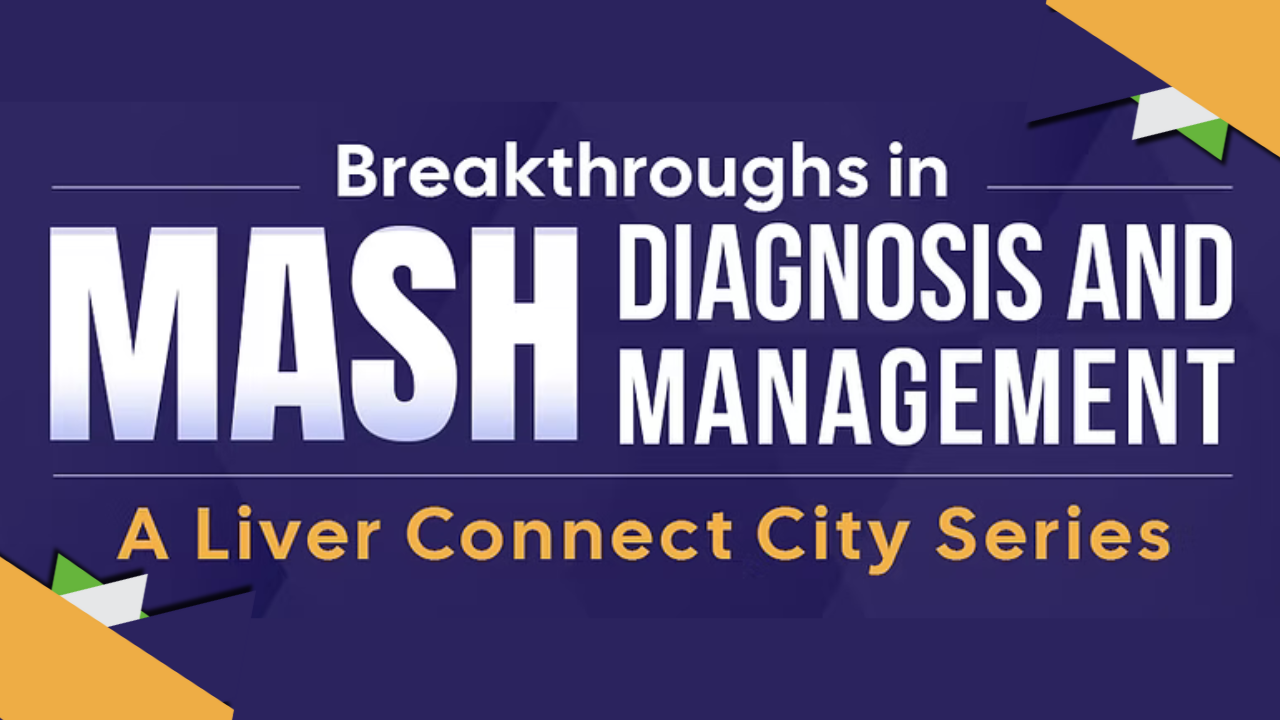
Breakthroughs in MASH Diagnosis & Management

Register to join us at a Liver Connect City Series Event, Breakthroughs in MASH Diagnosis & Management with Kimberly Brown, MD, Robert Fontana, MD..
Explore Our Events

CME EVENT
Breakthroughs in MASH Diagnosis & Management
 December 02 @ 06:30 pm - 09:30 pm EST
December 02 @ 06:30 pm - 09:30 pm EST
Register to join us at a Liver Connect City Series Event, Breakthroughs in MASH Diagnosis & Management with speakers Naim Alkhouri, MD, FAASLD, Pi..

CME EVENT
Breakthroughs in MASH Diagnosis & Management
 December 03 @ 06:30 pm - 09:30 pm CST
December 03 @ 06:30 pm - 09:30 pm CST
Register to join us at a Liver Connect City Series Event, Breakthroughs in MASH Diagnosis & Management with speakers Fredric Regenstein, MD, Brian..

CME EVENT
Breakthroughs in MASH Diagnosis & Management
 December 09 @ 06:30 pm - 09:30 pm MST
December 09 @ 06:30 pm - 09:30 pm MST
Register to join us at a Liver Connect City Series Event, Breakthroughs in MASH Diagnosis & Management with speakers Haripriya Maddur, MD, Geoffre..

CME EVENT
Breakthroughs in MASH Diagnosis & Management
 December 11 @ 06:30 pm - 06:30 pm EST
December 11 @ 06:30 pm - 06:30 pm EST
Register to join us at a Liver Connect City Series Event, Breakthroughs in MASH Diagnosis & Management with speakers Hetal Karsan, MD, Julius Wild..

CME EVENT
Breakthroughs in MASH Diagnosis & Management
 January 13 @ 06:30 pm - 09:30 pm CST
January 13 @ 06:30 pm - 09:30 pm CST
Register to join us at a Liver Connect City Series Event, Breakthroughs in MASH Diagnosis & Management with Bradley Freilich, MD, AGAF, Steven Fla..

CME EVENT
Breakthroughs in MASH Diagnosis & Management
 January 14 @ 06:30 pm - 09:30 pm EST
January 14 @ 06:30 pm - 09:30 pm EST
Register to join us at a Liver Connect City Series Event, Breakthroughs in MASH Diagnosis & Management with Satheesh Nair, MD, Ziad Younes, MD, &a..

CME EVENT
Breakthroughs in MASH Diagnosis & Management
 January 14 @ 06:30 pm - 09:30 pm PST
January 14 @ 06:30 pm - 09:30 pm PST
Register to join us at a Liver Connect City Series Event, Breakthroughs in MASH Diagnosis & Management with Sammy Saab, MD, MPH, Ke-Qin Hu, MD &am..

CME EVENT
Breakthroughs in MASH Diagnosis & Management
 January 15 @ 06:30 pm - 09:30 pm PST
January 15 @ 06:30 pm - 09:30 pm PST
Register to join us at a Liver Connect City Series Event, Breakthroughs in MASH Diagnosis & Management with Robert Wong, MD, M.S, Bilal Hameed, MD..

CME EVENT
Breakthroughs in MASH Diagnosis & Management
 January 22 @ 06:30 pm - 09:30 pm PST
January 22 @ 06:30 pm - 09:30 pm PST
Register to join us at a Liver Connect City Series Event, Breakthroughs in MASH Diagnosis & Management with Marina Roytman, MD, Paul Kwo, MD, &..

CME EVENT
Breakthroughs in MASH Diagnosis & Management
 January 29 @ 06:30 pm - 09:30 pm MST
January 29 @ 06:30 pm - 09:30 pm MST
Register to join us at a Liver Connect City Series Event, Breakthroughs in MASH Diagnosis & Management with Marcelo Kugelmas, MD, FAASLD, FACP, Ch..

CME EVENT
Breakthroughs in MASH Diagnosis & Management
 February 05 @ 06:30 pm - 09:30 pm CST
February 05 @ 06:30 pm - 09:30 pm CST
Register to join us at a Liver Connect City Series Event, Breakthroughs in MASH Diagnosis & Management with Mazen Noureddin, MD, MHSc. &nbs..

CME EVENT
Breakthroughs in MASH Diagnosis & Management
 February 10 @ 06:30 pm - 09:30 pm EST
February 10 @ 06:30 pm - 09:30 pm EST
Register to join us at a Liver Connect City Series Event, Breakthroughs in MASH Diagnosis & Management with David Bernstein, MD, Robert S. Brown, ..

CME EVENT
Breakthroughs in MASH Diagnosis & Management
 February 19 @ 06:30 pm - 09:30 pm EST
February 19 @ 06:30 pm - 09:30 pm EST
Register to join us at a Liver Connect City Series Event, Breakthroughs in MASH Diagnosis & Management with John Binu, MD, MPH, Pierre Gholam, MD,..

CME EVENT
28th IU GI & Hepatology Update
 February 27 @ 07:00 am - 03:25 pm EST
February 27 @ 07:00 am - 03:25 pm EST
The IU Gastroenterology & Hepatology Update is an annual educational program designed for physicians, advanced practice providers (APPs), nurses, ..

CME EVENT
Breakthroughs in MASH Diagnosis & Management
 March 04 @ 06:30 pm - 09:30 pm EST
March 04 @ 06:30 pm - 09:30 pm EST
Register to join us at a Liver Connect City Series Event, Breakthroughs in MASH Diagnosis & Management with Niharika Samala, MD...

CME EVENT
Breakthroughs in MASH Diagnosis & Management
 March 11 @ 06:30 pm - 09:30 pm CDT
March 11 @ 06:30 pm - 09:30 pm CDT
Register to join us at a Liver Connect City Series Event, Breakthroughs in MASH Diagnosis & Management with Nancy Reau, MD, Sujit Janardhan, MD, P..

CME EVENT
Breakthroughs in MASH Diagnosis & Management
 March 25 @ 06:30 pm - 09:30 pm EST
March 25 @ 06:30 pm - 09:30 pm EST
Register to join us at a Liver Connect City Series Event, Breakthroughs in MASH Diagnosis & Management with Scott Minchenberg, MD, PhD, Michelle L..

CME EVENT
Breakthroughs in MASH Diagnosis & Management
 March 26 @ 06:30 pm - 09:30 pm EST
March 26 @ 06:30 pm - 09:30 pm EST
Register to join us at a Liver Connect City Series Event, Breakthroughs in MASH Diagnosis & Management with Kimberly Brown, MD, Robert Fontana, MD..
Featured MASLD/MASH Educators

Elizabeth Alqueza
PA-C
Elizabeth Alqueza, PA-C is a board certified Physician Associate at Beth Israel Deaconess Medical Center (BIDMC) in Boston, Massachusetts. She graduated from the University of Florida in 2004 with a Master of Physician Assistant Studies degree and subsequently completed the AASLD NP/PA Clinical Hepatology Fellowship. Elizabeth has worked in a variety of inpatient and outpatient settings with a strong commitment to patient care. Currently working at BIDMC Liver Center, Elizabeth has 5 years of dedicated experience in Hepatology. Her practice focuses primarily on steatotic liver disease, including Metabolic Dysfunction-Associated Steatotic Liver Disease (MASLD) and Metabolic Dysfunction-Associated Steatohepatitis (MASH). Elizabeth is an active member of Gastroenterology and Hepatology Advanced Practice Providers.

Michelle Barnett
PA-C, MPAS, DFAAPA
Michelle Barnett is a highly experienced physician assistant specializing in patient-focused and evidence-based hepatology at Peak Gastroenterology Associates in Colorado Springs, Colorado. The most rewarding part of her position includes educating patients and collaborating with other GI advanced practice providers to enhance care for the growing MASLD/MASH population. She is now a subinvestigtor for hepatology clinical trials with Peak in Colorado Springs. With over 30 years in the GI and liver communities, she has held leadership roles, including serving as President of the Colorado Academy of Physician Assistants (CAPA) and receiving CAPA's Physician Assistant of the Year award. She is a national speaker and has given lectures for the AAPA, GHAPP and AANP. A graduate of Wichita State University and the University of Nebraska, Michelle has been recognized with the DFAAPA distinction and honors such as the Crohn’s and Colitis Foundation's IBD internship and the International Foundation for Gastrointestinal Disorders Ally Award. Passionate about holistic care, she incorporates lifestyle strategies like nutrition, yoga, and meditation into her practice. Outside of work, Michelle enjoys hiking, travel, musical theater, and supporting her favorite Colorado sports teams.

Sherona Bau
NP
Sherona Bau graduated from University of California, Los Angeles in 2008, with Master of Science in Nursing dual program specialized in Acute Care Nurse Practitioner and Clinical Nurse Specialist. In 2010, she has joined UCLA Pfleger Liver Institute and Asian Liver Cancer Center working as an outpatient Nurse Practitioner specializing in liver diseases including viral hepatitis, hepatobiliary diseases, alcohol related liver diseases, Metabolic Dysfunction-Associated Steatotic Liver Disease/Steatohepatitis, autoimmune liver diseases, and hepatocellular carcinoma. Since 2016, she has been a guest lecturer at UCLA School of Nursing for Master Entry Clinical Nurse (MECN) and MSN Adult/Gero Acute Care program. She is also a preceptor for Adult/Gero Acute Care Program. She participated in Hepatitis C Screening in the Community Churches to promote awareness of hepatitis C and the importance of treatment of hepatitis C. She also participates in Patient Symposium at UCLA to give a lecture to update care of the liver transplant patients. She is also a faculty of Gastroenterology Hepatology Advanced Practice Provider (GHAPP) since 2018 and a speaker for both GHAPP National meeting and Regional GHAPP in Los Angeles. Since 2013, she has published total 14 research papers and case report including the most recent three are Recommendations for the Management of MASH by Advanced Practice Providers in the US, Clinicians and Patients Confront Practical Issues in Wilson Disease, and Overview of chronic Hepatitis B management.

Maribeth Capuno
DNP, RN, ANP-BC
Maribeth Capuno obtained her Master of Science in Nursing from Emory University in 1996. She was then certified as an Adult Nurse Practitioner. She worked as a Nurse Practitioner in Cardiology for over 20 years, specializing in Heart Failure. In 2019, she advanced her education by obtaining her Doctor of Nursing Practice from the University of Virginia. In 2021, she relocated to Richmond Virginia and took a position in the Hepatology department at the Richmond Veteran's Affairs Medical Center. In this position, her focus has been on patients with MASLD/MASH throughout the spectrum of their disease. She works with her patients to develop an individualized plan of care to assist them in controlling their metabolic conditions which are contributing to their liver disease. She also is a Sub-Investigator on multiple MASLD/MASH clinical trials.

Summer Collier
MSN, FNP-BC
Summer Collier is a nurse practitioner with advanced expertise in hepatology and a strong commitment to evidence-based, multidisciplinary care. At UC San Diego Health, she provides comprehensive management for patients with chronic liver disease, including viral hepatitis, autoimmune hepatitis, alcohol-associated liver disease, and metabolic dysfunction–associated steatotic liver disease (MASLD). Collier is actively engaged in clinical research and has participated in multidisciplinary studies on liver fibrosis, steatosis, and treatment protocols for hepatitis C and alcohol use disorder. Her scholarly work focuses on improving transitions of care for patients with cirrhosis and expanding access to pharmacologic treatments for patients with alcohol use disorder. A recognized leader in the field, Collier has presented at national conferences including The Liver Meeting (AASLD), Digestive Disease Week (DDW), and GHAPP, speaking on topics such as cirrhosis care, hepatology red flags, and advanced practice provider leadership. She previously served as Chair of the Advanced Practice Council at UC San Diego Health, driving initiatives that elevated APP visibility and impact within the organization. Before joining UC San Diego Health, she was a family nurse practitioner and HIV specialist with Family Health Centers of San Diego. She also has prior experience as a registered nurse. Collier completed a Master of Science in Nursing degree from University of San Diego and will complete the Doctor of Nursing Practice degree from University of California, Los Angeles in June 2025. She is certified by the American Nurses Credentialing Center.

Jessica Crimaldi
MSN, NP-C, CMSRN
Jessica Crimaldi, MSN, APRN,CNP, CMSRN was born and raised in the greater Cleveland area. She attended Cleveland State University for her BSN; during her time at CSU she had the opportunity to work at The Cleveland Clinic Foundation in a 3-year internship entitled the "Nursing Experiential Program." In this role she had the opportunity to learn many of the roles on a typical nursing unit while working 1 year as a Unit Secretary, 1 year as a Nurse Assistant and 1 year as a Nurse Intern. She started her nursing career on an inpatient Internal Medicine and Telemetry Teaching Unit where she worked as an RN while completing her MSN at the University of Akron. Since graduation in 2015 she has worked as a Nurse Practitioner in the Department of Gastroenterology, Hepatology and Nutrition seeing inpatients with gastrointestinal and liver disorders at The Cleveland Clinic Foundation. In addition, to her clinical role, she is also the Manager for over 50 Gastroenterology, Hepatology and Nutrition APPs. She is the Co-Director for the nation's first Inflammatory Bowel Disease APP Fellowship which is in its third year. She has presented nationally and published in The Journal for Nurse Practitioners (JNP). She is Faculty for Gastroenterology and Hepatology Advanced Practice Providers (GHAPP) National Organization and Milestone APP. When she is not busy with work Jessica is a wife, parent to 2 young children and dog mom. She is a foster parent and passionate about improving the foster care system. She enjoys being outdoors, hiking and spending time with family and friends.

Jeremy Davis
ACNP-BC
Jeremy Davis ACNP is a board-certified acute care nurse practitioner who has been practicing in the focus of hepatology at GastroIntestinal Specialists A.M.C. since 2012. Jeremy’s areas of interest include MASLD, MASH, Hepatitis B, Hepatitis C, cholestatic liver disease, and autoimmune liver disease. Jeremy has been an active faculty ambassador of Gastroenterology & Hepatology Advanced Practice Providers (GHAPP) since 2019 and is a lecturer at both regional and national conferences. Jeremy is also an Associate member of the American Association for the Study of Liver Diseases (AASLD) since 2014. Jeremy received his Bachelor of Science degree and Master of Science Degree in Nursing from Northwestern State University in Natchitoches, Louisiana. Jeremy’s hobbies include spending time with his family, cooking and traveling.

Sarah Dawkins
FNP-C, MSN, RN
Sarah Dawkins, FNP-C, is a family nurse practitioner specializing in general and transplant hepatology at Duke University Medical Center, where she has practiced since 2017. She holds a BS in Biology and a BA in Romance Languages from the University of North Carolina at Chapel Hill. Sarah completed the Accelerated Bachelor of Science in Nursing (ABSN) program at Duke University and worked in the Neuroscience ICU at Duke while earning her Master of Science in Nursing (MSN). She became a certified family nurse practitioner in 2015 and initially worked in a private gastroenterology practice before joining Duke Gastroenterology. Her clinical interests include autoimmune liver disease, transplant hepatology and metabolic dysfunction-associated steatotic liver disease (MASLD). Sarah currently serves as the Advanced Practice Provider (APP) Team Lead for the GI Division at Duke. Outside of work, she enjoys traveling, trying new restaurants, attending fitness classes, cheering on the UNC Tar Heels, and spending time with her three young children and their orange cat, Zeus.

Anthony Derencius
MPAS, PA-C
Anthony Derencius, PA-C is a former U.S. Army medic and a 2010 honor graduate of the military’s Interservice Physician Assistant Program. During his 11 years in the Army, he provided care to patients and soldiers around the world, including deployments to Afghanistan and Iraq. After leaving the Army, PA-C Derencius focused his clinical career in the gastroenterology and hepatology field. He has worked in private practice GI in Hawaii and in both general and transplant hepatology in San Antonio, gaining extensive outpatient and inpatient experience. In 2024, he joined Pinnacle Clinical Research, bringing a wealth of clinical expertise to his role as an investigator in many clinical trials for MASLD and other liver diseases. In 2018, he completed a one-year American Association for the Study of Liver Disease (AASLD) Foundation NP/PA Clinical Hepatology Fellowship. He is also an active member of several medical societies, including the American College of Gastroenterology (ACG) and the AASLD.

Stacie Egan
DNP, FNP-C
Stacie Egan, DNP, FNP-C, is a Family Nurse Practitioner specializing in gastroenterology, practicing with the Ogden Clinic in Utah. Born and raised in the Ogden area, she completed her Bachelor of Science in Nursing at Weber State University, graduating summa cum laude. She went on to earn her Master of Science in Nursing from the University of Cincinnati, and most recently her Doctor of Nursing Practice degree, which she obtained in 2022. Stacie joined Ogden Clinic in 2017 and works primarily through the Layton Specialty location, where she focuses on digestive health, disease prevention, and helping patients improve quality of life through clinical care and education. Her passion for gastroenterology stems from her strong belief in the impact of preventative health and the importance of gut health in overall wellness. Beyond her clinical work, Stacie values a patient-centered approach—listening to patients, addressing their concerns, and applying her knowledge to support them in achieving better health outcomes. She resides locally, is married, and in her free time enjoys Utah’s outdoor lifestyle, including trail running, enjoying natural areas like Snowbasin, and participating in the Ogden Marathon.

Melissa Franco
PA-C, MMS
Melissa Franco is a Physician Associate at the University of Miami- specializing in the management of patients with liver diseases, ranging from acute hepatitis to complex chronic conditions such as cirrhosis and liver cancer. With a strong focus on MASH, autoimmune hepatitis, PBC, viral hepatitides, and cirrhosis- Melissa is dedicated to delivering compassionate, comprehensive care tailored to each patient's unique needs. She is deeply committed to patient education, and strives to empower individuals to take an active role in their health journey, fostering collaboration, and confidence at every stage of care.

Jennifer Geremia
PA-C
Jennifer Geremia, PA-C, is a practicing Physician Assistant in outpatient Gastroenterology at Brigham and Women's Hospital in Boston. With GI experience for 15 years including community GI care in RI and currently tertiary care. In addition to clinical practice she enjoys educating both her peers and future PAs. Jennifer currently teaches at UNE, MCPHS and MGH PA programs. She is also on the Education committee and faculty for GHAPP and is actively working on the AGA APP task force as well as an APP contributor to ASGE .

HoChong Gilles
DNP, FNP-BC, AF-AASLD
HoChong Gilles earned dual Bachelor of Science degrees in Biology and Nursing, followed by a Master of Science in Nursing from Virginia Commonwealth University. In 2018, she completed her Doctorate in Nursing Practice at the University of Virginia. With over 25 years of experience as a Nurse Practitioner specializing in hepatology, Dr. Gilles currently serves as the Clinical Program Director for the Gastroenterology and Hepatology Division and Assistant Director of GI Research in Richmond, Virginia. Her clinical and research interests encompass metabolic dysfunction associated steatotic liver disease (MASLD/MASH), portal hypertension, liver transplantation, and hepatocellular carcinoma. An active member of the liver disease community, she is proud to hold the designation of Associate Fellow with the American Association for the Study of Liver Disease (AASLD).

Elizabeth Goacher
PA-C
Elizabeth Goacher is a Physician Assistant with Duke University Medical Center, Department of Medicine, Gastroenterology Division, Duke Liver Center, April 2001 to the present. Her pronouns are she/her. She is currently engaged in full time clinical practice in Hepatology. Her clinical work encompasses the full spectrum of liver disease patient population, from early stage disease to end of life, with a particular interest in portal hypertension. She served as Team Lead for the Duke Division of Gastroenterology Advanced Practice group of 25 Advanced Practice Providers 2014-2023. She is also lecturer and preceptor at Duke University School of Medicine Physician Assistant Program. Elizabeth graduated from the Duke University School of Medicine Physician Assistant Program in 1998 after earning her Bachelor of Arts from University of North Carolina at Chapel Hill in 1991. She is past Chair of the Hepatology Associates Committee of the American Association for the Study of Liver Diseases and was a member of the inaugural class of Associate Fellows of AASLD in 2020. When she is not at work, she maintains a health boundary from technology (aka EPIC) and spends as much time outdoors as possible. When asked to design and implement her dream job, she would own and operate a cocktail and tapas venue while instructing fitness classes on a large piece of lakeside property in North Carolina alongside her canine rescue, foster and retraining agency.

Ellie Gonyeau
NP
Ellie Gonyeau is a board-certified Nurse Practitioner specializing in gastroenterology at Beth Israel Deaconess Medical Center (BIDMC) in Boston, Massachusetts. She earned her Nurse Practitioner degree from Simmons University and has been practicing since 2020. Ellie is affiliated with Cape Cod Hospital and Beth Israel Deaconess Medical Center, providing comprehensive care to patients with various gastrointestinal conditions. She is committed to delivering patient-centered care and building long-term, trusting relationships with her patients.

Tina Gregg
NP-C
Tina Marie Gregg, NP-C, is a board-certified nurse practitioner specializing in gastroenterology with a particular focus on liver disease. She serves as The Liver Clinic Specialist at GI Associates & Endoscopy Center in Flowood, Mississippi, where she provides comprehensive care for patients with conditions such as cirrhosis, fatty liver disease, hepatitis, and other chronic liver disorders. Tina earned her Master of Science in Nursing degree from University of Mississippi Medical Center and has been certified by the American Academy of Nurse Practitioners since 2007. At GI Associates, she is actively involved in clinical care, coordinating diagnostic evaluations, treatment plans, and long-term disease management. She also serves as a Sub-investigator within the Research Department. Known for her compassionate and thorough approach, Tina is dedicated to helping patients understand their conditions and treatment options while ensuring close follow-up and ongoing support.

Janet Gripshover
DNP, FNP-BC, MBA
Janet Gripshover, DNP, FNP-BC, MBA, AF-AASLD, is a highly experienced Family Nurse Practitioner and Nurse Manager for Cedars-Sinai’s Liver Transplant Program in Los Angeles. With over 15 years of clinical and leadership expertise in hepatology, Dr. Gripshover is recognized for her commitment to advancing the role of Advanced Practice Providers (APPs) in liver care. She has led numerous initiatives to foster APP education and collaboration, including founding the APP HCV Consortium in Baltimore, MD, and creating the GI APP Grand Rounds series at Geisinger Wyoming Valley in Wilkes-Barre, PA. In addition to speaking at national conferences, Dr. Gripshover has developed and delivered a wide range of educational and professional development seminars for non-physician providers across the country. An advocate for patient-centered innovation, she also founded and moderated the first hospital-sponsored Facebook support group for liver transplant recipients — a project that earned her the New Media Award for Healthcare from the Baltimore Business Journal and national recognition. Dr. Gripshover is an active member of the American Association for the Study of Liver Diseases (AASLD), where she has served on the Hepatology Associates Committee and the Women’s Initiatives Committee, helping launch the AASLD Women’s Leadership Program. She currently serves as Vice Chair of AASLD’s Hepatology Associates Special Interest Group and is also a member of the Hepatology Associates Committee for the American College of Gastroenterology (ACG).

Christina Hanson
FNP-C
Christina Hanson is a nurse practitioner in Gastroenterology and Hepatology at South Denver GI, with nearly 20 years of clinical practice. She is a course director and board of trustee for GHAPP. An active researcher with extensive leadership and teaching experience, she is a champion of evidence-based practice, data-driven care delivery, interdisciplinary collaboration, and quality patient care. Christina is committed to amplifying professional development, growth, and contributions of advanced practice.

Anna Marie Hefner
PhD, RN, CPNP, FAASLD
Anna Marie Hefner PhD, RN, CPNP, FAASLD is a board-certified Pediatric Nurse Practitioner, and expert nurse in the field of Hepatology, specializing in fatty liver disease and non-alcoholic steatohepatitis. Anna Marie is an Associate Professor at Azusa Pacific University, School of Nursing, where she teaches undergraduate and graduate nursing students. Anna received her Masters of Science in Nursing from California State University in Long Beach, and her Masters of Arts, Education, and Special Education at Azusa Pacific University. Anna Marie completed her Doctorate in Nursing at the University of San Diego, with an emphasis in nutritional status of the patient with end-stage liver disease. Anna Marie is the Director of the NASH-ville clinics at Southern California Liver Centers. Anna Marie has received three consecutive mid-level professional awards for her work on facilitating lifestyle changes to manage progressive fatty liver disease from the American Association for the Study of Liver Diseases. Anna Marie is a member of the National Association of Pediatric Nurse Practitioners and the American Academy of Nurse Practitioners.

Patrick Horne
NP
Patrick M. Horne, MSN, APRN-BC, FNP, AF-AASLD is the Assistant Director of Clinical Hepatology Research and Clinical Programs Coordinator at the University of Florida’s Department of Medicine, Division of Gastroenterology, Hepatology, and Nutrition. He holds bachelor's and master's degrees from the University of Florida College of Nursing. His research focuses on hepatology clinical trials, including viral hepatitis, MASH, autoimmune hepatitis, cholestatic liver disease, and HCC. He has published extensively in clinical hepatology and has presented at major conferences such as AASLD, AGA NP/PA, and GHAPP.
MASLD/MASH Learning Center
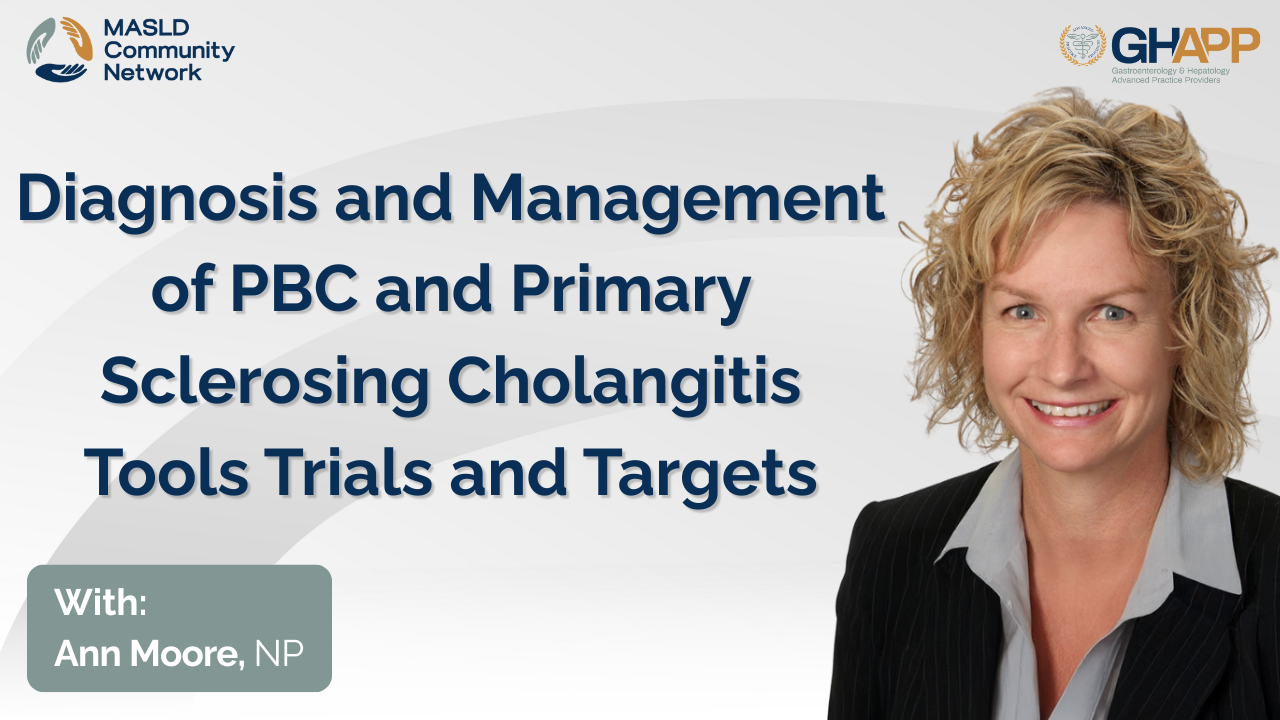
Live From GHAPP National: Diagnosis and Management of PBC and PSC Tools Trials and Targets

Learn how to confidently approach autoimmune cholestatic liver diseases in this high-yield talk from Ann Moore, NP, at Arizona Liver Health. She breaks down practical diagnosis and management of primary biliary cholangitis (PBC) and primary sclerosing cholangitis (PSC)—from simple diagnostic algorithms (ALP, AMA, MRCP) and treatment goals like deep biochemical remission, to first- and second-line options with UDCA and newer agents such as FXR and PPAR agonists. Perfect for hepatology APPs and clinicians looking to optimize outcomes, manage pruritus and bone disease, and stay current on emerging trials and therapeutic targets in PBC and PSC.
Watch Now
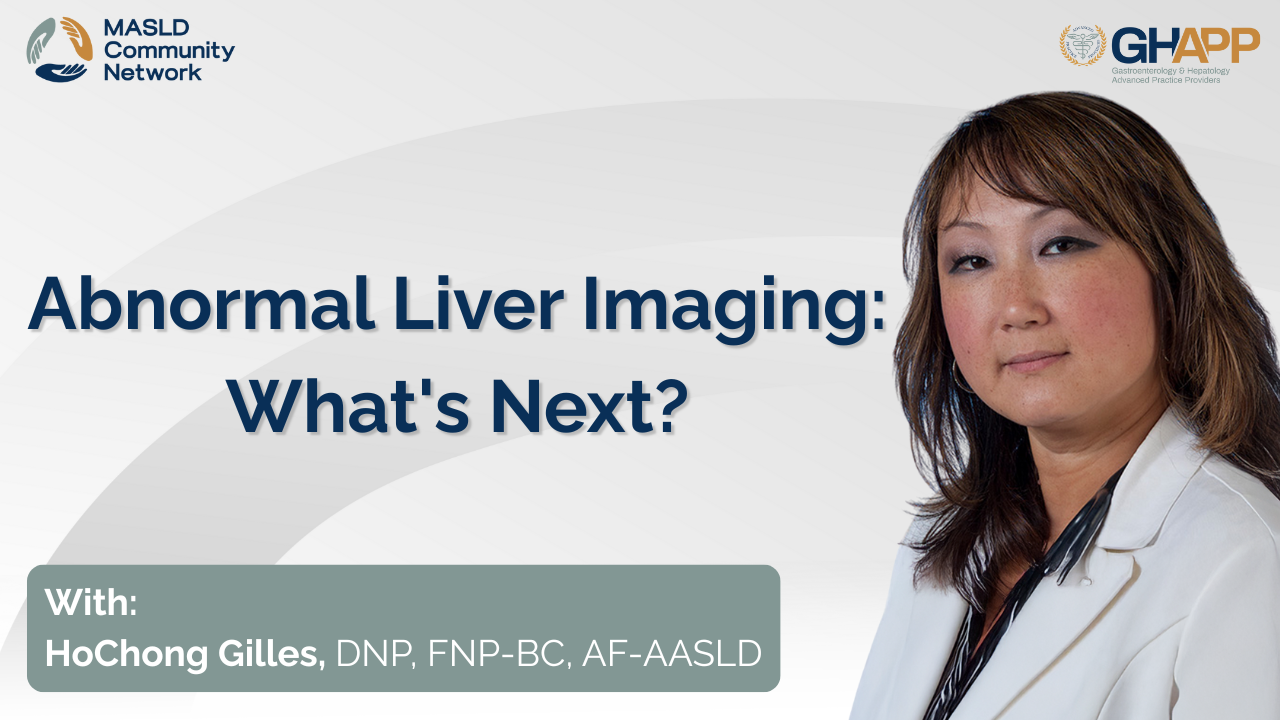
Live From GHAPP National: Abnormal Liver Imaging: What's Next?

In this high-yield session, HoChong Gilles, NP from the Central Virginia VA Healthcare System, guides viewers through a practical approach to abnormal liver imaging and the challenge of incidental liver lesions. She reviews how to differentiate cystic versus solid liver lesions, outline key risk factors, and interpret enhancement patterns on ultrasound, CT, and MRI to distinguish benign findings—such as simple cysts, hemangiomas, FNH, and hepatic adenomas—from malignant lesions including hepatocellular carcinoma (HCC) and metastatic disease. Designed for APPs and clinicians who frequently encounter unexpected lesions on imaging, this concise overview provides clear strategies for knowing when to reassure, when to monitor, and when to escalate evaluation or referral.
Watch Now
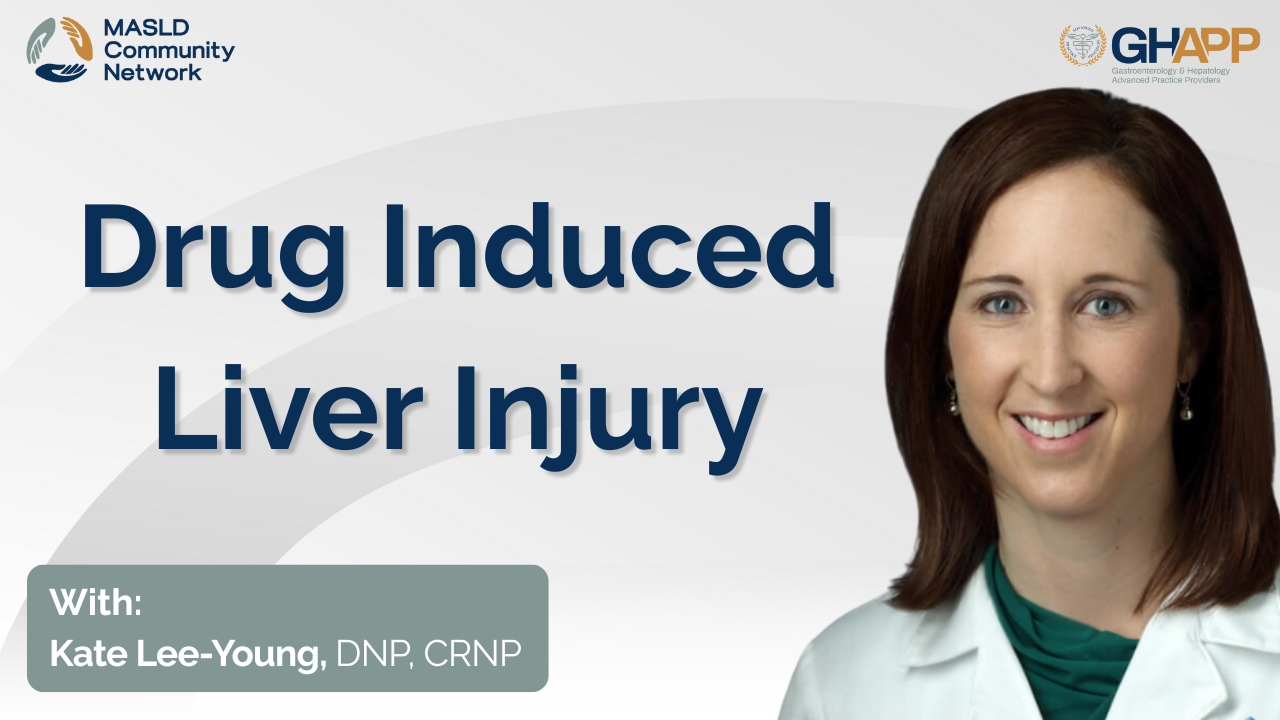
Live From GHAPP National: Drug Induced Liver Injury

In this high-yield session, Kate Lee-Young, DNP from Johns Hopkins, provides a clear and practical overview of drug-induced liver injury (DILI)—the most common cause of acute liver failure in the U.S. She reviews how DILI happens, common offending agents (including acetaminophen, antibiotics, anti-tubercular drugs, and herbal supplements like ashwagandha), key clinical patterns of injury, and how to diagnose DILI using history, labs, imaging, and R-value classification. Viewers will learn when to suspect DILI, how to rule out other liver diseases, when biopsy is useful, and essential steps in management including drug discontinuation, supportive care, NAC use, and prevention strategies. A concise, evidence-based guide for hepatology APPs and clinicians navigating suspected drug-related liver injury.
Watch Now

Live From GHAPP National: MASH Basics

In this session, Tessa Janovsky, PA from Arizona Liver Health, provides a clear, practical overview of the basics of MASH and MASLD, including the updated 2023 steatotic liver disease nomenclature, global prevalence trends, and why MASH is a progressive metabolic liver disease that requires early identification. She reviews high-risk populations, the role of primary care and specialty providers, how to use FIB-4 and non-invasive tests to assess fibrosis, and the importance of recognizing rapid progressors. Using a real clinical case, she highlights how to evaluate patients, rule out other etiologies, and optimize metabolic health—including when to consider pharmacotherapy. A concise, clinic-ready primer for clinicians managing MASLD and MASH.
Watch Now
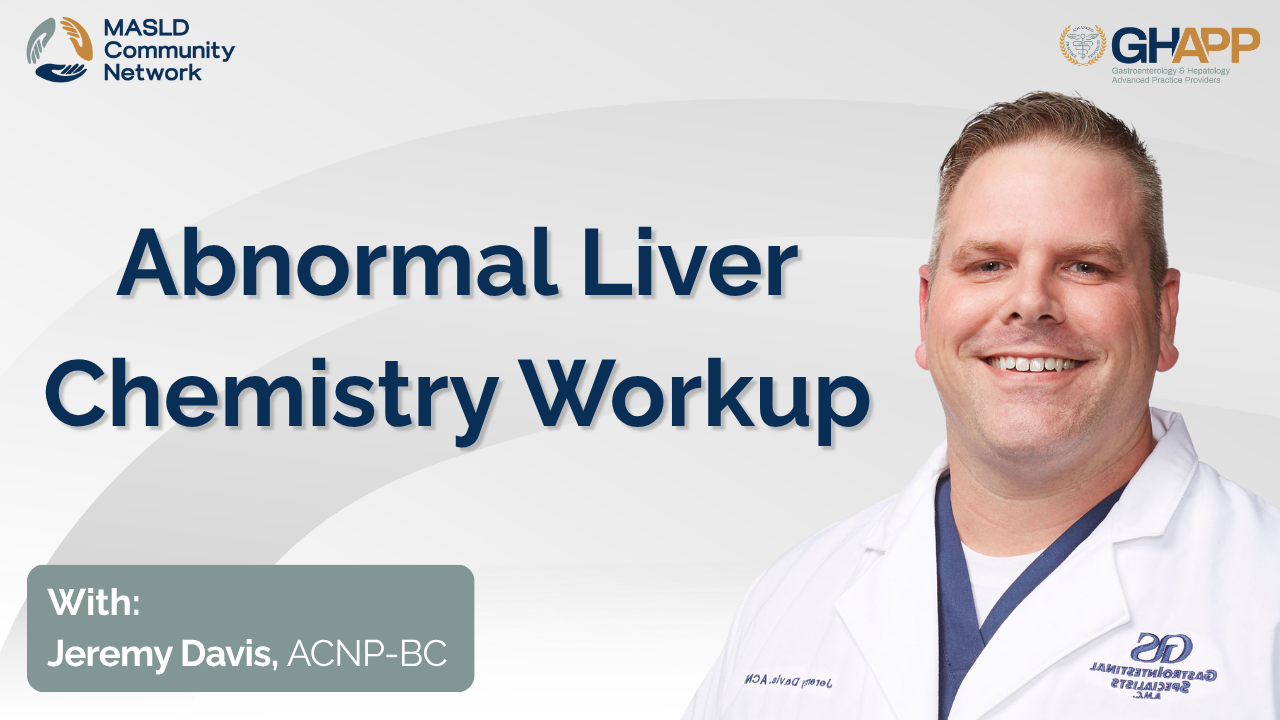
Live From GHAPP National: Abnormal Liver Chemistry Workup

In this session, Jeremy Davis, ACNP from Shreveport, Louisiana, breaks down a practical, step-by-step approach to evaluating abnormal liver chemistries. Using a real patient case, he reviews how to interpret ALT, AST, ALP, bilirubin, MCV, and GGT patterns; when to suspect hepatocellular, cholestatic, or mixed injury; and how to build an efficient differential using history, medications, alcohol assessment, and key labs (viral hepatitis panel, autoimmune markers, iron studies, Wilson disease testing, alpha-1 antitrypsin phenotype). He also highlights the role of ultrasound, MRCP, non-invasive fibrosis tests (FIB-4, ELF, VCTE), and when biopsy is needed. A practical, clinic-ready guide for APPs and clinicians assessing elevated liver enzymes and differentiating MASLD, alcohol-related disease, DILI, and other common etiologies.
Watch Now
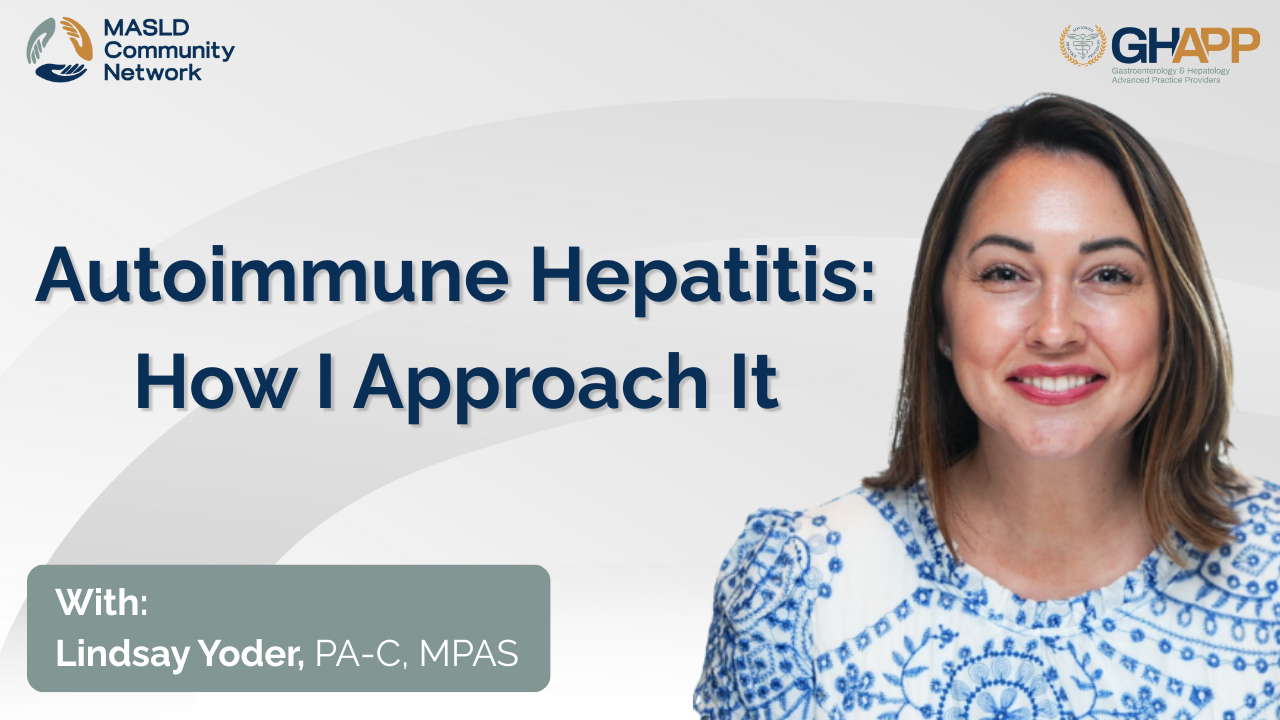
Live From GHAPP National: Autoimmune Hepatitis: How I Approach It

Join Lindsay Yoder, PA-C from Indiana University, for a practical walkthrough on how to evaluate and manage autoimmune hepatitis (AIH). This concise session covers key clinical clues, diagnostic criteria, common patient questions, and real-world approaches to treatment—from steroids and azathioprine to mycophenolate, tacrolimus, and emerging steroid-sparing strategies. Learn how to recognize AIH presentations, set realistic expectations for biochemical remission, manage intolerance and relapse, and tailor long-term therapy for better outcomes. A quick, high-yield guide for clinicians looking to strengthen their approach to autoimmune hepatitis.
Watch Now

Live From GHAPP National: MASH: The Latest and Greatest of Management

In this expert-led session, Allysa Saggese, NP, at Weill Cornell Medicine, breaks down the latest evidence and evolving best practices in the diagnosis and management of MASLD and MASH. She explains the 2023 nomenclature changes, the full spectrum of steatotic liver disease, and how metabolic dysfunction drives both MASLD and inflammatory MASH. Allysa reviews practical diagnostic pathways—including non-invasive tests like FIB-4, ELF, FibroScan, and elastography—and highlights why MASLD/MASH should always be evaluated in the broader context of metabolic disorders such as diabetes, obesity, and dyslipidemia. She also outlines the foundation of lifestyle-based treatment, offering real-world communication strategies to help patients succeed with diet, activity, and weight management goals. The talk covers major therapeutic advances, including the first FDA-approved MASH therapy, resmetirom (a THR-β agonist), as well as the growing role of GLP-1 receptor agonists like semaglutide in improving metabolic drivers of liver inflammation and fibrosis. Allysa discusses dosing, titration, safety considerations, expected side effects, and what clinicians should know when co-managing cardiometabolic conditions. She closes with insights on future MASH drug development, combination therapy approaches, and practical pearls for supporting patients through a chronic, complex liver disease.
Watch Now
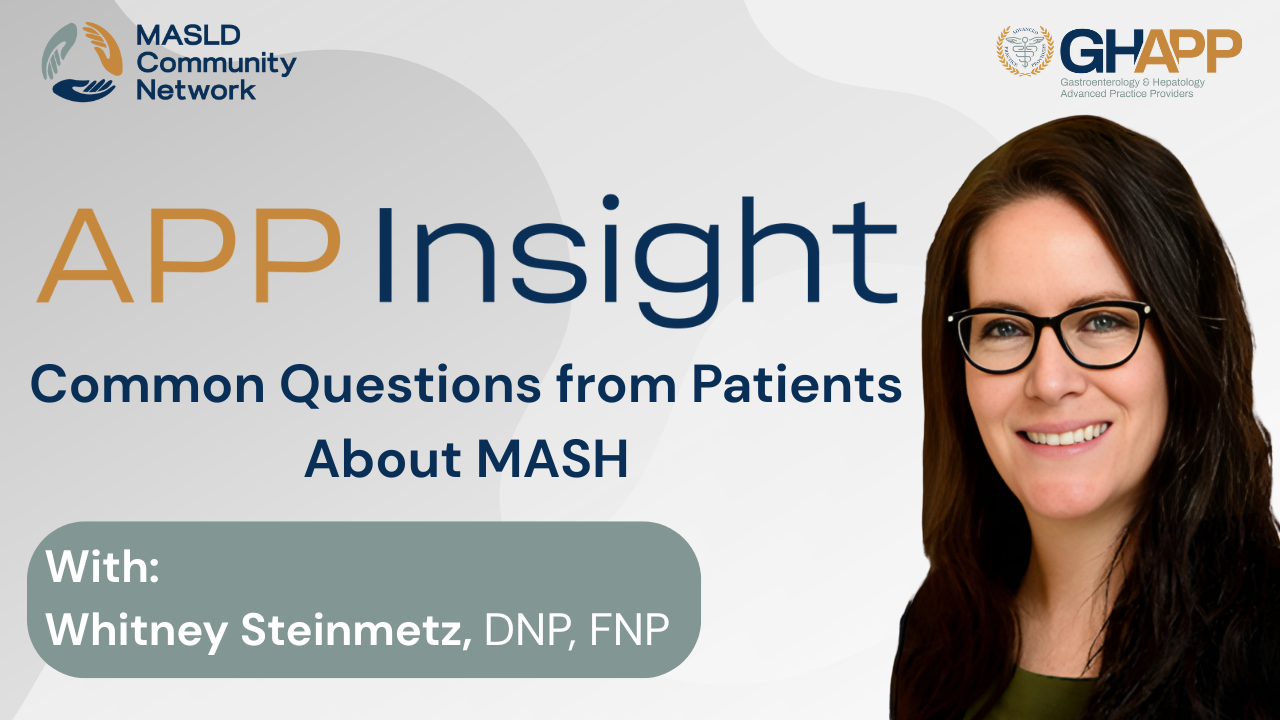
Common Questions From Patients About MASH

In this educational discussion from the GHAPP MASLD Community Network, Whitney Steinmetz, FNP, from Presbyterian Medical Group in Albuquerque, New Mexico, addresses some of the most common questions patients ask about metabolic dysfunction–associated steatohepatitis (MASH) and metabolic dysfunction–associated steatotic liver disease (MASLD). Whitney explains why many patients are surprised to be diagnosed with liver disease despite not drinking alcohol and uses this as an opportunity to clarify the pathogenesis of MASH, emphasizing that it’s driven by metabolic dysfunction rather than alcohol or viral causes. She discusses how clinicians can use noninvasive tools to stage fibrosis, communicate clearly about disease progression, and create shared decision-making care plans that empower patients to take an active role in their liver health. Whitney also clarifies the difference between fatty liver disease and MASH, helping patients understand prior imaging results, risk factors, and the potential for disease reversibility through lifestyle and medical management. This concise, patient-focused session offers valuable insights for clinicians and APPs working to improve understanding and outcomes in MASH care.
Watch Now

Common Questions From Community GI About MASH

In this educational discussion from the GHAPP MASLD Community Network, Allysa Saggese, NP, from Weill Cornell Medicine in New York City, addresses two of the most frequently asked questions in metabolic dysfunction–associated steatotic liver disease (MASLD) and metabolic dysfunction–associated steatohepatitis (MASH) management. Allysa breaks down the clinical reasoning behind initiating therapy, emphasizing shared decision-making with patients, reviewing medication mechanisms, side effects, and the role of accessibility in treatment sequencing. She explains that while both Resmetirom and GLP-1s offer benefits, the order of initiation often depends on tolerability, dosing complexity, and availability. The session also explores how to interpret FIB-4, ELF, FibroScan, and MR elastography results, when discrepancies occur, and when a liver biopsy remains necessary for diagnostic confirmation. This video provides clear, practical guidance for APPs and hepatology providers navigating modern MASLD and MASH management decisions through a personalized and evidence-based lens.
Watch Now

Webcast: MASLD Basics With Edith Johannes

Learn the fundamentals of Metabolic Dysfunction-Associated Steatotic Liver Disease (MASLD) in this educational session featuring Edith Johannes, NP, a liver specialist at UCLA Health with over 17 years of experience in hepatology and liver transplantation. Supported by the GHAPP MASLD Community Network and Madrigal Pharmaceuticals, this session explores the new terminology and diagnostic criteria for MASLD—formerly known as NAFLD and NASH—and explains why these changes matter for both clinicians and patients. Viewers will gain a clear understanding of how to evaluate patients presenting with hepatic steatosis, distinguish MASLD from alcohol- or drug-induced liver injury, and apply key diagnostic tools such as FIB-4, ELF testing, and elastography to assess fibrosis progression. Johannes also discusses the clinical importance of ruling out overlapping conditions, recognizing metabolic risk factors, and identifying patients at risk for fibrosis, cirrhosis, and hepatocellular carcinoma (HCC). Whether you’re new to hepatology or seeking a concise refresher, this talk provides a practical framework for diagnosing and managing MASLD in primary and specialty care.
Watch Now

Webcast: MASLD vs MetALD With HoChong Gilles

In this session from the GHAPP MASLD Community Network, supported by Madrigal Pharmaceuticals, hepatology expert HoChong Gilles, DNP, from the Richmond VA Medical Center, explores the evolving understanding of MetALD (Metabolic dysfunction-associated Alcohol-related Liver Disease). Through a detailed case study, Gilles examines how metabolic risk factors and alcohol intake intersect to drive fibrosis progression, highlighting diagnostic tools such as FibroScan, biomarkers like PEth, and key distinctions between MASLD, MASH, and alcohol-predominant liver disease. This presentation underscores the importance of assessing true alcohol exposure, utilizing noninvasive testing, and integrating lifestyle interventions for improved liver and metabolic outcomes.
Watch Now
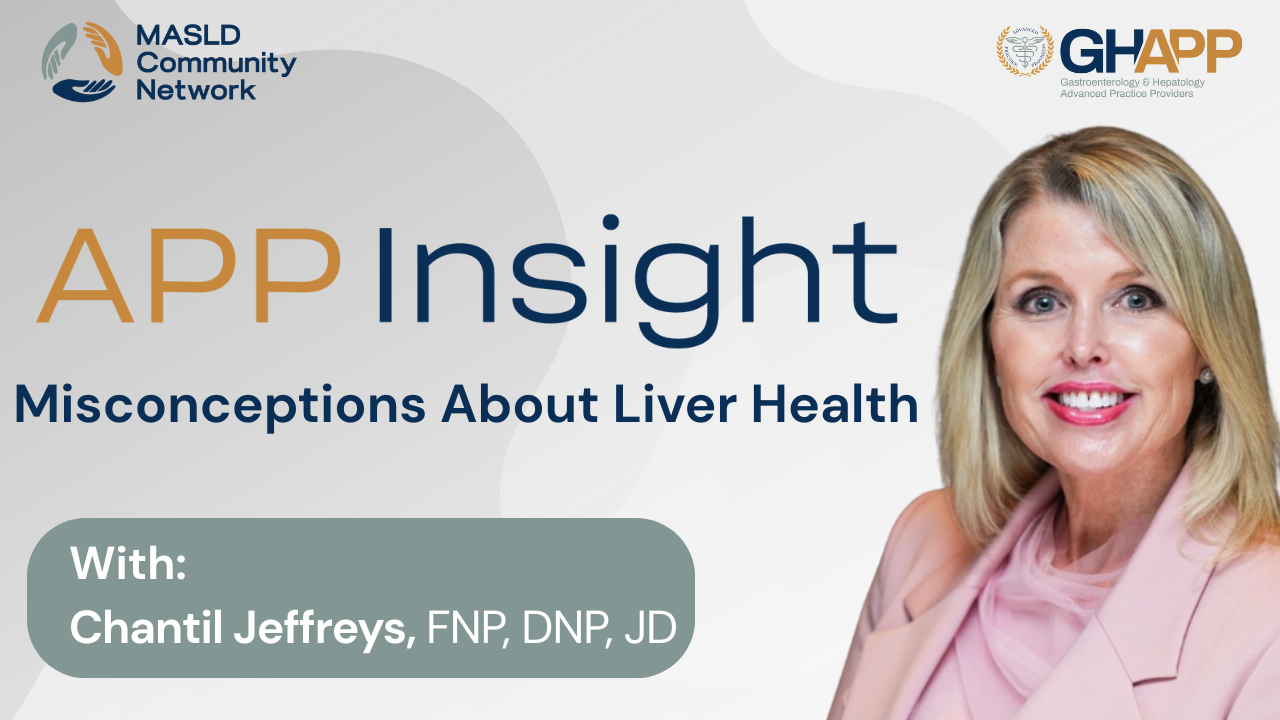
Misconceptions About Liver Health

In this expert discussion, Chantil Jeffreys, FNP, from Gastro One in Memphis, Tennessee, addresses misconceptions patients and providers have about liver disease, particularly MASLD (metabolic dysfunction–associated steatotic liver disease) and MASH (metabolic dysfunction–associated steatohepatitis). She explains why cirrhosis is not only caused by alcohol use, how statins can actually be safe and beneficial for patients with MASLD/MASH, and why Tylenol—when used appropriately—remains a safe option even for individuals with advanced liver disease. With over 24 years of experience in hepatology, Chantil highlights the importance of patient education, myth-busting, and empowering both patients and primary care providers with accurate information. Watch now to better understand the realities of MASLD and MASH, the leading causes of liver transplants in the U.S., and learn how proper management can improve outcomes for patients with liver disease.
Watch Now
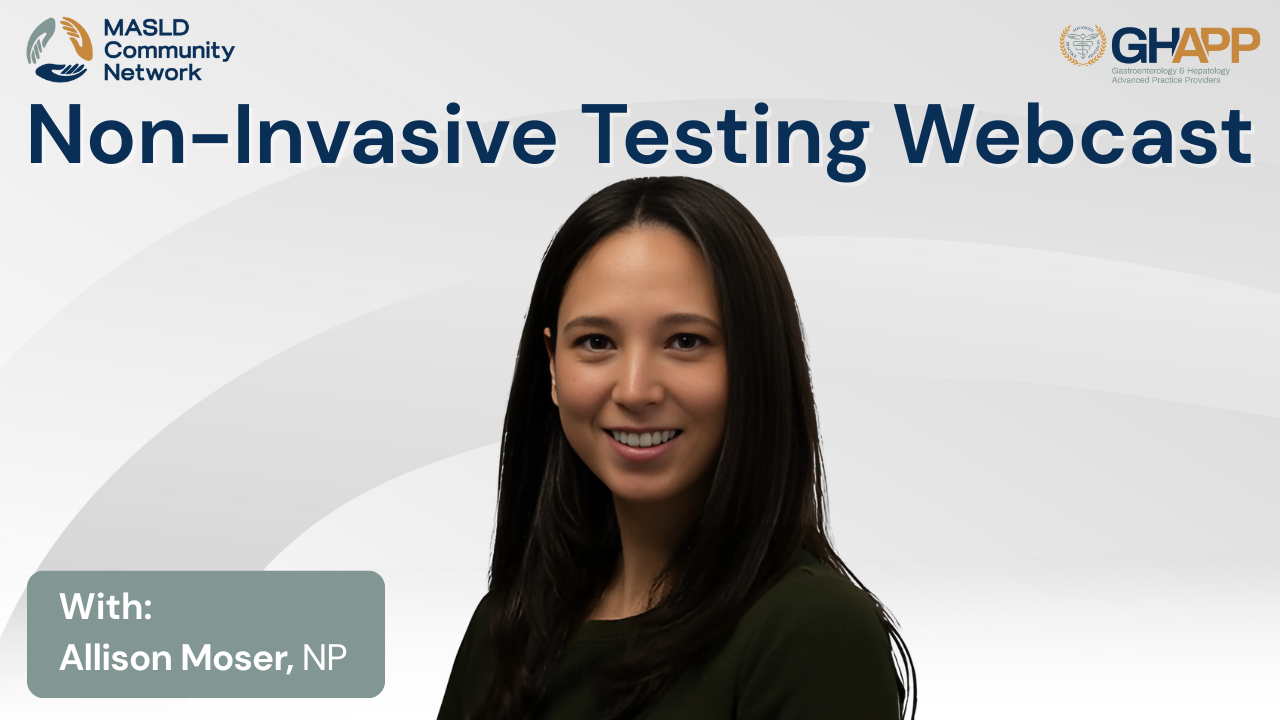
Webcast: Non-Invasive Testing With Allison Moser

In this educational session from the GHAPP MASLD Community Network, Allison Moser, NP, from Rush University Medical Center, explains how non-invasive testing (NITs) is changing the way clinicians assess and manage metabolic-associated steatotic liver disease (MASLD) and metabolic-associated steatohepatitis (MASH). Through a real patient case study, she reviews key diagnostic tools like FIB-4, ELF, FibroScan, and MRI elastography, highlighting how each test helps identify fibrosis risk, reduce the need for biopsy, and guide patient management. Learn how to interpret test results, understand their limitations, and apply them in everyday clinical practice to improve liver health outcomes. #MASLD #MASH #Fibrosis #NonInvasiveTesting #FIB4 #ELFTest #FibroScan #MRIelastography #LiverHealth #Hepatology #APPeducation
Watch Now
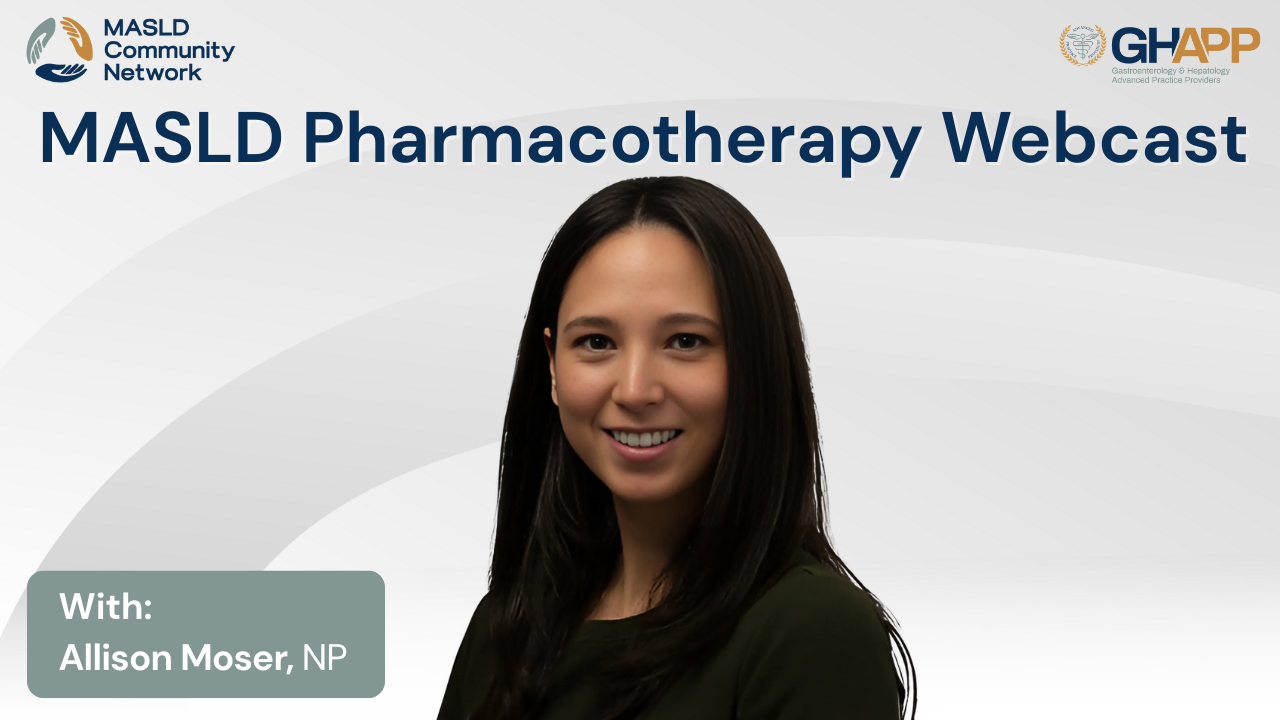
Webcast: MASLD Pharmacotherapy With Allison Moser

Join Allison Moser, NP, hepatology nurse practitioner at Rush University Medical Center, for a comprehensive update on pharmacotherapy in MASLD and MASH. In this MASLD Community Network session, Allison reviews the evolving treatment landscape—from lifestyle and metabolic management to the latest FDA-approved medications. Learn how resmetirom, the first and only approved therapy for MASH with stage 2–3 fibrosis, works as a thyroid hormone receptor-β agonist to improve liver fat and fibrosis. Discover the growing role of GLP-1 receptor agonists such as semaglutide in MASH management, as well as key insights on vitamin E, pioglitazone, and metabolic risk reduction through diet, exercise, and comorbidity control. This evidence-based discussion highlights the latest clinical trial data, practice guidelines, and real-world considerations for advanced practice providers managing metabolic liver disease. #MASH #MASLD #LiverHealth #Hepatology #APPeducation #Resmetirom #Semaglutide #FattyLiverDisease #NASH #MetabolicHealth
Watch Now

Common Questions From Patients About MASH

In this educational video, Summer Collier, MSN, FNP-BC, from UC San Diego Health, answers two of the most common questions she receives from patients with MASLD and MASH. She explains whether all patients with MASLD or MASH progress to advanced fibrosis and emphasizes the importance of early awareness, risk assessment, and proactive lifestyle counseling to help prevent disease progression. Summer also shares practical dietary guidance, highlighting the benefits of a Mediterranean-style or diabetes-friendly diet that limits sugary foods and beverages while focusing on long-term sustainability and cultural fit. This concise discussion offers real-world insights for clinicians and APPs looking to better counsel and support patients at risk for metabolic liver disease.
Watch Now
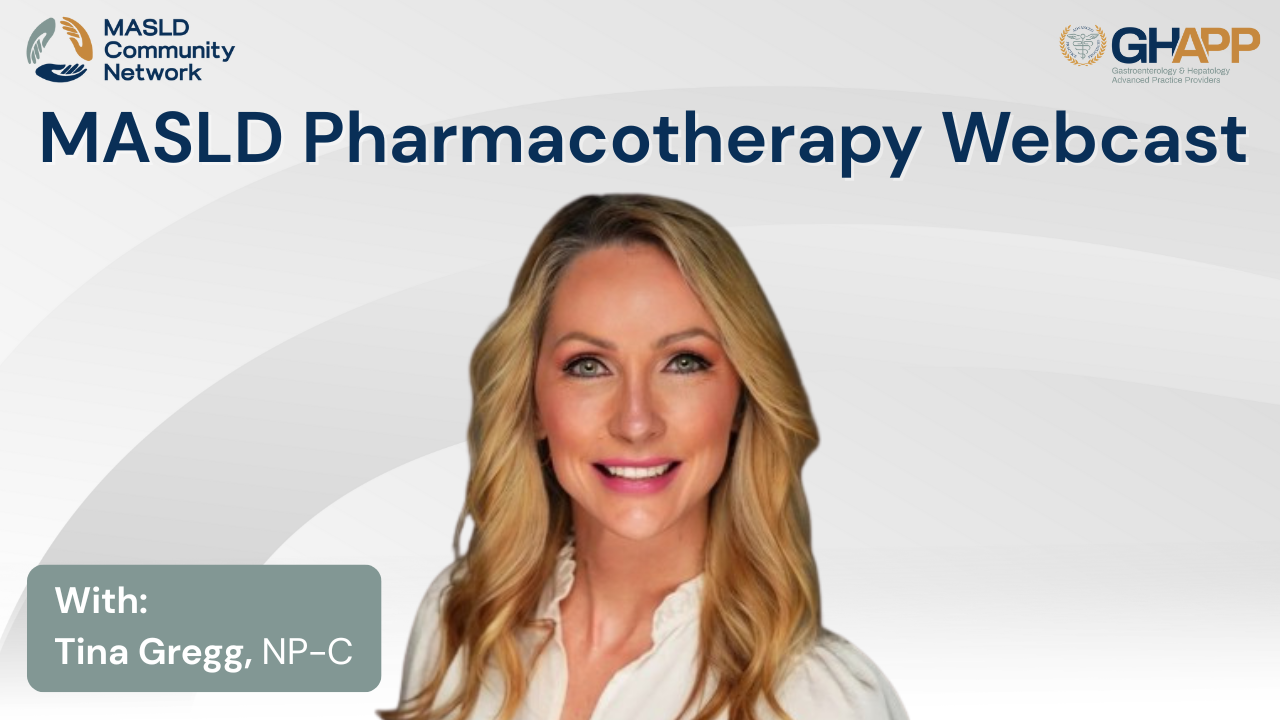
Webcast: MASLD Pharmacotherapy With Tina Gregg

In this educational presentation, Tina Gregg, NP-C breaks down the evolving pharmacotherapy landscape for MASLD and MASH, emphasizing a holistic, metabolic-centered approach to patient management. Tina reviews key treatment pillars—including weight loss, cardiovascular risk reduction, and direct NASH-targeted therapy—highlighting evidence-based strategies such as lifestyle modification, GLP-1 receptor agonists, pioglitazone, vitamin E, and the first FDA-approved therapy for MASH with F2–F3 fibrosis, resmetirom. She explains how these interventions improve hepatic histology, reduce fibrosis, and address comorbidities like diabetes and obesity. The session also explores data from the MAESTRO-NASH trial, drug-drug interaction considerations, and ongoing monitoring guidance for resmetirom. Whether you’re managing patients in hepatology, GI, or primary care, this discussion offers a comprehensive overview of current and emerging medical therapies shaping the future of metabolic liver disease care.
Watch Now
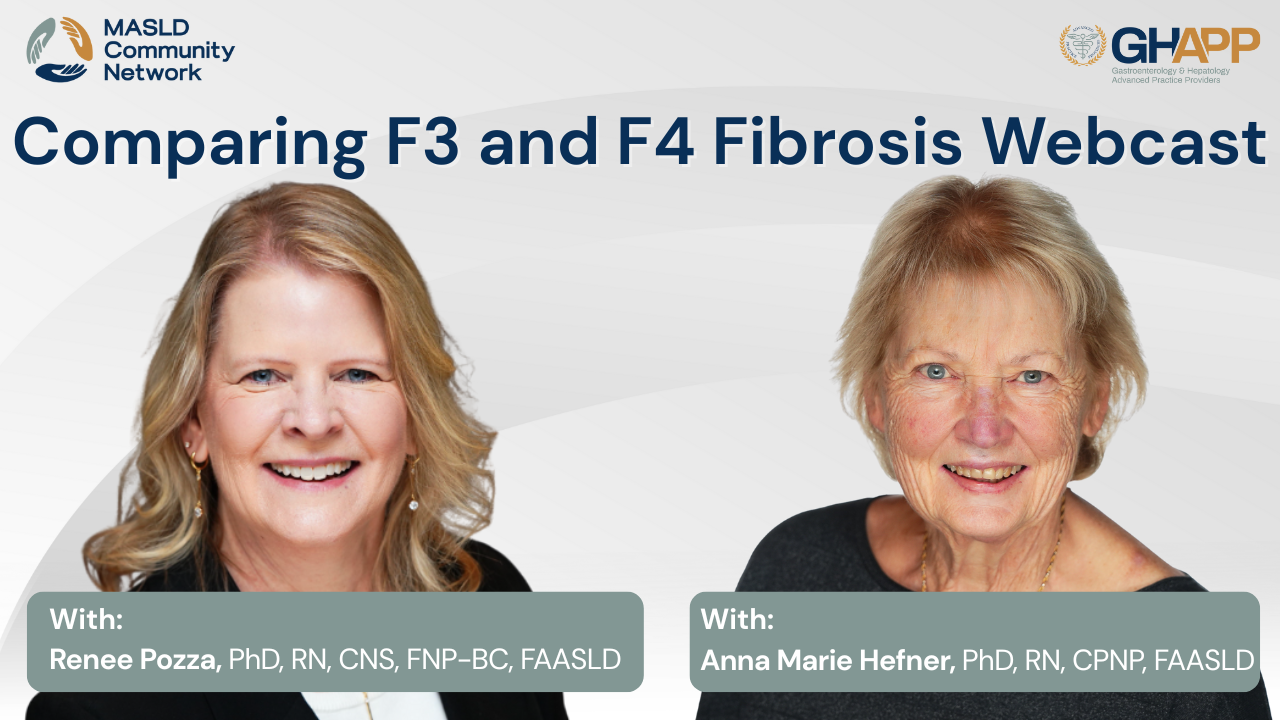
Webcast: Comparing F3 and F4 Fibrosis With Anna Marie Hefner & Renee Pozza

Join Anna Marie Hefner, RN and Renee Pozza, FNP-BC from Southern California Liver & GI Centers for a practical, case-based deep dive into advanced MASLD/MASH—what F3 vs F4 (cirrhosis) really means for staging, treatment, and surveillance. Using a 55-year-old patient scenario, they walk through interpreting FIB-4, FibroScan® (kPa + CAP), ELF, and routine labs; when to add ultrasound + AFP for HCC surveillance, and when to scope for esophageal varices. You’ll hear how they structure follow-up (from biweekly check-ins early to every 3 months), tailor diet and exercise to real-world habits, incorporate GLP-1s for weight and metabolic control, and consider resmetirom for eligible F2–F3 patients (not F4). The session also covers when to escalate to colonoscopy for alternative bleeding sources, and how to alternate US with triphasic CT/MRI in high-risk patients. Perfect for GI/hepatology APPs looking for a clear, actionable framework to manage fibrosis progression and optimize outcomes.
Watch Now
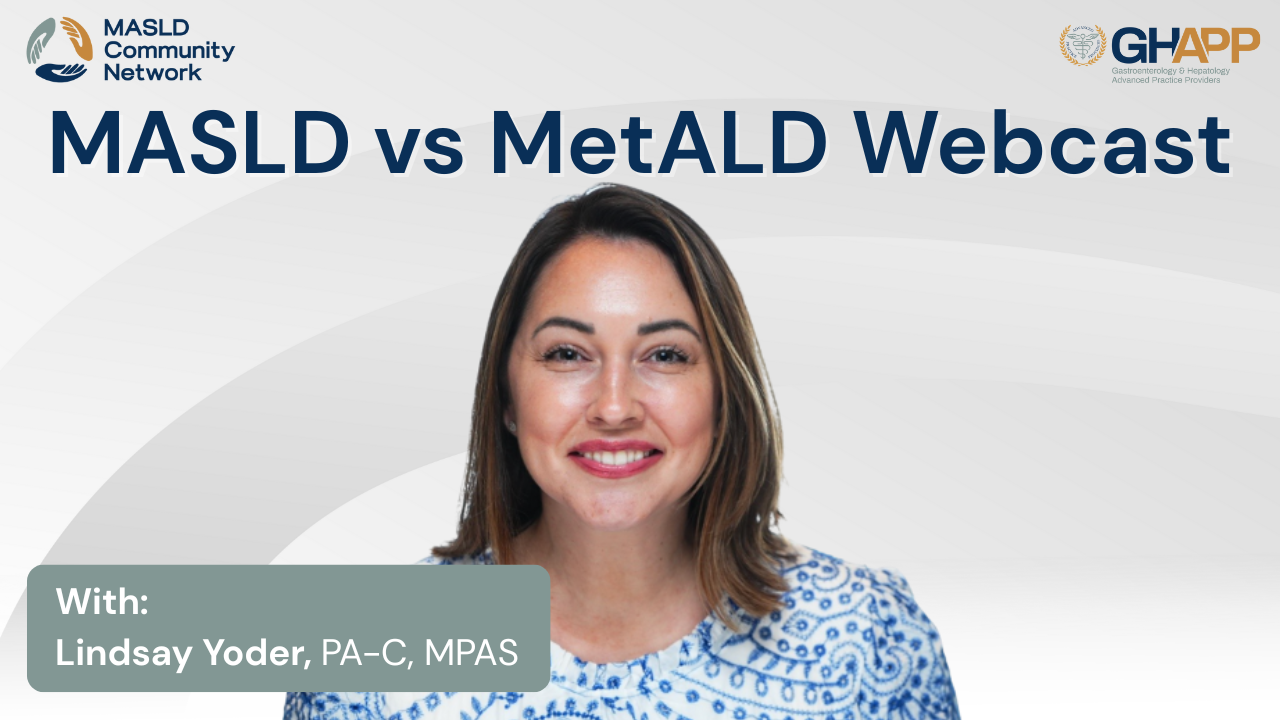
Webcast: MASLD vs MetALD With Lindsay Yoder

In this educational discussion, Lindsay Yoder, PA from Indiana University Health dives into one of the fastest-evolving areas in hepatology—metabolic dysfunction–associated steatotic liver disease (MASLD) and metabolic dysfunction–associated alcohol-related liver disease (MetALD). Using a real-world case study, Lindsay explains how to identify, classify, and manage patients with overlapping metabolic and alcohol-related risk factors. She outlines how to interpret key non-invasive assessments such as FibroScan CAP scores, PEth testing, and ANI scoring, while emphasizing how alcohol intake—even at moderate levels—can accelerate liver fibrosis in patients with metabolic dysfunction. The session also reviews diagnostic thresholds, treatment strategies including lifestyle modification, Mediterranean diet, and resmetirom, and the importance of counseling patients on alcohol reduction. Whether you’re a hepatology APP or primary care provider, this talk offers a clear, practical framework for navigating MASLD, MetALD, and the new nomenclature shaping liver disease management today.
Watch Now

Webcast: MASLD vs MetALD With Maly Tiev

In this educational session, Maly Tiev, NP from NYU Langone Health, explores the evolving understanding of metabolic dysfunction–associated steatotic liver disease (MASLD) and metabolic dysfunction–associated alcohol-related liver disease (MetALD). Drawing on over 25 years of hepatology experience, she uses a real-world case to walk through the latest definitions, diagnostic criteria, and management strategies for patients with overlapping metabolic and alcohol-related liver disease. Maly explains how alcohol intake interacts with metabolic risk factors such as obesity, diabetes, and hypertension to accelerate fibrosis progression, and highlights the role of non-invasive testing—including FibroScan and the PEth test—in accurate diagnosis. The discussion also covers the clinical significance of F3 fibrosis, lifestyle interventions like the Mediterranean diet, and when to consider pharmacologic treatment such as resmetirom for patients with advanced disease. Watch to better understand how to identify, classify, and manage MASLD and MetALD in clinical practice.
Watch Now
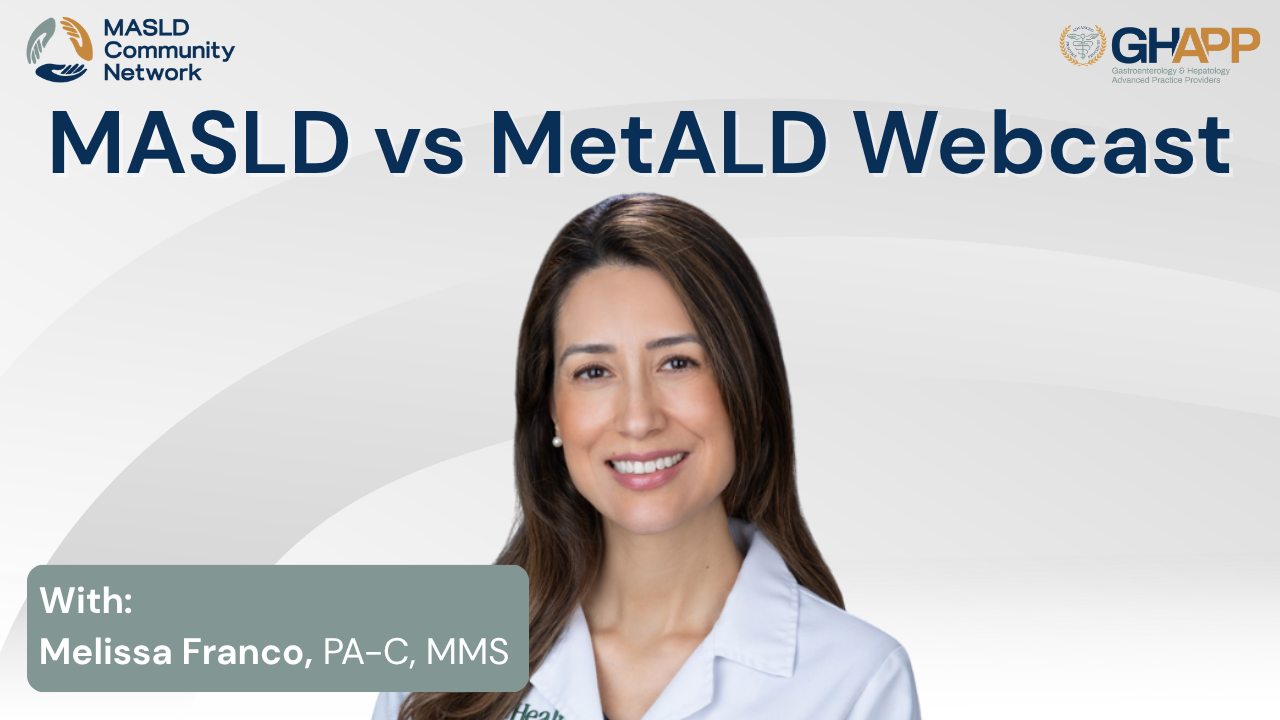
Webcast: MASLD vs MetALD With Melissa Franco

Learn how to evaluate and manage patients with MASLD, MASH, and MetALD in this educational session led by Melissa Franco, PA-C, from the University of Miami. Using a real-world case, Melissa reviews how to identify metabolic-dysfunction–associated steatotic liver disease, distinguish it from alcohol-associated liver injury, and apply non-invasive testing tools such as FIB-4 and transient elastography to stratify fibrosis risk. The presentation explores how alcohol intake, metabolic risk factors, and obesity interact to accelerate liver inflammation and fibrosis, and discusses objective biomarkers like PEth testing to detect alcohol use. Viewers will gain practical insight into risk assessment, lifestyle modification, and management strategies for patients with combined metabolic and alcohol-related liver disease. For more hepatology education and resources, visit the GHAPP MASLD & MASH Community Network.
Watch Now
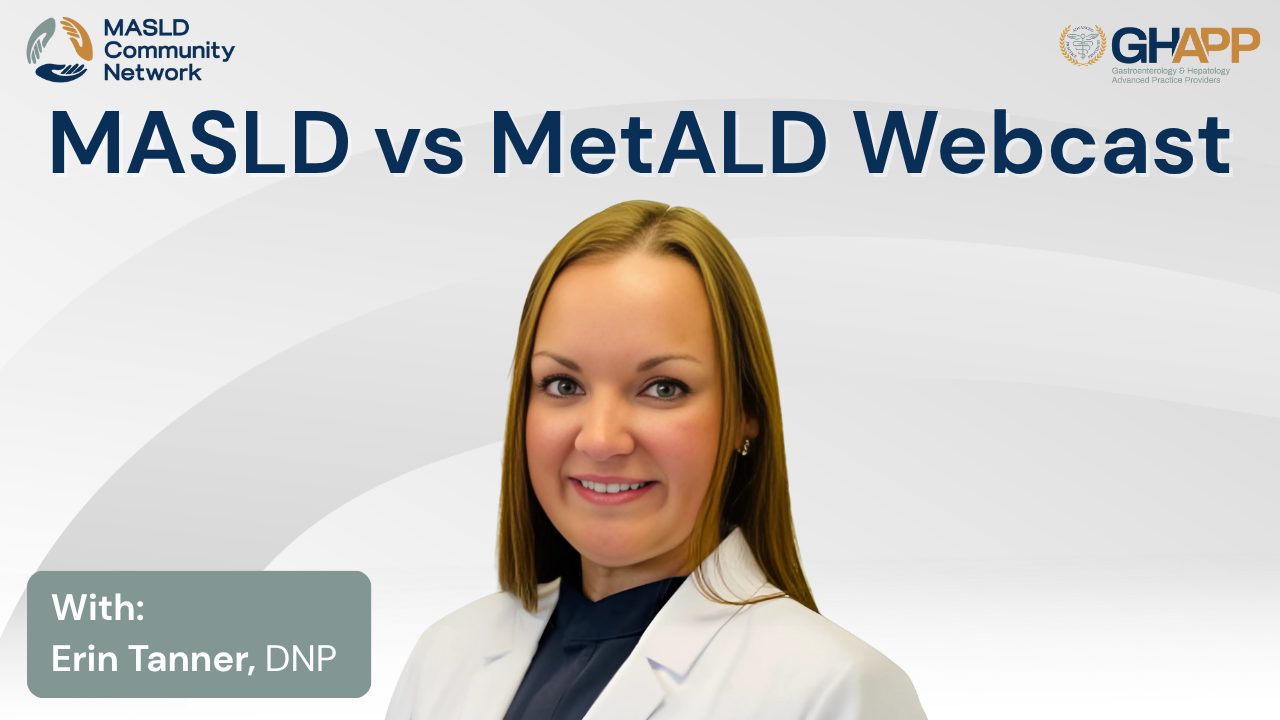
Webcast: MASLD vs MetALD With Erin Tanner

Join Erin Tanner, PA-C for a practical overview of MASLD (metabolic-associated steatotic liver disease) and MetALD, the overlap between metabolic dysfunction and alcohol-related liver injury. Through a real-world case, Erin explains how to interpret FibroScan (kPa/CAP) results, use PEth testing to objectively measure alcohol intake, and recognize how alcohol accelerates fibrosis progression. She reviews risk factors like hypertension, hyperlipidemia, and elevated triglycerides, emphasizing lifestyle interventions, Mediterranean diet, weight loss, and alcohol abstinence to prevent decompensation and liver cancer.
Watch Now
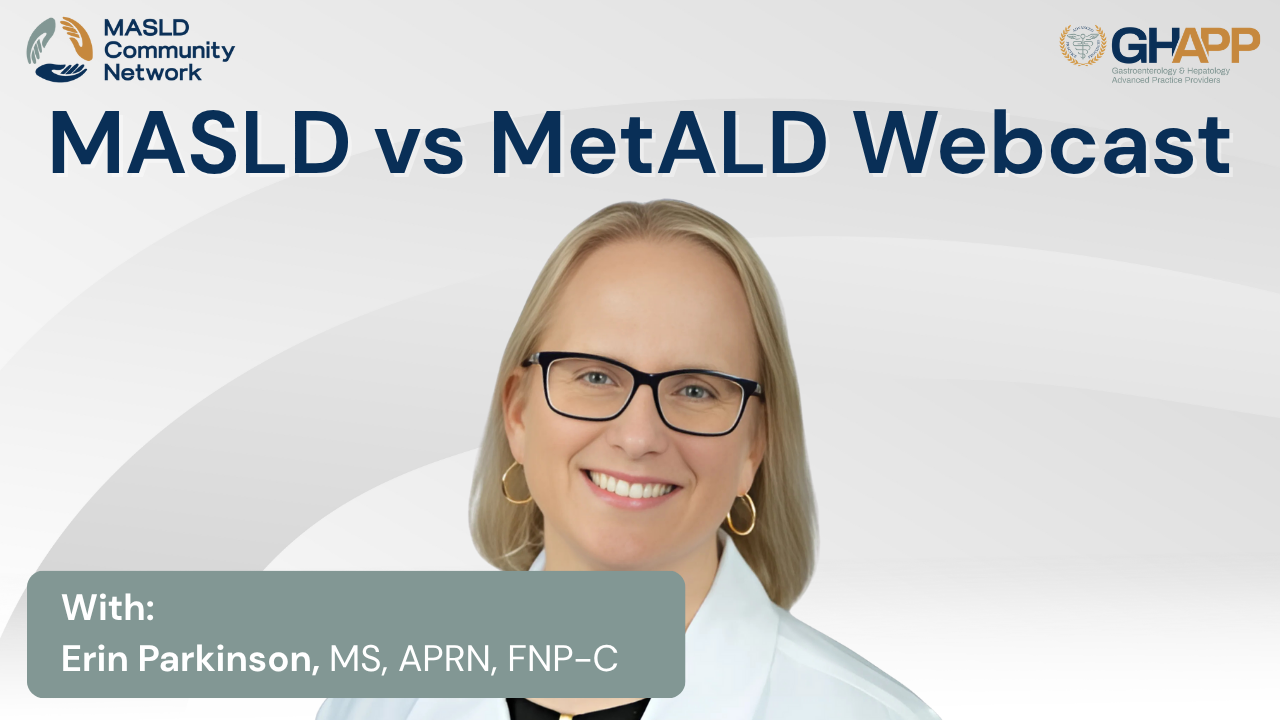
Webcast: MASLD vs MetALD With Erin Parkinson

Join Erin Parkinson, APRN, FNP-C for a clear, case-based explainer on diagnosing MetALD versus MASLD. Using a typical patient scenario, Erin shows how to interpret FibroScan (kPa/CAP), translate alcohol “servings” into grams, and use PEth and screening tools (e.g., AUDIT-C, lab clues) to objectively quantify alcohol intake. You’ll learn practical next steps—Mediterranean diet, exercise/weight loss, alcohol abstinence, and when F3 fibrosis should prompt HCC screening—plus how to apply standardized criteria so care and clinical trials compare “apples to apples.”
Watch Now

Webcast: MASLD vs MetALD With April Morris

Join April Morris, NP for a case-based walkthrough of updated steatotic liver disease concepts—MASLD, MASH, and MetALD—using a typical patient (“Ashley”) to illustrate real-world evaluation and management. Learn how to interpret FibroScan (e.g., kPa 11.4, CAP 310), spot metabolic risk (PCOS, HTN, dyslipidemia), and use alcohol biomarkers like PEth to uncover under-reported intake. April covers practical counseling—Mediterranean diet, exercise, weight loss—why alcohol abstinence is critical, when Resmetirom may be appropriate for non-cirrhotic fibrosis, and the need for HCC screening in advanced disease.
Watch Now

Webcast: MASLD vs MetALD With Anthony Derencius

Join Anthony Derencius, PA-C for a concise, case-based update on steatotic liver disease—covering MASLD vs MetALD, how to interpret FibroScan (kPa/CAP), and when to use PEth to objectively quantify alcohol intake. Using a typical patient scenario (ultrasound steatosis, metabolic risk factors, daily wine), Anthony outlines practical steps for risk stratification, lifestyle and alcohol counseling, and monitoring advanced fibrosis, with clear thresholds to distinguish metabolic-predominant from alcohol-associated disease.
Watch Now
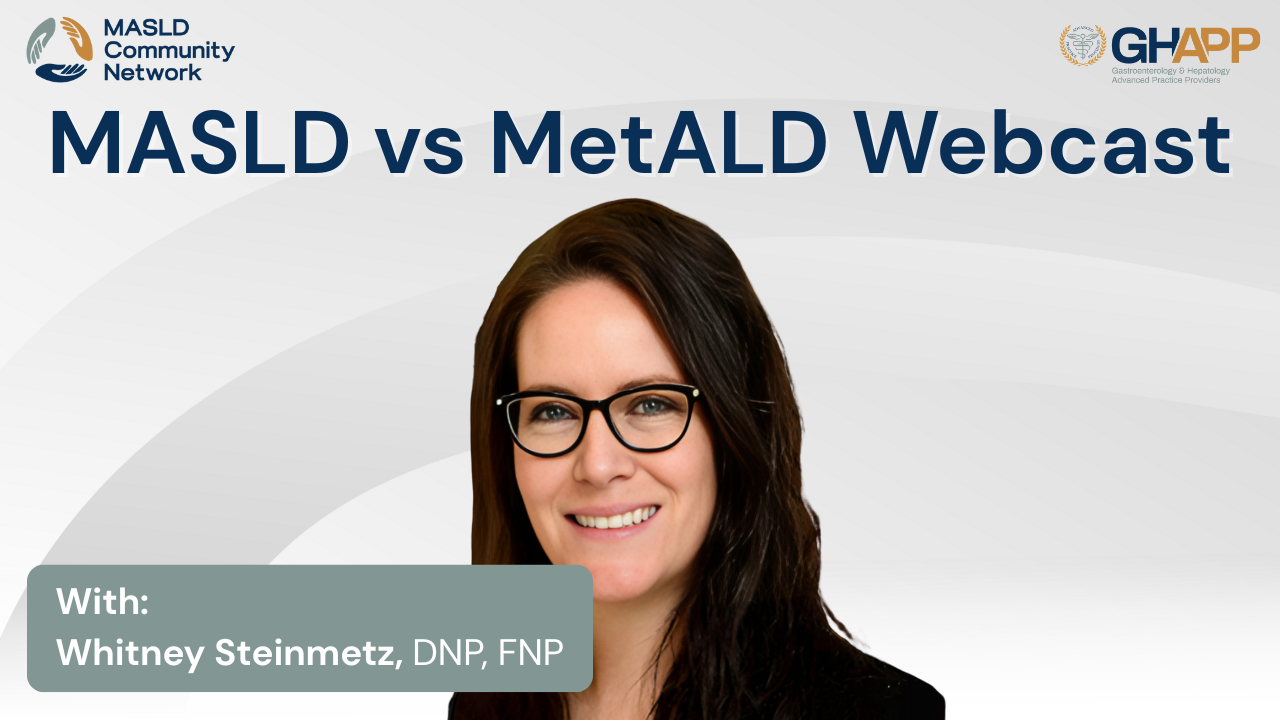
Webcast: MASLD vs MetALD With Whitney Steinmetz

Join Whitney Steinmetz, NP for a practical, case-based walkthrough of the updated steatotic liver disease nomenclature—MASLD, MASH, and ALD/MetALD—and how to apply it in clinic. Using a common scenario, she covers risk stratification with FIB-4 and FibroScan (kPa/CAP), when to order PEth to quantify alcohol use, and why F3 warrants HCC screening and vaccinations. You’ll get actionable tips on counseling for weight loss and alcohol reduction, evaluating supplements, addressing cardiometabolic risks (A1C, triglycerides, BP), and considering resmetirom in appropriate non-cirrhotic patients.
Watch Now
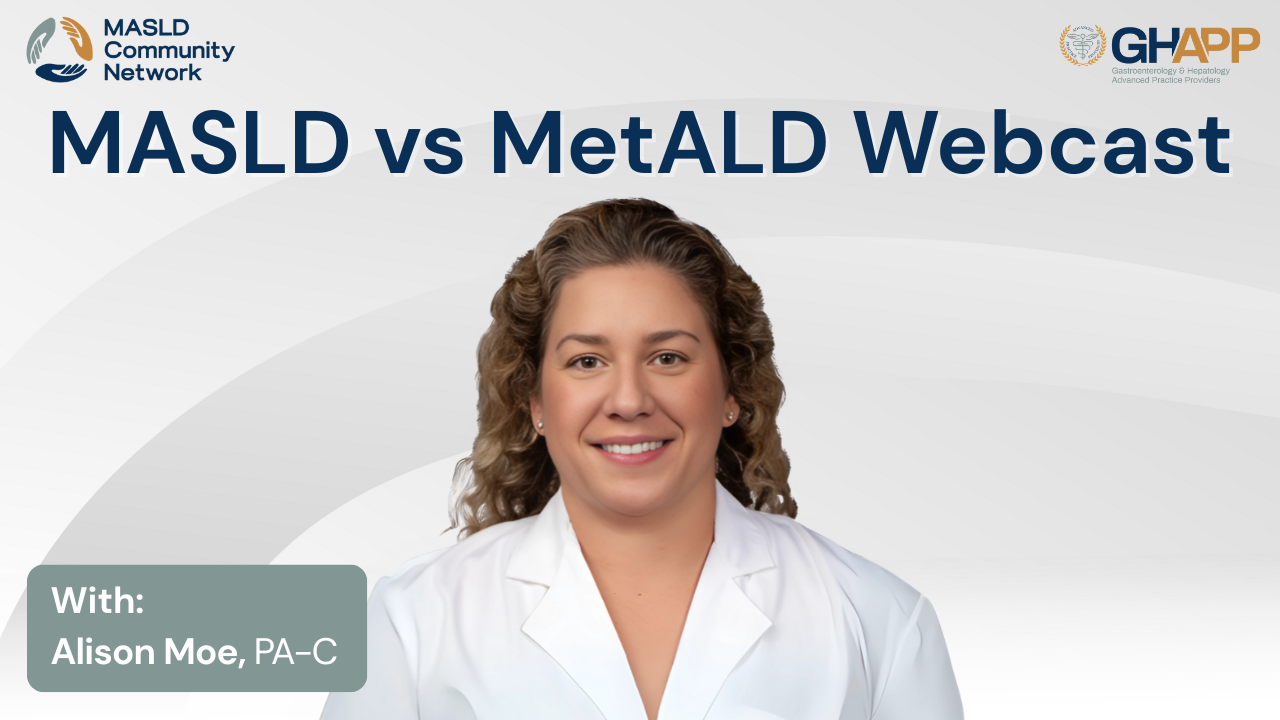
Webcast: MASLD vs MetALD With Alison Moe

In this insightful session, Alison Moe, PA-C, from Atlantic Gastroenterology Associates, a division of United Digestive, breaks down how to distinguish metabolic-associated steatotic liver disease (MASLD) from MetALD—the overlap of metabolic dysfunction and alcohol-related liver injury. Using a real-world case study, Alison highlights how small amounts of daily alcohol intake can significantly accelerate fibrosis in patients with metabolic risk factors like PCOS, hypertension, and dyslipidemia. She explains how to interpret FibroScan (kPa/CAP) results, evaluate PEth testing for alcohol exposure, and determine when therapies such as Resmetirom are appropriate. This discussion emphasizes practical strategies for counseling patients on alcohol cessation, lifestyle modification, and fibrosis monitoring, helping clinicians better identify and manage those at risk for advanced liver disease.
Watch Now

Webcast: MASLD vs MetALD With Jordan Mayberry

In this educational session, Jordan Mayberry, PA-C, from Dallas, Texas, explores the evolving understanding of metabolic-associated steatotic liver disease (MASLD) and MetALD, where metabolic risk factors intersect with alcohol use. Through a detailed case study, she demonstrates how to interpret FibroScan results, calculate FIB-4, and apply PEth testing to assess alcohol intake. Jordan highlights the metabolic and inflammatory mechanisms driving liver fibrosis, explains how alcohol amplifies disease progression, and outlines current management strategies—focusing on weight loss, alcohol cessation, lifestyle changes, and the use of Resmetirom for advanced fibrosis. The discussion offers practical guidance for clinicians aiming to accurately diagnose and treat patients with MASLD and MetALD in everyday hepatology practice.
Watch Now

Webcast: MASLD vs MetALD With Michelle Barnett

Join Michelle Barnett, PA-C for a concise, case-based update on the new steatotic liver disease nomenclature—MASLD, MASH, and MetALD—and what it means for risk stratification and management. She walks through calculating FIB-4, interpreting FibroScan (kPa/CAP), and quantifying alcohol exposure (e.g., PEth) to differentiate metabolic-predominant from alcohol-associated disease. You’ll learn practical next steps: lifestyle and Mediterranean diet counseling, structured exercise goals, when to consider Resmetirom for F3 fibrosis, and why HCC screening now extends to F3. Perfect for APPs and clinicians looking to apply 2023+ consensus guidance in everyday hepatology practice.
Watch Now

Webcast: MASLD vs MetALD With Jill Olmstead

In this educational session, Jill Olmstead, DNP, from Providence Health in Southern California, reviews the new clinical guidelines for metabolic-associated steatotic liver disease (MASLD) and the emerging category MetALD—metabolic-associated liver disease related to alcohol use disorder. Through a case-based discussion, she explains how to evaluate patients with fatty liver disease, interpret key biomarkers like FIB-4 and FibroScan, and distinguish between metabolic and alcohol-related liver damage. Jill highlights the importance of weight loss, lifestyle modification, and alcohol cessation as essential interventions to reverse steatosis and fibrosis, and discusses the role of Resmetirom (Rezdiffra) as a newly approved therapy for patients with moderate to advanced fibrosis. This comprehensive overview helps clinicians and advanced practice providers apply updated MASLD and MetALD guidelines in everyday gastroenterology and hepatology practice.
Watch Now
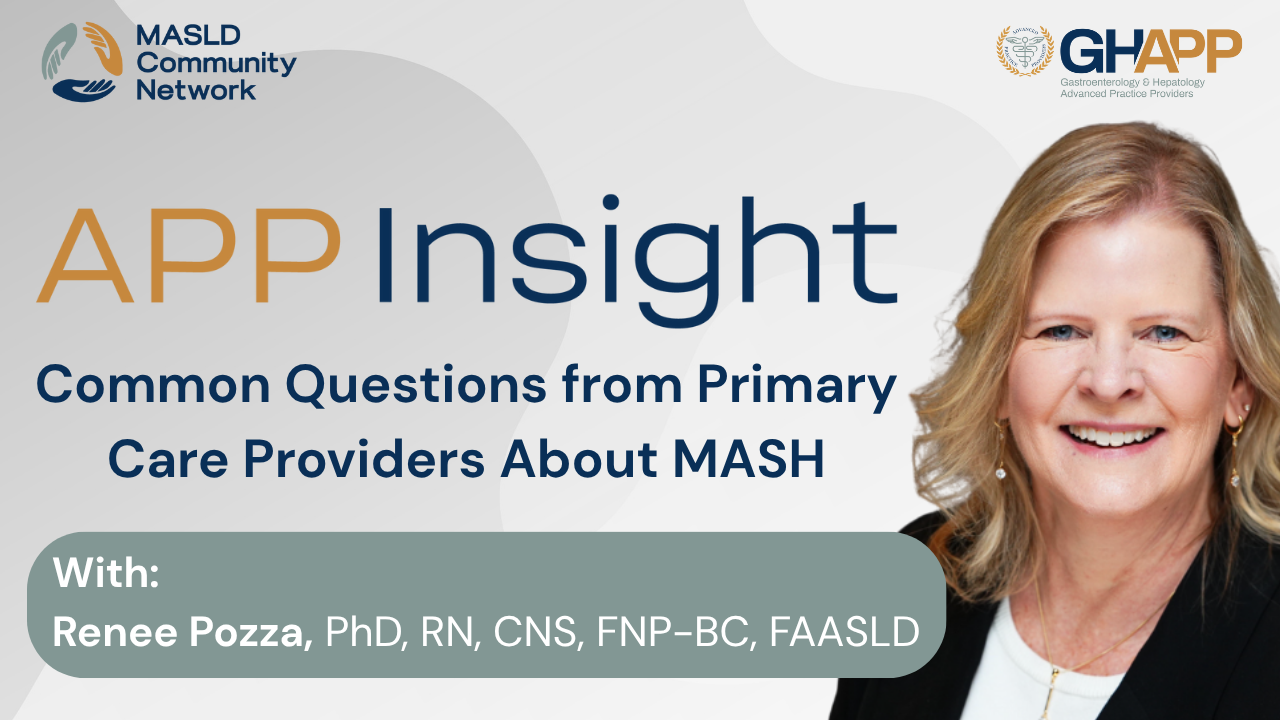
Common Questions From Primary Care Providers About MASH

Join Renee Pozza, a hepatology nurse practitioner with over 25 years of experience, as she answers two of the most common questions advanced practice providers face in managing metabolic-associated steatotic liver disease (MASLD) and metabolic-associated steatohepatitis (MASH). In this educational discussion, Renee explains how primary care NPs and PAs can identify patients at risk for fatty liver disease, what non-invasive tests—such as FIB-4 and FibroScan®—can be performed in various clinical settings, and when it’s appropriate to refer patients to hepatology for further evaluation. She also outlines key lifestyle modification strategies for patients with MASLD or MASH, including weight management, exercise, diabetes control, and multidisciplinary support to reduce disease progression and improve long-term liver outcomes. For more expert guidance, educational videos, and clinical tools for APPs in hepatology, visit the MASLD Community Network to access additional resources and upcoming programs.
Watch Now

Common Questions From Community GI About MASH

In this APP Insight, Tina Gregg, NP-C, from GI Associates, addresses two of the most common questions about MASLD and MASH that clinicians encounter in practice. First, she clarifies that normal liver enzymes do not rule out MASH or advanced fibrosis—up to half of biopsy-proven cases can present with normal ALT and AST levels. Tina explains why liver enzymes fluctuate, why traditional reference ranges may be misleading, and how clinicians can better interpret lab results in context. She also answers another frequent question: Are statins safe in patients with MASLD or MASH? Drawing on evidence from multiple large studies, Tina emphasizes that statins are both safe and beneficial for most patients with fatty liver disease and play a key role in managing cardiovascular risk. This session, part of the GHAPP MASLD & MASH Community Network, helps APPs dispel common misconceptions and make evidence-based decisions in liver and metabolic care.
Watch Now
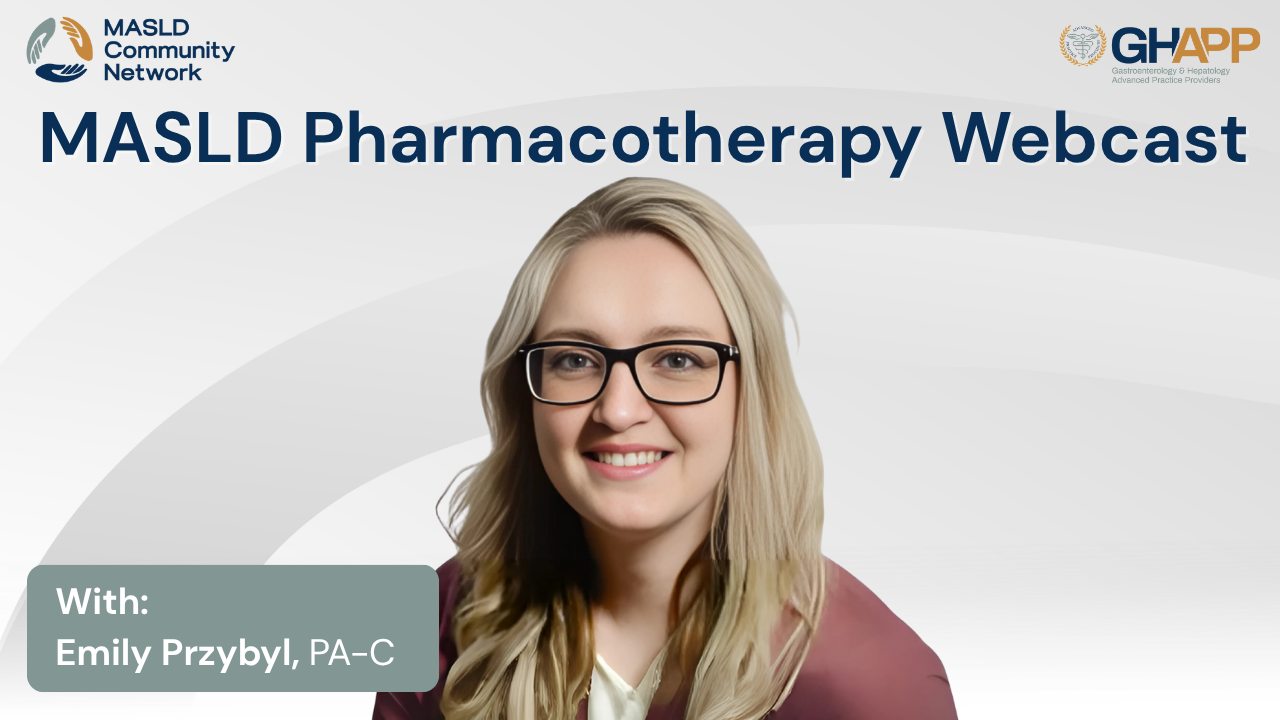
Webcast: MASLD Pharmacotherapy With Emily Przybyl

In this session, Emily Przybyl, PA-C from Erie County Medical Center in Buffalo, NY, explores current pharmacologic strategies for managing metabolic dysfunction–associated steatohepatitis (MASH) and metabolic dysfunction–associated steatotic liver disease (MASLD). She reviews the foundation of treatment—lifestyle modification, weight-loss interventions, and cardiovascular risk reduction—before detailing the evidence and clinical considerations for GLP-1 receptor agonists, vitamin E, pioglitazone, and the newly approved resmetirom. Emily discusses dosing strategies, histologic outcomes from major trials, and safety considerations including drug interactions, adverse effects, and monitoring recommendations. This presentation, part of the GHAPP MASLD & MASH Community Network and supported by Madrigal Pharmaceuticals, highlights how APPs can integrate emerging therapies into comprehensive, patient-centered management plans for MASLD and MASH.
Watch Now
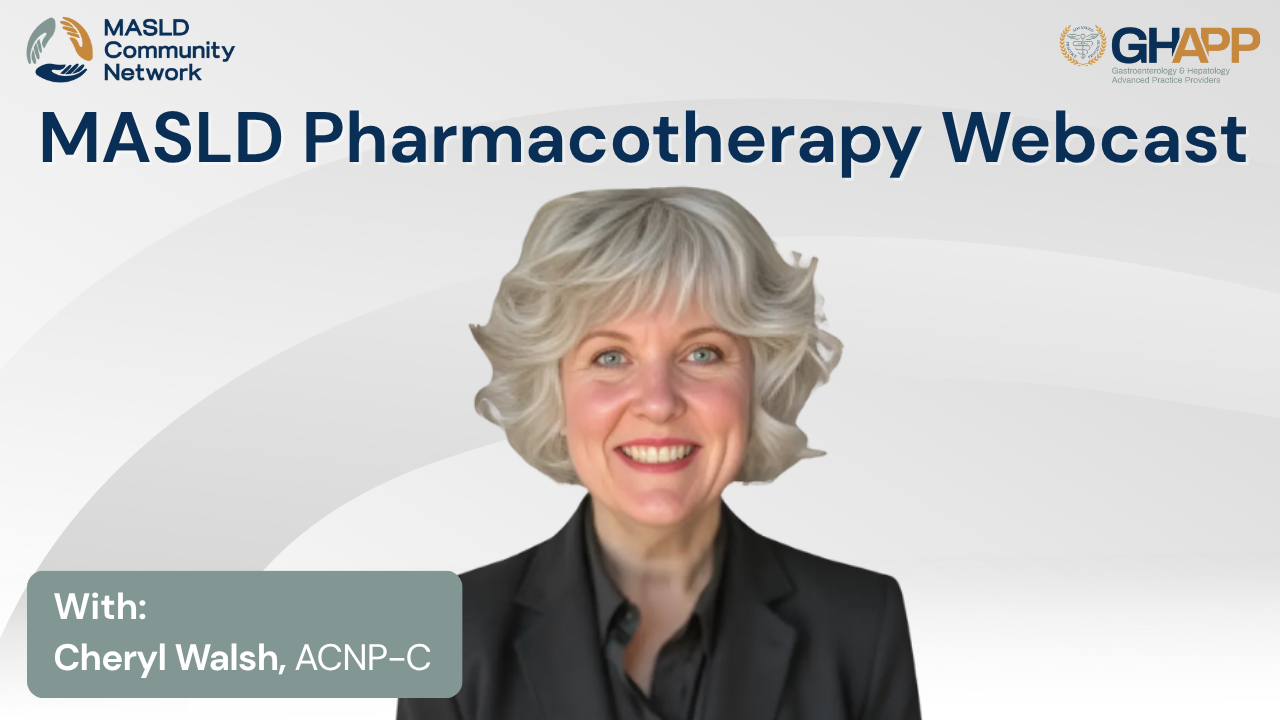
Webcast: MASLD Pharmacotherapy With Cheryl Walsh

In this talk, Cheryl Walsh, ACNP-C, reviews modern pharmacotherapy for MASLD/MASH—from foundational lifestyle/weight-loss strategies and GLP-1 receptor agonists to legacy options (vitamin E, pioglitazone) and the FDA-approved resmetirom with practical tips on dosing, monitoring, and drug–drug interactions (e.g., statins, procedure planning). She explains how to triage candidates, set realistic diet/exercise goals, and tailor guidance culturally, while outlining safety considerations (GI adverse effects, anesthesia risk) and follow-up with non-invasive tests. Presented via the GHAPP MASLD Community Network with support from Madrigal Pharmaceuticals, this session equips APPs to slow fibrosis progression and improve outcomes.
Watch Now

Webcast: MASLD vs MetALD With Edith Johannes

In this educational session, Edith Johannes, NP, explores the connection between Metabolic Dysfunction–Associated Steatotic Liver Disease and MetALD, using a real-world case to illustrate how metabolic risk factors and alcohol use interact to accelerate liver fibrosis. Presented through the GHAPP MASLD/MASH Community Network and supported by Madrigal Pharmaceuticals, this talk covers diagnostic evaluation using FibroScan, CAP scores, and PEth testing, explains how to distinguish MASLD from MetALD and ALD, and highlights key management strategies including Mediterranean diet, exercise, weight loss, and alcohol cessation. Edith also discusses when to consider resmetirom therapy and HCC screening, emphasizing early intervention to prevent disease progression.
Watch Now

Webcast: MASLD vs MetALD With Oyin Penny

In this educational session, Oyin Penny, FNP, from Premier Gastroenterology of Kansas City, discusses the overlap between MASLD and MetALD, highlighting how metabolic risk factors and alcohol intake accelerate liver injury and fibrosis. Presented through the GHAPP MASLD Community Network and supported by Madrigal Pharmaceuticals, this talk uses a real-world case study to explain diagnostic tools like FibroScan, CAP score, and PEth testing, along with clinical criteria for distinguishing MASLD, MetALD, and ALD. Key management strategies include Mediterranean diet, weight loss, alcohol abstinence, and monitoring for advanced fibrosis and HCC risk.
Watch Now
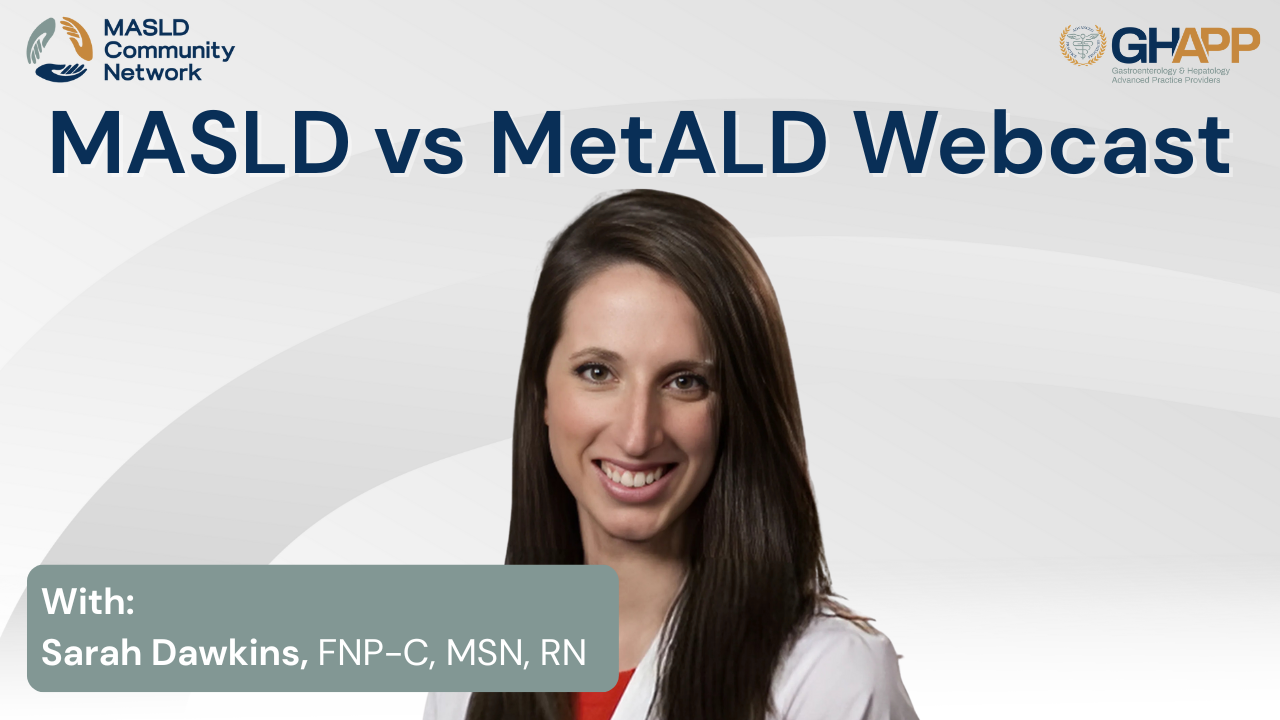
Webcast: MASLD vs MetALD With Sarah Dawkins

In this session, Sarah Dawkins, NP, breaks down the overlap between MASLD and MetALD using a real case (FIB-4 = 2.01, FibroScan 11.4 kPa [F3], CAP 310). Presented via the GHAPP MASLD Community Network and supported by Madrigal Pharmaceuticals, she reviews how to stage disease with non-invasive tests (FIB-4, FibroScan/VCTE), why alcohol biomarkers (PEth) matter, and when to initiate HCC surveillance. Practical takeaways include counseling on a Mediterranean diet, exercise/weight loss targets, alcohol abstinence, and assessing candidacy for resmetirom in metabolic-predominant cases to slow fibrosis and improve outcomes.
Watch Now

Webcast: MASLD vs MetALD Webcast

In this educational presentation, Emily Przybyl, PA-C, from Erie County Medical Center, explores the overlap between Metabolic Dysfunction–Associated Steatotic Liver Disease (MASLD) and MetALD, emphasizing how metabolic risk factors and alcohol intake accelerate liver injury and fibrosis. Presented through the GHAPP MASLD Community Network and supported by Madrigal Pharmaceuticals, this session uses a real-world case study to illustrate diagnostic evaluation, non-invasive testing (FibroScan, CAP score, FIB-4), and the role of PEth testing in objectively assessing alcohol use. Emily also highlights the importance of dietary changes, Mediterranean-style nutrition, weight reduction, and alcohol abstinence in preventing progression to cirrhosis and improving patient outcomes.
Watch Now

Webcast: MASLD vs MetALD With Scott Springer

In this educational session, Scott Springer, PA-C, from Erie County Medical Center, discusses the intersection of Metabolic Dysfunction–Associated Steatotic Liver Disease (MASLD) and MetALD—a condition involving both metabolic dysfunction and alcohol-related liver injury. Presented through the GHAPP MASLD Community Network and supported by Madrigal Pharmaceuticals, this talk highlights diagnostic challenges, alcohol-use quantification, and the importance of objective biomarkers like PEth testing for accurate classification. Using a real patient case, Scott explains how metabolic risk factors and alcohol intake synergistically accelerate fibrosis, and how clinicians can apply non-invasive tests (FibroScan, ELF, FIB-4) and counseling strategies to improve patient outcomes.
Watch Now

Webcast: Non-Invasive Testing With Tina Gregg

In this session, Tina Gregg, NP-C, reviews non-invasive testing (NITs) for MASLD and MASH, using a real-world case to show how to assess risk and stage fibrosis without biopsy. Learn when to use FIB-4, ELF, FibroScan (VCTE), and MR elastography, how to interpret cutoffs, and when to refer to hepatology. Practical takeaways include triaging indeterminate FIB-4 results, recognizing test limitations, and counseling patients on lifestyle and follow-up. Presented via the GHAPP MASLD Community Network.
Watch Now
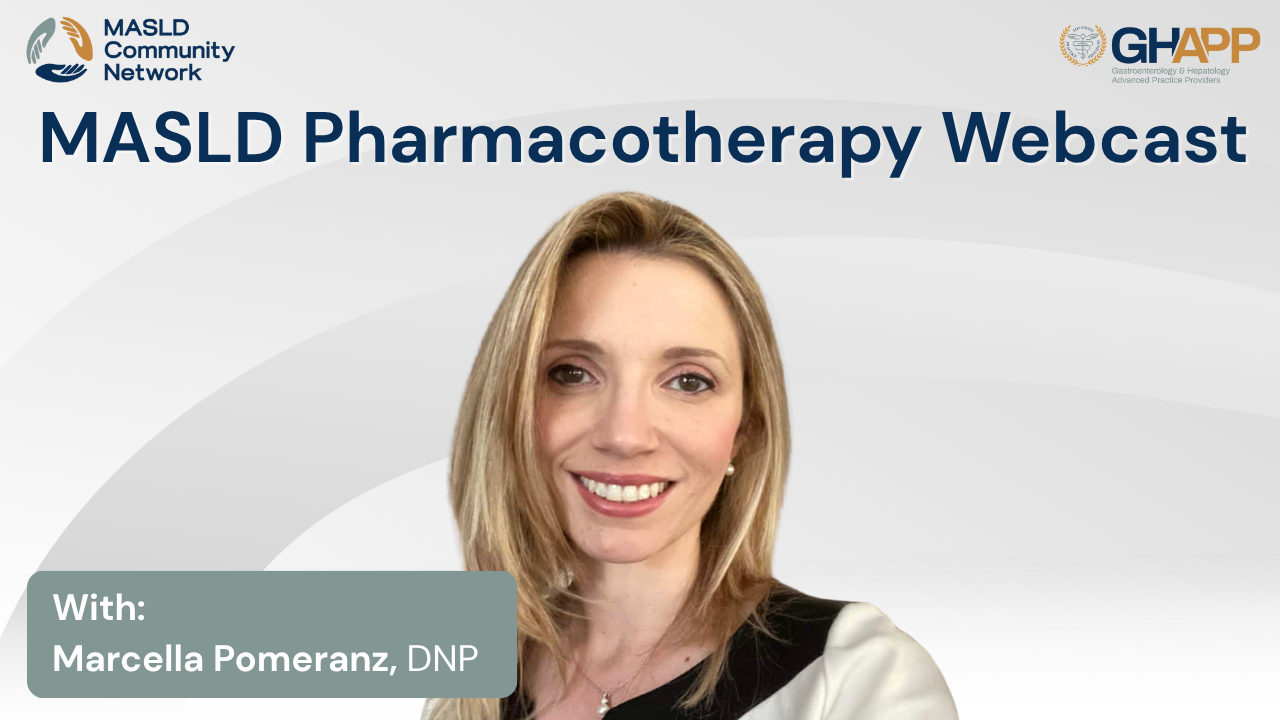
Webcast: MASLD Pharmacotherapy With Marcella Pomeranz

In this educational session, Marcella Pomeranz, DNP, explores the evolving pharmacotherapy options for Metabolic Dysfunction–Associated Steatotic Liver Disease (MASLD) and Metabolic Dysfunction–Associated Steatohepatitis (MASH). Presented through the GHAPP MASLD Community Network and supported by Madrigal Pharmaceuticals, this talk reviews both established and emerging therapies—from GLP-1 receptor agonists and pioglitazone to vitamin E and the recently approved resmetirom (Rezdiffra). Marcella discusses practical considerations for treatment selection, dosing adjustments, and medication safety, along with strategies to combine pharmacologic therapy with diet, exercise, and lifestyle modification to slow fibrosis progression and improve liver outcomes.
Watch Now

Webcast: Non-Invasive Testing With Marcella Pomeranz

In this educational session, Marcella Pomeranz, DNP, discusses the evolving role of non-invasive testing (NITs) in assessing Metabolic Dysfunction–Associated Steatotic Liver Disease and Metabolic Dysfunction–Associated Steatohepatitis. Presented through the GHAPP MASLD Community Network and supported by Madrigal Pharmaceuticals, this talk reviews key diagnostic tools such as FIB-4, ELF, and FibroScan, along with imaging modalities like vibration-controlled transient elastography (VCTE) and MR elastography. Viewers will learn how to interpret results, identify patients at risk for advanced fibrosis, and integrate these tests into clinical decision-making. The session also includes a real-world case study illustrating how NITs can guide patient management and reduce the need for liver biopsy.
Watch Now

Webcast: Lifestyle Management With Kristina Tuesday Werner

Learn how to effectively manage Metabolic Dysfunction–Associated Steatotic Liver Disease (MASLD) and Metabolic Dysfunction–Associated Steatohepatitis (MASH) through lifestyle interventions in this educational session presented by Tuesday Warner, NP, as part of the GHAPP MASLD Community Network. Using a real-world patient case, this session explores non-invasive testing (FIB-4, FibroScan), metabolic risk assessment, and the importance of personalized care strategies. Viewers will gain practical insights on optimizing diet, exercise, and behavioral modification—including calorie reduction, the Mediterranean diet, and sustainable weight loss—to improve liver outcomes and overall metabolic health. #MASLD #MASH #MetabolicLiverDisease #LifestyleManagement #NonInvasiveTesting #FIB4 #FibroScan #WeightLoss #MediterraneanDiet #Obesity #Diabetes #InsulinResistance #Hepatology #GHAPP
Watch Now
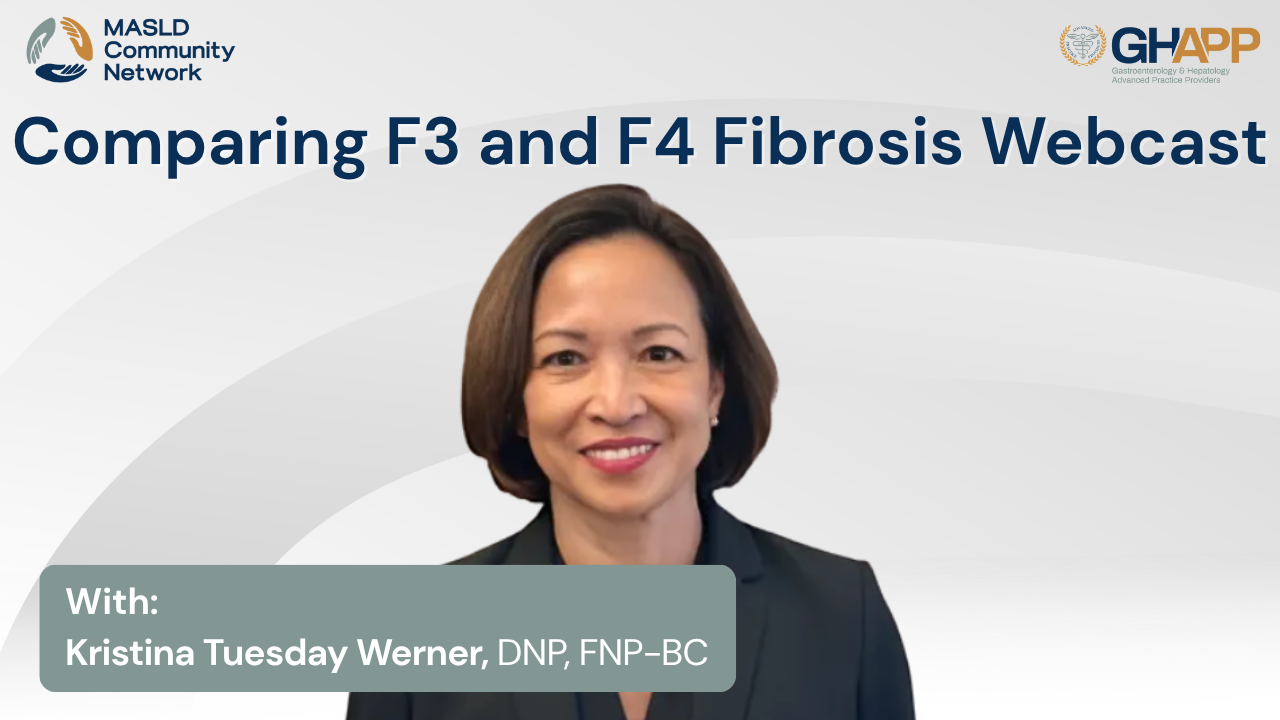
Webcast: Comparing F3 and F4 Fibrosis With Kristina Tuesday Werner

Tuesday Werner, NP, explains why accurately identifying F3 vs F4 fibrosis is critical in patients with MASLD/MASH. Using real patient case comparisons, she highlights how non-invasive tests like FIB-4, FibroScan, and ELF help determine disease severity, guide treatment, and reduce the need for biopsy. Tuesday reviews how care strategies differ—F3 patients focus on aggressive metabolic control and fibrosis monitoring, while F4 (cirrhosis) requires HCC surveillance, closer specialist follow-up, and potential transplant evaluation.
Watch Now
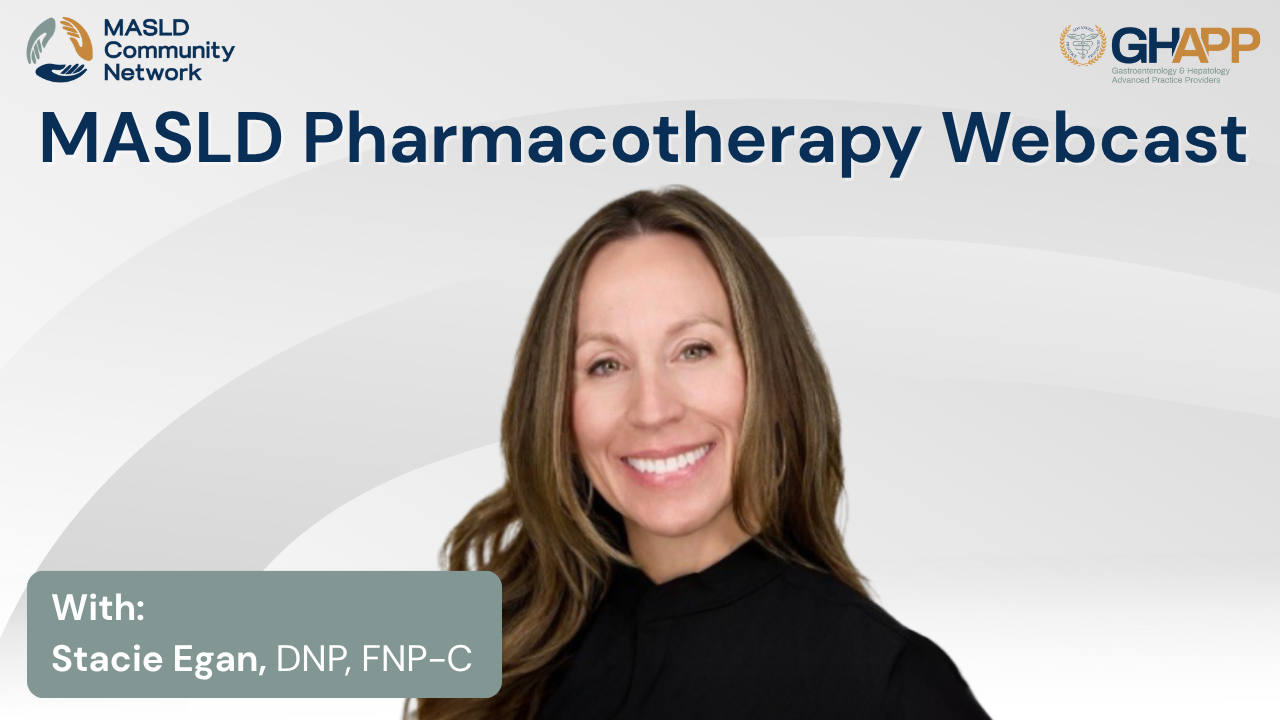
Webcast: MASLD Pharmacotherapy With Stacie Egan

Stacie Egan, FNP-C, talks about new and emerging ways to treat MASLD and MASH, including healthy lifestyle changes, GLP-1 medications for weight loss and diabetes, and the first FDA-approved treatment, Resmetirom, for patients with liver scarring (fibrosis). She explains how these options can improve liver health, what to consider when prescribing them, and how to monitor progress with simple, non-invasive tests.
Watch Now

Webcast: Non-Invasive Testing With Stacie Egan

Stacie Egan, FNP-C, discusses how non-invasive testing is transforming the way clinicians evaluate and manage MASLD/MASH. Using a real patient case, she explains how to interpret key tools like FIB-4, ELF, FibroScan (VCTE), and MR elastography to assess liver stiffness, steatosis, and fibrosis severity. Stacie also highlights practical considerations for accurate testing, when to order secondary assessments, and how to combine results with clinical judgment for optimal patient care. Learn how non-invasive diagnostics guide treatment decisions, support early intervention, and improve outcomes in metabolic liver disease.
Watch Now

Webcast: MASLD Basics With Punam Punja

Punam Punja, PA provides an overview of MASLD basics, explaining the 2023 terminology update that replaced NAFLD/NASH with MASLD/MASH and introduced MetALD for patients with metabolic dysfunction and alcohol exposure. Learn how to diagnose MASLD using imaging, metabolic risk factors, and non-invasive tests such as FIB-4, ELF, and FibroScan—plus when to refer for hepatology evaluation or liver biopsy. Punja also reviews staging, HCC surveillance, and practical lifestyle recommendations for patients at risk of fibrosis and cirrhosis.
Watch Now

Webcast: Comparing F3 and F4 Fibrosis With Punam Punja

Punam Punja, MMS, PA-C, explores how to distinguish F3 fibrosis from F4 cirrhosis in patients with MASLD/MASH using real-world case comparisons. Learn how to interpret non-invasive testing, including FibroScan, ELF score, and FIB-4, and understand how results guide treatment decisions, from lifestyle interventions and GLP-1 therapy to the role of resmetirom in advanced fibrosis. Punja also reviews key monitoring steps, including HCC surveillance, multidisciplinary care, and when to consider MRI elastography or liver biopsy for accurate staging.
Watch Now

Webcast: MASLD vs MetALD With Milly Ng

Milly Ng explores the intersection of metabolic dysfunction–associated steatotic liver disease (MASLD) and alcohol-related liver disease (ALD)—known as MetALD. Through a real-world patient case, she explains how metabolic risk factors like obesity, hypertension, and dyslipidemia interact with alcohol use to accelerate liver damage, fibrosis, and HCC risk. Learn how to identify and manage MetALD using FibroScan, PEth testing, and evidence-based strategies including lifestyle modification, alcohol cessation, and emerging therapies like resmetirom.
Watch Now
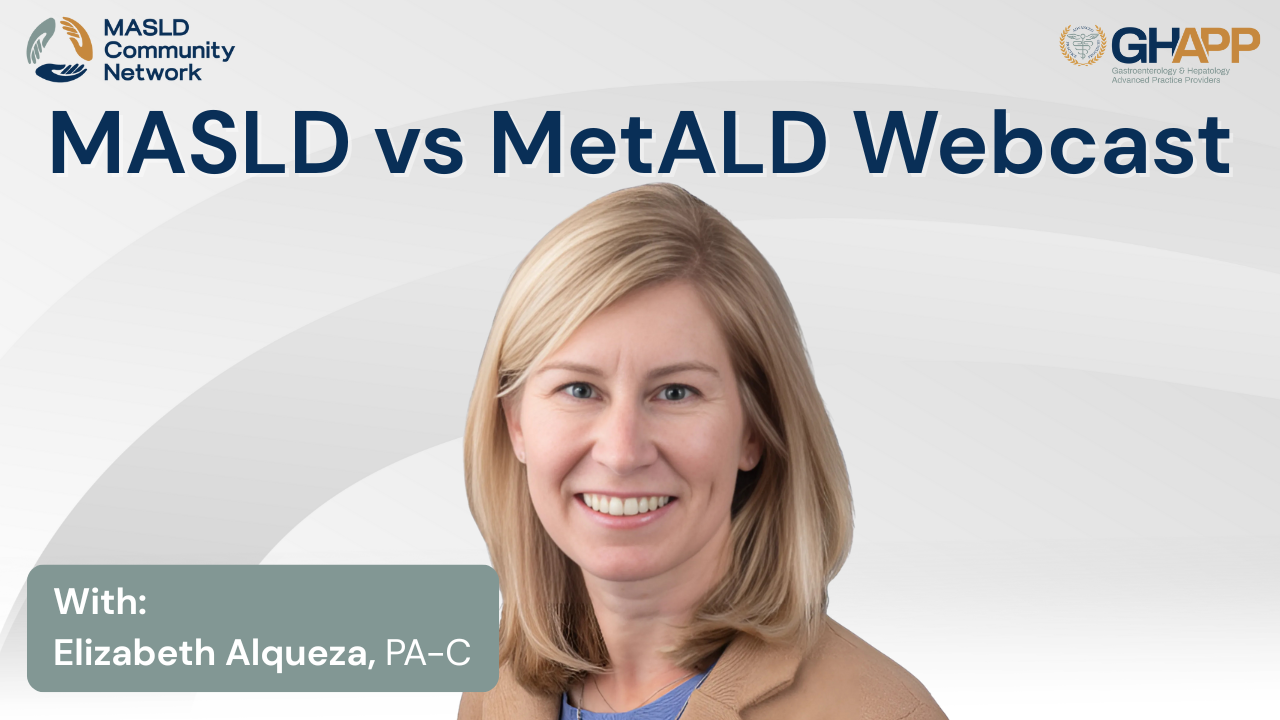
Webcast: MASLD vs MetALD With Elizabeth Alqueza

Elizabeth Alqueza, PA-C, explains MASLD and MetALD using a real patient case—covering risk factors (PCOS, BMI, HTN, lipids), how to stage disease with FibroScan/Liver Stiffness and CAP, and why alcohol plus metabolic dysfunction accelerates fibrosis. Learn practical steps: PEth biomarker to uncover alcohol use, lifestyle therapy (Mediterranean diet, weight loss), when resmetirom may be considered, and HCC surveillance for advanced fibrosis.
Watch Now

Webcast: MASLD vs MetALD With Brian Lam

Brian Lam, PA-C, breaks down MetALD—when metabolic dysfunction–associated steatotic liver disease (MASLD) meets alcohol use. Through a real patient case, he reviews risk factors (insulin resistance, triglycerides, BMI), how to interpret FibroScan/Liver Stiffness and CAP, and why alcohol accelerates fibrosis and raises HCC risk. Learn practical screening and counseling tips using AUDIT-C and PEth testing, plus when lifestyle change and therapies for MASH may be considered. Join the MASLD Community Network to connect with APP peers and access more evidence-based education.
Watch Now
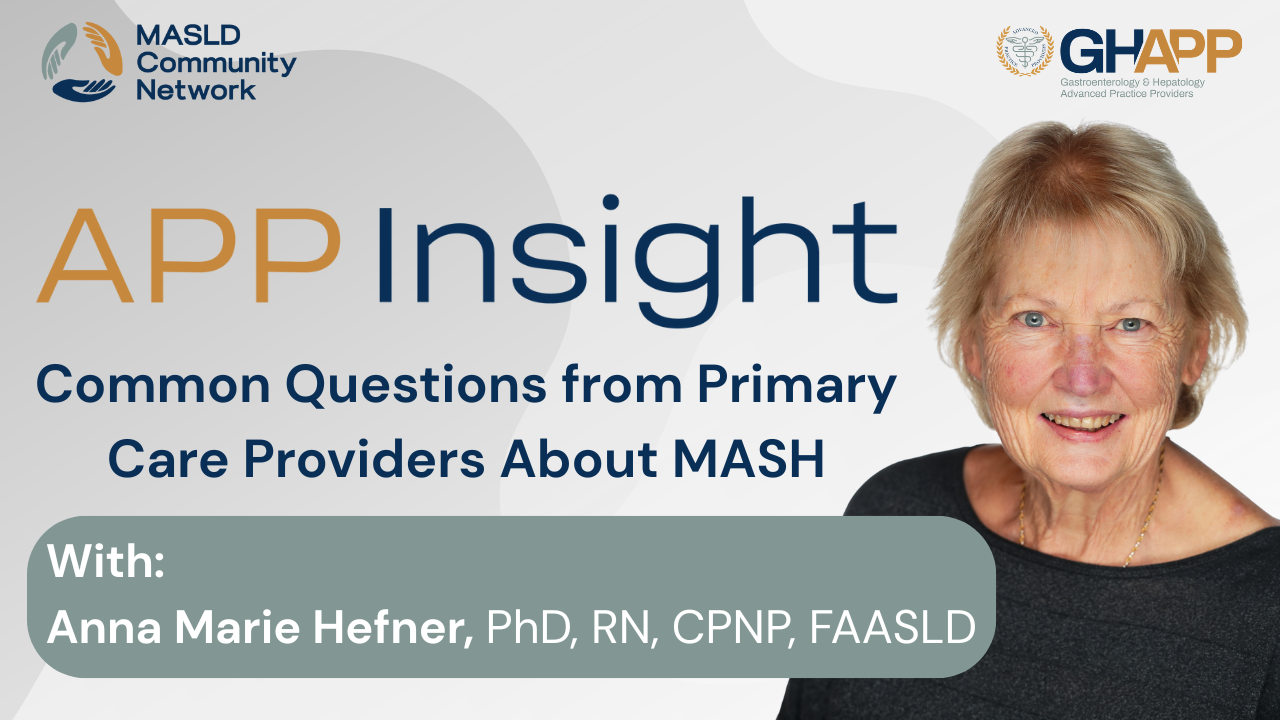
Common Questions From Primary Care Providers About MASH

In this educational video, Anna Marie Hefner, CPNP, a hepatology nurse practitioner at the Southern California Liver and GI Centers, shares valuable insights for primary care providers managing patients with fatty liver disease. Anna Marie explains how her community-based practice collaborates with local clinicians to streamline care for patients with MASLD (Metabolic Associated Steatotic Liver Disease) and MASH (Metabolic Associated Steatohepatitis). She outlines a clear approach for evaluating patients with elevated liver enzymes and fatty liver, including when to use non-invasive testing (NITs) such as FibroScan and how to interpret fibrosis stages (F0–F4) to guide next steps in management. Anna Marie emphasizes that patients with early-stage fibrosis (F0–F1) can often be managed in primary care with regular weight monitoring, labs, and annual imaging, while those with advanced fibrosis (F3–F4) require hepatology referral for specialized care and cirrhosis management. She also discusses how her team supports community physicians—offering FibroScan services, consultative guidance, and direct communication to ensure patients receive coordinated, evidence-based care. This session is a practical resource for APPs, hepatology teams, and primary care providers navigating fatty liver disease screening, risk stratification, and referral pathways.
Watch Now
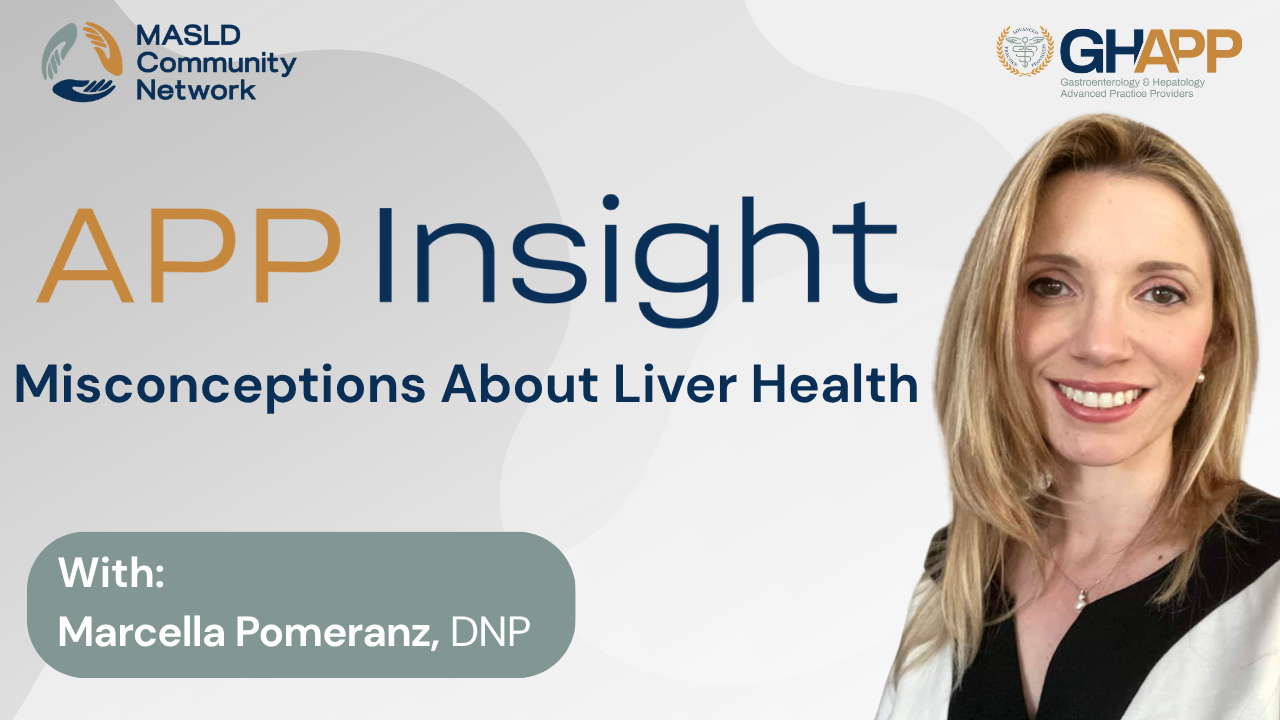
Misconceptions About Liver Health

In this educational discussion, Marcella Pomeranz, NP, lead nurse practitioner at Digestive Associates in Las Vegas, addresses one of the most common misconceptions she encounters in clinical practice—patients believing that only heavy alcohol use causes liver disease. Drawing on NHANES data, Marcella explains that nearly 38% of Americans have hepatic steatosis, and the vast majority of cases stem from MASLD (Metabolic Associated Steatotic Liver Disease), not alcohol. She highlights how factors such as metabolic dysfunction, high blood pressure, high cholesterol, diabetes, viral hepatitis, autoimmune liver diseases, genetic disorders like Wilson’s disease and hemochromatosis, and even medications like NSAIDs and methotrexate contribute to liver injury and fibrosis. Marcella also discusses the impact of ethnicity, noting that Hispanic patients face a higher risk of progression to cirrhosis. By helping patients understand that liver disease is often metabolic—not self-inflicted, clinicians can reduce stigma, encourage earlier detection, and promote lifestyle optimization to prevent fibrosis and cirrhosis. This session offers valuable insights for APPs, GI specialists, and hepatology providers dedicated to improving patient education and liver health outcomes.
Watch Now

Common Questions From Community GI About MASH

In this educational video, Tuesday Werner, DNP, from Mayo Clinic Arizona, answers some of the most common questions she receives from Community GI in regards to fibrosis in MASLD and MASH. With over 20 years of hepatology experience, she explains what it means to be diagnosed with fatty liver disease—whether discovered incidentally on imaging or in the presence of metabolic risk factors such as obesity, hypertension, hyperlipidemia, or diabetes. Tuesday emphasizes the importance of lifestyle modification, including 5–10% weight loss, regular exercise, and optimized management of metabolic conditions to slow or reverse disease progression. She also discusses how patients with advanced fibrosis or compensated cirrhosis can stay proactive through ongoing monitoring, ultrasound or MRI surveillance every six months, and close follow-up with their hepatology team. This conversation highlights the value of community support, patient education, and multidisciplinary care in improving long-term liver health and preventing complications from MASH and MASLD.
Watch Now

Webcast: MASLD Basics With Cheryl Walsh

In this MASLD Basics session of the MASLD & MASH Community Network, Cheryl Walsh, ACNP-C explains the new steatotic liver disease (SLD) nomenclature and how to apply it in practice. She clarifies definitions of MASLD, distinguishes MASH, and introduces overlap with MetALD by reviewing practical alcohol-intake thresholds. Cheryl outlines a stepwise primary-care pathway: start with FIB-4 to risk-stratify fibrosis, then use noninvasive tests such as elastography or the ELF blood test, with ultrasound/MRI as needed—and consider liver biopsy only for discordant or indeterminate results. You’ll learn when to reassess (F0–F1 every 2–3 years; F2–F3 annually with consideration of pharmacotherapy), when to refer to hepatology, and why fibrosis—not steatosis alone—drives prognosis. The talk also highlights global epidemiology, the stigma-reducing benefits of the new terminology, and patient counseling on lifestyle change (Mediterranean-style nutrition, activity, weight management) to alter disease trajectory.
Watch Now
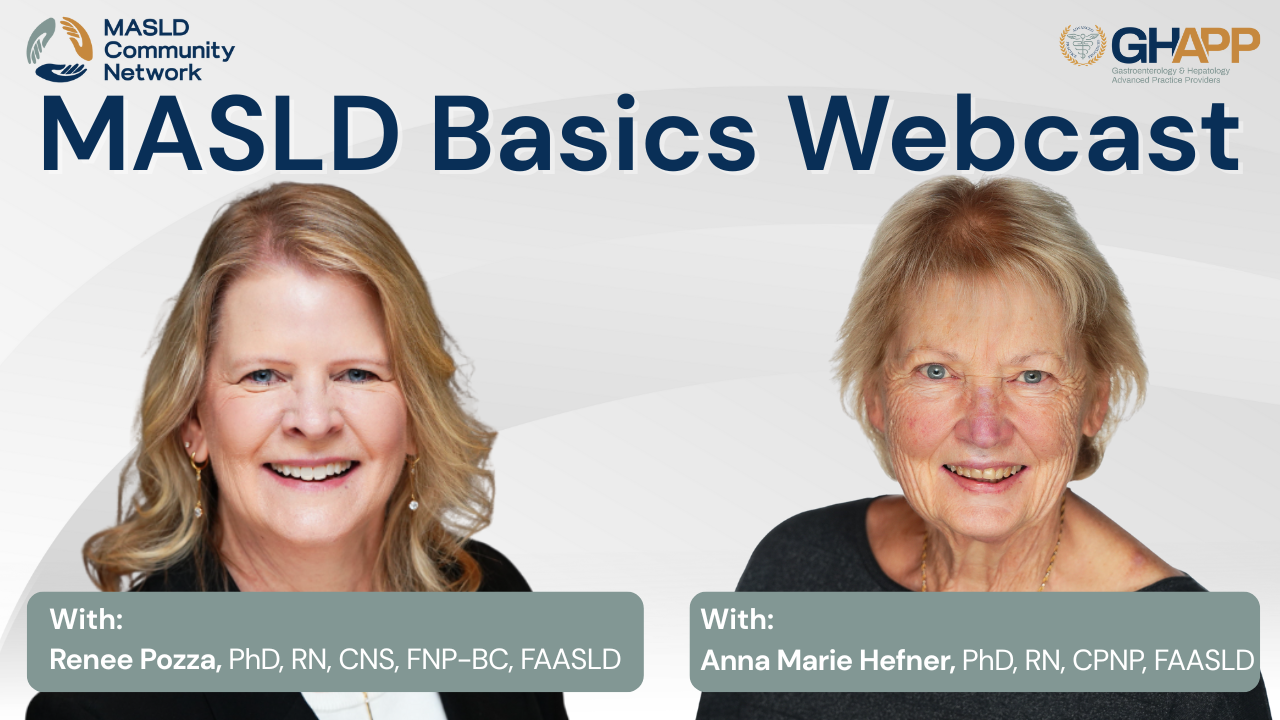
Webcast: MASLD Basics With Anna Marie Hefner & Renee Pozza

In this MASLD Community Network session, Anna Hefner, PhD, RN, CPNP, and Renee Pozza, PhD, RN, CNS, FNP-BC, of Southern California GI & Liver Centers break down the new nomenclature for steatotic liver disease (SLD) and what it means for clinical practice. They clarify how to distinguish MASLD from MASH, introduce the overlap category MetALD (metabolic-associated alcohol-related liver disease), and review differential causes of steatosis—from medications and viral hepatitis to genetic and cryptogenic etiologies. The faculty walk through practical primary-care screening with FIB-4, when to escalate with noninvasive tests (FibroScan® CAP/kPa, ELF), and the roles of ultrasound and MRI/MRE—plus when a liver biopsy is still warranted. You’ll learn staging cues (F0–F4), progression risk, who needs closer follow-up, and how to counsel patients on cardiometabolic risk reduction (weight loss, activity, triglyceride/HDL management, blood pressure, glucose). The talk also highlights pediatric considerations, terminology changes to reduce stigma, and tips for consistent waist-circumference measurement and alcohol-intake assessment—equipping PCPs, GI, and hepatology teams to identify fibrosis early and improve outcomes.
Watch Now
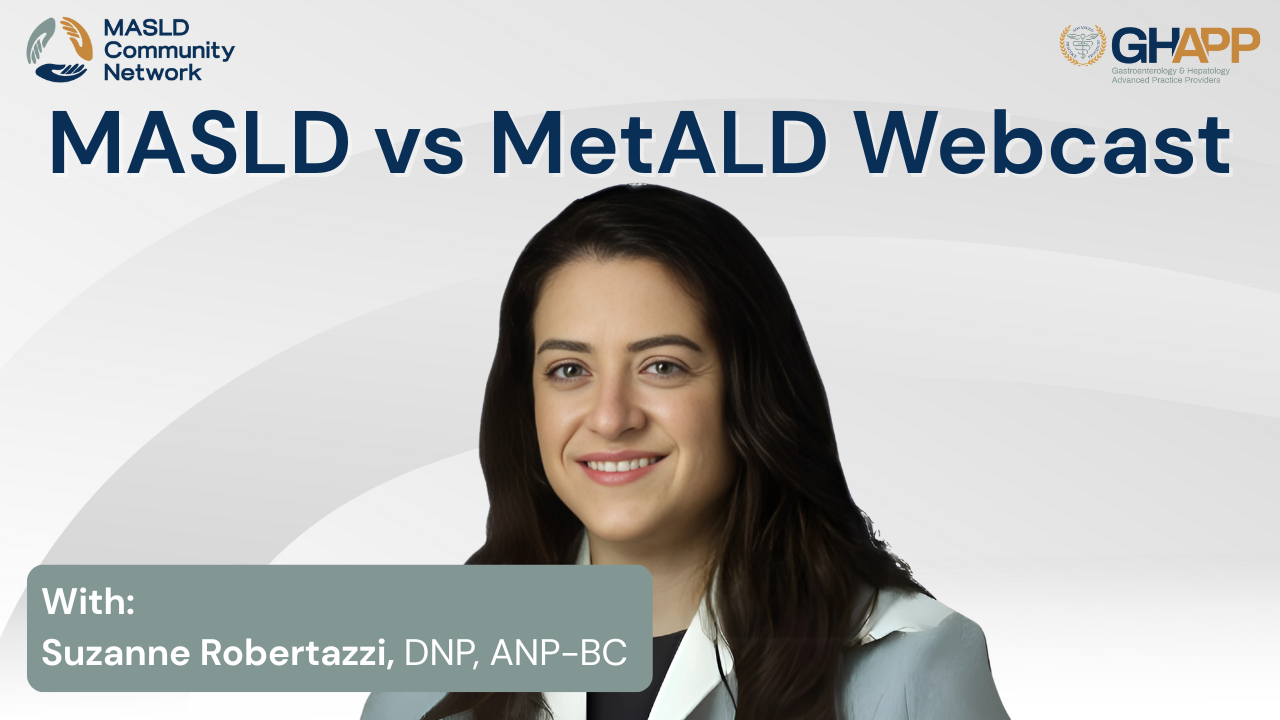
Webcast: MASLD vs MetALD With Suzanne Robertazzi

In this educational session, Suzanne Robertazzi, DNP, from the Washington DC VA Medical Center, explores the evolving understanding of metabolic dysfunction-associated steatotic liver disease (MASLD) and metabolic-alcohol related liver disease (MetALD). Using a real-world case study, she walks through diagnostic clues, risk factors, and management strategies for patients with metabolic and alcohol-related components of liver disease. Viewers will learn how to interpret FibroScan results, assess alcohol intake using biomarkers such as PEth, and understand how metabolic factors like hypertension, dyslipidemia, and insulin resistance accelerate disease progression. Suzanne also reviews how to distinguish MASLD from MetALD, when to consider HCC screening, and practical steps to support patients through alcohol cessation, weight loss, and lifestyle modification. This presentation is part of the MASLD Community Network lecture series, offering APPs and hepatology professionals key insights into accurate diagnosis, patient education, and comprehensive liver health management.
Watch Now
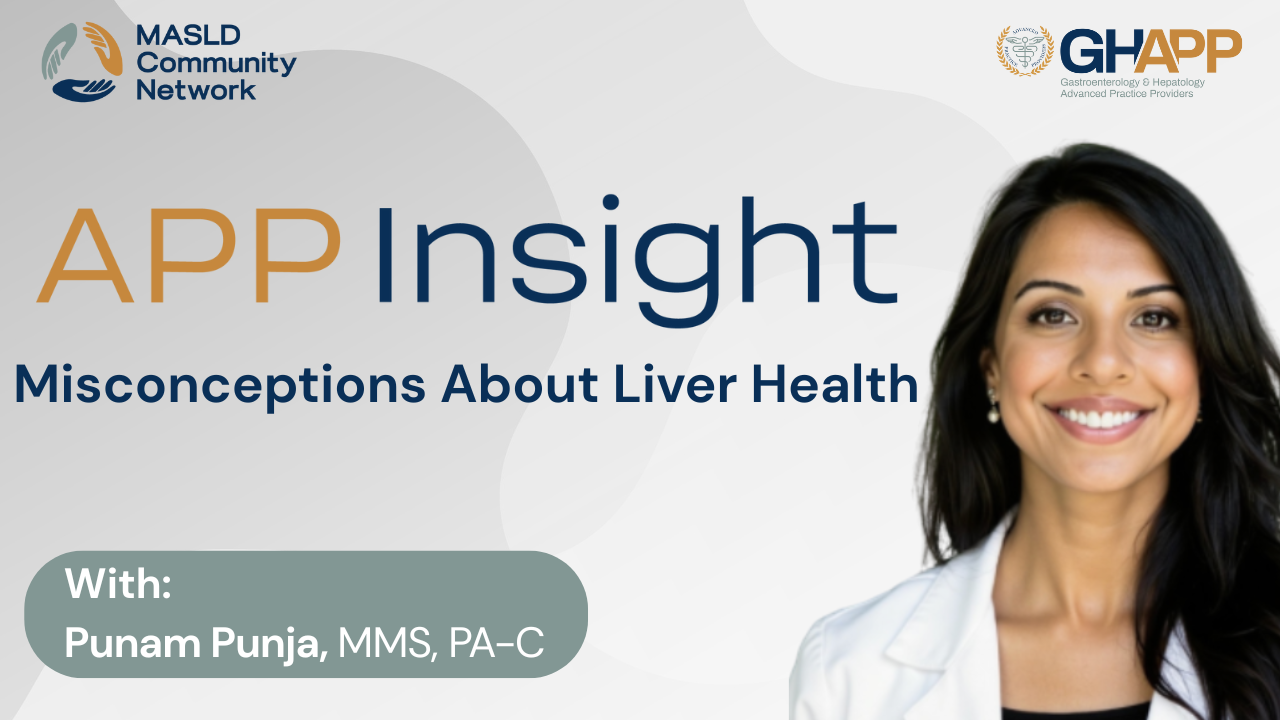
Misconceptions About Liver Health

In this educational video, Punam Punja, MMS, PA-C, from Emory Healthcare in Atlanta, debunks some of the most common misconceptions about liver health that often lead to confusion among patients. Drawing from over 15 years of experience in general hepatology, Punam clarifies that cirrhosis can be stable—and even partially reversible—if detected early, and that normal liver enzymes do not necessarily indicate a healthy liver. She emphasizes that acetaminophen can be used safely in moderation, even in patients with advanced fibrosis, and that symptom-free patients may still have significant liver disease. Punam also addresses myths around liver cleanses, viral versus autoimmune hepatitis, and the misconception that only alcohol or viruses cause fibrosis, highlighting MASLD (Metabolic Dysfunction–Associated Steatotic Liver Disease) as one of the most prevalent modern causes. She encourages providers and patients alike to stay informed and proactive in managing liver health.
Watch Now

Common Questions From Primary Care Providers About MASH

In this educational video, Cheryl Walsh, ACNP-C, from GI Alliance in Northwest Arkansas, shares practical guidance for primary care providers on how to effectively support patients with elevated liver enzymes. With nearly 15 years of experience in gastroenterology and hepatology, Cheryl explains how simple first steps—such as ordering imaging studies and incorporating the FIB-4 index into lab work—can provide valuable insight into whether a patient may have MASLD (Metabolic Dysfunction–Associated Steatotic Liver Disease) or even early fibrosis. She highlights how these preliminary evaluations streamline care, allowing hepatology specialists to move forward quickly with advanced imaging or elastography when needed. Cheryl underscores the importance of collaboration between primary care and GI teams to ensure early detection and better patient outcomes in metabolic liver disease.
Watch Now

Webcast: MASLD vs MetALD With Lindsay Pratt

Learn from Lindsay Pratt, PA-C at the University of Colorado Hepatology Clinic, as she explores the evolving landscape of metabolic dysfunction–associated steatotic liver disease (MASLD) and metabolic dysfunction and alcohol-associated liver disease (MetALD) in this comprehensive, case-based discussion. Drawing on over 15 years of experience in hepatology and liver transplantation, Lindsay walks through real-world evaluation and management of a 52-year-old patient with hepatic steatosis, highlighting key diagnostic clues, lab interpretations, and the importance of incorporating objective biomarkers such as PEth testing to accurately assess alcohol use. This educational session provides clarity on differentiating MASLD, MASH, and MetALD, interpreting FibroScan results, and addressing cardiometabolic risk factors like obesity, hypertension, and hyperlipidemia. Pratt also emphasizes practical treatment strategies, including lifestyle modification, GLP-1 therapy, and alcohol cessation counseling, along with considerations for emerging therapies like resmetirom (Rezdiffra). APPs and hepatology clinicians will gain valuable insights into patient communication, disease classification, and evidence-based management approaches that can help slow progression, reduce fibrosis risk, and optimize liver outcomes.
Watch Now
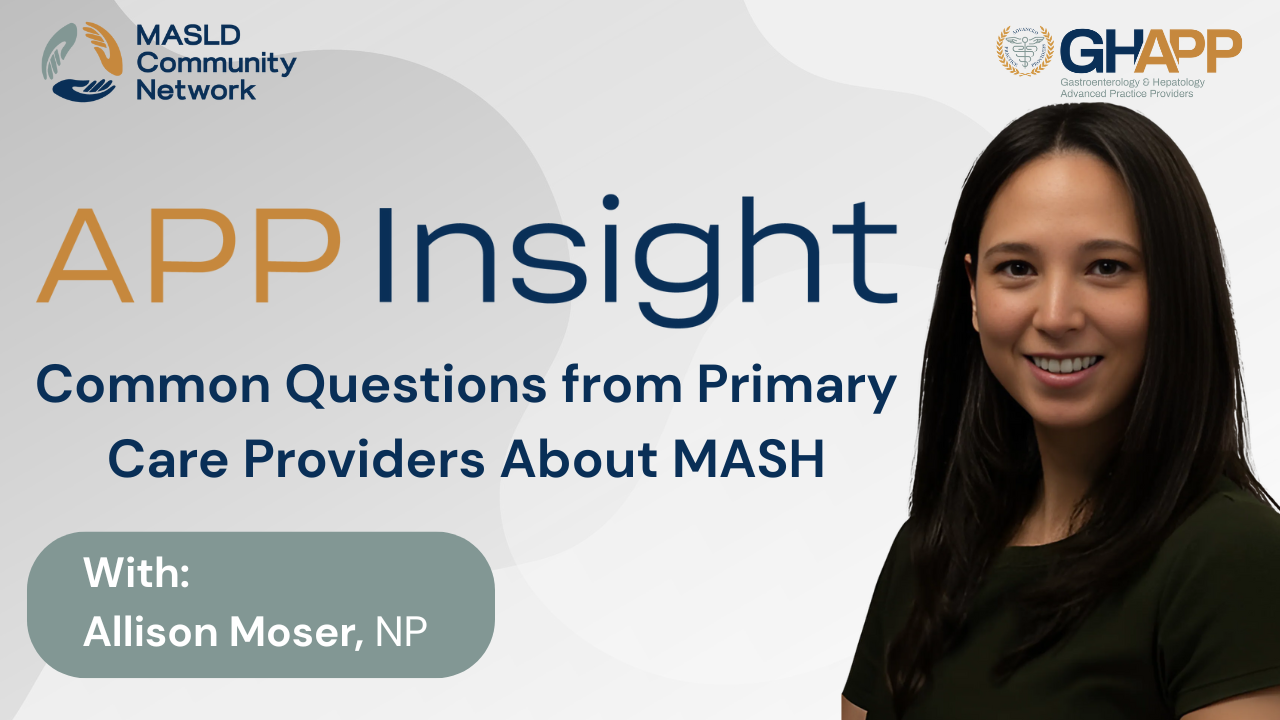
Common Questions From Primary Care Providers About MASH With Allison Moser

In this quick and practical episode, Allison Moser, a hepatology nurse practitioner at Rush University Medical Center in Chicago, answers three of the most common patient questions about metabolic dysfunction–associated steatohepatitis (MASH). She explains how MASH differs from MASLD (fatty liver disease without damage), why it develops in people who don’t drink alcohol, and how it can be reversed with lifestyle changes and new FDA-approved therapies. Allison highlights the link between MASH and metabolic syndrome conditions such as type 2 diabetes, obesity, high cholesterol, and hypertension, underscoring the importance of early identification and treatment. She also discusses the effectiveness of weight loss, dietary approaches like the Mediterranean diet, physical activity, and emerging pharmacologic therapies including resmetirom and semaglutide for patients with stage 2–3 fibrosis. Designed to keep the message simple and patient-centered, this video offers guidance for patients, families, and providers who want to better understand MASH, its risks, and how early action can reverse liver damage and prevent progression to cirrhosis.
Watch Now

Common Questions From Primary Care Providers About MASH With Stacie Egan

In this educational session, Stacie Egan, DNP at Ogden Clinic GI in Ogden, Utah, shares practical insights on managing patients with MASH and fibrosis in clinical practice. Drawing from her experience treating patients with F2–F3 fibrosis, Stacy highlights the effectiveness of emerging pharmacotherapies and the positive outcomes she has seen in her patients. She emphasizes the critical role of primary care providers as gatekeepers in identifying at-risk patients, particularly those with metabolic syndrome, type 2 diabetes, obesity, hypertension, or hyperlipidemia. By utilizing simple tools like the FIB-4 score, primary care teams can begin the process of risk stratification and ensure that patients receive timely referrals for additional testing such as FibroScan, MRE, or liver biopsy. Stacie also discusses the importance of distinguishing between low, indeterminate, and high-risk patients, ensuring that those with advanced fibrosis (F2, F3, and F4) receive appropriate treatment, monitoring, and, when needed, referral to hepatology for transplant evaluation. This video serves as an important resource for providers across specialties, reinforcing the need for collaboration to detect and treat MASH with fibrosis early, improve patient outcomes, and help reverse steatosis and fibrosis.
Watch Now

Common Questions From Community GI About MASH With Maribeth Capuno

In this educational session, Maribeth Capuno, Adult Nurse Practitioner specializing in hepatology at the Richmond VA Medical Center, answers two of the most common questions clinicians face about Metabolic Associated Steatotic Liver Disease (MASLD) and Metabolic Associated Steatohepatitis (MASH). She explains how elevated liver enzymes—particularly when ALT is greater than AST—can be an early signal to investigate further, and why obtaining a baseline ultrasound and, when possible, a FibroScan are key steps in assessing liver health. Maribeth also covers how to determine the right time to repeat non-invasive liver testing, especially in patients with higher-risk metabolic conditions such as diabetes, and highlights the role of tests like Fib-4 and the ELF test in identifying fibrosis risk. Whether you’re a healthcare provider managing patients with liver disease or someone seeking to understand the latest non-invasive approaches to MASLD and MASH, this video provides practical guidance on monitoring, testing frequency, and risk assessment strategies that can improve patient care and outcomes.
Watch Now
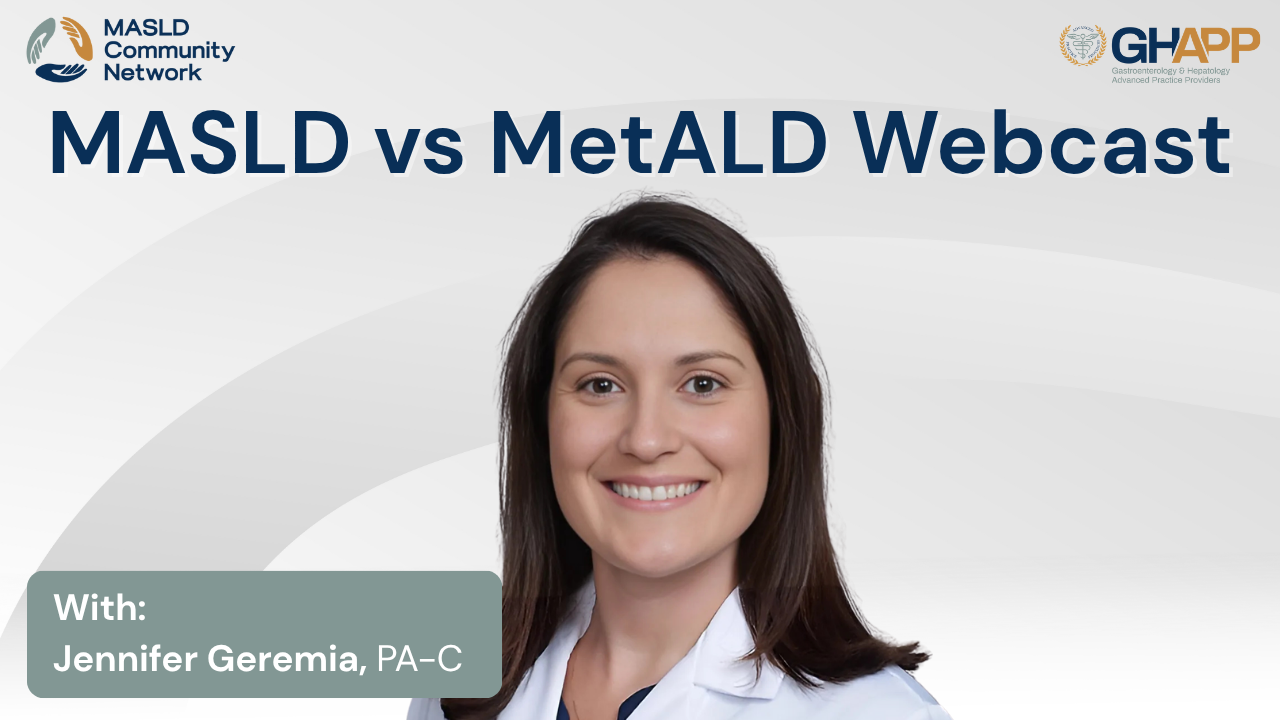
Webcast: MASLD vs MetALD With Jennifer Geremia

In this GHAPP MASLD Community Network presentation, Jennifer Geremia, PA-C explains how to differentiate metabolic dysfunction–associated steatotic liver disease (MASLD) from metabolic dysfunction plus alcohol-associated liver disease (MetALD) and how to manage patients who sit on the MASLD–MetALD spectrum. Using a classic case (52-year-old with BMI 29.4, PCOS, hypertension, hyperlipidemia, ultrasound-confirmed steatosis, FibroScan 11.4 kPa [F3] and CAP 310), she shows how to combine history, “standard drink” counseling, AUDIT-C screening, and objective biomarkers like PEth to uncover under-reported alcohol use, quantify grams/day or week, and classify risk. You’ll learn practical algorithms for ruling out alternative etiologies, assessing cardiometabolic drivers, interpreting noninvasive tests, and estimating 5-year decompensation risk across MASLD, MetALD, and ALD. The session closes with actionable care steps: lifestyle and Mediterranean-style nutrition, exercise and weight-loss targets, strict alcohol cessation (and referral when appropriate), consideration of pharmacologic options in advanced fibrosis, and when to initiate HCC surveillance. Scan the QR code to confirm attendance and access more MASLD/MetALD education and resources.
Watch Now
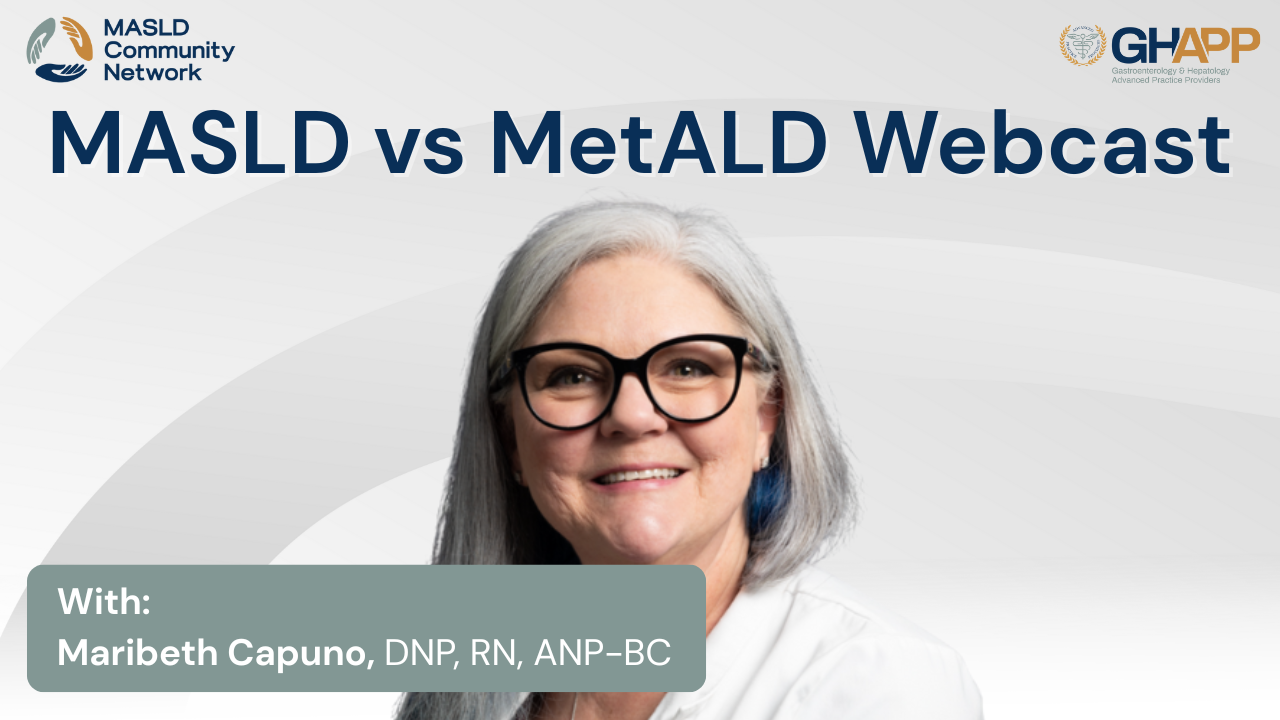
Webcast: MASLD vs MetALD With Maribeth Capuno

In this case-based talk from the GHAPP MASLD Community Network, Maribeth Capuno, DNP reviews how to differentiate metabolic dysfunction–associated steatotic liver disease (MASLD) from metabolic dysfunction plus alcohol-associated liver disease (MetALD). Using a 52-year-old patient with ultrasound-confirmed steatosis, metabolic risks (PCOS, hypertension, hyperlipidemia, prediabetes), and daily wine intake, she walks through labs and noninvasive testing—FibroScan 11.4 kPa (F3 fibrosis) and CAP 310 (severe steatosis)—plus an objective PEth biomarker of 120 indicating moderate–heavy alcohol use. The session covers the SLD spectrum, “standard drink” counseling, why questionnaires (AUDIT) and biomarkers (PEth) uncover under-reported alcohol use, and how alcohol synergizes with insulin resistance and dyslipidemia to accelerate fibrosis and decompensation risk. Practical management includes Mediterranean-style nutrition, exercise with 5–10% weight-loss goals, strict alcohol cessation, medication considerations for advanced fibrosis, and HCC surveillance in F3 disease. Ideal for APPs and hepatology clinicians, this video delivers step-by-step evaluation, diagnostic criteria, and clear, patient-education talking points to improve MASLD/MetALD assessment and outcomes.
Watch Now
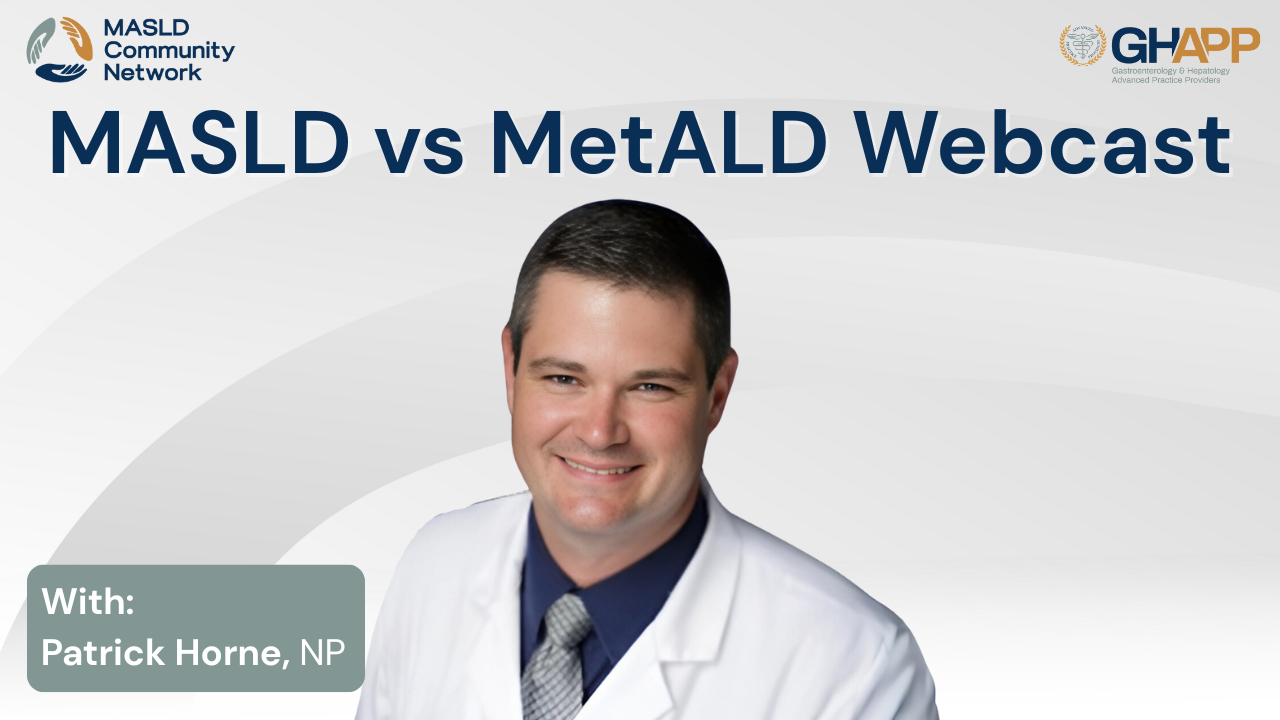
Webcast: MASLD vs MetALD With Patrick Horne

In this case-based session from the GHAPP MASLD Community Network, Patrick Horne, NP explains how to differentiate metabolic dysfunction–associated steatotic liver disease (MASLD) from metabolic dysfunction plus alcohol-associated liver disease (MetALD). Through the story of a 52-year-old patient with F3 fibrosis and severe steatosis, he reviews the modern SLD framework, metabolic risk factors (e.g., BMI, PCOS, hypertension, hyperlipidemia), and how alcohol intake interacts with insulin resistance, the gut microbiome, and hepatic lipid handling to accelerate inflammation and fibrosis. Patrick demonstrates practical tools—clear “standard drink” counseling, thorough history, AUDIT-C screening, and objective biomarkers like PEth—to uncover under-reported alcohol use and classify patients on the MASLD–MetALD–ALD spectrum. Management takeaways include Mediterranean-style nutrition, exercise and weight-loss targets, consideration of pharmacologic options in advanced fibrosis, firm guidance on alcohol cessation, and nuanced discussion of HCC surveillance in F3 disease. Ideal for APPs and hepatology clinicians, this talk delivers actionable algorithms, definitions, and trial-readiness considerations to standardize MetALD assessment and improve outcomes in steatotic liver disease.
Watch Now
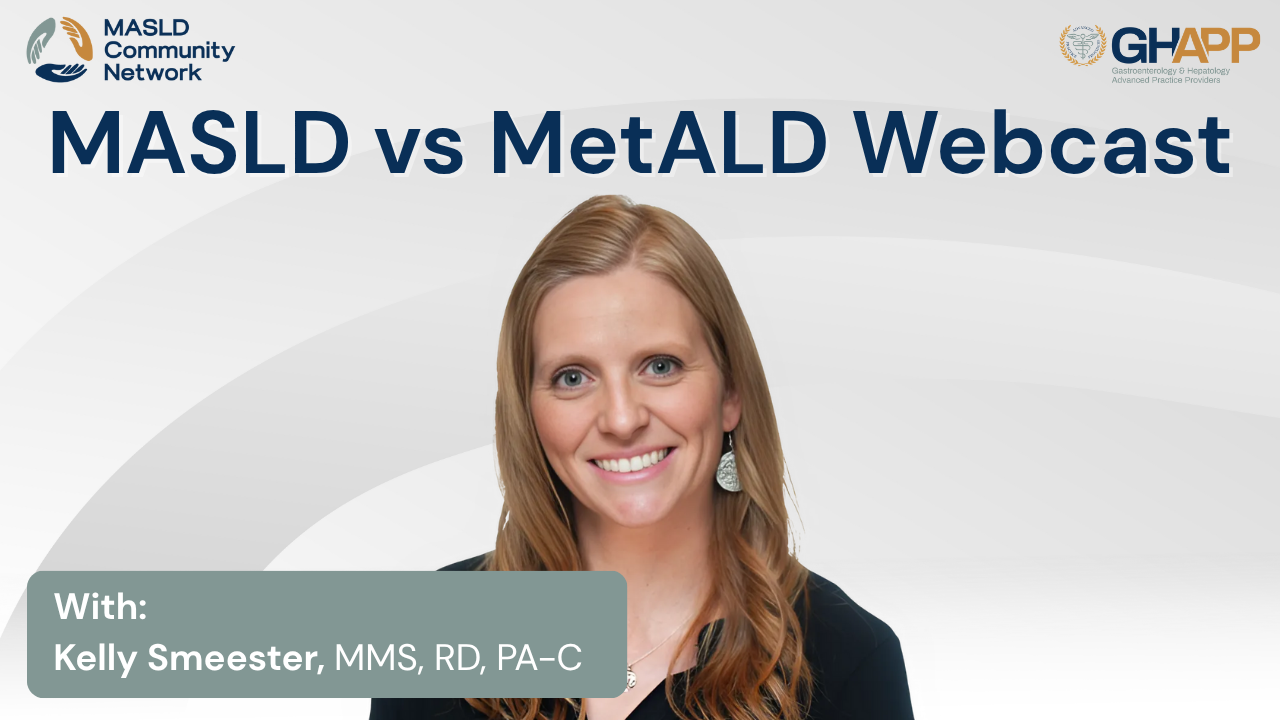
Webcast: MASLD vs MetALD With Kelly Smeester

In this session from the GHAPP MASLD Community Network, Kelly Smeester, PA-C at South Denver Gastroenterology, reviews a patient case to highlight the overlap between metabolic dysfunction–associated steatotic liver disease (MASLD) and metabolic dysfunction plus alcohol-associated liver disease (MetALD). Using real-world labs, FibroScan values, CAP scores, and the PEth biomarker, she explains how clinicians can distinguish MASLD from MetALD and alcohol-related liver disease. The discussion covers key metabolic risk factors such as PCOS, hypertension, and hyperlipidemia, the impact of moderate alcohol intake, and how these drivers accelerate fibrosis progression and increase the risk of decompensation. Viewers will learn how to evaluate alcohol use through standardized definitions, clinical questionnaires, and biomarkers, as well as best practices for patient education, lifestyle counseling, and management, including diet, exercise, pharmacologic options, and hepatocellular carcinoma (HCC) surveillance. This case-based talk emphasizes why accurate diagnosis and objective assessment of alcohol consumption are essential for both clinical care and research in steatotic liver disease.
Watch Now

Webcast: MASLD vs MetALD With Summer Collier

In this educational session from the GHAPP MASLD Community Network, Summer Collier, NP at UC San Diego Health, explores the overlap between metabolic dysfunction–associated steatotic liver disease (MASLD) and metabolic dysfunction plus alcohol-associated liver disease (MetALD) through a detailed clinical case study. Using real-world patient data, she highlights key considerations for evaluating, diagnosing, and managing steatotic liver disease, with special focus on teasing out the dual drivers of metabolic risk factors and alcohol consumption. Viewers will learn about diagnostic tools such as FibroScan, CAP scores, and PEth testing, and how these objective biomarkers help distinguish true MASLD from alcohol-driven disease. The discussion also covers pathophysiology, risk of fibrosis progression, patient counseling on lifestyle and alcohol cessation, current treatment recommendations, and hepatocellular carcinoma (HCC) screening in advanced fibrosis. Whether you are a hepatology provider, APP, or clinician interested in MASLD and MetALD, this session provides practical insights into patient education, disease classification, and the importance of standardized definitions for clinical care and research.
Watch Now
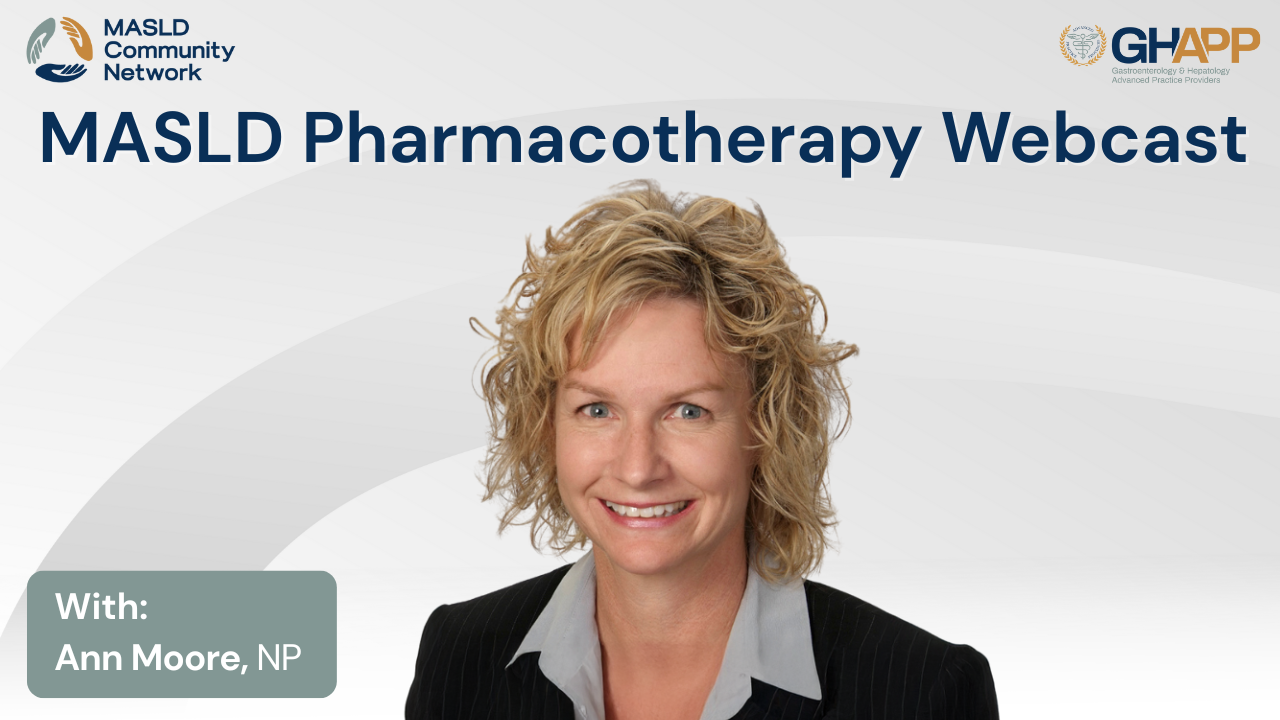
Webcast: MASLD Pharmacotherapy With Ann Moore

Ann Moore, NP, Arizona Liver Health, delivers a practical overview of MASLD pharmacotherapy for the GHAPP MASLD Community Network, sponsored by Madrigal Pharmaceuticals. She covers the treatment toolbox—from lifestyle foundations (Mediterranean-style nutrition, sustainable weight loss, physical activity) and obesity/diabetes therapies (GLP-1 and GLP-1/GIP agents, bariatric surgery) to liver-directed options like vitamin E (in select non-diabetic patients), pioglitazone (for type 2 diabetes), and the THR-β agonist resmetirom for adults with non-cirrhotic MASH and F2–F3 fibrosis. You’ll learn when to stage with non-invasive tests (FibroScan®, ELF, MRI-PDFF), how to pair systemic and liver-targeted therapies, key safety and drug–drug considerations, and practical monitoring tips to keep patients on track. Ideal for APPs and GI/hepatology clinicians seeking an up-to-date, patient-centered roadmap to slow fibrosis and improve liver outcomes.
Watch Now

Webcast: MASLD vs MetALD With Tessa Janovsky

Tessa Janovsky, PA-C, Arizona Liver Health, delivers a clear, case-based overview of metabolic dysfunction–associated steatotic liver disease (MASLD), MASH, and mixed-etiology MET-ALD. Using a common clinic scenario, she explains how to recognize fatty liver on imaging, why an accurate alcohol history matters, and how non-invasive tools (FibroScan stiffness/CAP and alcohol biomarkers like PEth) guide staging and care. You’ll learn practical, patient-friendly steps—Mediterranean-style nutrition, sustainable weight loss, regular aerobic and resistance exercise, and alcohol cessation—plus when to consider medications, specialist referral, and ongoing surveillance to prevent progression to advanced fibrosis and cirrhosis. Ideal for APPs and GI clinicians seeking straightforward strategies to manage MASLD/MASH in everyday practice.
Watch Now

Webcast: MASLD vs MetALD With Chantil Jeffreys

Chantil Jeffreys, FNP at Gastro One, offers a clear, case-based overview of metabolic dysfunction–associated steatotic liver disease (MASLD), MASH, and mixed-etiology MET-ALD. Using a common clinic scenario, she explains how to recognize steatotic liver disease, why accurate alcohol history matters, and how non-invasive tools (e.g., FibroScan for stiffness and CAP, alcohol biomarkers like PEth/EtG) can clarify what’s driving liver injury. You’ll get practical guidance on lifestyle therapy—Mediterranean-style nutrition, sustainable weight loss, and regular aerobic plus resistance exercise—along with when to consider medications, specialist referral, and HCC surveillance. Ideal for APPs and GI clinicians seeking a simple, patient-centered approach to preventing progression from fatty liver to advanced fibrosis and cirrhosis.
Watch Now
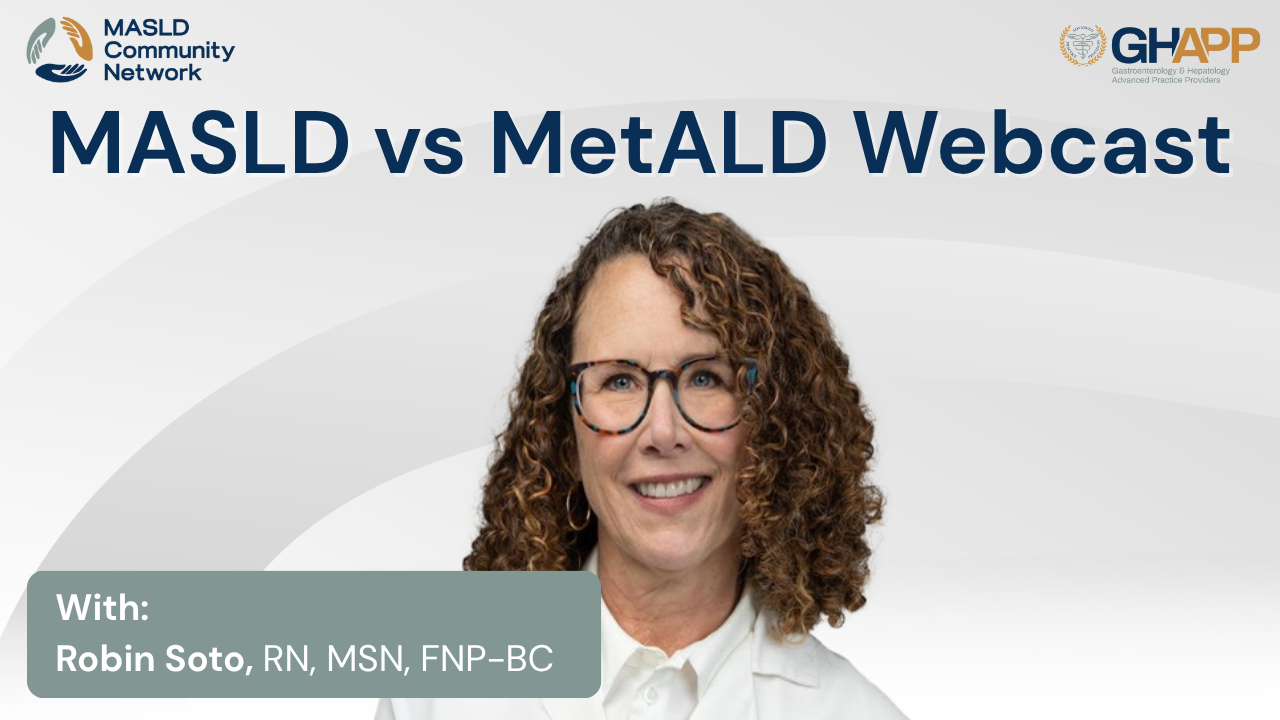
Webcast: MASLD vs MetALD With Robin Soto

Robin Soto, NP, UC San Diego Health, delivers a clear, case-based overview of metabolic dysfunction–associated steatotic liver disease (MASLD), MASH, and mixed-etiology MET-ALD for the GHAPP MASLD Community Network. Using a common clinic scenario, she explains how to recognize steatotic liver disease, why getting an accurate alcohol history matters, and how non-invasive tools (e.g., FibroScan® and alcohol biomarkers) help confirm what’s driving liver injury. You’ll hear practical guidance on counseling patients—Mediterranean-style nutrition, sustainable weight loss, regular aerobic and resistance exercise, and alcohol reduction/abstinence—plus when to involve specialists and consider ongoing surveillance. Ideal for APPs and GI clinicians looking for a simple, patient-centered approach to preventing progression from fatty liver to advanced disease.
Watch Now

Webcast: MASLD vs MetALD With Valerie Shin

Valerie Shin, NP from UCLA Health’s Pfleger Liver Institute, hosts a clear, practical overview of MASLD, MASH, and mixed-etiology MET-ALD for the GHAPP MASLD Community Network (sponsored by Madrigal). Through a common patient case, she explains how to recognize steatotic liver disease, why getting an accurate alcohol history matters, and how non-invasive tools (like FibroScan and alcohol biomarkers) help confirm what’s driving liver injury. You’ll hear straightforward guidance on counseling patients: heart-healthy/Mediterranean-style eating, sustainable weight loss, regular aerobic and resistance exercise, and complete alcohol cessation—plus when to consider specialty referral and ongoing surveillance. Perfect for APPs and GI clinicians seeking a simple, patient-centered approach to preventing progression from fatty liver to advanced disease.
Watch Now
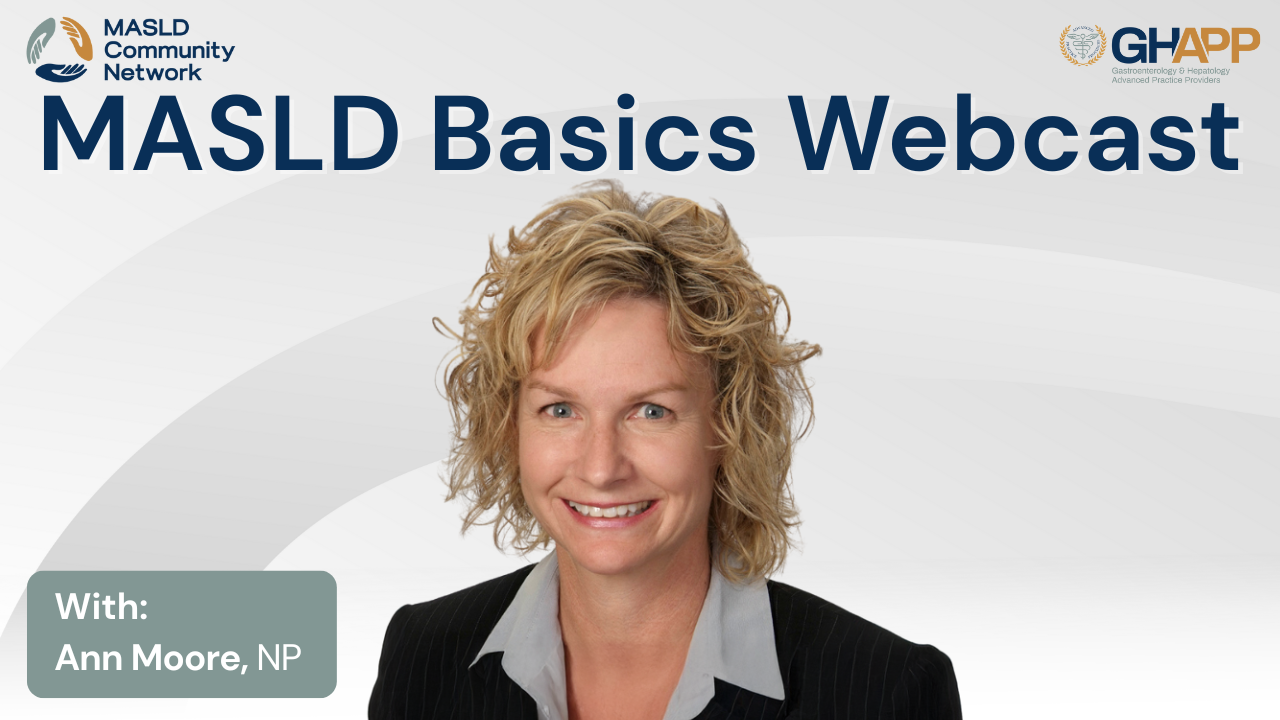
Webcast: MASLD Basics With Ann Moore

In this episode of MASLD Basics, Ann Moore, NP with Arizona Liver Health, explains the new terminology and approach to what was once called fatty liver disease. She breaks down how “NAFLD” is being replaced with steatotic liver disease and how patients are now categorized based on underlying drivers such as metabolic dysfunction, alcohol use, or other conditions. Ann highlights why MASLD and MASH are the most common and important to recognize, what risk factors providers should look for, and why early detection matters. She also discusses how primary care teams can use simple non-invasive tests, lifestyle changes, and new treatment options to identify at-risk patients before fibrosis and cirrhosis develop. This talk is designed to give APPs, clinicians, and healthcare providers a clear, practical overview of the evolving landscape of liver disease care.
Watch Now
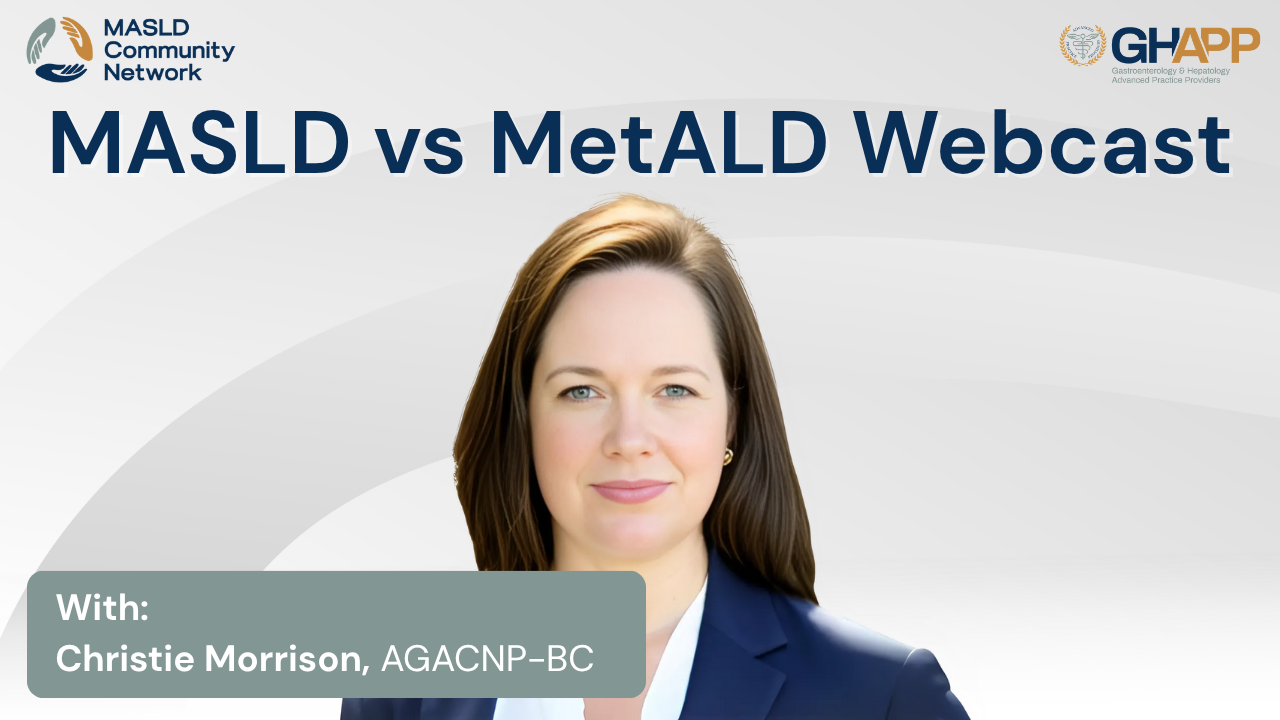
Webcast: MASLD vs MetALD With Christie Morrison

In this MASLD Community Network session, Christie Morrison, NP, shares a practical case study to explain how to recognize and manage metabolic dysfunction–associated steatotic liver disease (MASLD), MASH, and mixed-etiology MET-ALD. She highlights how common risk factors like obesity, diabetes, high blood pressure, and regular alcohol use can overlap and accelerate liver damage. Christy also discusses how non-invasive testing helps stage disease, why accurate alcohol history is important, and what steps providers can take to support patients. Lifestyle changes such as adopting a healthier diet, increasing physical activity, losing weight, and reducing alcohol intake remain the foundation of care. This overview is designed for APPs and GI clinicians looking for clear, practical strategies to help patients prevent progression to advanced liver disease.
Watch Now

Webcast: Lifestyle Management With Christie Morrison

In this MASLD Community Network session, Christie Morrison, NP with Oshi Health and TDDC (GI Alliance), reviews a real patient case to highlight how lifestyle changes can help manage metabolic dysfunction–associated steatotic liver disease (MASLD) and MASH. She explains how non-invasive tests like FIB-4 scores and FibroScan results guide risk assessment, and why weight loss, healthy diet, and regular exercise are key to slowing or reversing liver damage. Using a culturally sensitive approach, Christie shows how to tailor recommendations for patients while addressing common risk factors such as obesity, diabetes, and high blood pressure. She also covers the role of calorie reduction, resistance training, and Mediterranean-style eating in improving liver health. This practical talk is designed for APPs, GI providers, and healthcare professionals looking for simple strategies to help patients prevent progression to fibrosis and cirrhosis.
Watch Now
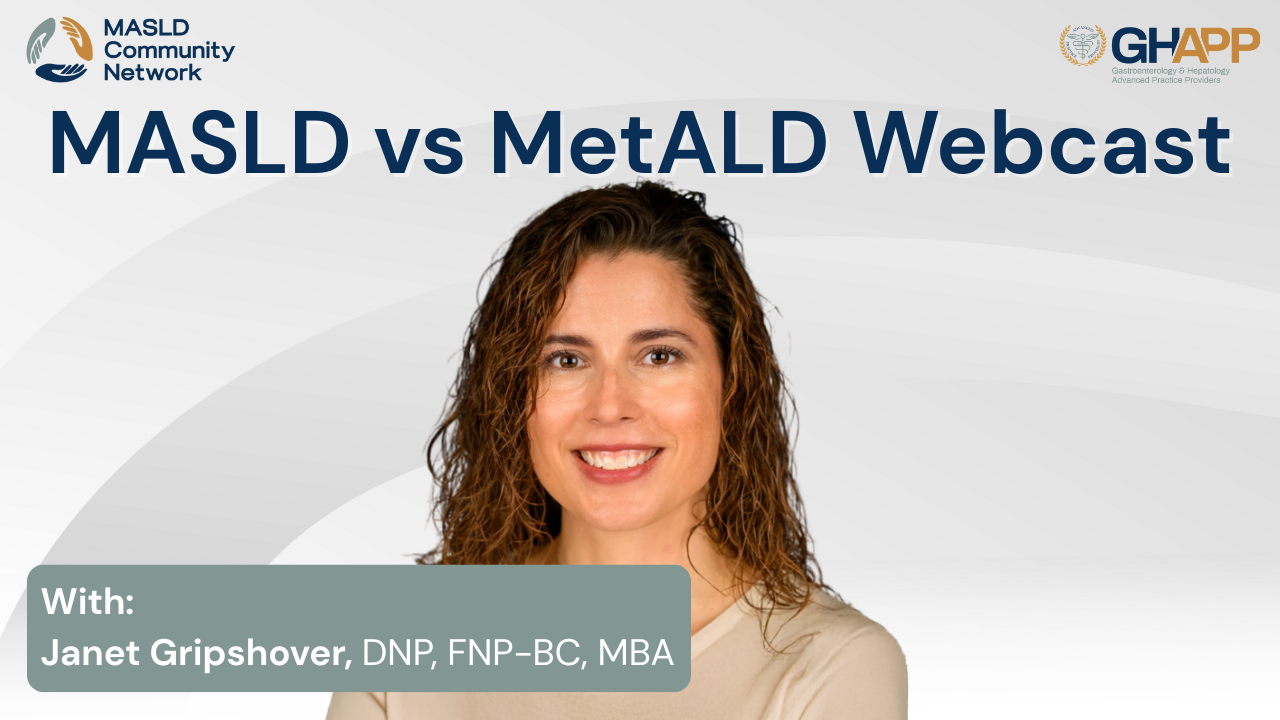
Webcast: MASLD vs MetALD With Janet Gripshover

Janet Gripshover, NP, explains how to spot and manage metabolic dysfunction–associated steatotic liver disease (MASLD) and MASH—now the preferred terms replacing NAFLD. Through a real patient case, she shows how ultrasound findings, everyday risk factors (PCOS, high blood pressure, cholesterol, higher BMI), and an honest alcohol history point the way. Janet covers easy, non-invasive tests (FIB-4 blood test, FibroScan® stiffness and CAP scores) and when alcohol biomarkers (PEth, urine EtG) help confirm what’s really driving the liver damage. You’ll learn simple next steps: Mediterranean-style eating, resistance exercise, weight loss goals, and complete alcohol cessation to prevent progression to cirrhosis. She also notes when to start liver cancer (HCC) screening and what to document in the chart. Perfect for APPs and clinicians looking for a clear, practical MASLD/MASH workflow.
Watch Now
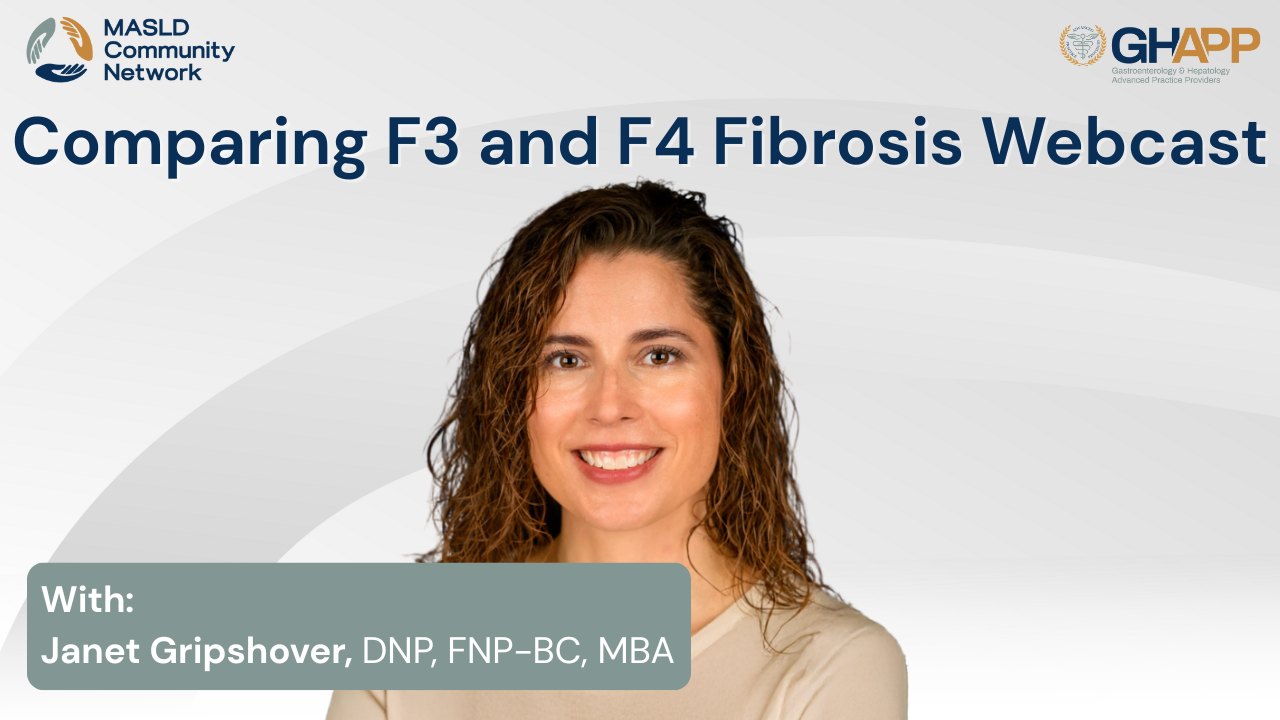
Webcast: Comparing F3 and F4 Fibrosis With Janet Gripshover

In this session, Janet Gripshover, NP and Nurse Manager of the Liver Transplant Program at Cedars-Sinai, explores one of the most challenging aspects of hepatology—distinguishing between F3 fibrosis and F4 cirrhosis. She explains why identifying the transition from bridging fibrosis to cirrhosis is critical for patient outcomes, treatment decisions, and cancer surveillance. Using real-world case discussions, Janet reviews non-invasive diagnostic tools such as FIB-4, transient elastography (FibroScan®), ELF testing, and lab findings, highlighting how concordant results strengthen diagnostic confidence. She also addresses risk factors like obesity, type 2 diabetes, hypertension, and sleep apnea, and emphasizes the role of lifestyle modification, GLP-1 therapies, and new treatments that can reduce fat and fibrosis progression. Importantly, she discusses why cirrhosis shifts management priorities from prevention to preservation and underscores the need for hepatocellular carcinoma (HCC) surveillance. Whether you are a hepatology provider, APP, or clinician looking to better understand the nuances of staging MASLD/MASH, this video provides a comprehensive and practical guide to diagnosing and managing advanced liver fibrosis.
Watch Now
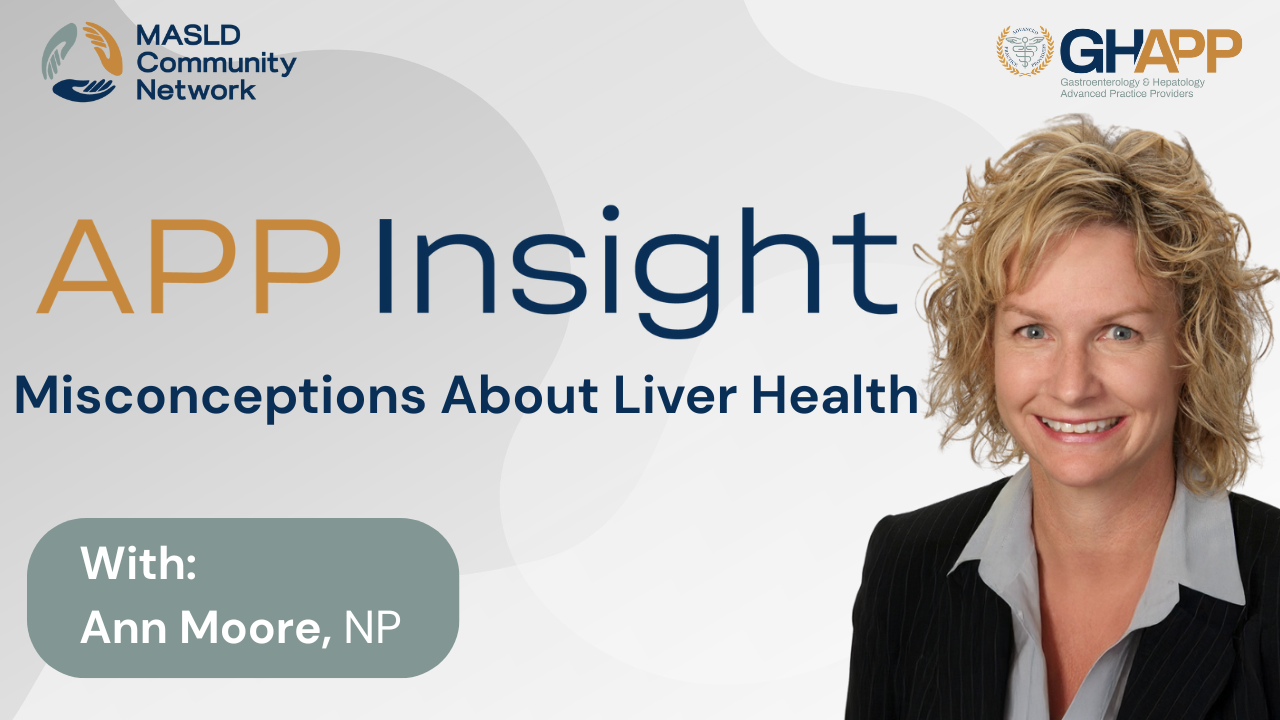
Misconceptions About Liver Health With Ann Moore

Join Ann Moore, NP from Arizona Liver Health as she tackles two of the biggest misconceptions in liver health. With over 40 years of experience, Ann explains why normal liver tests don’t always mean a healthy liver—patients with MASH and advanced fibrosis (F2–F3) can have “quiet labs” while disease silently progresses. She also dispels the outdated belief that only alcohol causes liver disease. With the new MASLD and MASH terminology, the focus is on metabolic dysfunction—including obesity, diabetes, and high cholesterol—as the main global drivers of fatty liver disease, not alcohol alone. This educational session is designed to help clinicians and patients alike understand why early detection and management of metabolic risk factors are essential for protecting long-term liver health. Stay connected with the MASLD & MASH Community Network for more expert insights and updates on fatty liver disease care.
Watch Now
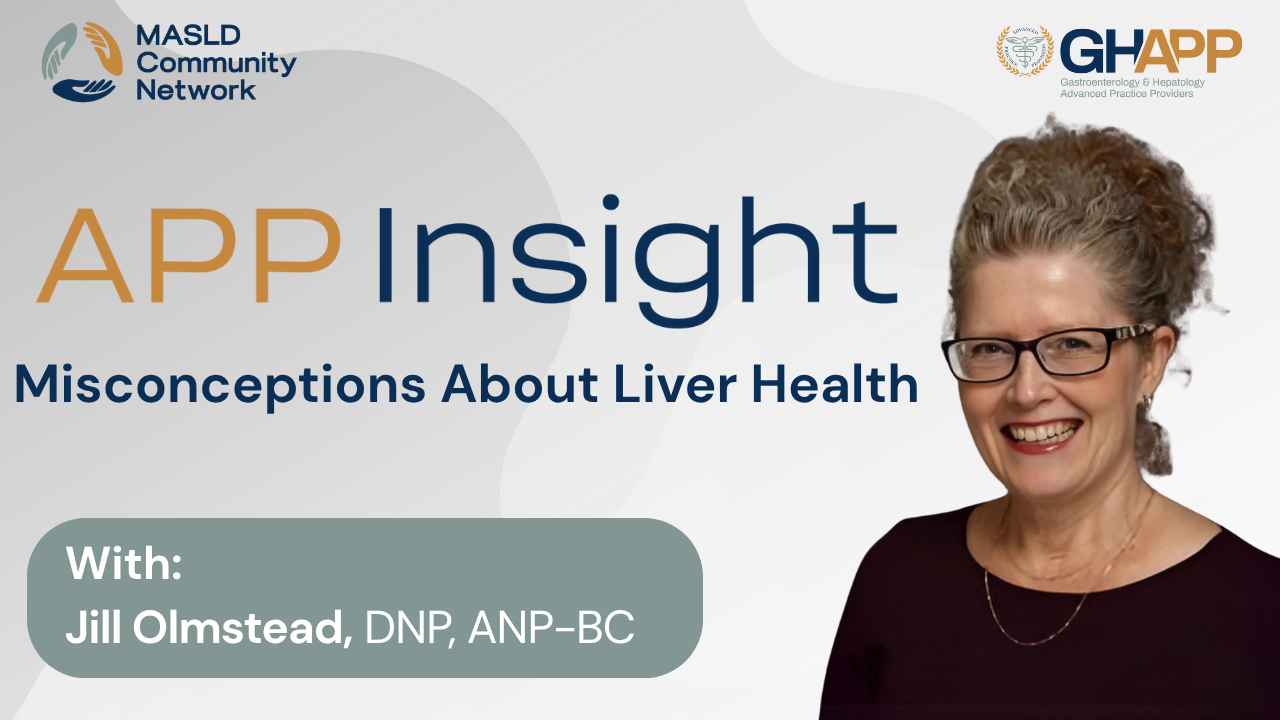
Misconceptions About Liver Health

Join Jill Olmstead, DNP from Providence Health in Southern California for an eye-opening GHAPP MASLD Community Network Insight on the biggest misconceptions about liver health. In this session, Jill explains why fatty liver disease is not “normal” or harmless, but a serious metabolic disorder linked to obesity, prediabetes, diabetes, and high cholesterol. She highlights how fat in the liver causes cellular injury, leading to fibrosis and even cirrhosis if untreated. Jill also addresses the common myth that alcohol is safe in moderation—reminding patients that alcohol is a liver toxin and no amount is risk-free, despite outdated beliefs about red wine being heart-protective. This educational talk empowers providers and patients alike to recognize fatty liver disease early, manage risk factors, and adopt lifestyle changes that protect long-term liver health. Watch more from the MASLD & MASH Community Network to stay informed on advances in fatty liver disease education and care.
Watch Now
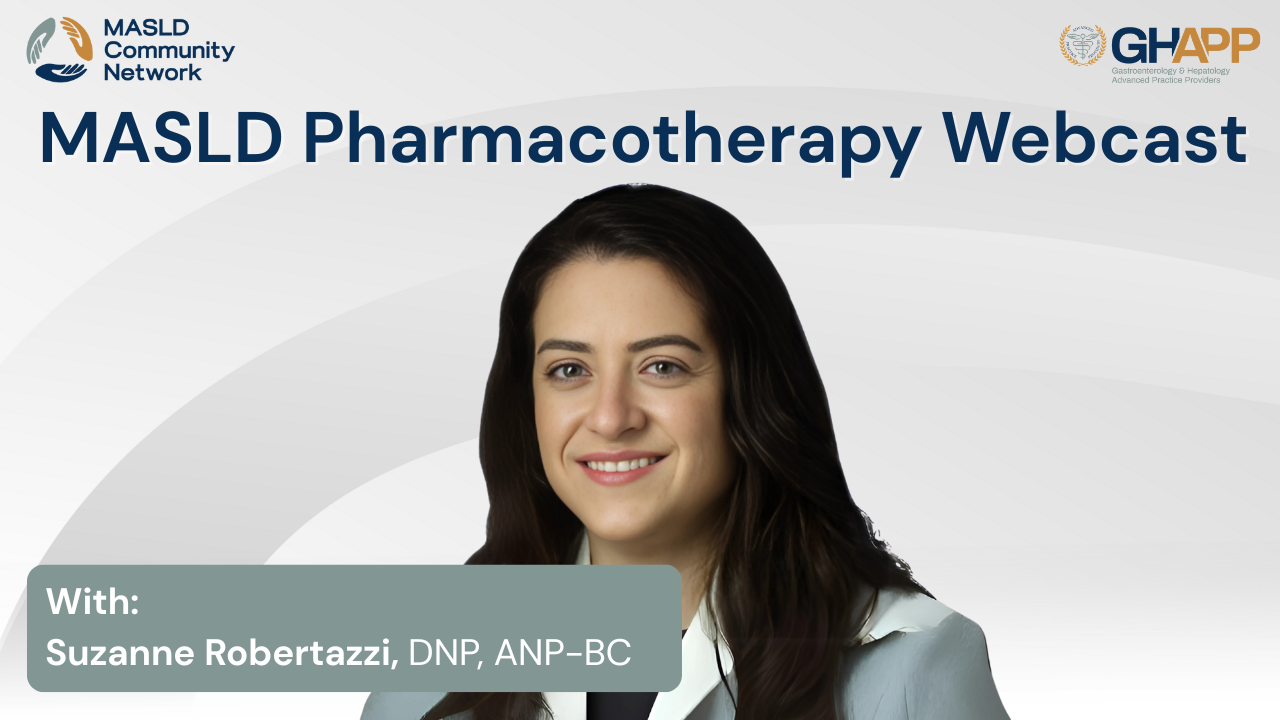
Webcast: MASLD Pharmacotherapy With Suzanne Robertazzi

Join Suzanne Robertazzi, DNP for a clinician-focused update on MASH and MASLD pharmacotherapy—what to treat, when to treat, and how to monitor. This talk reviews the shift to MASLD/MASH terminology, why management must target the entire metabolic syndrome (obesity, type 2 diabetes, hypertension, dyslipidemia, cardiovascular risk), and the practical role of weight loss (diet, physical activity, anti-obesity medications, bariatric surgery). Suzanne explains where GLP-1 receptor agonists fit (mechanism, expected benefits, GI/aspiration precautions and holding doses before procedures), clarifies that statins are safe in fatty liver, and summarizes legacy data and limitations for vitamin E and pioglitazone. She then covers the first FDA-approved therapy for non-cirrhotic MASH with F2–F3 fibrosis, resmetirom—including THR-β–selective mechanism, tolerability, key drug–drug interactions (and statin dose limits), and real-world considerations such as insurance requirements, staging with FIB-4 and FibroScan®/NITs, restaging cadence, and treatment duration. If you’re a GI/hepatology clinician or APP, this session delivers evidence-based, step-by-step guidance to streamline risk reduction, staging, and therapy for patients with MASLD/MASH.
Watch Now
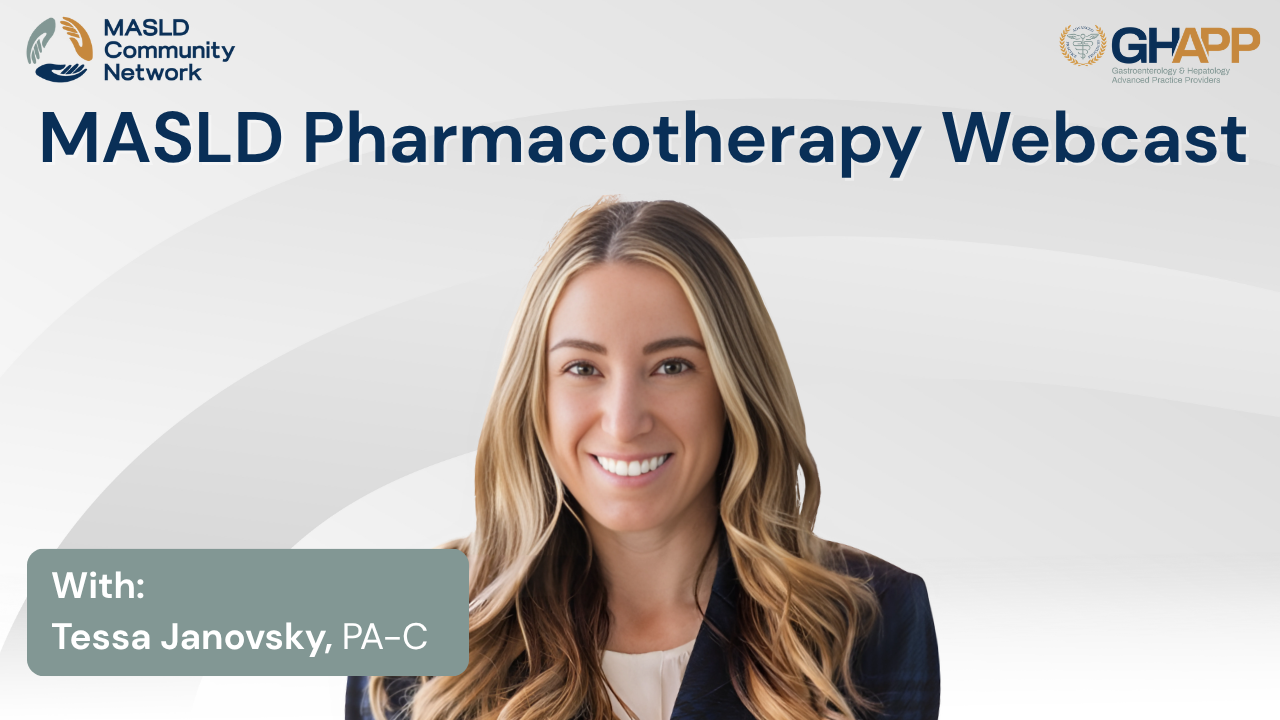
Webcast: MASLD Pharmacotherapy With Tessa Janovsky

Join Tessa Janovsky, PA-C from Arizona Liver for a practical update on MASLD pharmacotherapy—from whole-patient metabolic management to liver-directed treatment. This session reviews why care must target the entire metabolic syndrome (weight, type 2 diabetes, hypertension, dyslipidemia, cardiovascular risk), the impact of 7–10% weight loss (and why many patients need adjuncts), and how to choose between diet/physical activity, anti-obesity medications, and bariatric surgery for select cases. You’ll learn where GLP-1 receptor agonists fit (mechanism, expected weight and glycemic effects, GI side effects, peri-procedure anesthesia considerations, and use in compensated disease), when to use statins safely in fatty liver, and how to stage and monitor with FIB-4, FibroScan/elastography, and other non-invasive tests. Tessa also summarizes legacy data for vitamin E and pioglitazone (benefits and limitations) and highlights the first FDA-approved therapy for non-cirrhotic MASH with F2–F3 fibrosis, resmetirom—including mechanism (THR-β agonism), tolerability, drug–drug interaction checkpoints, and practical follow-up (restaging and lifestyle coaching). If you’re a GI/hepatology clinician or APP aiming to streamline risk reduction, staging, and evidence-based therapy for MASLD/MASH, this concise talk delivers clinic-ready guidance.
Watch Now
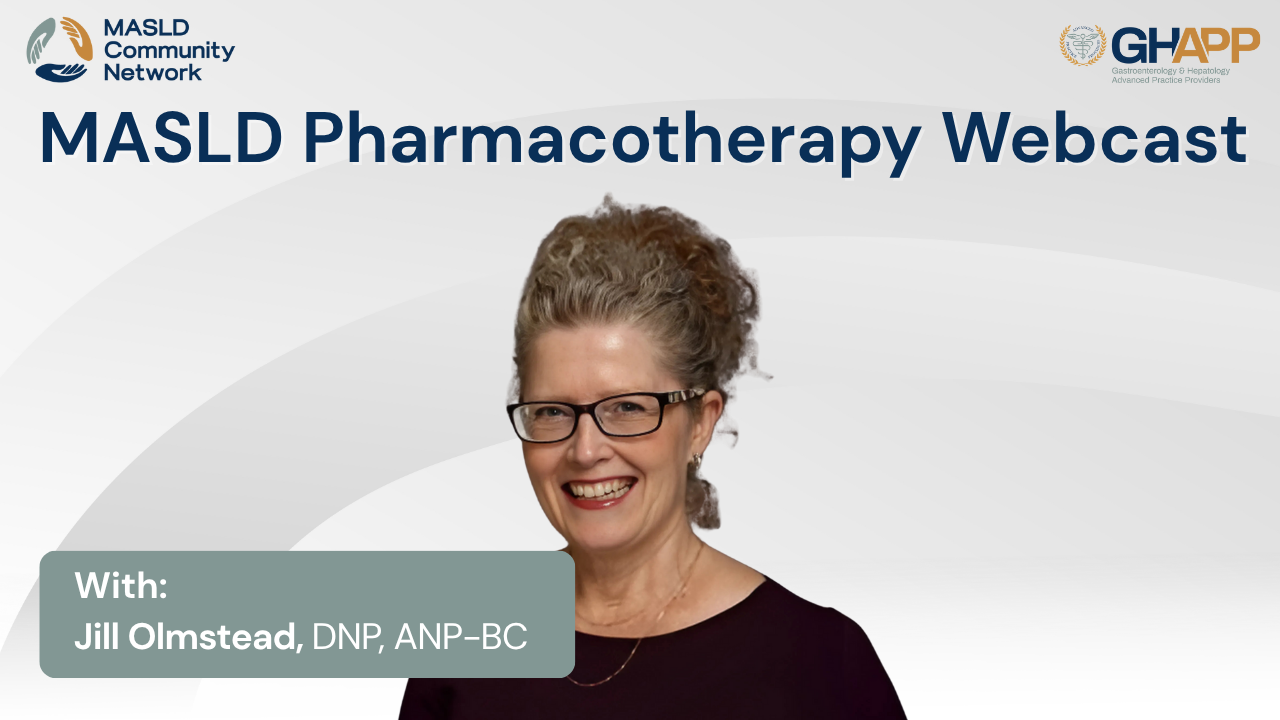
Webcast: MASLD Pharmacotherapy With Jill Olmstead

Join Jill Olmstead, DNP from Providence Health for a practical, clinician-focused overview of MASLD pharmacotherapy and new treatment horizons for hepatic steatosis. This session in the GHAPP MASLD & MASH Community Network covers the shift in nomenclature, why care must be multidisciplinary (obesity, type 2 diabetes, dyslipidemia, hypertension, cardiovascular risk), and how to stage disease with FIB-4, noninvasive tests, and FibroScan before initiating therapy. Jill reviews lifestyle and weight-loss strategies, GLP-1 receptor agonists—their mechanisms, common GI side effects, and peri-procedure considerations due to delayed gastric emptying—plus where vitamin E and pioglitazone do and don’t fit today. She also walks through practical use of resmetirom for non-cirrhotic MASH with F2–F3 fibrosis (labs to order, monitoring, drug–drug interactions, and setting expectations alongside diet and exercise). If you’re a GI/hepatology clinician, APP, or primary-care partner looking to streamline risk reduction, staging, and evidence-based therapy for MASLD/MASH, this talk delivers step-by-step guidance you can use in clinic today.
Watch Now

Webcast: MASLD vs MetALD With Christina Hanson

Discover the latest insights on MASLD and MetALD in this educational session from the GHAPP MASLD Community Network. Christina Hanson, FNP-C, walks through a real-world case study to highlight how common metabolic conditions like hypertension, hyperlipidemia, obesity, and PCOS intersect with alcohol use to drive liver disease progression. The session explores updated nomenclature replacing NAFLD/NASH, the role of FibroScan and elastography in staging fibrosis, and the importance of screening patients with metabolic risk factors for fatty liver. Learn how alcohol consumption contributes to liver injury, triglyceride elevation, and blood pressure changes, and how objective biomarkers such as PEth testing are transforming diagnosis beyond self-reporting. Christina also reviews lifestyle interventions, dietary strategies like the Mediterranean diet, and current treatment considerations for patients with advanced fibrosis (stage 3), including when to initiate HCC screening. Whether you are a hepatologist, GI specialist, or advanced practice provider, this session provides practical tools for evaluating and managing patients with MASLD, MetALD, and related liver health challenges.
Watch Now
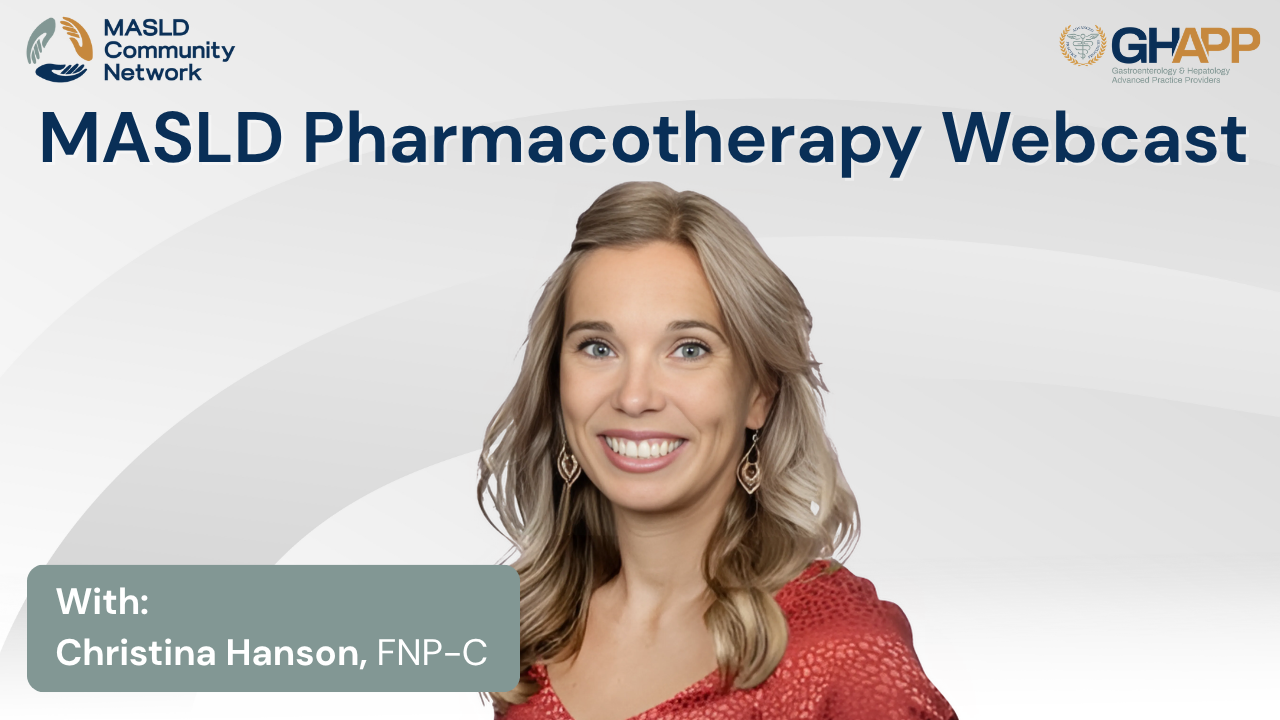
Webcast: MASLD Pharmacotherapy With Christina Hanson

Learn about the latest advances in MASLD and MASH pharmacotherapy in this educational session from the GHAPP MASLD Community Network. Christina Hanson, NP, reviews the evolving landscape of treatment for metabolic dysfunction-associated steatotic liver disease (MASLD) and steatohepatitis (MASH), including the critical role of weight loss, cardiovascular risk reduction, and liver-directed therapies. The discussion covers current management strategies such as GLP-1 receptor agonists, bariatric interventions, statins, and lifestyle modification, while also exploring guideline-supported options like vitamin E and pioglitazone. Special attention is given to the first FDA-approved therapy for MASH, Resmetirom, including its mechanism, clinical trial results, safety considerations, and monitoring recommendations. Whether you are a hepatology specialist, primary care provider, endocrinologist, or advanced practice provider, this session highlights practical approaches to managing patients with MASLD and MASH and offers insights into emerging therapies that may shape future clinical practice.
Watch Now

Webcast: Comparing F3 and F4 Fibrosis With Valerie Shin

In this interactive case discussion, Valerie Shin, NP, from UCLA Health’s hepatology team, walks through how to compare F3 and F4 fibrosis in patients with metabolic dysfunction–associated steatohepatitis (MASH). Presented as part of the GHAPP MASLD Community Network series sponsored by Madrigal, this session uses real-world patient data to explore how non-invasive testing (NITs) like FibroScan, FIB-4, and ELF testing help stage liver fibrosis and guide treatment decisions. Valerie highlights the importance of accurate staging for prognosis, monitoring, and management—whether identifying patients with advanced fibrosis (F3) who may benefit from resmetirom (Rezdiffra), or recognizing progression to cirrhosis (F4) that requires enhanced surveillance and multidisciplinary care. This video also emphasizes practical strategies for lifestyle modification, metabolic risk factor control, and liver cancer screening. Whether you are a hepatology specialist, primary care provider, or advanced practice provider (APP), this case comparison offers valuable clinical insights into diagnosing and managing MASLD/MASH.
Watch Now

Webcast: MASLD vs MetALD With Lavinia Iordache

In this MASLD Community Network session, Lavinia Iordache, PA-C, clarifies the new SLD nomenclature and the distinctions between MASLD and MetALD, then walks through a real-world case (Ashley, 52) to show how to quantify alcohol intake, recognize cardiometabolic risk factors, and stage disease using non-invasive tests (FIB-4, FibroScan/VCTE with CAP, ELF). She explains how even “moderate” alcohol can accelerate fibrosis when metabolic risks are present, why PEth biomarker testing helps uncover under-reported use, and how to triage patients who land in the F3–F4 range. Practical takeaways include culturally sensitive Mediterranean-style nutrition, 5–10% weight-loss goals, tailored exercise, alcohol cessation, and when to consider resmetirom (Rezdiffra) for eligible F2–F3 non-cirrhotic patients. The talk also covers HCC surveillance (and when to prefer CT/MRI over ultrasound in central adiposity) and sets clear pathways for primary care, GI, and hepatology to work in sync.
Watch Now
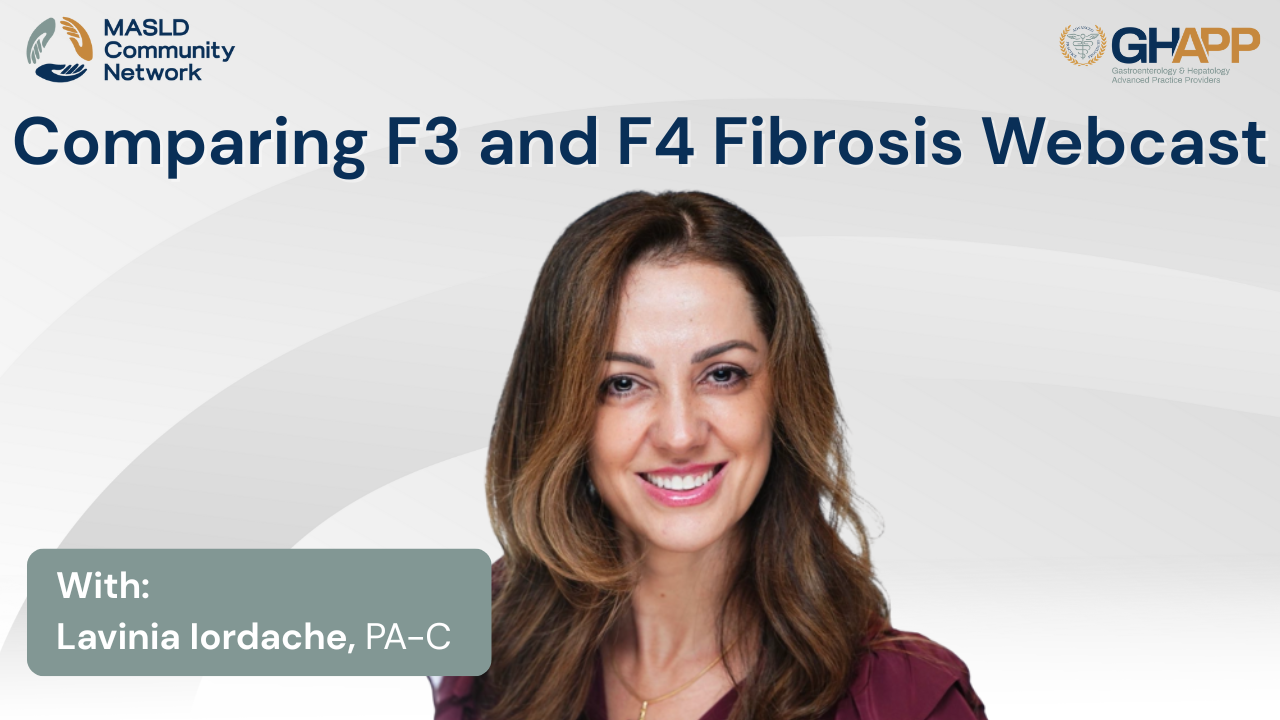
Webcast: Comparing F3 and F4 Fibrosis With Lavinia Iordache

In this MASLD Community Network talk, Lavinia Iordache, PA-C, walks through a real-world case to show how to accurately identify advanced liver fibrosis and, critically, how to distinguish F3 vs F4—a difference that drives management, eligibility for resmetirom (Rezdiffra), and surveillance strategy. She demonstrates a stepwise use of non-invasive tests (NITs)—FIB-4, FibroScan/VCTE with kPa and CAP, ELF serum biomarkers, and when to add MRE or biopsy—plus how to handle discordant/indeterminate results. The session covers cardiometabolic risk factors, lab patterns, and practical monitoring tips, including HCC surveillance considerations (modality choice in obesity, AFP/AFP-L3) and portal-hypertension cues that trigger EGD for varices. You’ll leave with a clear algorithm to stage disease, personalize treatment, and avoid missing F3 candidates who may otherwise be excluded by FIB-4 alone.
Watch Now

Webcast: Lifestyle Management With Lavinia Iordache

In this MASLD Community Network session, Lavinia Iordache uses a real-world case to show how to recognize and manage fatty liver disease with a lifestyle-first approach. She reviews the clinical pathway for at-risk patients (hypertension, dyslipidemia, diabetes, central adiposity), the role of non-invasive tests, and why indeterminate results often require a second modality. The talk clarifies alcohol distinctions and emphasizes that early staging and referral can change prognosis. Practical guidance includes culturally sensitive nutrition counseling (prioritizing the Mediterranean diet), realistic weight-loss targets, and tailored exercise plans—both aerobic and resistance training improve hepatic fat via different pathways. Lavinia also covers behavior strategies and cautions on one-size-fits-all tactics. You’ll leave with a clear, compassionate framework to help patients sustain lifestyle change, optimize cardiometabolic risk, and monitor disease progression over time.
Watch Now
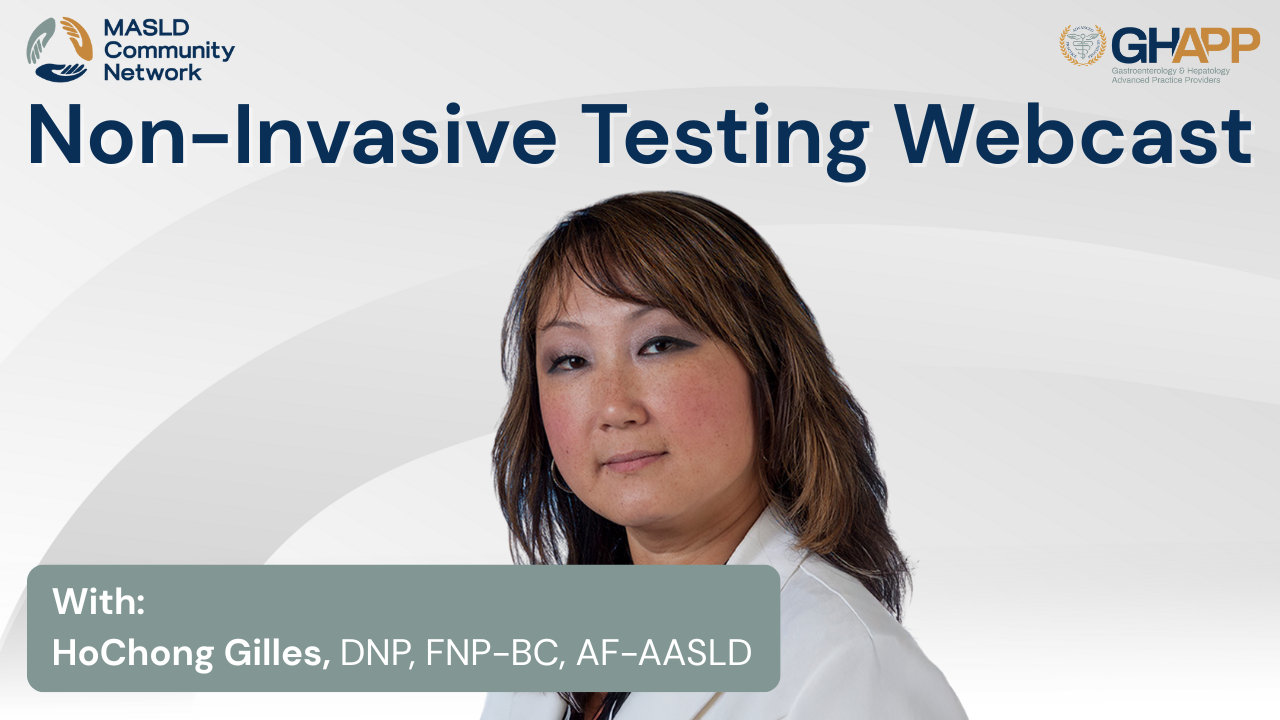
Webcast: Non-Invasive Testing With HoChong Gilles

In this MASLD Community Network webcast, HoChong Gilles, NP, from the Central Virginia VA Health Care System, provides a comprehensive overview of the evolving role of non-invasive testing (NITs) in diagnosing and staging MASLD and MASH. Using a real-world case example, she demonstrates how tools such as FIB-4, ELF (Enhanced Liver Fibrosis) score, FibroScan (VCTE), MR Elastography, and ultrasound can help clinicians accurately stratify risk, detect significant fibrosis, and avoid unnecessary liver biopsies. HoChong explains the strengths, limitations, and quality considerations of each modality—highlighting how to interpret cut-offs, manage indeterminate results, and incorporate these tests into routine hepatology and GI practice. The session reinforces the importance of combining NIT results with metabolic risk factor management and underscores why accurate staging is essential as new therapies like resmetirom (Rezdiffra) become available for non-cirrhotic patients with F2–F3 fibrosis.
Watch Now
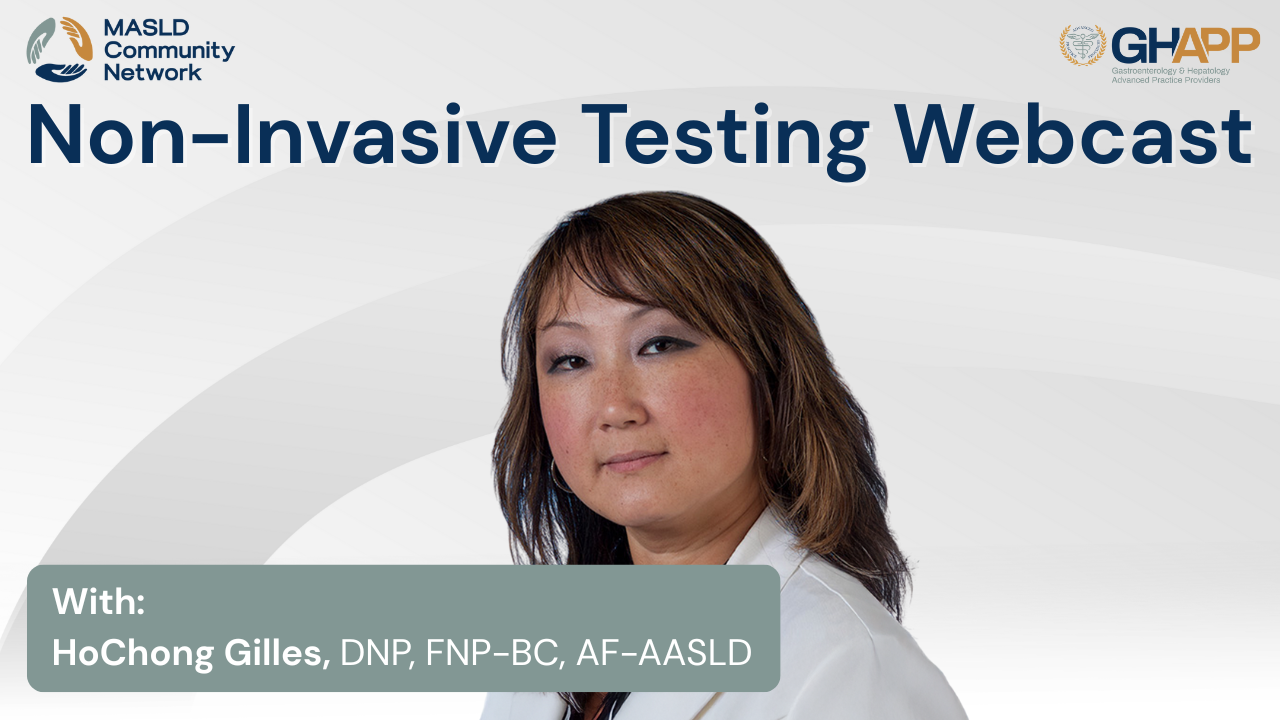
Webcast: MASLD Pharmacotherapy With HoChong Gilles

In this MASLD Community Network webcast, HoChong Gilles, DNP from the Central Virginia VA Health Care System, provides an in-depth review of pharmacotherapy for MASLD and MASH. The session highlights how management historically focused on lifestyle modification, weight loss, and cardiometabolic risk reduction, and how the treatment landscape shifted in March 2024 with the FDA approval of resmetirom (Rezdiffra)—the first therapy specifically indicated for non-cirrhotic MASH with stage 2–3 fibrosis. HoChong also reviews the evidence and practical use of GLP-1 receptor agonists like semaglutide, including data from the ESSENCE trial, as well as the limited but notable roles of vitamin E and pioglitazone. Key discussion points include drug mechanisms, clinical trial outcomes, real-world safety considerations, drug–drug interactions, and monitoring strategies for patients on therapy. This presentation underscores the importance of integrating lifestyle change with emerging pharmacologic options to improve liver outcomes in patients with MASLD and MASH.
Watch Now

Webcast: MASLD Basics With Chantil Jeffreys

In this MASLD/MASH Community Network “Basics” session, Chantil Jeffreys, FNP clarifies the new MASLD/MASH nomenclature, how to recognize metabolic criteria (obesity, dyslipidemia, hypertension, impaired glucose/A1C, low HDL), and when to rule out other causes (alcohol overlap, DILI, cryptogenic disease). She walks through a practical primary-care workflow: start with FIB-4, then risk-stratify with FibroScan or ELF, identify patients who need hepatology referral, and decide when liver biopsy is appropriate (discordant/indeterminate NITs, suspected concomitant disease, select older patients). The talk covers global prevalence, natural history and progression (F0→F4/cirrhosis→HCC), and why aggressive cardiometabolic risk reduction and appropriate surveillance matter. You’ll leave with a clear algorithm to stage disease, monitor over time, and communicate the MASLD/MASH shift to colleagues and patients.
Watch Now
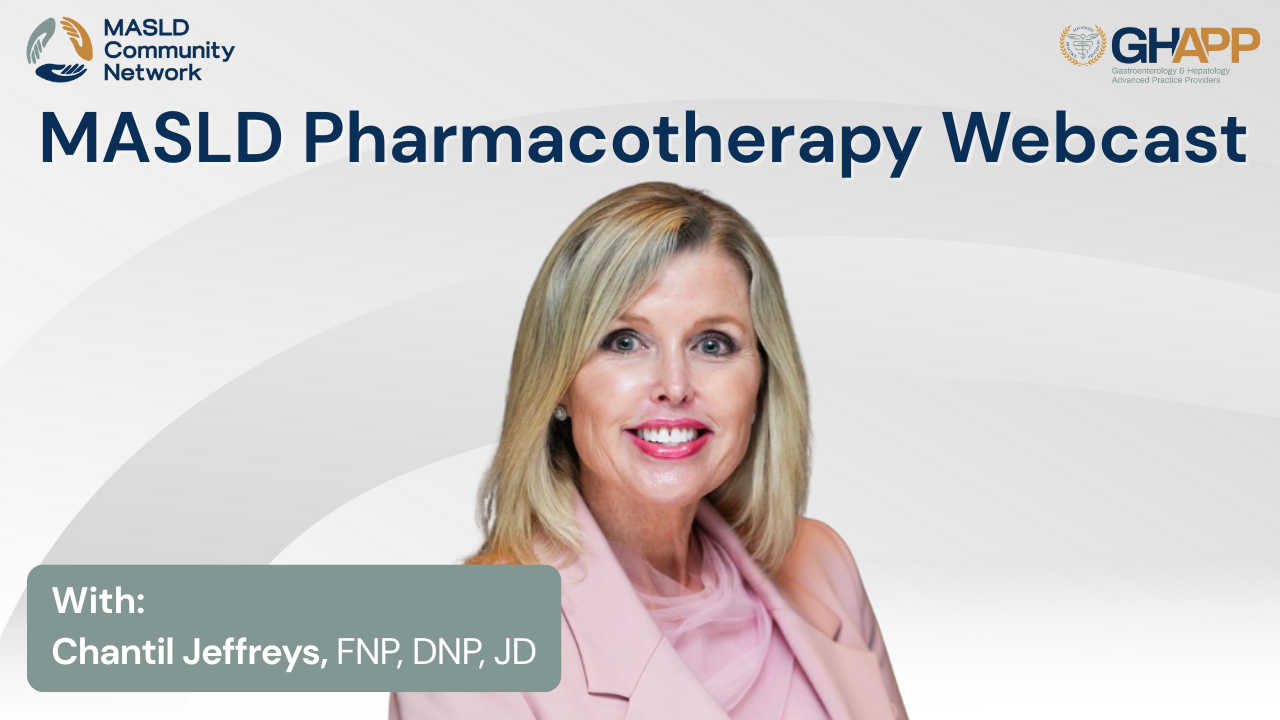
Webcast: MASLD Pharmacotherapy With Chantil Jeffreys

In this MASLD Community Network webcast, Chantil Jeffreys, FNP, walks through a practical framework for pharmacotherapy in MASLD/MASH—from lifestyle-first approaches to the evolving role of GLP-1 receptor agonists and bariatric/endoscopic options. She clarifies common misconceptions (e.g., statins are safe—and beneficial—for patients with fatty liver), reviews evidence and real-world considerations for vitamin E and pioglitazone, and explains where resmetirom (Rezdiffra) fits today for non-cirrhotic MASH with F2–F3 fibrosis—including monitoring, drug–drug interactions, and documentation tips that support payer approval. The session also covers cardiovascular risk reduction, peri-procedure guidance for GLP-1s, and practical strategies for staging and follow-up so clinicians can confidently personalize therapy and improve outcomes.
Watch Now
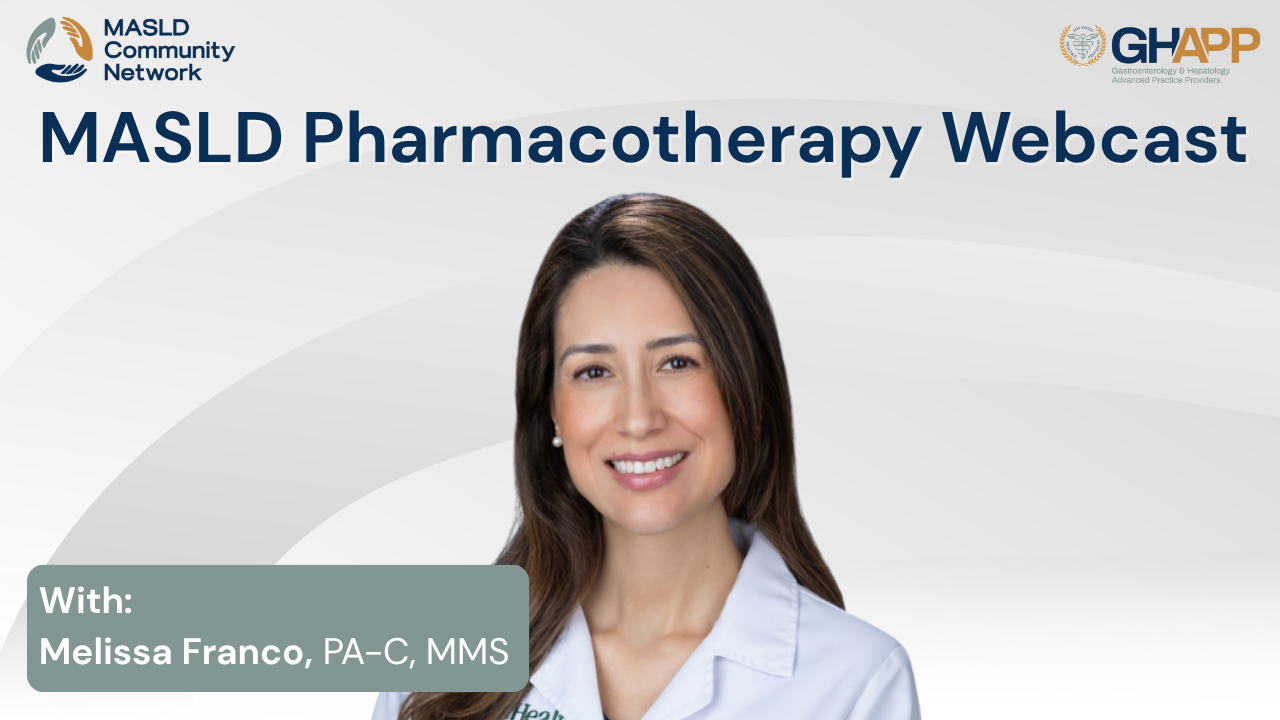
Webcast: MASLD Pharmacotherapy With Melissa Franco

In this session from the MASLD Community Network, Melissa Franco, PA from the University of Miami, provides a comprehensive overview of pharmacotherapy for MASLD and MASH. She reviews the role of lifestyle interventions such as the Mediterranean diet, weight loss, and exercise while highlighting the importance of controlling metabolic and cardiovascular risk factors including diabetes, hypertension, and dyslipidemia. Melissa discusses pharmacologic options including GLP-1 receptor agonists like semaglutide, which have shown promise in improving both weight loss and liver histology, as well as the evolving roles of vitamin E, pioglitazone, and resmetirom (Rezdiffra)—the first FDA-approved therapy for non-cirrhotic MASH with stage 2–3 fibrosis. Practical considerations, safety profiles, drug-drug interactions, and monitoring strategies are explained, giving clinicians a clear framework for managing patients with fatty liver disease. This session emphasizes why a combination of lifestyle changes, risk factor control, and emerging pharmacologic therapies are critical for improving outcomes in MASLD and MASH.
Watch Now

Webcast: Comparing F3 and F4 Fibrosis with Sarah Dawkins

In this educational session from the MASLD Community Network, Sarah Dawkins, NP, from Duke University Medical Center, explores the critical differences between F3 and F4 fibrosis in patients with MASLD and MASH. Through real patient case studies, she highlights how non-invasive testing methods—such as FIB-4, FibroScan, ELF testing, and imaging—play a vital role in accurately staging fibrosis and guiding treatment decisions. The discussion also covers the impact of metabolic risk factors like type 2 diabetes, obesity, and hypertension, along with strategies for management that include lifestyle modifications, weight loss goals, GLP-1 therapy, and the use of resmetirom (Rezdiffra) for eligible patients. Sarah emphasizes the importance of HCC surveillance, esophageal varices screening, and ongoing monitoring to improve outcomes for patients with advanced liver disease. This session underscores why distinguishing between F3 and F4 fibrosis is essential in clinical practice and how non-invasive testing can support timely diagnosis, treatment, and long-term care planning.
Watch Now
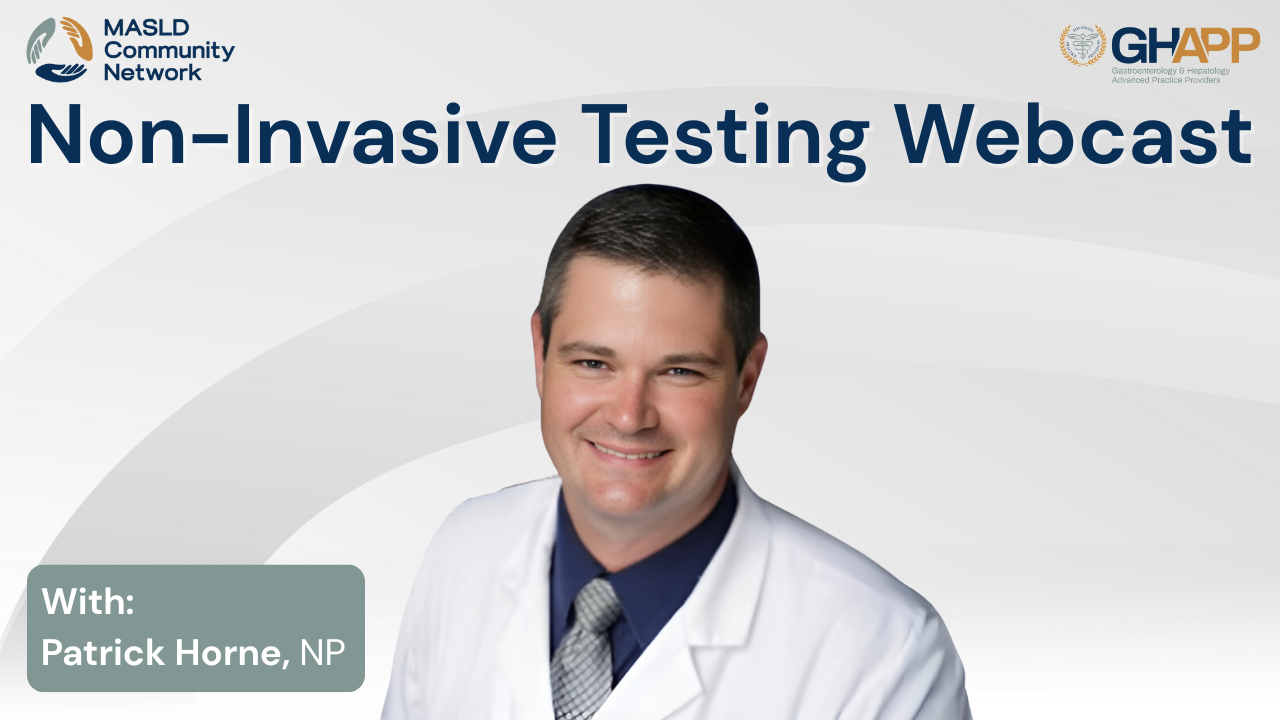
Webcast: Non-Invasive Testing With Patrick Horne

In this case-based session, Patrick Horne, NP speaks about non-invasive testing (NITs) to stage MASLD/MASH without biopsy. Starting from a real patient, he shows how to triage with FIB-4, then advance to liver stiffness measurement—FibroScan/VCTE (kPa for fibrosis, CAP for steatosis)—and when to add ELF, MRE, and MRI-PDFF. You’ll learn which results flag advanced fibrosis vs. low risk, how to vet scan quality (≥10 valid measurements, clean parallel shear waves, acceptable IQR/median), and the common confounders that can inflate stiffness. Patrick maps decisions to AGA/AASLD-aligned pathways for referral, monitoring, and re-staging—and applies the algorithm to the case.
Watch Now
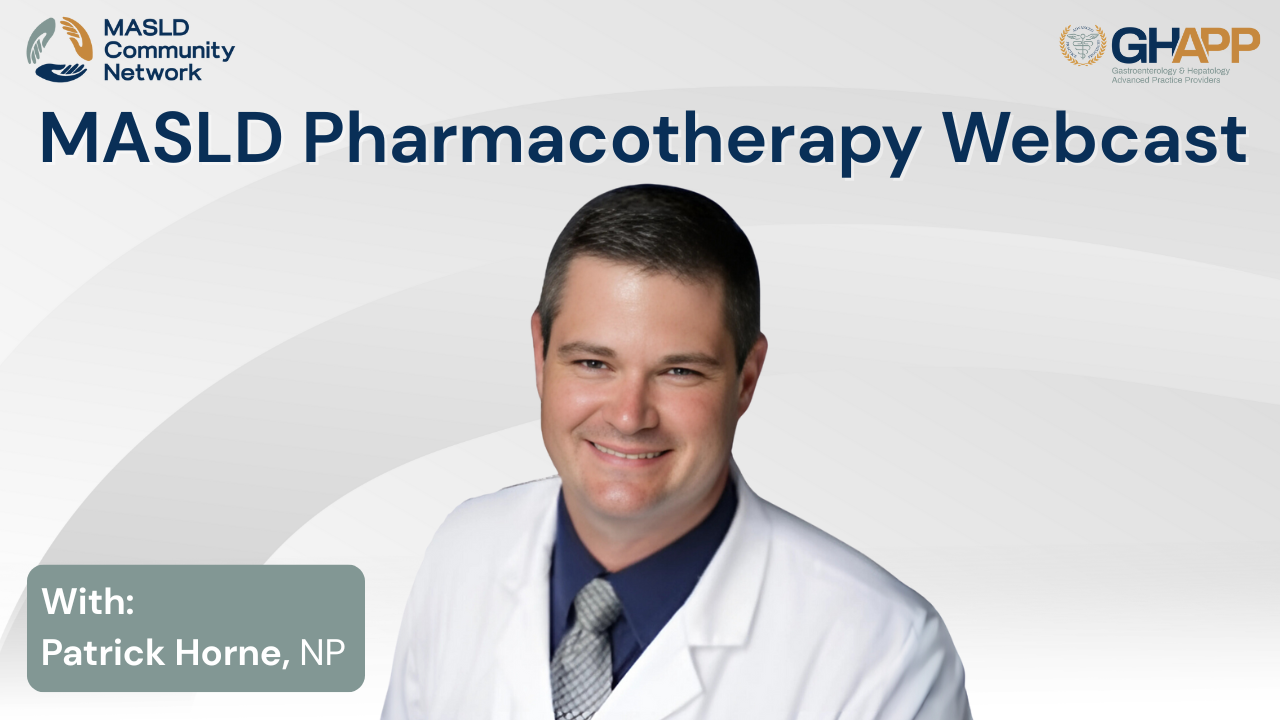
Webcast: MASLD Pharmacotherapy With Patrick Horne

Join Patrick Horne, NP for a clear, clinic-ready overview of MASLD/MASH pharmacology—from the lifestyle backbone to cardiometabolic risk reduction and liver-directed therapies. Patrick breaks down where GLP-1 receptor agonists fit, reviews evidence and patient selection for vitamin E and pioglitazone, and spotlights resmetirom—the first FDA-approved THR-β agonist for non-cirrhotic MASH with F2–F3 fibrosis—including mechanism, key MAESTRO-NASH outcomes, common AEs (nausea/diarrhea), and practical drug–drug interactions. Walk away with a step-by-step approach to selecting therapy, setting measurable lifestyle goals, and using NITs to monitor response and guide duration—so you can confidently tailor treatment and improve outcomes.
Watch Now
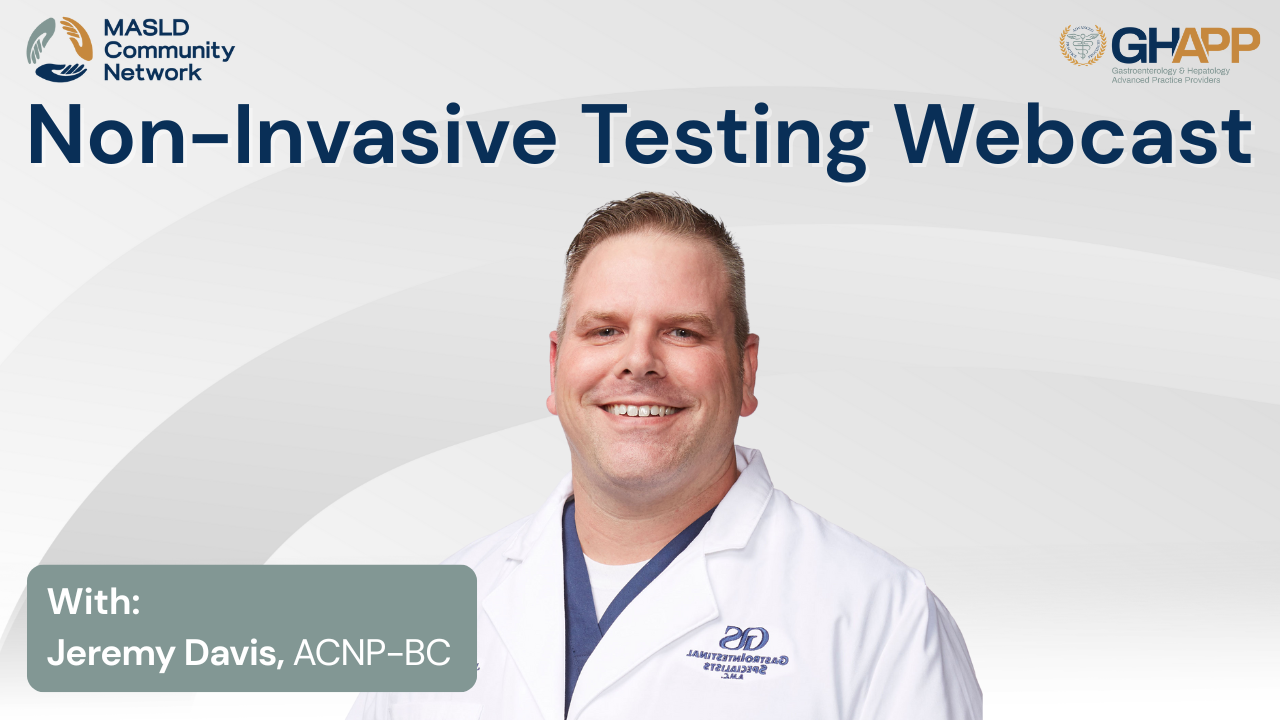
Webcast: Non-Invasive Testing With Jeremy Davis

Join Jeremy Davis, NP, for a clear, clinic-ready walkthrough of non-invasive testing for MASLD/MASH. Using a real case, Jeremy shows how to risk-stratify patients starting with FIB-4 and when intermediate scores should trigger liver stiffness measurement. Learn practical cutoffs, image-quality checkpoints (valid measures, IQR/median), and common confounders (ALT/AST flares, cholestasis, recent meals, alcohol, obesity, ascites) that can overestimate stiffness. He contrasts pros/cons of VCTE vs. MRE, explains how to pair ELF with FibroScan, and maps decisions to AGA/AASLD-aligned pathways—who to refer, who to monitor, and how often to re-stage. The session closes with actionable counseling on lifestyle, weight loss targets, and cardiometabolic risk control to slow fibrosis progression while minimizing unnecessary biopsies.
Watch Now
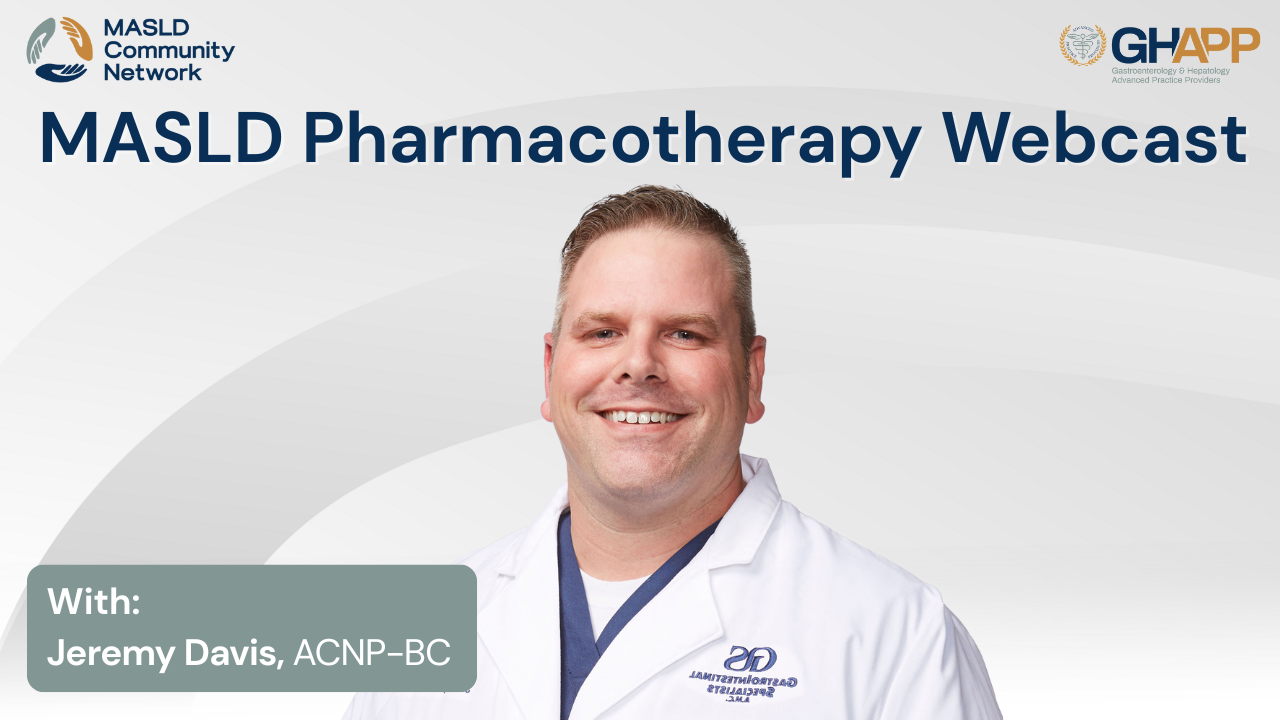
Webcast: MASLD Pharmacotherapy With Jeremy Davis

In this clinician-focused talk, Jeremy Davis, NP, delivers a clear, practical guide to MASLD/MASH pharmacotherapy—from foundational lifestyle and weight-loss strategies to medications that move the needle. He reviews the role of GLP-1 receptor agonists (and emerging dual agonists) for weight reduction and glycemic control, peri-procedure considerations (delayed gastric emptying/aspiration risk), and where legacy options like vitamin E (select non-diabetic, non-cirrhotic patients) and pioglitazone fit, including benefits and safety trade-offs. The session spotlights resmetirom—the first FDA-approved, liver-directed THR-β agonist for non-cirrhotic MASH with F2–F3 fibrosis—covering its mechanism, key MAESTRO-NASH data, common AEs (nausea/diarrhea), and practical drug–drug interaction/statin-dosing considerations. You’ll also learn how to structure follow-up with non-invasive testing (FibroScan kPa/CAP, ELF, labs), set measurable lifestyle goals, coordinate cardiometabolic risk reduction (T2D, hypertension, dyslipidemia), and navigate coverage and duration questions—so you can confidently tailor therapy and improve outcomes across the MASLD/MASH spectrum.
Watch Now
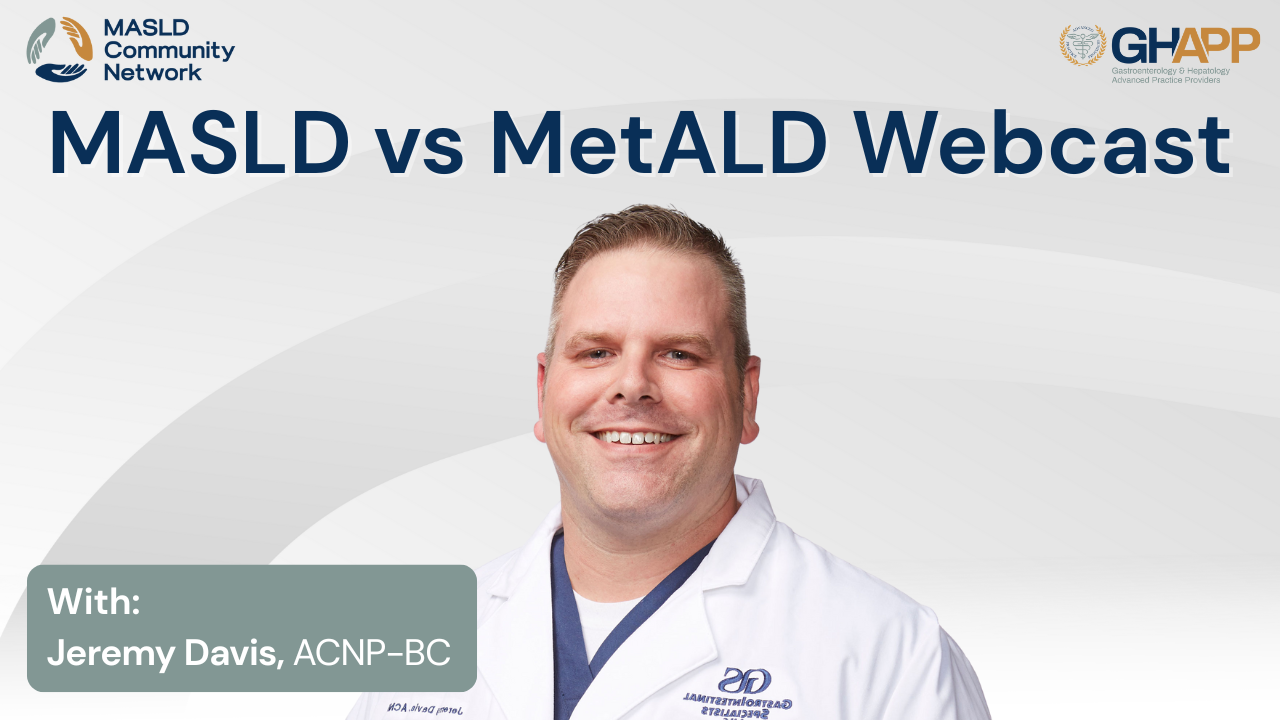
Webcast: MASLD vs MetALD With Jeremy Davis

In this MASLD Community Network talk, Jeremy Davis, NP, uses a real-world case to clarify how to differentiate MASLD from MetALD, interpret alcohol exposure, and stage disease with non-invasive tools. He explains standard drink equivalents (≈14 g ethanol) and why accurate histories plus objective biomarkers matter, then walks through labs and elastography (FibroScan kPa/CAP) showing F3 fibrosis with severe steatosis. You’ll learn a practical workflow to rule out alternative etiologies, quantify alcohol use, and understand how metabolic risk plus alcohol accelerates fibrosis and decompensation risk. Jeremy outlines counseling pearls (abstinence recommendations, Mediterranean-style diet, weight loss, activity), eligibility considerations for resmetirom in non-cirrhotic MASH (F2–F3), and when to start HCC surveillance. Watch to strengthen your staging, counseling, and treatment decisions for patients who fall along the MASLD–MetALD spectrum.
Watch Now
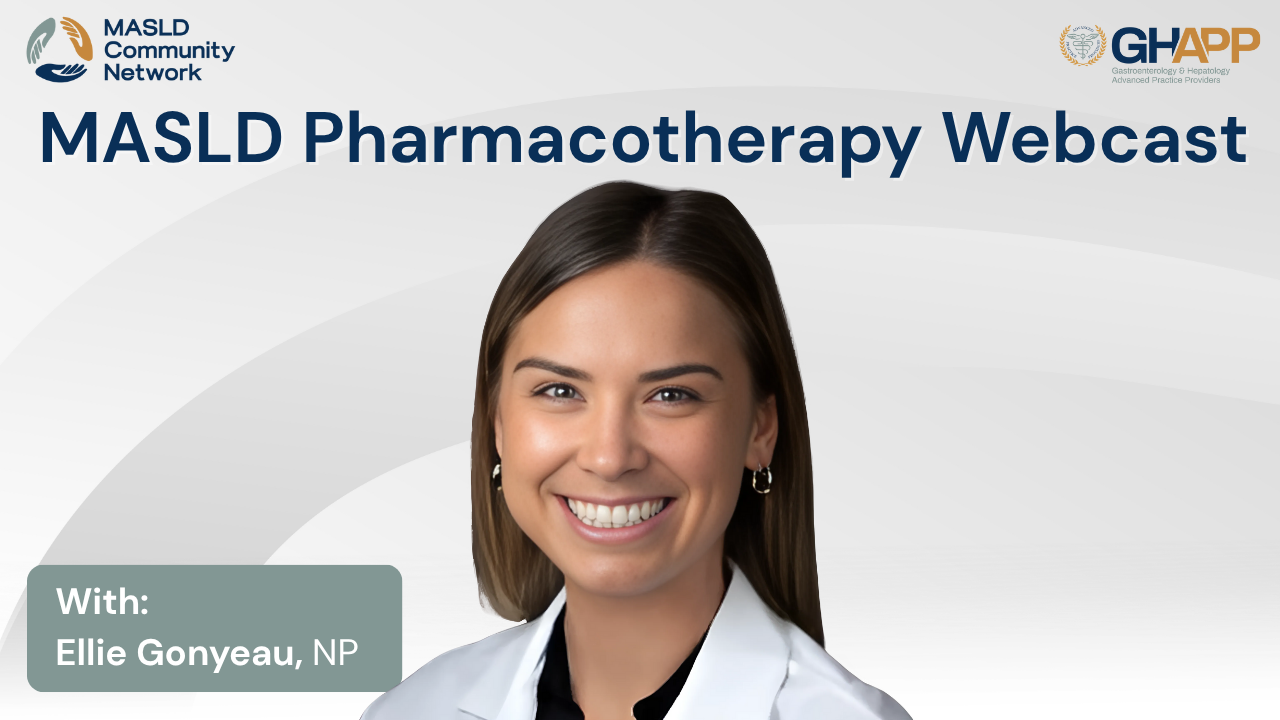
Webcast: MASLD Pharmacotherapy With Ellie Gonyeau

In this practical, clinician-focused talk, Ellie Gonyeau, NP, walks through a streamlined pharmacotherapy framework for MASLD/MASH—anchored on three pillars: obesity management, cardiometabolic risk reduction (T2D, hypertension, dyslipidemia), and liver-directed therapy. She reviews where GLP-1 receptor agonists fit (weight loss, glycemic control, peri-procedure considerations), summarizes evidence and patient selection for high-dose vitamin E and pioglitazone, and explains the role of resmetirom—the first FDA-approved therapy for non-cirrhotic MASH with F2–F3 fibrosis—its liver-selective THR-β mechanism, pivotal trial outcomes, common AEs, and drug-interaction/ statin considerations. You’ll also learn how to monitor and restage using non-invasive tests (FibroScan kPa/CAP, ELF, labs), set measurable lifestyle goals, and navigate real-world questions around coverage, testing cadence, and treatment duration—so you can confidently tailor therapy and improve outcomes for patients across the MASLD/MASH spectrum.
Watch Now
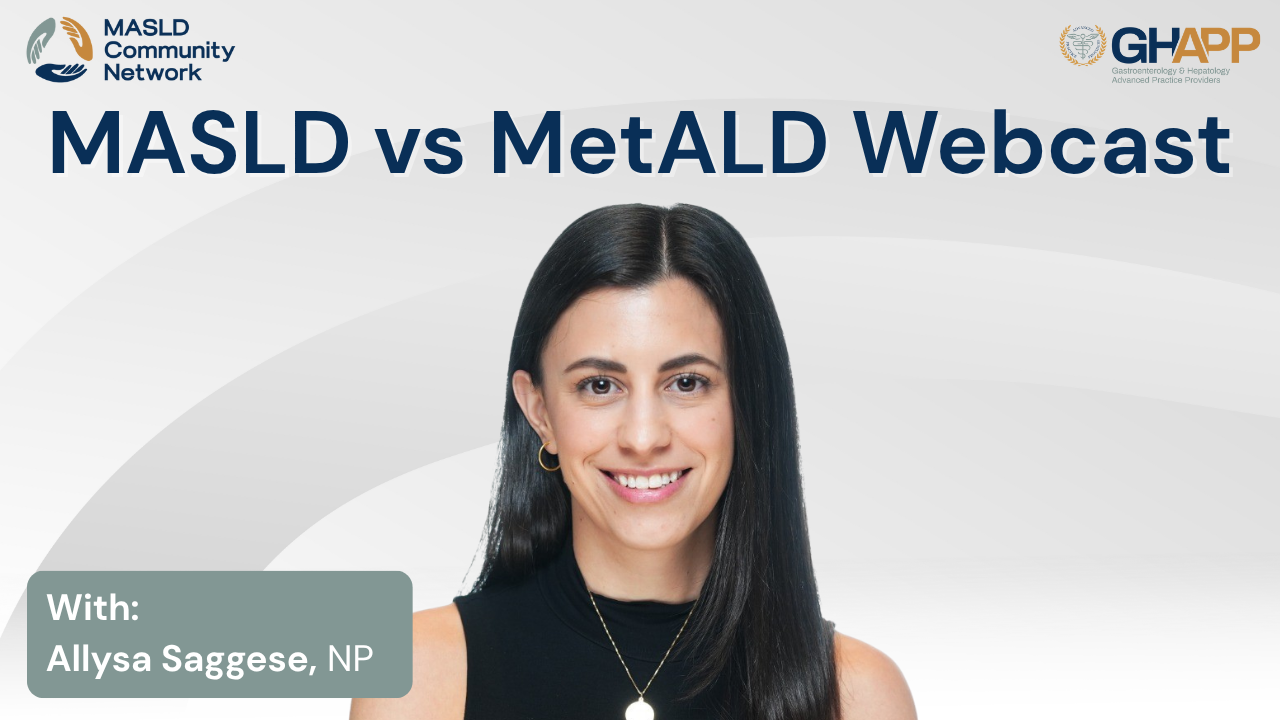
Webcast: MASLD vs MetALD With Allysa Saggese

In this MASLD Community Network session, Allysa Saggese, NP, from Weill Cornell Medicine, New York, walks through a real-world case to demystify the overlap between MASLD, MASH, and metabolic-alcohol related liver disease (MetALD). You’ll learn how to take a precise alcohol history, translate “standard drink” equivalents (≈14 g ethanol), and use objective biomarkers like PEth alongside FIB-4, FibroScan (kPa), ELF, CAP, and MRI elastography to stage disease accurately and catch discordant results. Allysa covers how alcohol can skew labs (ALT/AST, triglycerides, BP), why reducing/abstaining may change non-invasive testing thresholds, when to consider liver biopsy, and who qualifies for HCC surveillance. She also outlines treatment pillars—lifestyle optimization, cardiometabolic risk control, and appropriate pharmacotherapy (including where resmetirom fits and when to avoid it)—so clinicians can tailor care for patients spanning pure MASLD to MetALD. Watch to sharpen your staging, counseling, and monitoring strategy—and help patients make data-driven changes that improve outcomes.
Watch Now
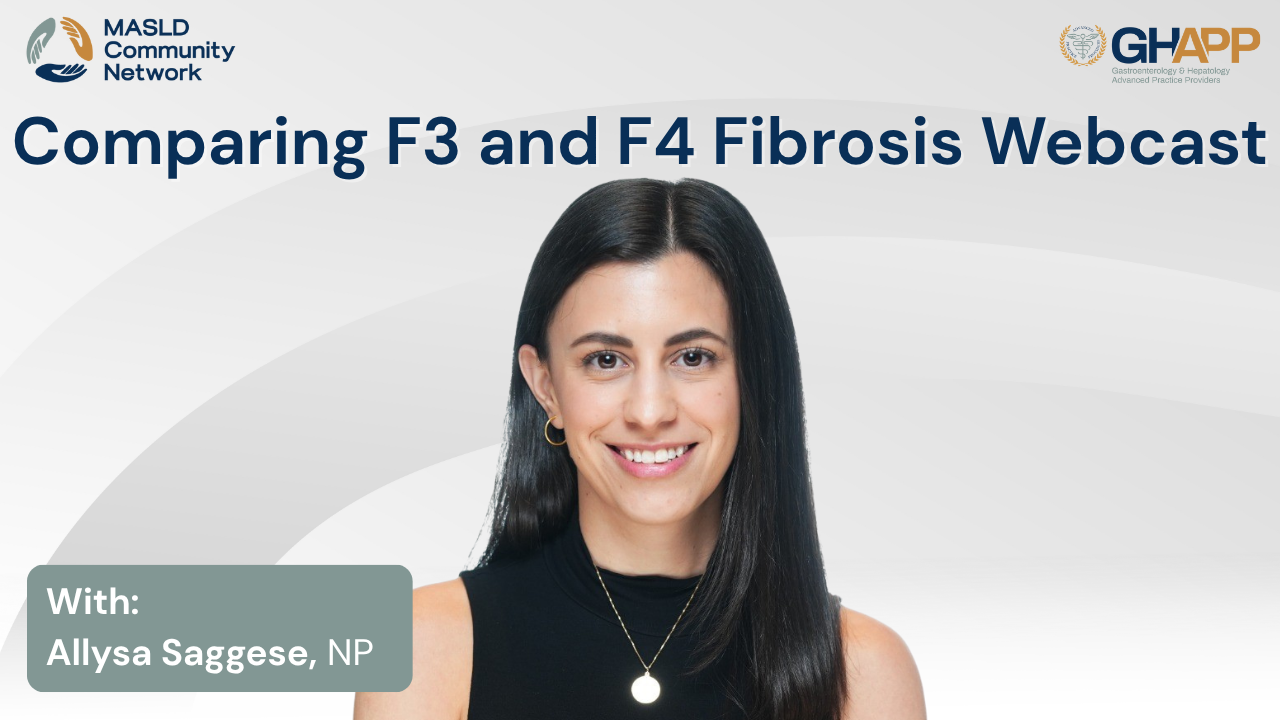
Webcast: Comparing F3 and F4 Fibrosis With Allysa Saggese

In this session from the MASLD/MASH Community Network, Allysa Saggese, NP from Weill Cornell Medicine in New York, explores the critical differences between F3 and F4 fibrosis through two detailed case studies. Accurate staging is essential in fatty liver disease management, as it directly impacts treatment decisions, eligibility for FDA-approved therapies like resmetirom, and the need for hepatocellular carcinoma (HCC) surveillance. Allysa explains how non-invasive tests such as FIB-4, FibroScan, ELF, CAP, and MRI elastography compare, when to consider a liver biopsy, and how to interpret discordant results. She also discusses treatment pathways, the role of GLP-1 receptor agonists, lifestyle modification, and monitoring strategies for patients with advanced fibrosis versus cirrhosis. This practical overview provides clinicians with a clear framework to distinguish between F3 and F4, ensuring patients receive timely interventions, surveillance, and education to improve long-term outcomes in MASLD/MASH.
Watch Now

Webcast: MASLD Pharmacotherapy With Milly Ng

Pharmacotherapy for MASLD is rapidly evolving, and clinicians now have more tools than ever to guide treatment decisions. In this session, Milly Ng, NP at Tufts Medical Center in Boston, breaks down a practical framework for when to initiate treatment, how to select the right therapy, and what monitoring strategies to use. From lifestyle modification and statins to GLP-1 receptor agonists and the first FDA-approved liver-directed therapy, resmetirom, this discussion highlights both established and emerging options. You’ll also learn how GLP-1s can support weight loss and liver health, the evidence behind vitamin E and pioglitazone, and the pivotal Maestro NASH trial that secured accelerated approval for resmetirom. Whether you’re managing patients with obesity, diabetes, or advanced fibrosis, this overview offers actionable strategies to simplify complex decisions and improve outcomes in MASLD/MASH care.
Watch Now
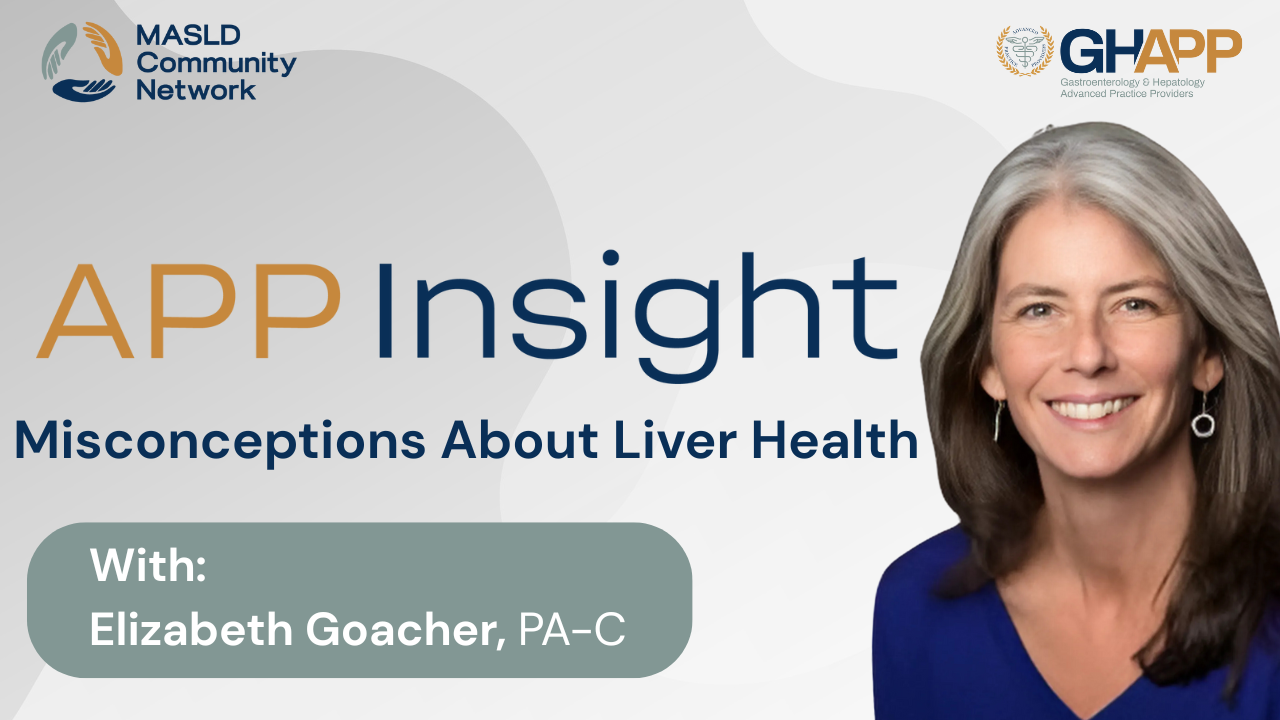
Misconceptions About Liver Health

Elizabeth Goacher, PA-C at Duke University in Durham, North Carolina, addresses a common misconception about Metabolic Dysfunction-Associated Steatotic Liver Disease (MASLD)—that it’s a “death sentence.” While early screening and awareness are critical, Elizabeth emphasizes the importance of balanced messaging: most patients with MASLD, especially those without advanced fibrosis, will not experience liver failure or require a transplant. Instead, their greatest health risks are often from cardiovascular disease and all-cause malignancy, making lifestyle changes, metabolic health management, and cardiovascular risk reduction key priorities. This discussion encourages both patients and referring providers to focus on evidence-based care, clear communication, and realistic risk assessment, ensuring that awareness doesn’t translate into unnecessary fear.
Watch Now

Webcast: MASLD Basics With Emily Przybyl

Emily Przybyl, PA-C, breaks down the basics of Steatotic Liver Disease (SLD) and the updated MASLD/MASH nomenclature—what changed, why it matters, and how to apply it in daily practice. You'll learn how to distinguish MASLD, MetALD, and alcohol-associated liver disease, interpret alcohol exposure (weekly vs. daily intake), and recognize non-metabolic causes of steatosis (DILI, monogenic disorders, viral hepatitis). Emily walks through primary care–friendly risk assessment using FIB-4, when to order VCTE/FibroScan or the ELF test, when to refer to hepatology, and when liver biopsy is still the right move in discordant cases. Using a real patient case, Emily demonstrates a stepwise chronic liver disease workup (viral serologies, iron studies, autoimmune markers, celiac, A1AT, HIV, lipids, A1C, and PEth for alcohol), plus how ultrasound findings (steatosis, smooth contour, spleen size) inform staging. She reviews natural history and progression (who’s at risk to advance to fibrosis/cirrhosis), the roles of genetics and the gut microbiome, and practical counseling on lifestyle modification—BMI/waist thresholds by ethnicity, cardiometabolic risk control, and culturally sensitive nutrition and exercise plans. Perfect for APPs, primary care, and hepatology teams looking for a clear, actionable primer on MASLD/MASH.
Watch Now

Webcast: Lifestyle Management With Becky Klemme

In this educational session, Becky Klemme, NP from Sioux Falls, South Dakota, shares over a decade of hepatology experience to highlight lifestyle management for patients with Metabolic Dysfunction–Associated Steatotic Liver Disease (MASLD). Formerly known as NAFLD, MASLD is now the most common chronic liver disease worldwide, closely linked to obesity, type 2 diabetes, hypertension, and cardiovascular disease. Through a detailed patient case, Becky explains how to evaluate MASLD using labs, imaging, and non-invasive tests like FIB-4 and FibroScan, and how to distinguish between simple steatosis, steatohepatitis (MASH), and advanced fibrosis. She outlines practical strategies for dietary changes, exercise, weight loss goals, and metabolic risk reduction—all while keeping patient-centered, culturally sensitive care in mind. Viewers will also learn about the pathogenesis of MASLD and MASH, the role of genetics and lifestyle, and evidence-based approaches such as the Mediterranean diet, structured physical activity, behavioral counseling, and the 5A framework for patient engagement. With obesity and diabetes on the rise, early recognition and proactive lifestyle intervention are essential to preventing progression to cirrhosis, liver failure, or hepatocellular carcinoma (HCC). If you are a hepatology provider, APP, or clinician managing patients with fatty liver disease, this session offers actionable insights and patient care strategies you can use in practice.
Watch Now
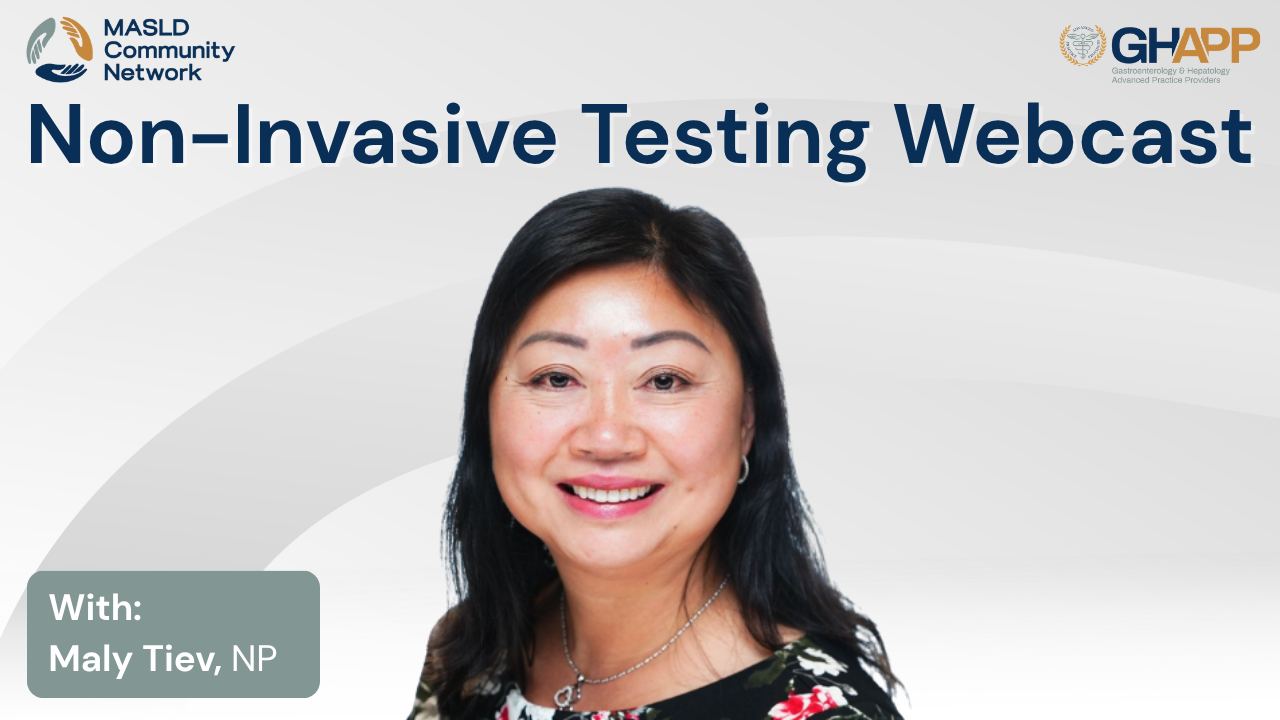
Webcast: Non-Invasive Testing With Maly Tiev

Maly Tiev, NP, NYU Langone Health, shares a practical, case-based walkthrough of non-invasive testing (NITs) for MASLD/MASH—showing how to move from initial risk identification to confident staging and follow-up without a biopsy in most patients. Using Albert’s case, a 65-year-old with steatosis and mild ALT elevation, she explains how to apply FIB-4 first, then layer in FibroScan/VCTE with Liver Stiffness (kPa) and CAP for fat quantification, plus when to order ELF or MRI elastography. You’ll learn reliability checks for FibroScan, common confounders, insurance/operational tips for MRE, and an easy algorithm for primary care/endocrine clinics: start with FIB-4 → triage by cutoffs → use VCTE/ELF → refer when intermediate or high risk. She closes with clear next steps for low-risk patients—lifestyle modification, cardiometabolic optimization, and repeating NITs in 2–3 years—and when to escalate to hepatology for advanced disease.
Watch Now

Webcast: Comparing F3 and F4 Fibrosis With Maly Tiev

Maly Tiev, NP, reviews two real-world cases to explain the critical differences between F3 advanced fibrosis and F4 cirrhosis in patients with MASLD/MASH, and how accurate staging changes treatment, prognosis, and surveillance strategies. Using non-invasive tests (NITs) such as FIB-4, FibroScan/Liver Stiffness (kPa), CAP, and the ELF test, she demonstrates how concordant results can guide management without biopsy, when discordant results may require further imaging or histology, and why platelet count and bilirubin trends are key for identifying cirrhosis. For patients with F3, Maly highlights the importance of lifestyle modification with 7–10% weight loss, diet and exercise counseling, optimization of type 2 diabetes and lipid control, potential use of GLP-1 therapy, and when resmetirom (FDA-approved for MASH with F2–F3 fibrosis) may be considered, along with repeat NITs for monitoring. For patients with F4, management shifts to cirrhosis care, including twice-yearly HCC surveillance (ultrasound ± AFP), variceal screening guided by liver stiffness and platelet thresholds, and strict emphasis on alcohol avoidance and cardiometabolic risk reduction, noting that resmetirom is not used in cirrhotic patients. This case-based discussion provides clinicians, APPs, and hepatology teams with practical tools to approach staging, risk stratification, and surveillance in MASLD/MASH.
Watch Now

Webcast: Lifestyle Management With Elizabeth Goacher

Elizabeth Goacher, PA-C, Duke University, leads a practical, peer-to-peer session on lifestyle management for MASLD/MASH, translating evidence into clear, clinic-ready advice for APPs and primary care. She covers how to identify at-risk patients, use a simple FIB-4→VCTE/ELF pathway to rule out advanced fibrosis, and then center treatment on sustainable weight loss (goal 7–10%), calorie restriction, and a Mediterranean-style diet (more plants, whole grains, lean seafood, fewer added sugars and saturated fats). Elizabeth explains why fructose and highly processed foods drive hepatic fat and inflammation, how to tailor nutrition to culture and access, and how to turn “exercise” into an achievable plan—progressing from walking to 150–200 minutes/week of moderate aerobic activity or 75–125 minutes of vigorous exercise, plus resistance training for central adiposity and insulin resistance. She shares motivational interviewing tips (small, specific goals; non-stigmatizing language; frequent follow-up) and reminds clinicians that lifestyle therapy improves not just liver outcomes, but also diabetes, hypertension, and cardiovascular risk—making it the foundation of MASLD/MASH care.
Watch Now
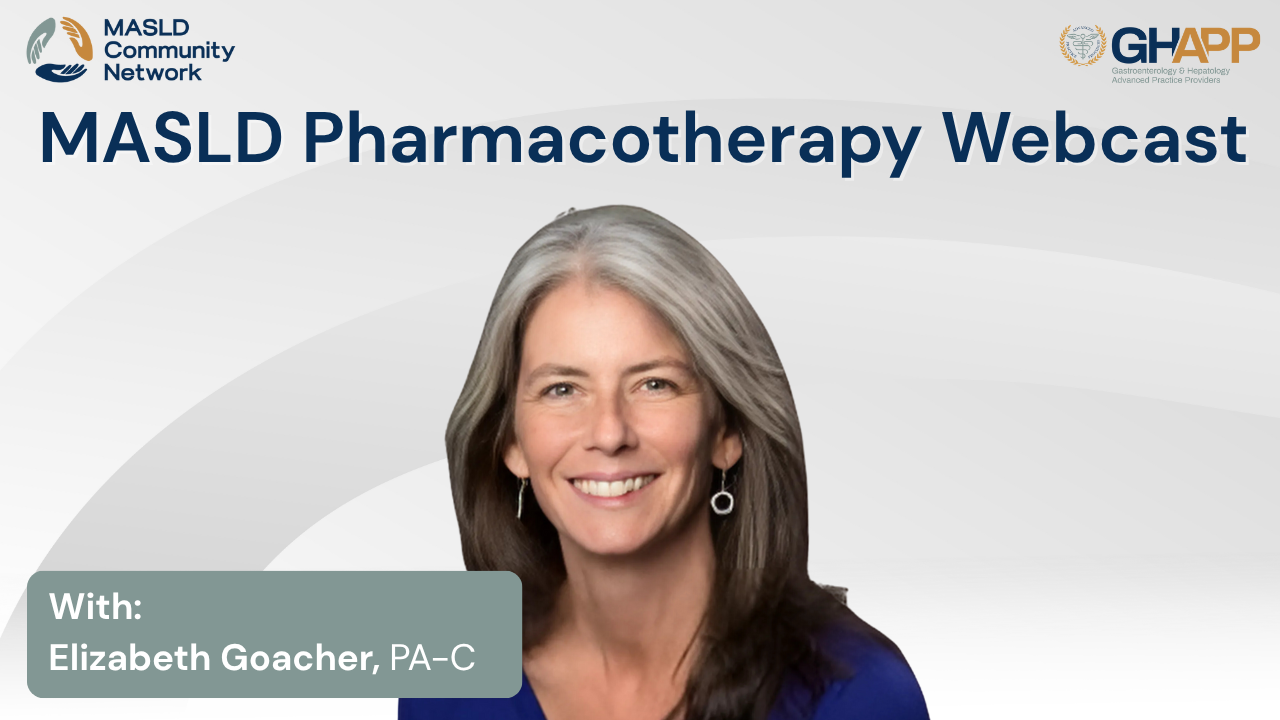
Webcast: MASLD Pharmacotherapy With Elizabeth Goacher

Elizabeth Goacher, PA-C from Duke Medical Center in Durham, NC, delivers an in-depth discussion on pharmacotherapy for MASLD/MASH, highlighting both current treatment options and emerging therapies. She reviews the role of GLP-1 receptor agonists in managing obesity and type 2 diabetes while offering secondary benefits for liver health, and addresses key considerations for procedural planning due to delayed gastric emptying. Elizabeth also explores the ongoing debate around vitamin E and pioglitazone, summarizing data from pivotal trials and guideline recommendations. The session emphasizes the groundbreaking approval of resmetirom, the first FDA-approved medication for MASH with F2–F3 fibrosis, detailing its mechanism as a thyroid hormone receptor beta agonist, trial outcomes, safety profile, and practical prescribing considerations, including payer coverage and drug interactions. This presentation provides hepatology and GI providers with practical insights on staging, non-invasive testing strategies (FIB-4, FibroScan, ELF, MRE), treatment sequencing, and how to integrate pharmacotherapy with lifestyle and multidisciplinary care to optimize outcomes in metabolic liver disease.
Watch Now
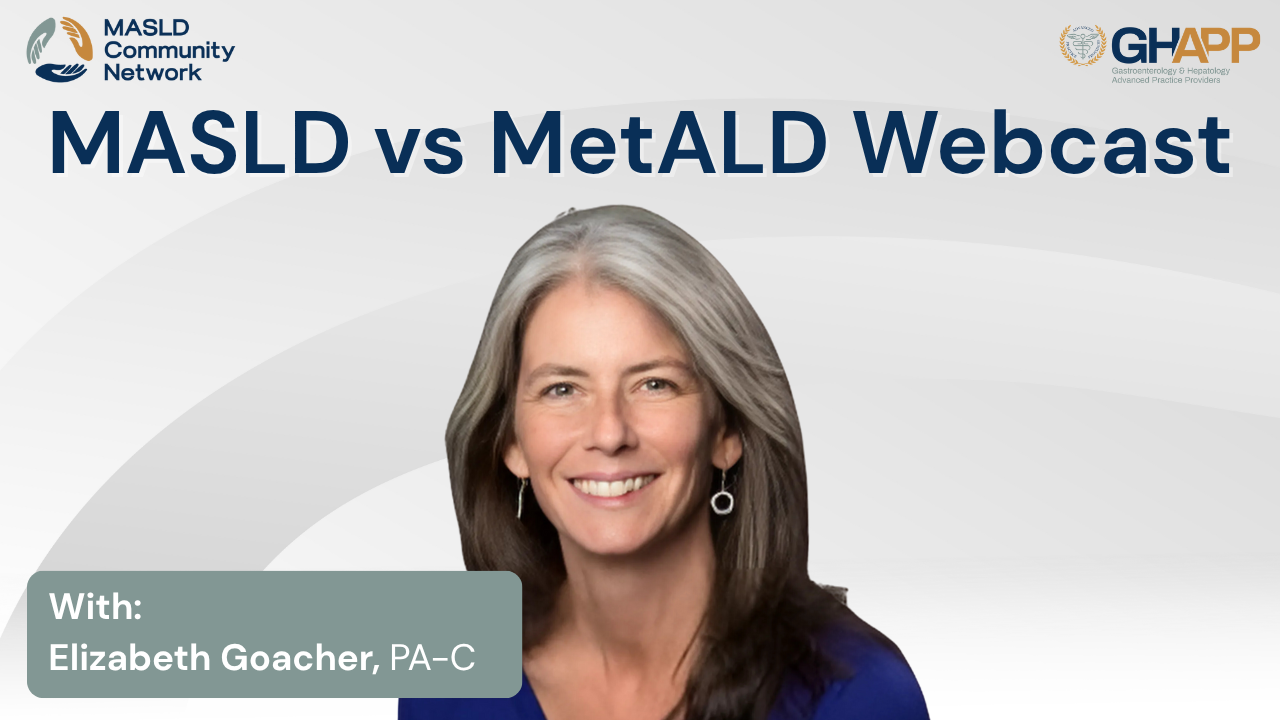
Webcast: MASLD vs MetALD With Elizabeth Goacher

Elizabeth Goacher, PA-C, explains MASLD vs MetALD within the broader Steatotic Liver Disease (SLD) spectrum—and why separating metabolic dysfunction alone (MASLD) from metabolic dysfunction + alcohol exposure (MetALD) changes risk stratification and management. Through a real case, Elizabeth shows how to assess fibrosis risk, interpret CAP/Liver Stiffness, and recognize factors that can inflate stiffness. She reviews practical alcohol quantification, the limits of self-report, and when an objective biomarker like PEth can clarify true exposure—especially for patients with borderline metabolic criteria (e.g., isolated hypertension or hypertriglyceridemia). You’ll learn a stepwise approach for: confirming SLD etiology (exclude DILI, viral hepatitis, monogenic disease), choosing FIB-4, VCTE/FibroScan, or ELF for secondary assessment, deciding when to refer or biopsy for discordant results, and prioritizing therapy (alcohol reduction/cessation, cardiometabolic risk control, lifestyle intervention, and when targeted MASLD pharmacotherapy may be appropriate). She also discusses progression risk (MetALD accelerates vs MASLD), and thoughtful use of HCC surveillance in higher-risk patients. Perfect for APPs, GI/hepatology clinicians, and primary care optimizing real-world MASLD/MetALD care.
Watch Now

Webcast: MASLD Basics With Lindsay Yoder

Lindsay Yoder, PA, Indiana University, delivers a clear primer on the new MASLD/MASH nomenclature and how it fits within the broader Steatotic Liver Disease (SLD) spectrum—including MetALD and alcohol-associated liver disease—so clinicians can label etiology correctly and tailor care. She walks through a practical primary-care algorithm: start with FIB-4 (use 1.3 and 2.67 cutoffs), then add ELF and/or VCTE/FibroScan (LSM and CAP) to risk-stratify fibrosis, refer when intermediate/high risk, and reserve biopsy for discordant cases. The session reviews staging (F0–F4), when to escalate to cirrhosis management and HCC/variceal surveillance, and highlights the impact of the first FDA-approved therapy (resmetirom) for MASH with F2–F3 fibrosis, alongside multidisciplinary lifestyle and cardiometabolic optimization. Perfect for APPs, PCPs, GI, and hepatology teams seeking a concise “basics to bedside” roadmap.
Watch Now
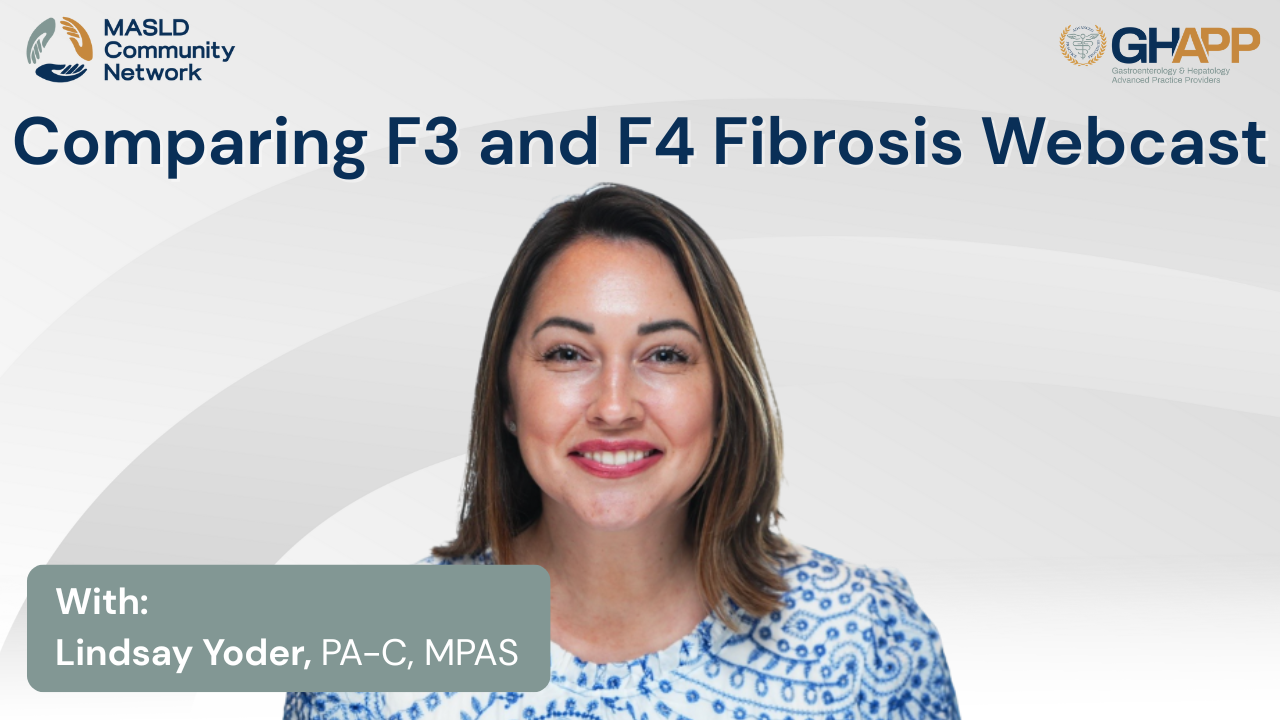
Webcast: Comparing F3 and F4 Fibrosis With Lindsay Yoder

In this in-depth educational session, Lindsay Yoder, PA from Indiana University in Indianapolis, walks through two detailed case studies to highlight the differences between advanced F3 fibrosis and F4 cirrhosis. Using real-world clinical data—including labs, FibroScan, ELF testing, and imaging—she explains how to stage patients with MASLD/MASH, interpret non-invasive fibrosis assessments, and tailor treatment strategies. Viewers will learn how subtle differences in labs and imaging findings, such as thrombocytopenia and liver stiffness measurement, can shift a patient’s diagnosis from advanced fibrosis to cirrhosis. Lindsay also discusses the role of lifestyle interventions, multidisciplinary management, and therapeutic options like resmetirom and GLP-1s, as well as key monitoring strategies for hepatocellular carcinoma (HCC) surveillance and variceal screening. Whether you’re a hepatology provider, an APP, or a clinician looking to sharpen your skills in managing MASLD/MASH, this case-based discussion provides practical insights you can apply in everyday practice.
Watch Now
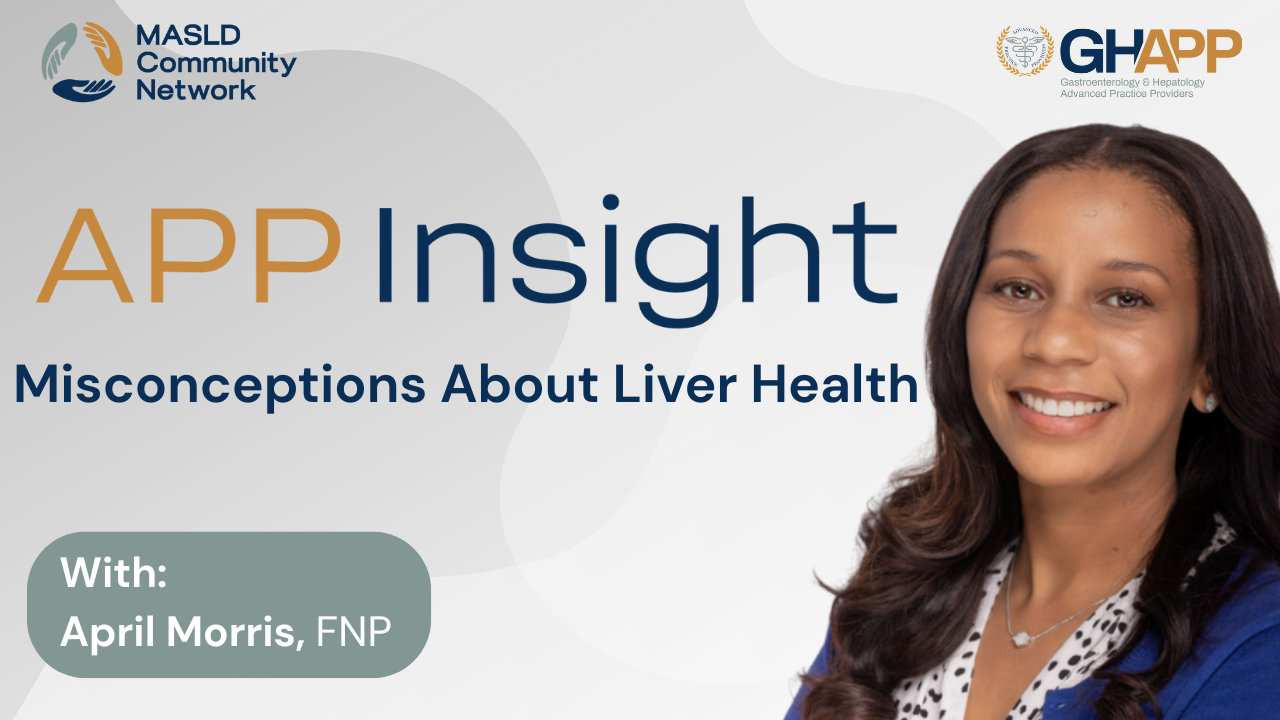
Misconceptions About Liver Health With April Morris

Liver health is often misunderstood, with many patients and even providers believing that elevated liver enzymes mean certain medications are unsafe. In this video, April Morris, a family nurse practitioner specializing in hepatology and endocrinology, clears up misconceptions about liver disease and medication safety. She explains why evaluating overall liver function—through markers like bilirubin, albumin, and platelet counts—is far more important than looking at liver enzymes alone. April also emphasizes that many commonly prescribed medications, including statins and metformin, are generally safe for patients with liver conditions when monitored properly. Beyond medications, she highlights the powerful role of lifestyle modifications—reducing alcohol intake, managing carbohydrates and sugar, focusing on healthy nutrition, and incorporating exercise. These changes, she explains, can dramatically improve outcomes for patients with fatty liver disease (MASLD/MASH), diabetes, and other metabolic conditions. April underscores that patients hold the power to protect their liver health, but education and awareness are essential since liver disease can often remain a “silent killer” until it’s too late. Watch now to gain expert insights on how to better understand liver labs, avoid common myths, and take proactive steps to support long-term liver function.
Watch Now
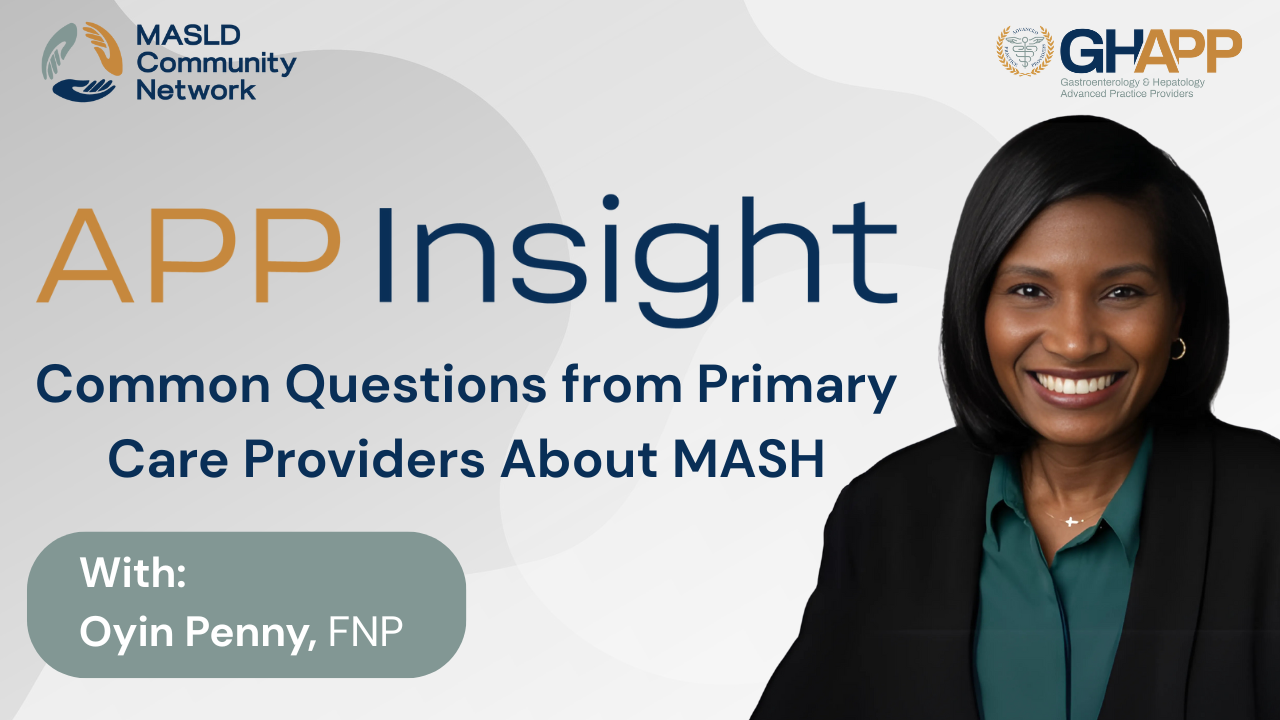
Common Questions From Primary Care Providers About MASH

In this overview on the MASLD Community Network, Oyin Penny, FNP with Premier Gastroenterology, addresses some of the most frequent questions primary care providers have when caring for patients with metabolic dysfunction–associated steatohepatitis (MASH). Learn when to screen patients for MASH, the key risk factors that should prompt evaluation, and when referral to gastroenterology or hepatology specialists is most appropriate. Oyin also explains how to monitor disease progression using non-invasive tests (NITs) such as FibroScan, MR elastography, and ELF tests. Whether you are a PCP managing patients with obesity, diabetes, hypertension, or abnormal liver imaging, this video provides essential guidance to help you identify high-risk patients earlier and optimize their care. Stay tuned for more expert insights and practical education from the MASH Community Network.
Watch Now

Webcast: Lifestyle Management With Jonathan Yeh

In this GHAPP MASLD Community Network session, Jonathan Yeh, PA-C from Columbia University Irving Medical Center, presents a case-based discussion on the lifestyle management of MASLD (Metabolic Associated Steatotic Liver Disease) and MASH (Metabolic Associated Steatohepatitis). Through the case of a 65-year-old patient with obesity, type 2 diabetes, hypertension, and hyperlipidemia, Jonathan highlights how dietary modification, weight loss, and physical activity remain the foundation of treatment, even with new pharmacotherapies available. The presentation emphasizes the benefits of the Mediterranean diet, the importance of avoiding refined carbohydrates, and the role of both aerobic and resistance exercise in improving liver health, reducing steatosis, and potentially reversing fibrosis. Cultural considerations, patient adherence challenges, and strategies to drive behavior change are also addressed, providing clinicians with practical insights to support patients in preventing progression to advanced fibrosis or cirrhosis.
Watch Now
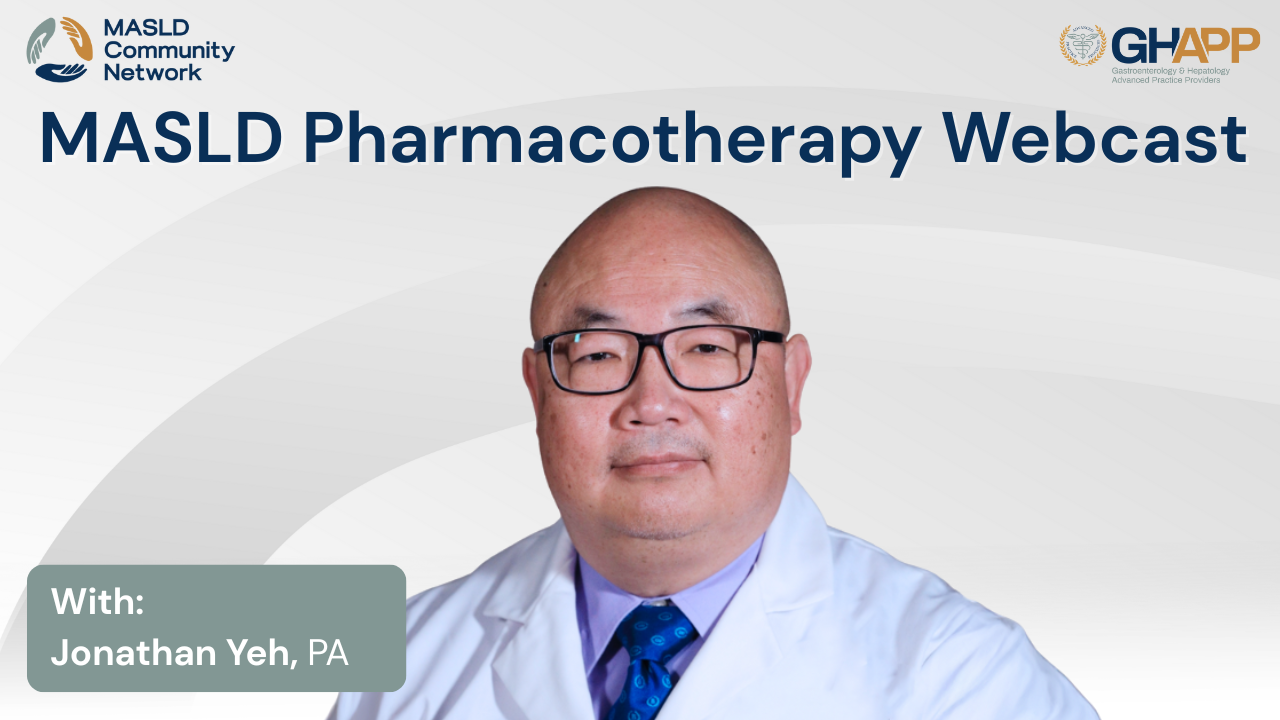
Webcast: MASLD Pharmacotherapy With Jonathan Yeh

In this GHAPP MASLD Community Network Education Series, Jonathan Yeh, PA from Columbia University Irving Medical Center, reviews the latest advances in pharmacotherapy for MASLD (Metabolic Associated Steatotic Liver Disease) and MASH (Metabolic Associated Steatohepatitis). This presentation explores the evolution from NAFLD to MASLD, highlighting why metabolic dysfunction is central to disease progression. Jonathan discusses the role of lifestyle modification, GLP-1 receptor agonists (such as semaglutide and tirzepatide), vitamin E, pioglitazone, and bariatric surgery, while focusing on resmetirom—the first FDA-approved therapy for adults with non-cirrhotic MASH and moderate to advanced fibrosis. The session explains how resmetirom works as a thyroid hormone receptor beta agonist, its clinical trial evidence from the MAESTRO-NASH study, patient eligibility, safety considerations, drug–drug interactions, and monitoring recommendations. With ongoing studies and expanding treatment options, this discussion provides clinicians with practical strategies for managing MASLD and MASH, improving liver outcomes, and addressing the challenges of insurance access and long-term therapy.
Watch Now
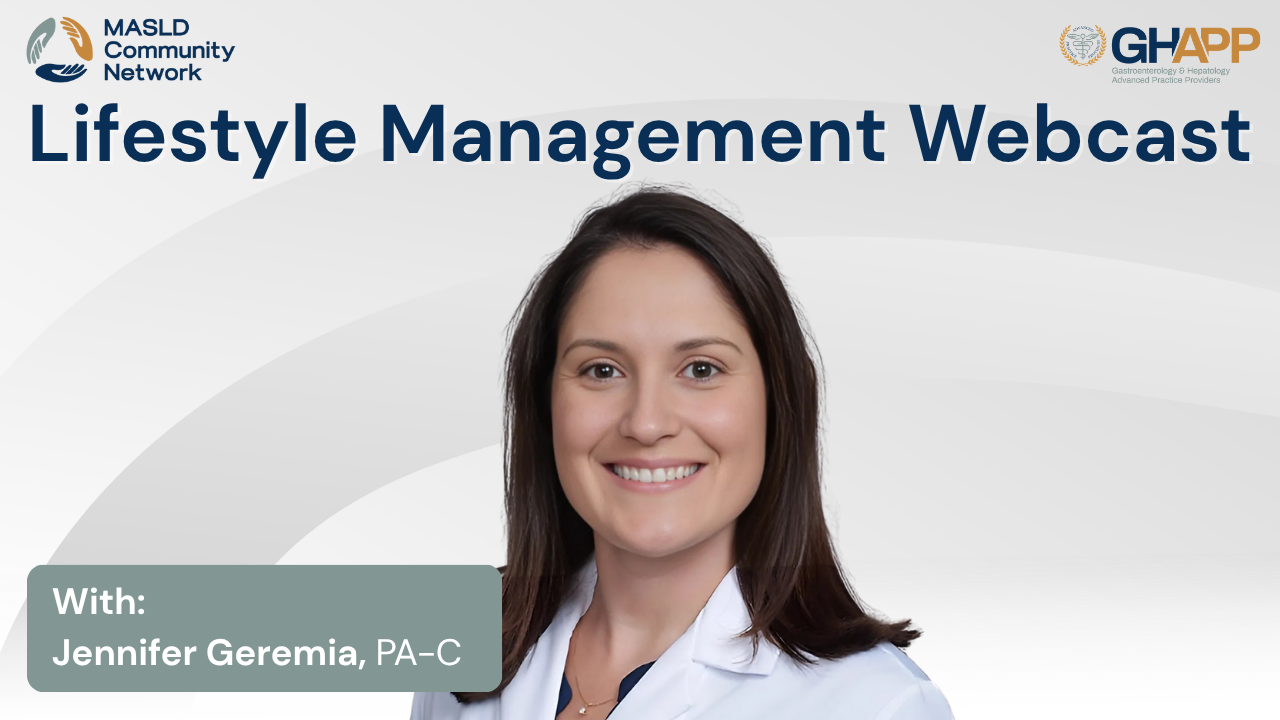
Webcast: Lifestyle Management With Jennifer Geremia

In this GHAPP MASLD Community Network presentation, Jennifer Geremia, PA-C, from Brigham and Women’s Hospital in Boston, discusses the critical role of lifestyle modifications in managing MASLD (Metabolic Associated Steatotic Liver Disease) and MASH (Metabolic Associated Steatohepatitis). Using a case-based approach, she highlights how patients with obesity, type 2 diabetes, hypertension, and hyperlipidemia can benefit from evidence-based interventions including dietary changes, weight reduction, and physical activity. The session emphasizes the importance of achieving and maintaining 7–10% weight loss, the benefits of a Mediterranean diet, and combining aerobic and resistance exercise to improve liver health and reduce progression to advanced fibrosis or cirrhosis. Jennifer also explores the challenges of long-term adherence, the impact of genetic and metabolic risk factors, and strategies for engaging patients in realistic and sustainable lifestyle changes. This program underscores how early intervention and multidisciplinary care can prevent liver disease progression and improve outcomes for at-risk patients.
Watch Now
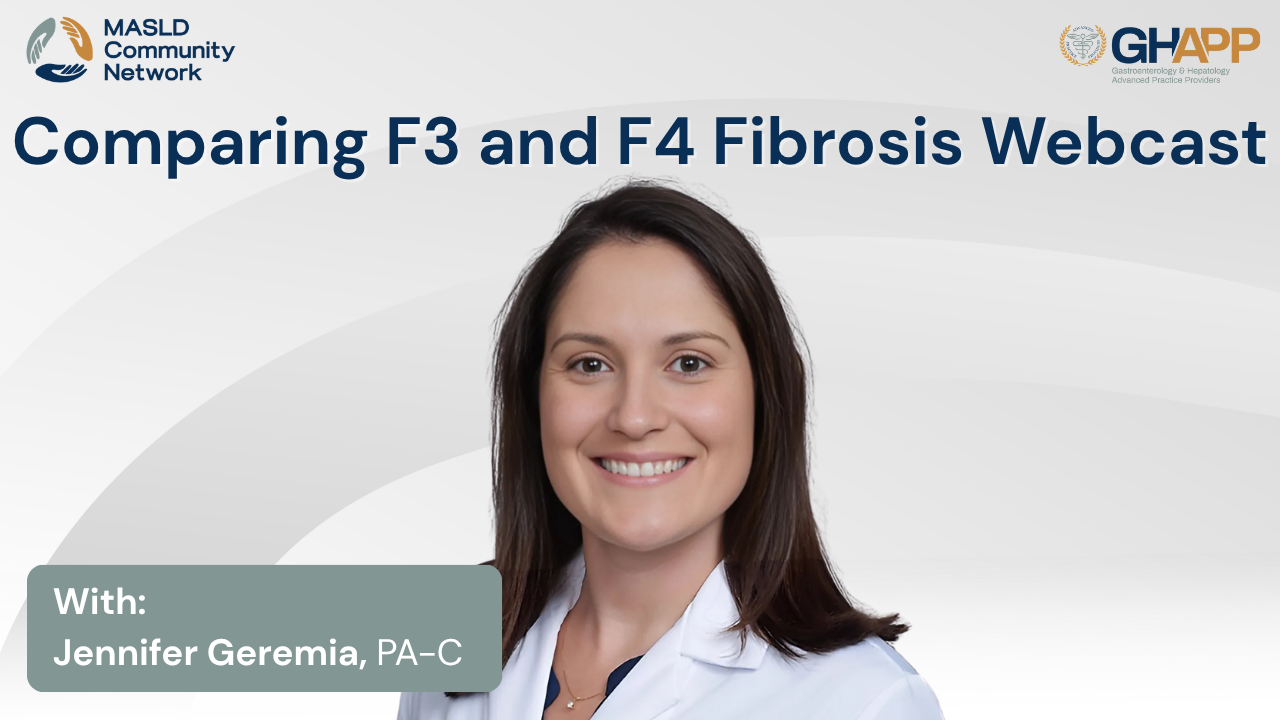
Webcast: Comparing F3 and F4 Fibrosis With Jennifer Geremia

In this GHAPP MASLD Community Network session, Jennifer Geremia, PA-C from Boston, discusses the critical differences between F3 fibrosis and F4 cirrhosis in patients with MASLD (Metabolic Associated Steatotic Liver Disease) and MASH (Metabolic Associated Steatohepatitis). Using a detailed case study, she outlines how non-invasive tests (NITs) such as FIB-4, FibroScan, CAP score, and ELF testing can help differentiate fibrosis stages and guide patient management. The discussion highlights when to consider advanced testing, the role of resmetirom (Rezdiffra) in eligible F2–F3 patients, and why treatment strategies differ for those with F4 cirrhosis, including the need for HCC surveillance, portal hypertension evaluation, and variceal screening. Jennifer also emphasizes lifestyle modifications, metabolic risk factor control, and multidisciplinary care as essential components of managing advanced liver disease. This presentation provides valuable insights for GI, hepatology, and primary care providers navigating the nuances of fibrosis staging and treatment decisions in 2025.
Watch Now
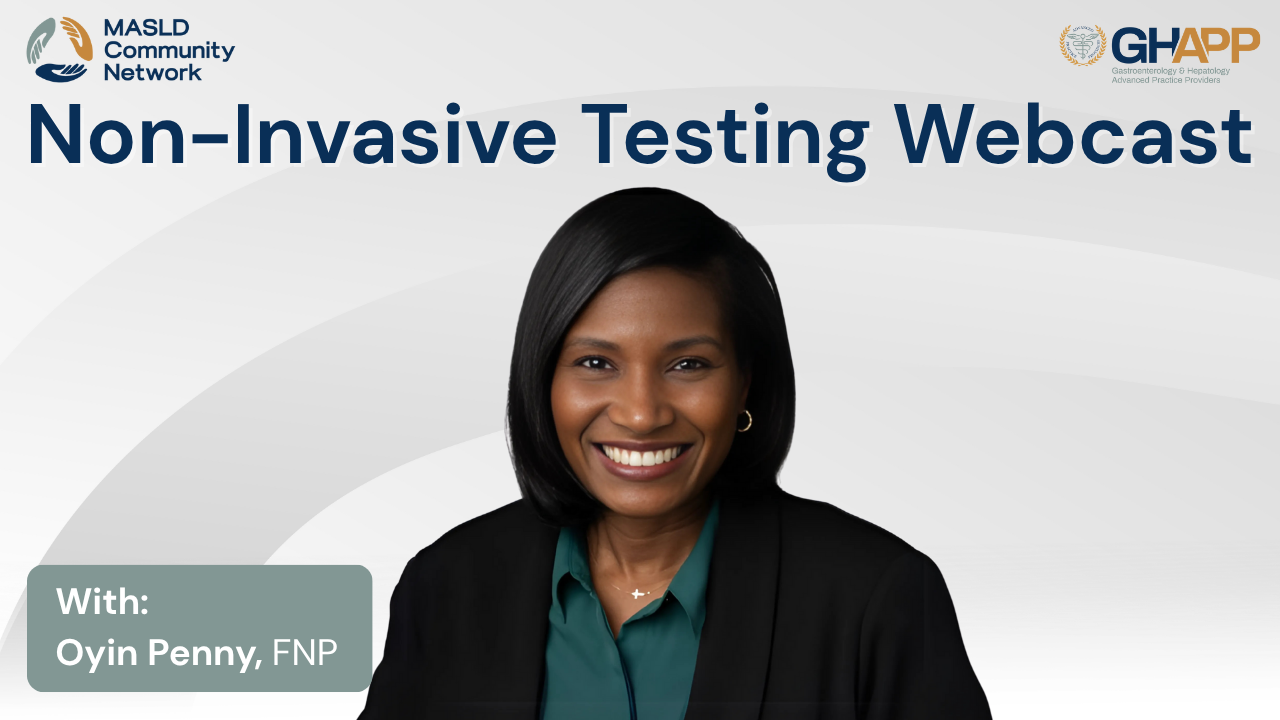
Webcast: Non-Invasive Testing With Oyin Penny

In this GHAPP MASLD Community Network presentation, Oyin Penny, FNP, from Premier Gastroenterology of Kansas City, explores the evolving role of non-invasive testing (NITs) in assessing MASLD (Metabolic Associated Steatotic Liver Disease) and MASH (Metabolic Associated Steatohepatitis). Through a detailed case study of a 65-year-old male with obesity, diabetes, hypertension, and hyperlipidemia, we review how imaging biomarkers such as FibroScan, MR Elastography, CAP score, and MRI-PDFF, as well as clinical prediction tools like FIB-4 and ELF score, are applied to evaluate fibrosis risk and guide management decisions. This session highlights the strengths and limitations of various NITs, emphasizes the importance of accurate fibrosis staging, and outlines when to repeat testing, escalate to hepatology referral, or initiate therapy. The discussion underscores the critical need for early detection, risk stratification, and proactive management of liver disease in patients with metabolic risk factors to prevent progression to cirrhosis and improve long-term outcomes.
Watch Now

Webcast: Comparing F3 and F4 Fibrosis With Oyin Penny

Understanding the differences between F3 and F4 fibrosis is crucial in the management of MASH (Metabolic Associated Steatohepatitis) and other liver diseases. In this session with Oyin Penny, FNP, from the GHAPP MASLD Community Network, we explore a case-based comparison using non-invasive tests (NITs), including FibroScan, ELF score, and Fib-4, to highlight how staging impacts prognosis, treatment strategies, and long-term outcomes. Case 6A focuses on a patient with F3 fibrosis, discussing lifestyle modification, metabolic disease optimization, and the role of therapies like Resmetirom (Rezdiffra). Case 6B revisits the same patient profile but with F4 fibrosis, emphasizing advanced management including HCC surveillance, EGD screening for varices, and consideration of non-selective beta blockers. By contrasting these scenarios, this presentation underscores the importance of accurate fibrosis staging, risk stratification, and timely interventions to improve patient outcomes.
Watch Now
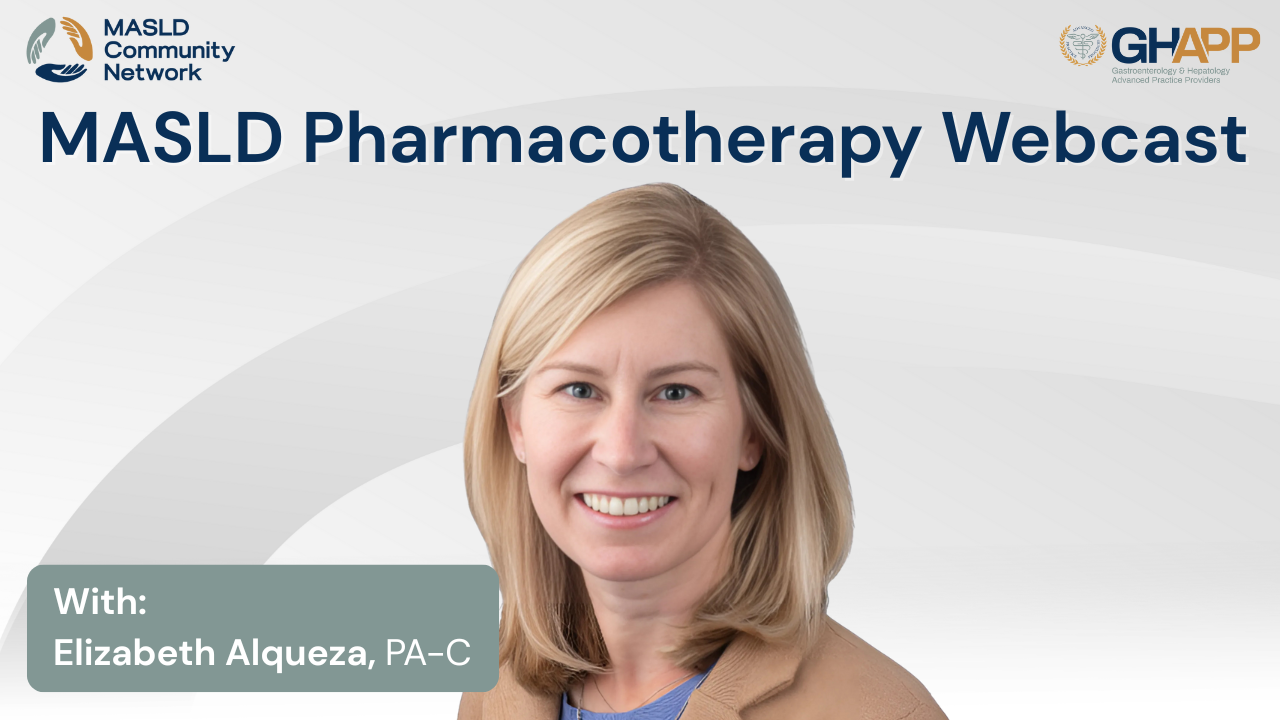
Webcast: MASLD Pharmacotherapy With Elizabeth Alqueza

In this presentation, Elizabeth Alqueza, PA-C at Beth Israel Deaconess Medical Center, provides a comprehensive overview of pharmacotherapy for Metabolic Dysfunction–Associated Steatotic Liver Disease (MASLD) and MASH. She highlights the latest treatment strategies, including lifestyle modifications, cardiovascular risk reduction, and targeted liver-directed therapies. Elizabeth reviews the role of GLP-1 receptor agonists in weight loss and liver health, the evidence for Vitamin E and Pioglitazone in select patients, and the landmark approval of Resmetirom (Rezdiffra)—the first FDA-approved therapy for MASH with moderate to advanced fibrosis. Drawing from clinical trial data, including the MAESTRO-NASH trial, she explains mechanisms of action, efficacy outcomes, safety considerations, and practical prescribing guidance. This session underscores the importance of combining non-invasive testing, lifestyle interventions, and emerging pharmacologic therapies to improve patient outcomes and prevent progression to cirrhosis and liver-related complications.
Watch Now
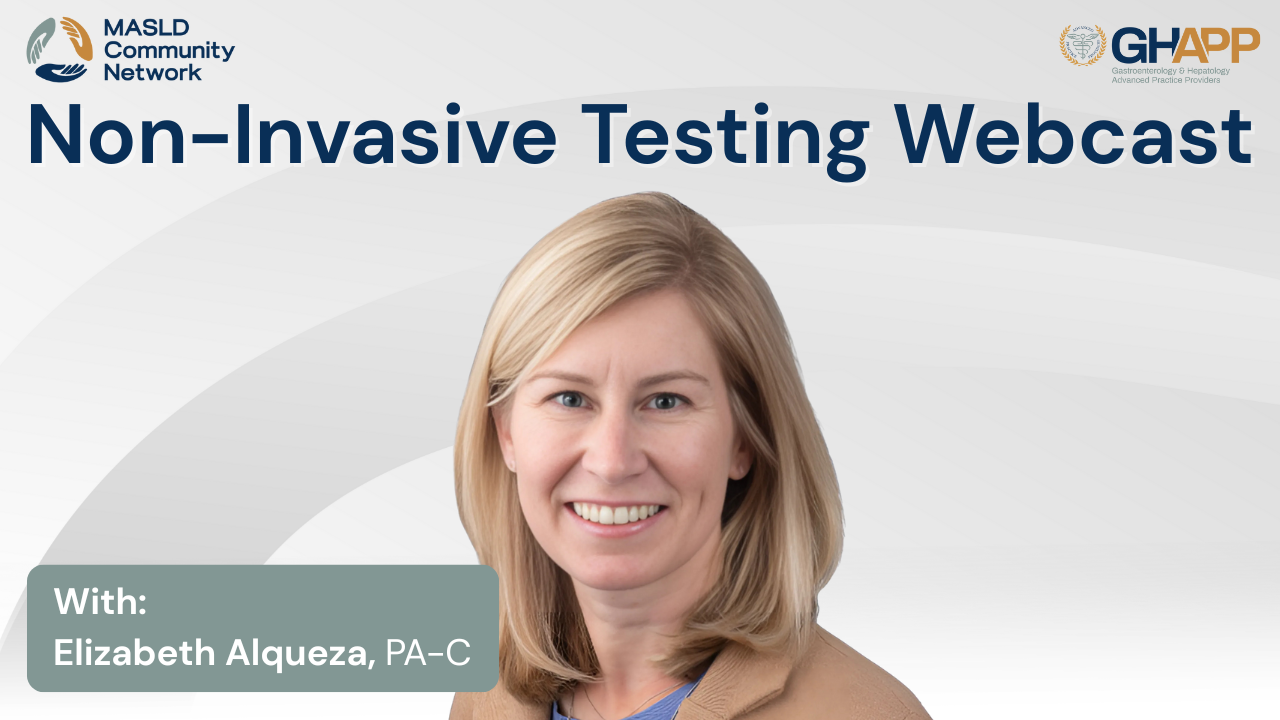
Webcast: Non-Invasive Testing With Elizabeth Alqueza

In this session, Elizabeth Alqueza, PA-C at Beth Israel Deaconess Medical Center, provides a comprehensive overview of non-invasive testing in patients with Metabolic Dysfunction–Associated Steatotic Liver Disease (MASLD) and MASH. Using a real clinical case, she explains how to evaluate patients with abnormal liver enzymes and steatosis on imaging, and how to apply widely used tools such as the FIB-4 score, ELF test, FibroScan (VCTE), CAP score, shear wave elastography, and MR elastography. Elizabeth highlights the strengths, limitations, and interpretation of each test, along with practical considerations like cost, accessibility, patient factors, and operator experience. She also reviews the MASLD care pathway, emphasizing how accurate staging with non-invasive tests helps identify at-risk patients with advanced fibrosis who need closer monitoring, lifestyle interventions, and specialty referral. This talk underscores the critical role of non-invasive assessment in preventing progression to cirrhosis, liver failure, and hepatocellular carcinoma.
Watch Now
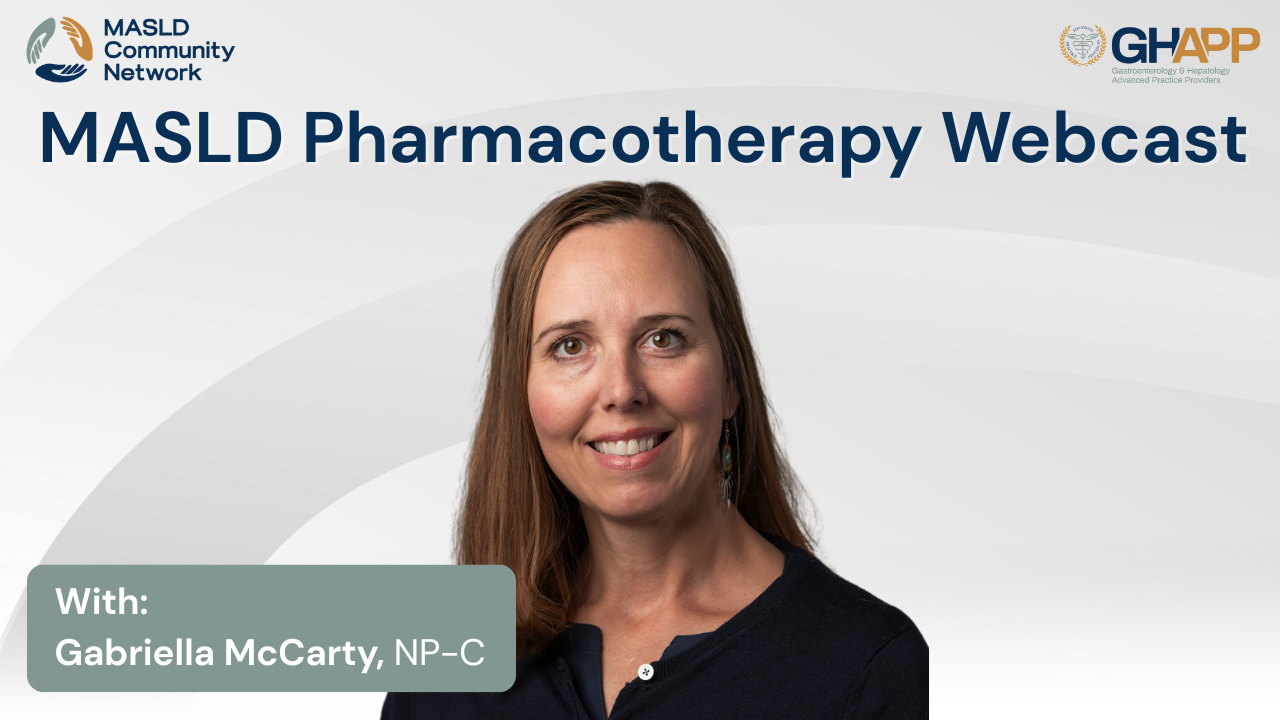
Webcast: MASLD Pharmacotherapy With Gabriella McCarty

In this presentation, Gabriella McCarty, NP-C at Oshi Health, explores the evolving management of Metabolic Dysfunction–Associated Steatotic Liver Disease (MASLD) and MASH with a focus on pharmacotherapy. Drawing from her 26 years in gastroenterology, IBD, and hepatology, she explains how fatty liver disease is often detected incidentally and highlights the importance of early diagnosis and patient education. Gabriella reviews the three-pillar approach to treatment—lifestyle and weight loss strategies, cardiovascular risk reduction, and emerging liver-directed therapies. She discusses the role of GLP-1 receptor agonists, Vitamin E, Pioglitazone, and the first FDA-approved therapy, Resmetirom, detailing their mechanisms, benefits, and safety considerations. With insights from the MAESTRO-NASH trial and real-world experience using non-invasive tests like FibroScan, CAP scores, and ELF testing, this session provides practical guidance for clinicians managing MASLD/MASH and preventing disease progression to cirrhosis or hepatocellular carcinoma.
Watch Now

Webcast: MASLD Basics With Gabriella McCarty

In this educational session, Gabriella McCarty, NP-C at Oshi Health, shares practical insights into Metabolic Dysfunction-Associated Steatotic Liver Disease (MASLD) and MASH. Drawing from over 25 years of experience in GI, IBD, and hepatology, she explains how many fatty liver patients are discovered incidentally during workups for unrelated issues such as GERD or routine colonoscopy. Gabriella reviews the new global terminology (MASLD replacing NAFLD, MASH replacing NASH), outlines key metabolic risk factors that define MASLD, and walks through the role of non-invasive tests (FIB-4, FibroScan, ELF, ultrasound) in staging fibrosis. She emphasizes the importance of early detection, patient education, and primary care involvement in identifying at-risk individuals before progression to advanced fibrosis, cirrhosis, or liver cancer. This presentation highlights how MASLD can silently progress, why primary care and GI collaboration are critical, and the growing need for global awareness and prevention of progressive liver disease.
Watch Now
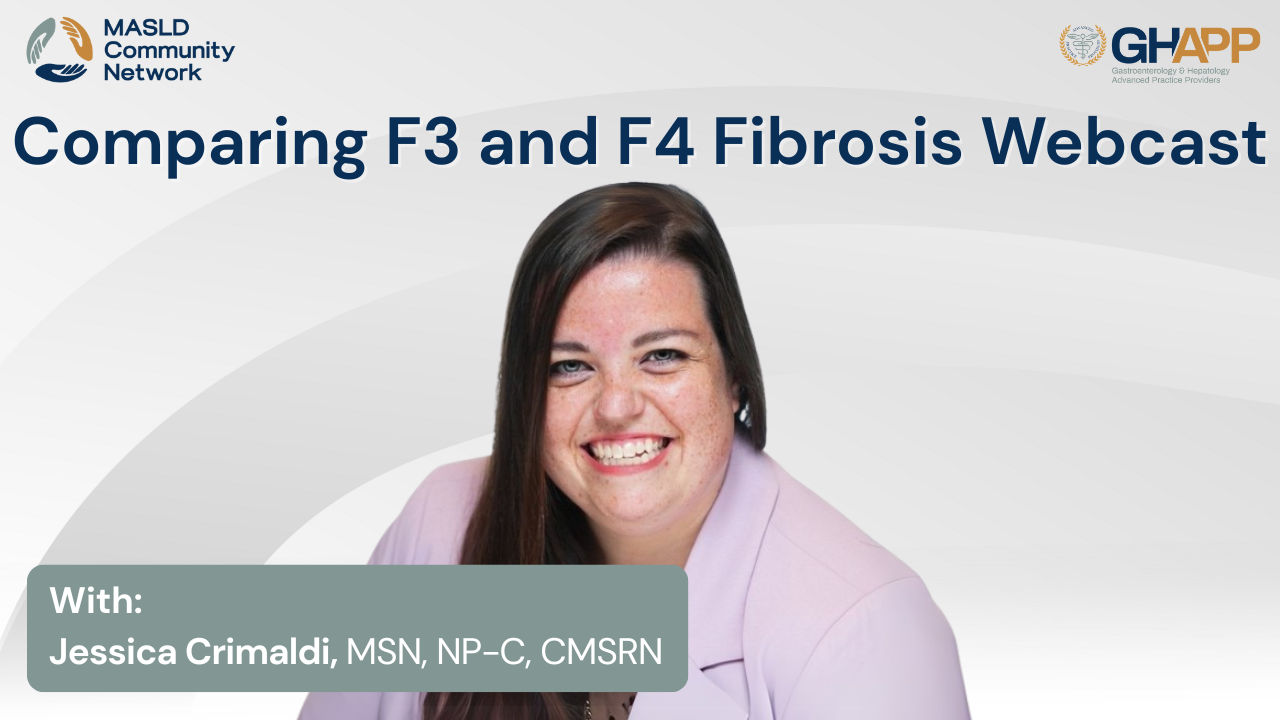
Webcast: Comparing F3 and F4 Fibrosis With Jessica Crimaldi

In this educational session, Jessica Crimaldi, a nurse practitioner at Cleveland Clinic with nearly a decade of experience in gastroenterology and hepatology, walks through real-world cases comparing patients with F3 fibrosis and F4 fibrosis. She reviews how to assess disease severity using non-invasive tests like FIB-4, FibroScan, CAP scores, and ELF tests, and explains how clinical findings such as platelets, bilirubin, and INR can guide staging. Jessica highlights the differences in management between patients with advanced fibrosis versus cirrhosis, including the role of lifestyle modifications, GLP-1 therapy, statins, blood pressure control, and Resmetirom for eligible F2/F3 patients. She also discusses the importance of HCC surveillance, portal hypertension evaluation, esophageal varices screening, and long-term monitoring in cirrhosis care. This case-based learning approach offers practical insights into fatty liver disease, MASLD/MASH progression, and optimizing patient outcomes through accurate staging and tailored treatment strategies.
Watch Now

Common Questions From Primary Care Providers About MASH

Join Maly Tiev, NP, NYU Langone Health, as she answers common questions from primary care providers about Metabolic Dysfunction-Associated Steatohepatitis (MASH). Learn who should be screened based on AASLD and American Diabetes Association guidelines, including patients with obesity, pre-diabetes or diabetes, metabolic syndrome, persistent ALT elevation, or steatosis on imaging. Molly explains when to refer MASH patients to gastroenterology or hepatology—such as those with FIB-4 scores over 1.3, suspected advanced fibrosis, or unexplained liver enzyme elevations—and addresses the safety of prescribing statins in MASH. Backed by multiple studies, she emphasizes that statins do not increase liver injury risk and can significantly reduce cardiovascular mortality, the leading cause of death in this population. This session provides practical, evidence-based guidance to help clinicians improve MASH detection, optimize referrals, and manage cardiovascular risk safely.
Watch Now

Clinical Deep Dive: Unlocking the Treatment Potential of Rezdiffra

This educational discussion dives into Rezdiffra, the first and only FDA-approved therapy for non-cirrhotic metabolic-associated steatohepatitis (MASH) with moderate to advanced fibrosis. The talk provides a clinical deep dive into the progression of MASH and fibrosis, highlighting the risks of untreated disease and the importance of early intervention. A key focus is the thyroid hormone receptor beta mechanism, explaining how Rezdiffra directly targets liver-specific pathways to reduce hepatic fat accumulation and fibrosis. Additionally, the discussion covers the rigorous FDA approval process and dual efficacy endpoints, detailing how Rezdiffra achieved significant fibrosis improvement and steatohepatitis resolution in the MAESTRO-NASH trial. The session also provides practical insights into patient access, prescribing considerations, and managing common side effects. With over 2,000 patients studied, Rezdiffra has demonstrated a strong safety profile and offers a once-daily oral treatment option that represents a major advancement in MASH management. This discussion is essential for gastroenterologists, hepatologists, and endocrinologists managing patients with MASH, as well as primary care providers and cardiologists who play a role in identifying at-risk individuals. If you are a healthcare professional looking to stay updated on the latest MASH research and treatment strategies, this session provides the insights you need.
Watch Now
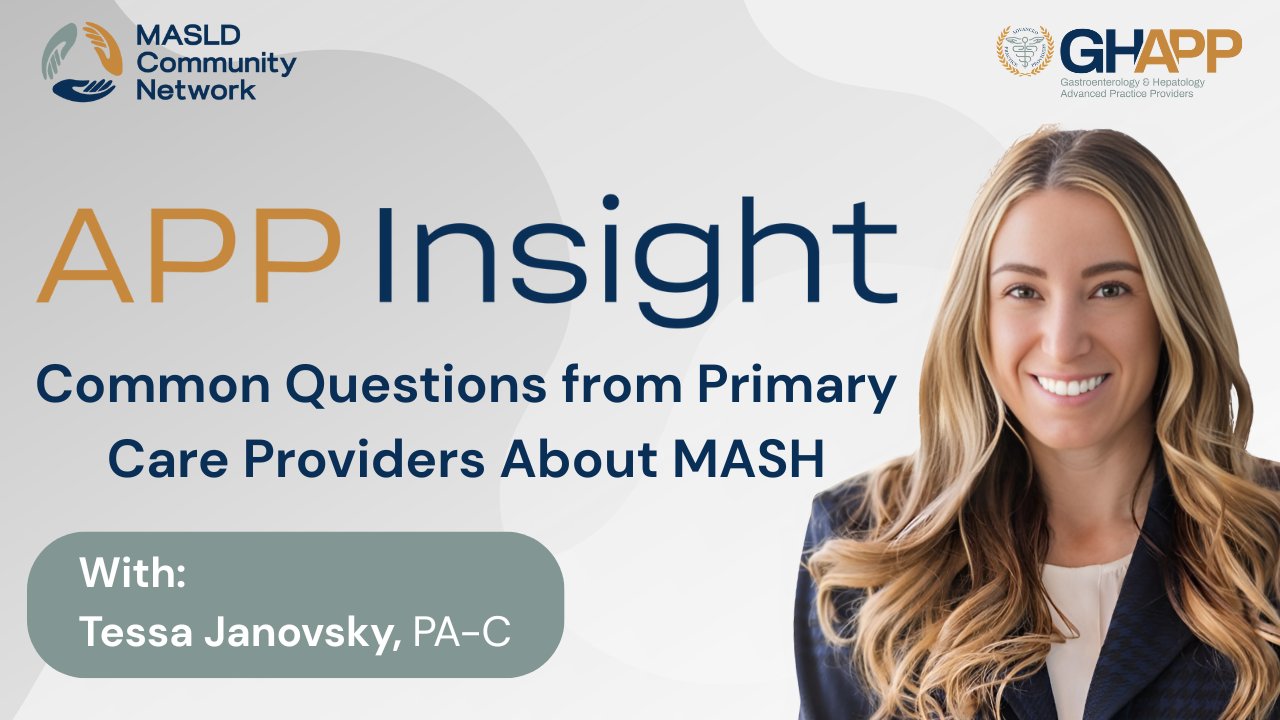
Common Questions From Primary Care Providers About MASH

In this MASLD and MASH Community Network, Tessa Janovsky, PA-C at Arizona Liver Health, answers common questions from primary care providers about Metabolic Dysfunction–Associated Steatohepatitis (MASH) and its updated terminology. She explains why MASH has replaced the term NASH, highlighting the shift to reflect underlying metabolic drivers such as obesity and type 2 diabetes while removing stigmatizing language. Tessa discusses how normal or mildly elevated liver enzymes do not rule out MASH, the importance of screening high-risk groups—including patients with diabetes, obesity, metabolic syndrome, or incidental fatty liver on imaging—and why the FIB-4 score is the preferred first-line test for fibrosis risk assessment. She also reviews the first FDA-approved medication for MASH, resmetirom, as well as the role of GLP-1 therapies and upcoming treatment options. Whether you’re a clinician seeking updated screening guidelines or a patient wanting clarity on diagnosis and management, this session provides clear, evidence-based guidance on identifying and treating MASH.
Watch Now

Common Questions From Community GI About MASH

In this MASLD Community Network episode, Valerie Shin, NP with UCLA Health Hepatology, addresses frequently asked questions from community GI providers about noninvasive tests (NITs) for assessing steatosis and fibrosis in MASLD and MASH. She reviews the benefits and key limitations of the FIB-4 score—highlighting the risk of false negatives in patients with normal AST/ALT levels, false positives in older patients, and inaccuracy when thrombocytopenia is unrelated to liver disease. Valerie explains when to consider second-line NITs, including transient elastography (FibroScan®), ELF score, and MR elastography, detailing their strengths, availability challenges, and technical limitations such as operator dependence, BMI restrictions, and insurance coverage issues. She also clarifies the rare but important role of liver biopsy when NITs produce conflicting or inconclusive results. Whether you’re a healthcare provider seeking practical diagnostic guidance or a patient wanting to understand your testing options, this video offers expert insights into selecting and interpreting noninvasive liver tests for MASLD and MASH.
Watch Now

Common Questions From Primary Care Providers About MASH

In this MASLD Community Network episode, Edith Johannes, NP at UCLA Health, shares evidence-based guidance on one of the most important questions in managing Metabolic Dysfunction–Associated Steatotic Liver Disease (MASLD) and Metabolic Dysfunction–Associated Steatohepatitis (MASH): how much weight loss is needed to improve liver health. Drawing on years of experience in hepatology and liver transplant care, Edith explains how weight loss can reduce liver fat (steatosis), decrease inflammation, improve or even reverse fibrosis, and support better overall metabolic health. Research shows that achieving more than 10% weight loss can result in 100% improvement in steatosis, MASH resolution in 90% of patients, and fibrosis regression in over 80%. Even smaller amounts of weight loss—5% to 10%—provide significant liver and metabolic benefits, while exercise and dietary changes can help improve liver function even without weight loss. Edith also discusses when additional treatments like GLP-1s, bariatric surgery, or resmetirom may be needed. This video is essential for healthcare providers, patients, and caregivers seeking practical, science-backed strategies to manage MASLD and MASH effectively.
Watch Now

Common Questions From Patients About MASH

Discover practical insights into managing fatty liver disease from Melissa Franco, PA, a hepatology expert at the University of Miami. In this MASLD Community Network episode, Melissa answers one of the most common questions from patients: what causes fatty liver and how to improve it. She explains the multiple factors that can lead to fatty liver, including lifestyle, diet, genetics, alcohol use, and certain medications, and emphasizes the critical role of dietary modifications and regular exercise—often recommending the Mediterranean diet. Melissa also addresses alcohol use in patients with fatty liver, sharing why she discourages it entirely due to its potential to accelerate fibrosis progression, even at mild intake levels. Learn why personalized nutrition, physical activity, and avoiding alcohol are key steps in slowing disease progression and protecting liver health. Whether you’re a patient, caregiver, or healthcare professional, this video offers clear, evidence-based guidance on managing fatty liver disease effectively.
Watch Now
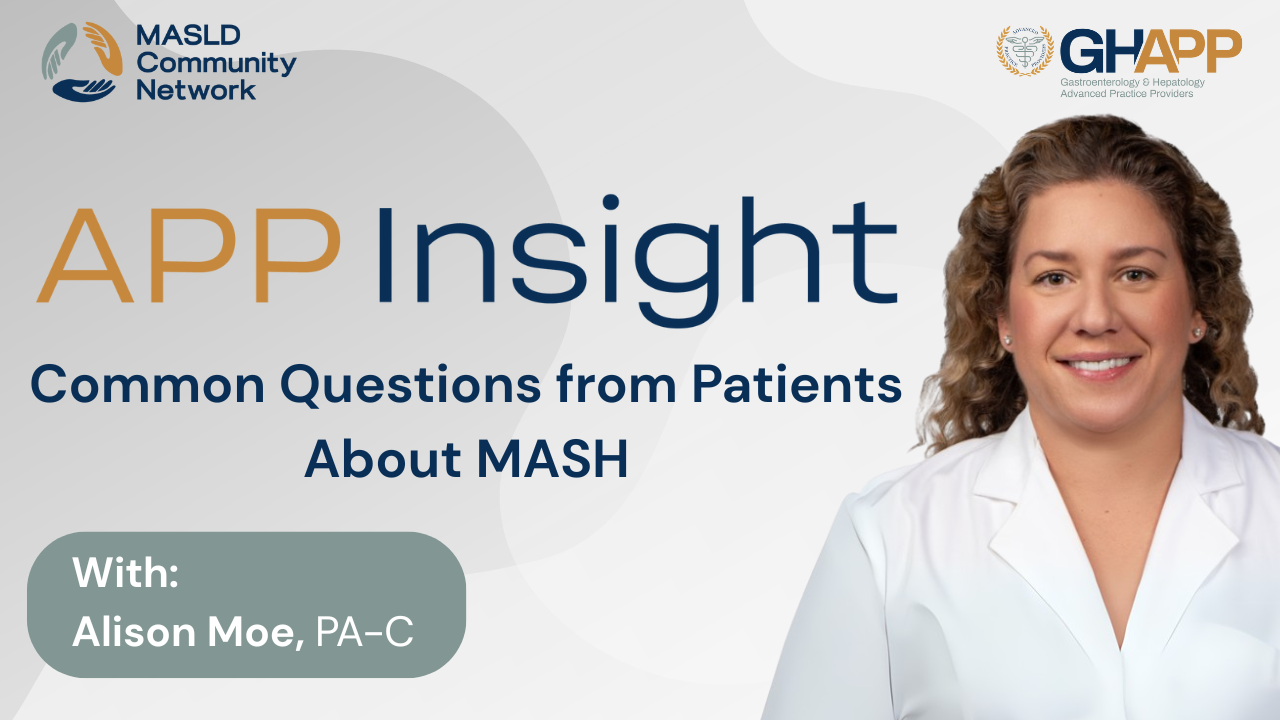
Common Questions From Patients About MASH

In this engaging episode from the GHAPP MASLD Community Network, Alison Moe shares practical insights into the most common questions patients ask about advanced fibrosis and fatty liver disease. Using a liver model, she explains the stages from normal liver to steatosis, fibrosis, and cirrhosis, emphasizing that with lifestyle modifications—such as weight loss, glycemic control, and now FDA-approved pharmacotherapy—fatty liver disease, including F3 fibrosis, can be reversible. Alison also addresses a critical concern: alcohol consumption. She breaks down how her guidance differs depending on the presence and stage of fibrosis, adhering to strict AASLD guidelines to protect liver health. Whether you're a healthcare provider or a patient looking for clarity, this video offers evidence-based guidance and compassionate answers.
Watch Now

Common Questions From Community GI About MASH

In this educational video, HoChong Gilles, NP—Clinical Program Director at the Central Virginia VA Healthcare System—breaks down practical, non-invasive strategies for evaluating liver fibrosis in community GI and primary care settings. With over 25 years of hepatology experience, she walks through the importance of calculating the FIB-4 score using just four parameters: age, ALT, AST, and platelet count. Learn how to interpret FIB-4 score cutoffs to determine low, indeterminate, or high risk of advanced fibrosis and explore alternative tools like the ELF (Enhanced Liver Fibrosis) test when imaging options are limited. Whether you're a hepatology specialist or a frontline provider, this video offers actionable insights to help bridge the gap in liver care access using guideline-supported lab-based methods.
Watch Now
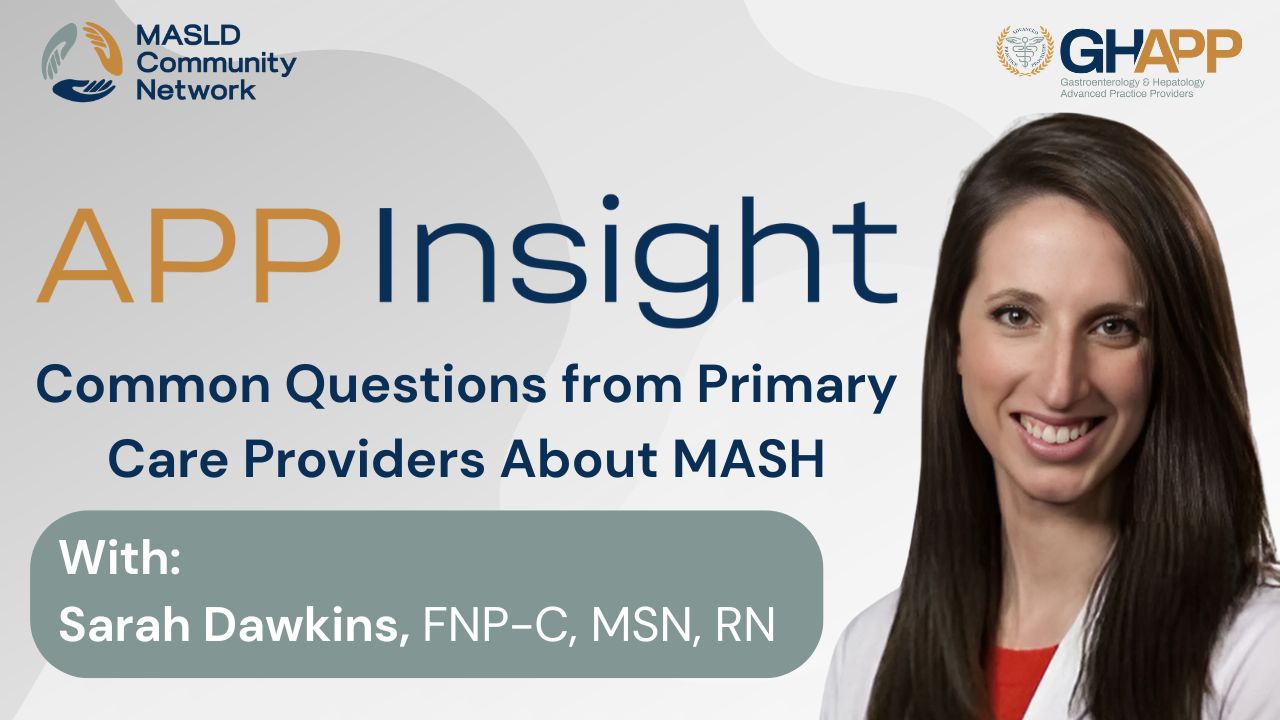
Common Questions From Primary Care Providers About MASH

Join Sarah Dawkins, NP, for quick and practical insights in this edition of GHAPP MASLD Community Network’s APP Insights. Sarah answers common questions from primary care providers about managing patients with hepatic steatosis on imaging but normal liver tests. She explains when to calculate a FIB-4 score, how to interpret mild ALT/AST abnormalities, and when referral to hepatology is necessary. Learn how to assess risk in patients with diabetes, obesity, or metabolic syndrome, and how to rule out other causes like viral hepatitis, alcohol use, drug-induced liver injury, and iron overload. Sarah emphasizes the importance of lifestyle counseling for low-risk patients and provides a clear framework for primary care providers to confidently monitor and manage MASLD without unnecessary referrals. A must-watch for anyone navigating the "gray zone" of liver diagnostics in everyday practice.
Watch Now
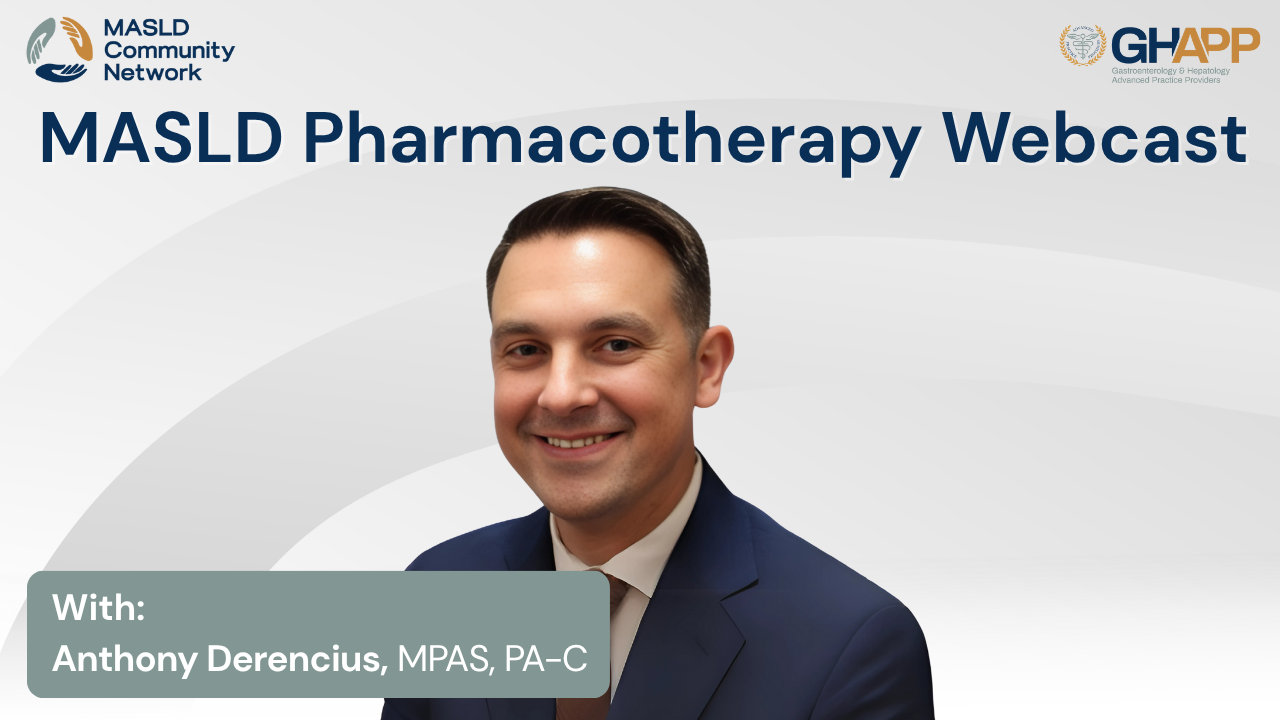
Webcast: MASLD Pharmacotherapy With Anthony Derencius

Join Anthony Derencius, PA-C, sub-investigator at Pinnacle Clinical Research, for an in-depth, case-based discussion on the pharmacologic management of MASLD (Metabolic Dysfunction-Associated Steatotic Liver Disease) and MASH (Metabolic Steatohepatitis) in this GHAPP MASLD Community Network presentation. With clinical insights from both hepatology practice and research, Anthony explores the multifactorial approach to managing metabolic liver disease—emphasizing weight loss strategies, GLP-1 receptor agonists, cardiovascular risk reduction, and liver-directed therapies. Learn how medications like semaglutide and tirzepatide play a role in weight loss and glycemic control, and how vitamin E and pioglitazone are still considered under specific circumstances. A major highlight includes the mechanism and clinical data behind resmetirom, the first FDA-approved therapy for MASH with F2–F3 fibrosis. Anthony explains its thyroid hormone receptor β-selectivity, efficacy data from the MAESTRO-NASH trial, real-world safety considerations, drug interactions, and monitoring protocols. This presentation is essential viewing for clinicians managing MASLD and MASH in both community and research settings, offering practical strategies, current guidelines, and a look into the future of liver-specific pharmacotherapy.
Watch Now

Webcast: MASLD Basics With Jill Olmstead

Join Jill Olmstead, NP, a seasoned gastroenterology nurse practitioner from Providence St. Joseph Health, for an in-depth overview of MASLD (Metabolic Dysfunction-Associated Steatotic Liver Disease) and MASH (Metabolic Steatohepatitis) in this GHAPP MASLD Community Network presentation, proudly sponsored by Madrigal Pharmaceuticals. With over 20 years of clinical experience, Jill explains the evolving nomenclature from NAFLD/NASH to MASLD/MASH and how this impacts diagnostic criteria, patient communication, and multidisciplinary management. Learn how to identify steatotic liver disease, assess cardiometabolic risk factors, and use tools like FIB-4 and FibroScan to evaluate fibrosis and stratify risk. Jill walks through real-world case scenarios, highlighting when to order a liver biopsy, when to refer to hepatology, and how to apply AASLD guidelines in clinical practice. From evaluating elevated liver enzymes to addressing the global burden of MASLD and its progression to cirrhosis and HCC, this session is essential for providers navigating the complexities of modern liver disease management in both primary care and specialty settings.
Watch Now

Webcast: MASLD Basics With Tessa Janovsky

Join Tessa Janovsky, PA-C, from Arizona Liver Health, for this foundational session in the GHAPP MASLD Community Network, proudly sponsored by Madrigal Pharmaceuticals. This episode offers a comprehensive overview of the updated nomenclature and clinical approach to steatotic liver disease, covering the transition from NAFLD/NASH to MASLD (Metabolic Dysfunction-Associated Steatotic Liver Disease) and MASH (Metabolic Dysfunction-Associated Steatohepatitis). Tessa breaks down the rationale behind this global reclassification and explains how it improves diagnostic clarity while reducing stigma. You’ll learn how to identify MASLD using cardiometabolic risk factors, apply non-invasive risk stratification tools like FIB-4, FibroScan, and ELF, and determine when to refer patients for hepatology care. She also discusses the natural history of MASLD progression, the risk of cirrhosis and HCC, and the clinical importance of early detection and treatment. Real-world case studies guide providers through assessing common patient presentations, ruling out alternative etiologies, and considering pharmacologic therapy like resmetirom when appropriate. This is an essential watch for APPs, PCPs, and GI providers working to better understand and manage MASLD and MASH in clinical practice.
Watch Now

Webcast: MASLD Basics With Valerie Shin

Join Valerie Shin, NP, from the Pfleger Liver Institute at UCLA, for a foundational discussion in the GHAPP MASLD Community Network, sponsored by Madrigal Pharmaceuticals. This educational session covers the basics of steatotic liver disease (SLD), with a special focus on the evolving terminology and diagnostic criteria surrounding MASLD (Metabolic Dysfunction-Associated Steatotic Liver Disease) and MASH (Metabolic Steatohepatitis). Valerie explains why the shift away from the outdated “fatty liver” label is more than semantics—it removes stigma, increases diagnostic precision, and improves patient-provider communication. Through clear visuals and case-based discussion, this presentation outlines the global epidemiology of MASLD, how to classify disease etiology (MASLD, MetALD, ALD, or other rare causes), and how to risk-stratify patients using non-invasive tools like FIB-4, FibroScan, and ELF. Learn how to diagnose MASLD, when to refer to hepatology, how to use biomarkers for staging fibrosis, and when pharmacotherapy like resmetirom may be appropriate. With rising global prevalence and many patients progressing silently to cirrhosis or HCC, early detection and management are key. Don’t miss this practical, clinically grounded presentation designed for APPs and primary care providers managing patients with metabolic liver disease.
Watch Now

Webcast: MASLD Basics With Scott Springer

Welcome to the GHAPP MASLD Community Network, where Scott Springer, PA-C, from Erie County Medical Center in Buffalo, NY, provides a comprehensive overview of the evolving landscape of steatotic liver disease. Sponsored by Madrigal Pharmaceuticals, this session breaks down the recent nomenclature shift from NAFLD/NASH to MASLD (Metabolic Dysfunction-Associated Steatotic Liver Disease) and MASH (Metabolic Dysfunction-Associated Steatohepatitis). Scott explores how overlapping etiologies like alcohol-associated liver disease (ALD) and the emerging classification of MetALD better reflect real-world patient populations. Learn about key diagnostic strategies—including the use of FIB-4, ELF score, and transient elastography—to assess fibrosis risk and guide referral to hepatology care. With a clinical case study, Scott highlights the importance of accurate staging, ruling out alternative etiologies, and understanding progression rates in high-risk patients. This session is a must-watch for GI and hepatology APPs looking to stay updated on guidelines, non-invasive diagnostics, and best practices for managing MASLD/MASH in primary and specialty settings.
Watch Now

Webcast: MASLD Pharmacotherapy With Brian Lam

Join Brian Lam, PA-C, Associate Medical Director of Research at INOVA and Chair of the Global NASH/MASH Council, for an insightful discussion on pharmacotherapy for MASLD (Metabolic Dysfunction–Associated Steatotic Liver Disease), also known as fatty liver disease. This episode, part of the GHAPP MASLD Community Network, explores the evolution of treatment options—including GLP-1 receptor agonists like semaglutide and tirzepatide, the antioxidant benefits of vitamin E, the metabolic impact of pioglitazone, and the targeted liver-specific mechanism of action of Resmetirom (a THR-β agonist). Learn how weight loss remains a foundational strategy for MASH management, but with FDA approval of new agents like Resmetirom in March 2024, we now have more tools to address hepatic inflammation and fibrosis directly. Brian also shares practical considerations around comorbidities, cardiovascular risk, statin use, and how to evaluate appropriate patients using non-invasive testing like transient elastography and MR elastography. Whether you're new to managing fatty liver or an experienced hepatology APP, this overview provides the latest guidance and clinical insight to improve patient outcomes in MASLD and MASH care.
Watch Now

Webcast: Lifestyle Management With Sarah Dawkins

Join Sarah Dawkins, NP, for an in-depth and inspiring conversation on lifestyle management for MASLD (Metabolic Dysfunction-Associated Steatotic Liver Disease) and MASH (Metabolic Dysfunction-Associated Steatohepatitis), presented through the GHAPP MASLD Community Network and sponsored by Madrigal Pharmaceuticals. In this engaging session, Sarah uses the real-world case of "Albert" to explore how to assess fibrosis risk using non-invasive testing like FIB-4 and FibroScan, and why lifestyle interventions remain the cornerstone of care for patients without advanced fibrosis. Through a patient-centered lens, she outlines practical strategies for addressing dietary counseling, exercise goals, and culturally sensitive approaches to nutrition—highlighting how individualized care, family involvement, and positive reinforcement can create meaningful behavior change. The session dives into the science behind genetic risk factors like PNPLA3, the role of central obesity in inflammation, and the impact of Western diets on liver health. Sarah also reviews the Mediterranean diet, exercise recommendations, and evidence-based interventions, including the benefits of aerobic + resistance training over HIIT for MASLD improvement. With clinical pearls on motivational interviewing, overcoming barriers to access, and the use of tools like the Exercise and Diet Adherence Scale (EDAS), this session empowers providers to make lifestyle conversations impactful—even when time is short.
Watch Now
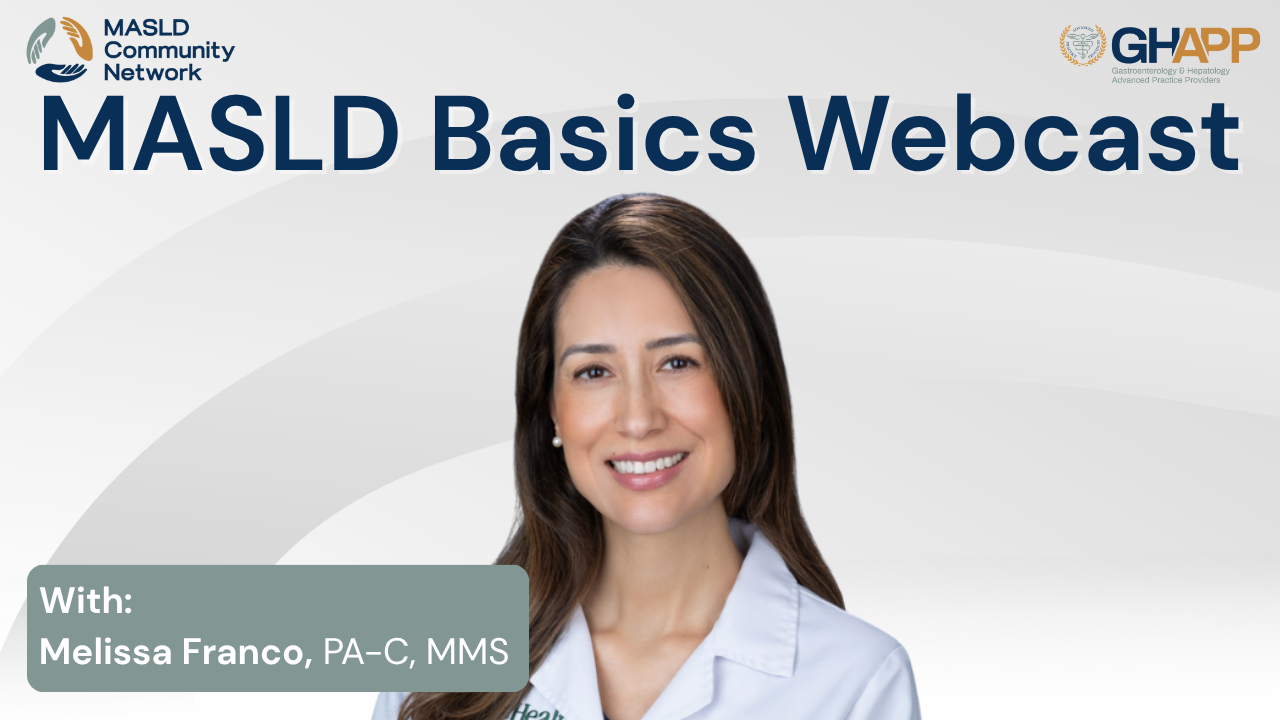
Webcast: MASLD Basics With Melissa Franco

Join Melissa Franco, PA-C, from the University of Miami for a comprehensive review of MASLD (Metabolic Dysfunction-Associated Steatotic Liver Disease) and the 2023 nomenclature updates replacing NAFLD and NASH. Presented through the GHAPP MASLD Community Network and sponsored by Madrigal Pharmaceuticals, this session covers the spectrum of steatotic liver disease, including MASLD, MASH, MetALD, alcohol-related liver disease (ALD), and other causes of hepatic steatosis. Learn how to diagnose MASLD using imaging, cardiometabolic risk criteria, and how to exclude other causes like alcohol use, medications, and genetic disorders. Melissa explains how to risk stratify patients using FIB-4, FibroScan, and ELF testing, and when to consider referral to hepatology, especially for patients at intermediate or high risk for advanced fibrosis. The talk also explores global prevalence, natural history, disease progression to cirrhosis and HCC, and highlights the importance of identifying and managing patients with F2–F4 fibrosis, now classified as at-risk MASH. Through a real-world case study, viewers are guided on how to perform a thorough MASLD workup and assess patients for pharmacotherapy, lifestyle counseling, and surveillance protocols. Whether you are in primary care, GI, or endocrinology, this session is an essential resource for early diagnosis and comprehensive management of fatty liver disease in today’s clinical practice.
Watch Now

Webcast: Lifestyle Management With Milly Ng

Join Milly Ng, a hepatology nurse practitioner at Tufts Medical Center in Boston, for an evidence-based session on lifestyle management for MASLD and MASH, presented through the GHAPP MASLD Community Network and sponsored by Madrigal Pharmaceuticals. Through the case of "Albert," a patient with steatosis and metabolic risk factors, Milly highlights the importance of personalized counseling and non-invasive testing like FIB-4 and FibroScan to assess fibrosis risk. She reviews how Metabolic Dysfunction-Associated Steatotic Liver Disease (MASLD) and its progressive form, MASH, can be reversed through diet, exercise, and weight loss, particularly before fibrosis advances to cirrhosis. Learn how to tailor dietary guidance to a patient's cultural background, socioeconomic status, and personal goals, and understand how central obesity and insulin resistance drive disease progression. Milly also reviews the genetic and environmental factors influencing steatosis, why aerobic training may be more effective than resistance workouts for liver health, and how validated tools like the EDAS (Exercise and Diet Adherence Scale) can track patient progress. This session empowers primary care and hepatology providers to deliver patient-centered lifestyle interventions that can prevent liver disease progression and reduce cardiometabolic risk.
Watch Now
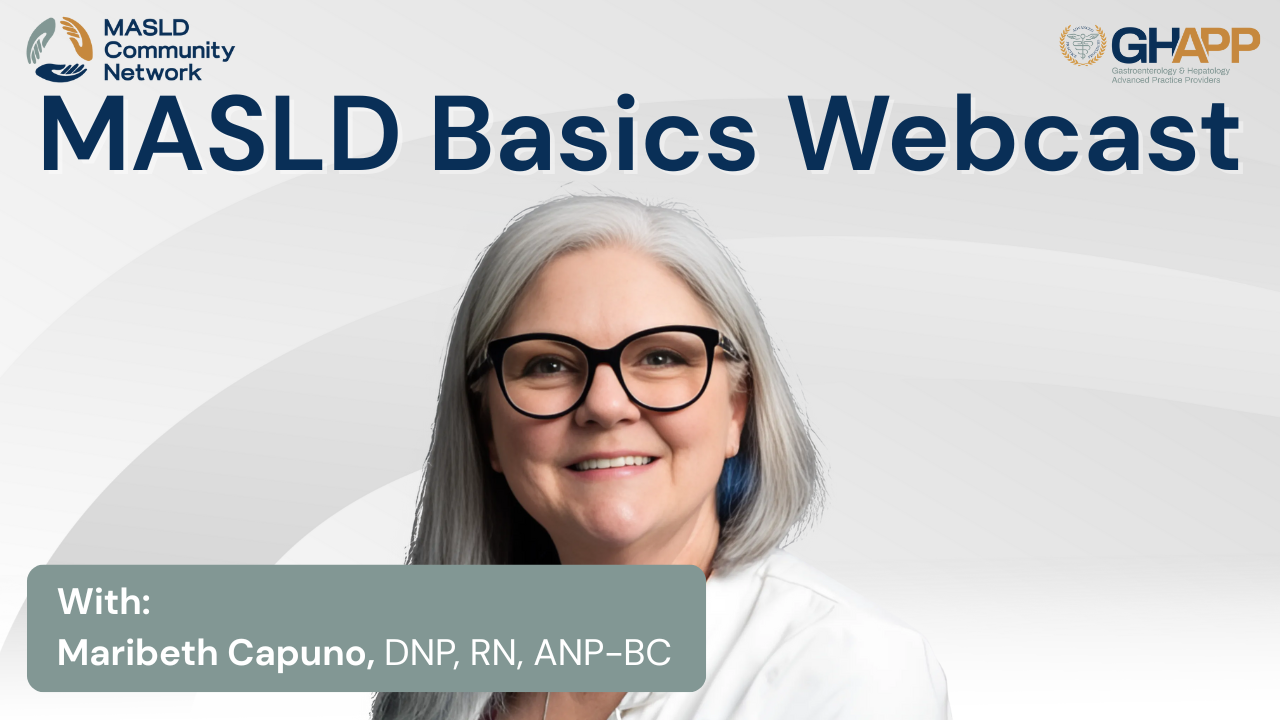
Webcast: MASLD Basics With Maribeth Capuno

Join us for an in-depth overview of steatotic liver disease, presented through the GHAPP MASLD/MASH Community Network and proudly sponsored by Madrigal Pharmaceuticals. This engaging session walks through the updated terminology replacing NAFLD and NASH with MASLD (Metabolic Dysfunction-Associated Steatotic Liver Disease) and MASH (Metabolic Dysfunction-Associated Steatohepatitis)—explaining what the name change means and how to apply the latest AASLD 2023 guidelines in clinical practice. Learn how to identify MASLD based on cardiometabolic risk factors, rule out other causes of steatosis such as alcohol use, autoimmune conditions, and hereditary liver diseases, and determine when to use non-invasive testing like FIB-4, FibroScan, and ELF to stratify fibrosis risk. With Global Fatty Liver Day around the corner, this timely presentation also highlights the global burden of MASLD, its progression from steatosis to cirrhosis and HCC, and practical steps for primary care and hepatology teams to intervene early. You'll follow the case of JP, a 55-year-old with obesity, pre-diabetes, and elevated liver enzymes, as a real-world example of how to evaluate, diagnose, and manage MASLD—and when to refer to hepatology for advanced care. Whether you're a GI provider, APP, or primary care clinician, this talk offers a practical roadmap for managing fatty liver disease in 2025 and beyond.
Watch Now
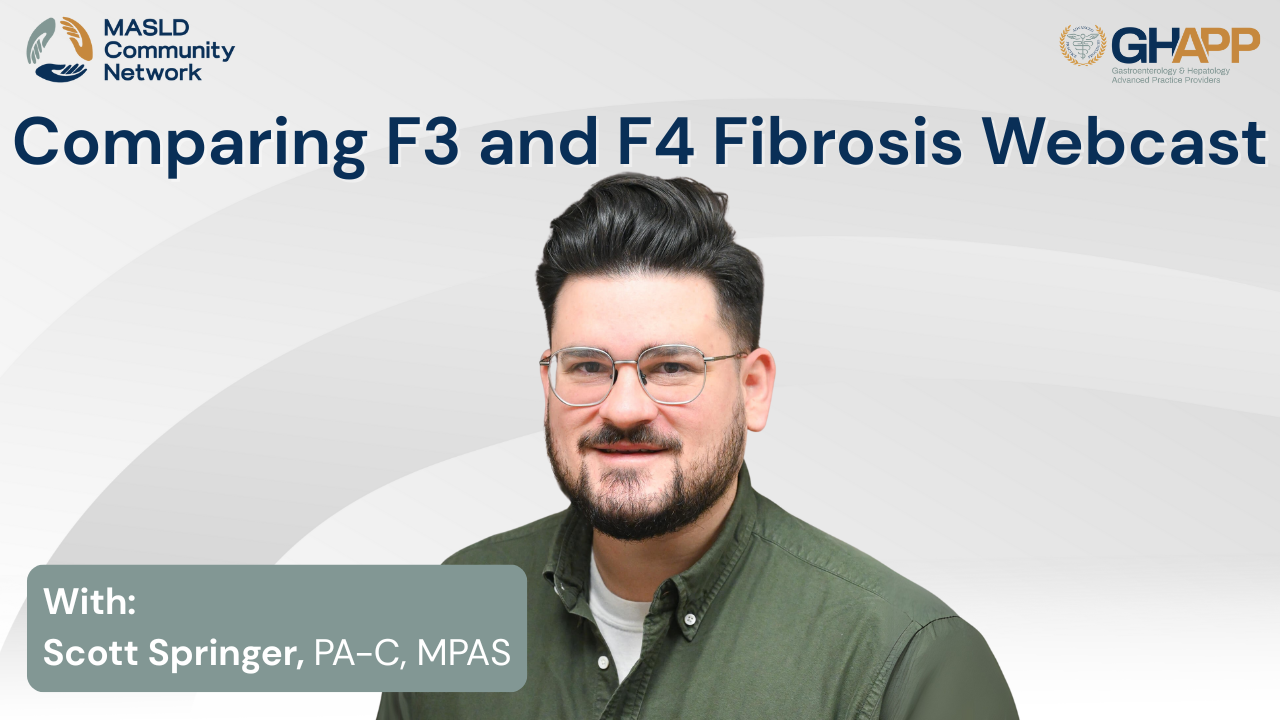
Webcast: Comparing F3 and F4 Fibrosis With Scott Springer

Join Scott Springer, PA-C, from Erie County Medical Center in Buffalo, NY, for a case-based clinical discussion on how to evaluate and manage F3 vs. F4 fibrosis in patients with Metabolic Dysfunction-Associated Steatotic Liver Disease (MASLD) and MASH, presented through the GHAPP MASLD/MASH Community Network and sponsored by Madrigal Pharmaceuticals. Using a detailed side-by-side comparison of a fictional patient "Sam," Scott demonstrates how to interpret key non-invasive testing modalities—including FIB-4, ELF, and FibroScan—to stage liver fibrosis, determine candidacy for emerging therapies like resmetirom (Rezdiffra), and identify when liver biopsy may still be necessary. Learn how changes in platelet count, ELF score, and liver stiffness (kPa) help distinguish advanced fibrosis (F3) from cirrhosis (F4) and how this affects treatment decisions, HCC surveillance, and portal hypertension management. Scott also emphasizes the role of GLP-1 therapy, aggressive cardiometabolic risk reduction, and lifestyle counseling as core strategies in MASLD care. This session is a practical guide for GI and hepatology providers navigating MASLD staging, treatment eligibility, and long-term monitoring in 2025 and beyond.
Watch Now
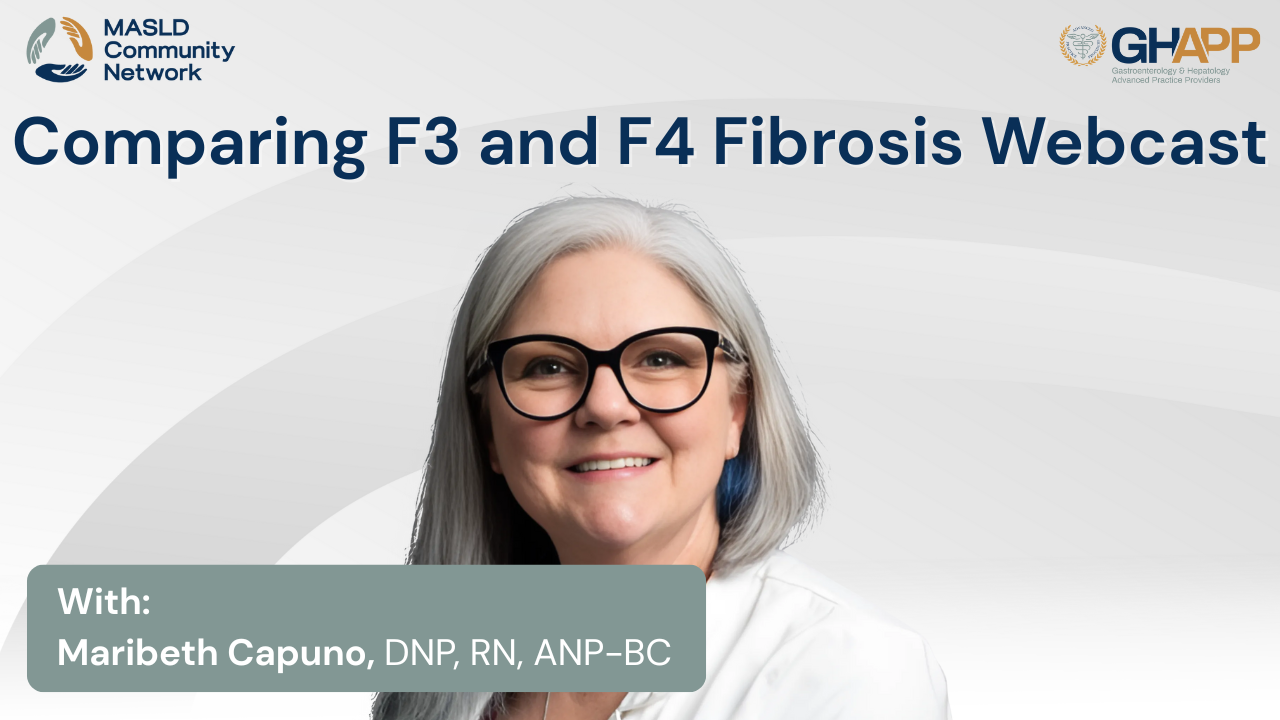
Webcast: Comparing F3 and F4 Fibrosis With Maribeth Capuno

Join Maribeth Capuno, DNP, from the Richmond VA Medical Center, for an insightful case-based discussion on F3 vs. F4 fibrosis staging in patients with Metabolic Dysfunction-Associated Steatotic Liver Disease (MASLD) and MASH, presented through the GHAPP MASLD/MASH Community Network and sponsored by Madrigal Pharmaceuticals. Using the fictional case of “Sam,” Maribeth demonstrates how to differentiate between F3 and F4 fibrosis using non-invasive tools like FIB-4, FibroScan, and the ELF test, while explaining their respective cutoffs and clinical implications. Learn how to stage MASLD accurately, when to consider MRI elastography or liver biopsy, and how to initiate evidence-based management strategies including lifestyle modification, GLP-1 therapy, and the newly approved medication Resmetirom (Rezdiffra). The session highlights the importance of HCC surveillance, portal hypertension screening, and the nuances in monitoring between F3 and F4 fibrosis stages. With a strong emphasis on practical, guideline-aligned hepatology care, this video provides essential insights for clinicians managing the growing MASLD population.
Watch Now
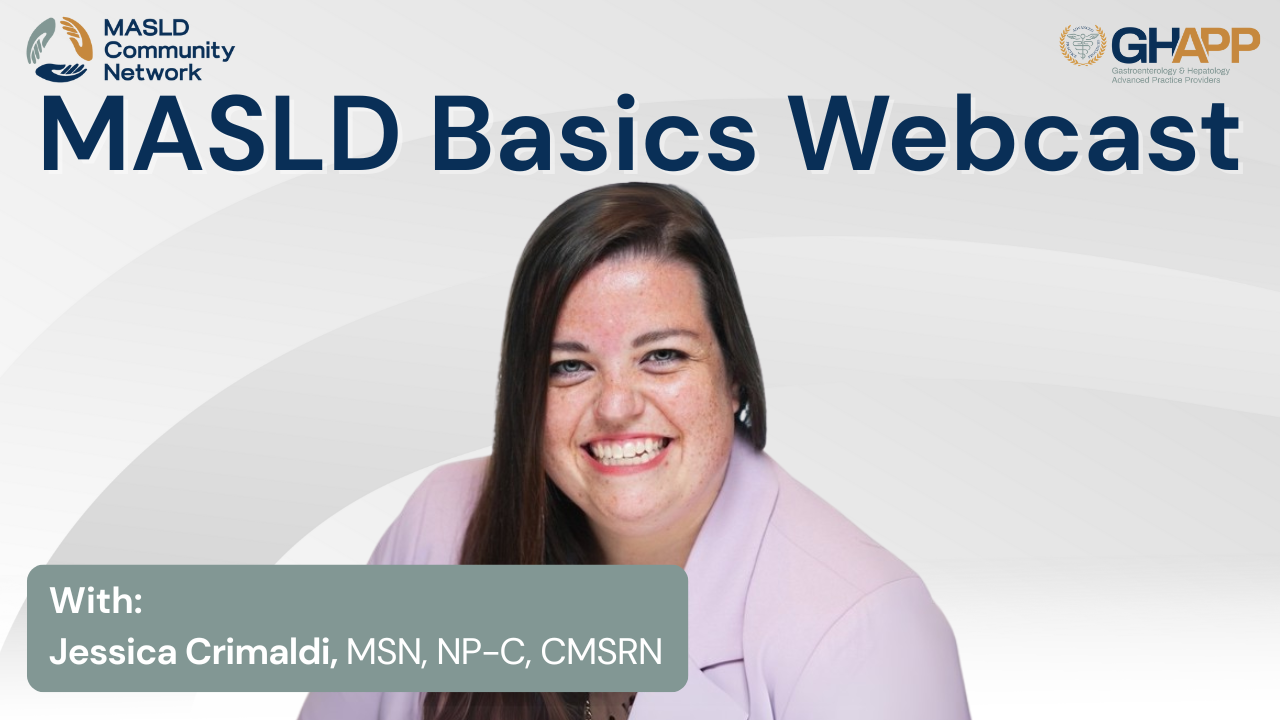
Webcast: MASLD Basics With Jessica Crimaldi

Join Jessica Crimaldi, NP, from the Cleveland Clinic, for an in-depth and practical overview of MASLD (Metabolic Dysfunction-Associated Steatotic Liver Disease), presented through the GHAPP MASLD Community Network and supported by Madrigal Pharmaceuticals. In this foundational session, Jessica breaks down the new 2023 steatotic liver disease nomenclature, replacing NAFLD and NASH with MASLD and MASH, and explains how these changes align with updated AASLD guidelines. Through a case-based approach, she walks through key diagnostic criteria, highlighting the role of cardiometabolic risk factors, non-invasive assessments such as FIB-4, FibroScan, and ELF, and when to consider liver biopsy for staging fibrosis. Learn how to stratify patients based on metabolic profiles, evaluate imaging and lab results, and identify those at risk for progression to advanced fibrosis or cirrhosis. Jessica also discusses global epidemiology, genetics (like PNPLA3), environmental contributors, and the clinical importance of early detection. With a comprehensive workup strategy for primary care and GI settings, this session equips providers to implement guideline-driven MASLD evaluation and referral practices for improved patient outcomes.
Watch Now
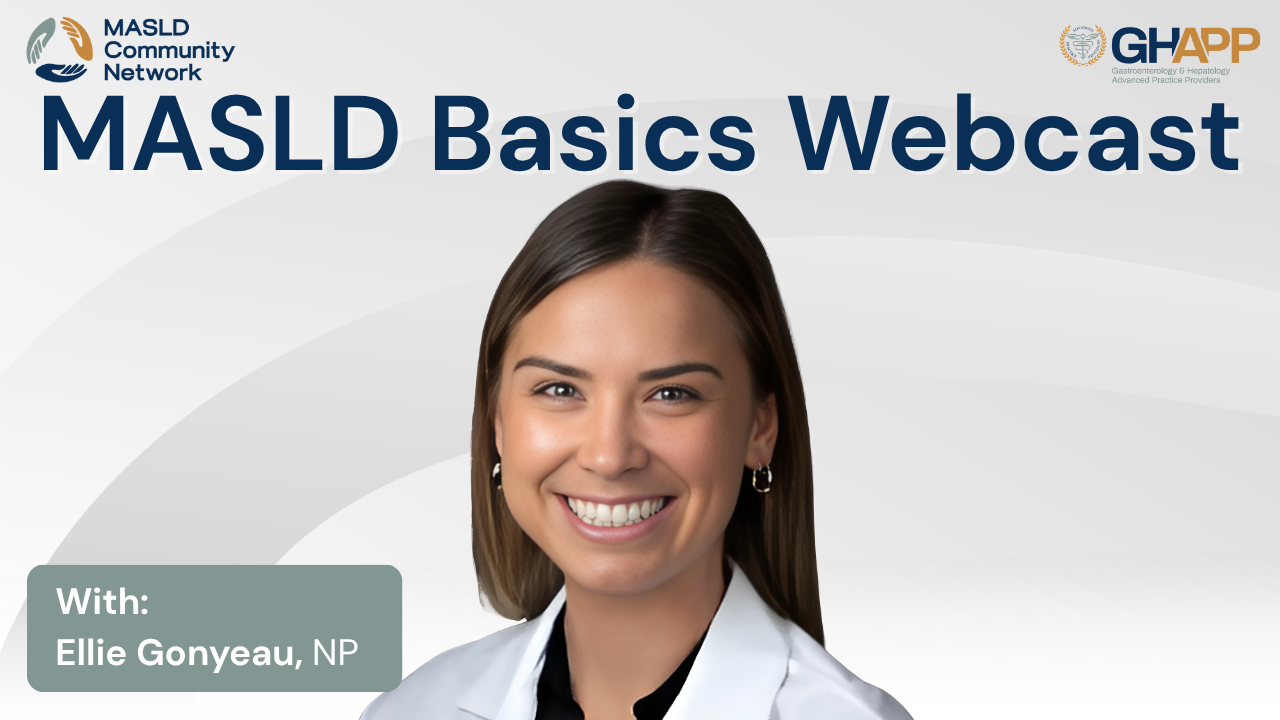
Webcast: MASLD Basics With Ellie Gonyeau

Join Ellie Gonyeau, NP, a GI and hepatology nurse practitioner at Beth Israel Deaconess Medical Center in Boston, for a foundational overview of Metabolic Dysfunction-Associated Steatotic Liver Disease (MASLD), formerly known as NAFLD. Presented through the GHAPP MASLD Community Network and sponsored by Madrigal Pharmaceuticals, this session covers the latest updates in MASLD nomenclature, diagnostic criteria, and non-invasive evaluation strategies. Ellie walks through the 2023 guidelines, emphasizing how MASLD is defined by hepatic steatosis in the presence of at least one metabolic risk factor—such as obesity, type 2 diabetes, hypertension, or dyslipidemia—and the importance of ruling out excessive alcohol use and other causes of chronic liver disease. Using real-world case examples like "JP", Ellie illustrates how to assess disease severity using tools such as FIB-4, FibroScan, and lab workups, while explaining when to consider specialty referral, further imaging, or liver biopsy. The talk also highlights the alarming rates of MASLD in high-risk populations, such as the Latin American community, and explores the disease's potential to silently progress to MASH, fibrosis, or cirrhosis. Whether you're in primary care, GI, or hepatology, this session provides critical insights on early detection, risk stratification, and guideline-based management of this increasingly prevalent condition.
Watch Now
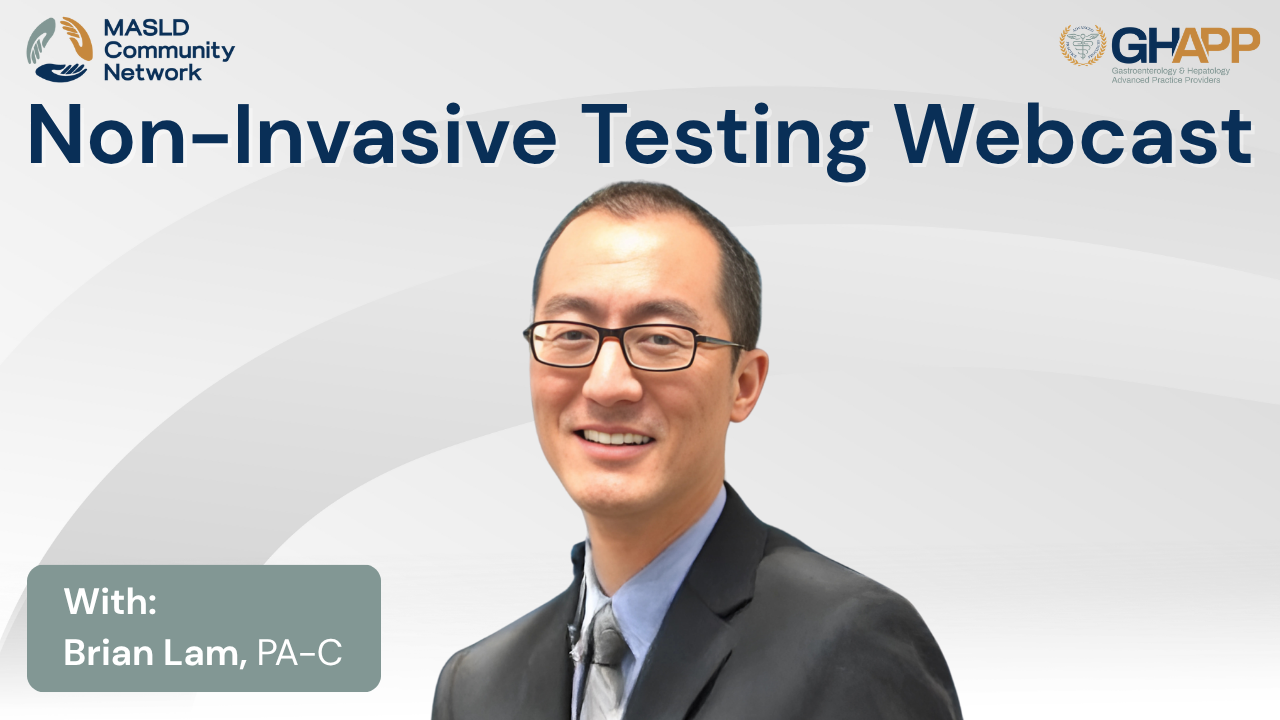
Webcast: Non-Invasive Testing With Brian Lam

Join Brian Lam, PA-C, Associate Medical Director of Research at Inova’s Liver and Obesity Research Program and Chair of the Global NASH/MASH Council’s PA Committee, for a masterclass on non-invasive testing (NITs) in the evaluation of Metabolic Dysfunction-Associated Steatotic Liver Disease (MASLD) and MASH, presented through the GHAPP MASLD/MASH Community Network and sponsored by Madrigal Pharmaceuticals. In this dynamic and case-based session, Brian outlines a practical, step-by-step approach to identifying patients at risk for advanced fibrosis, using tools like FIB-4, ELF, FibroScan (VCTE), and MR Elastography. He walks through the critical cutoffs, diagnostic performance, limitations, and how to interpret imaging and lab-based scores in real-world hepatology and primary care settings. You'll learn how to apply AGA and AASLD clinical algorithms, the importance of staging patients with diabetes and metabolic syndrome, and how to distinguish low-risk MASLD from at-risk MASH. Brian also shares best practices for TE reliability, quality control, and using NIT combinations like FAST, MAST, and MEFIB for accurate diagnosis. With clear visuals, expert insights, and actionable takeaways, this session is an essential update for APPs, GI, hepatology, and primary care providers managing fatty liver disease in 2025 and beyond.
Watch Now

Webcast: Lifestyle Management With Allysa Saggese

Join Allysa Saggese, NP, from Weill Cornell Medicine in New York City, for an insightful and practical discussion on lifestyle management for MASLD and MASH, presented through the GHAPP MASLD/MASH Community Network, sponsored by Madrigal Pharmaceuticals. In this case-based presentation, Allysa walks viewers through the non-pharmacologic strategies used to manage Metabolic Dysfunction-Associated Steatotic Liver Disease (MASLD), highlighting the role of nutrition, physical activity, and patient-centered counseling. Using a real-world example of a 65-year-old patient with obesity, diabetes, and steatosis, Allysa demonstrates how to assess fibrosis risk through non-invasive testing like FIB-4 and FibroScan, and explains how lifestyle modifications remain central to slowing disease progression—even in the era of advanced therapeutics. The session explores the importance of motivational interviewing, cultural dietary preferences, and how to structure effective, individualized conversations around reducing sugar intake, increasing movement at home, and achieving sustainable 5–10% weight loss to improve liver histology. Allysa also breaks down the metabolic interplay between central adiposity, insulin resistance, and liver inflammation, and shares counseling tips to build patient trust and long-term engagement. Whether you're a GI or hepatology provider, this session delivers real-world guidance to help empower patients to reverse early liver damage through everyday lifestyle changes.
Watch Now
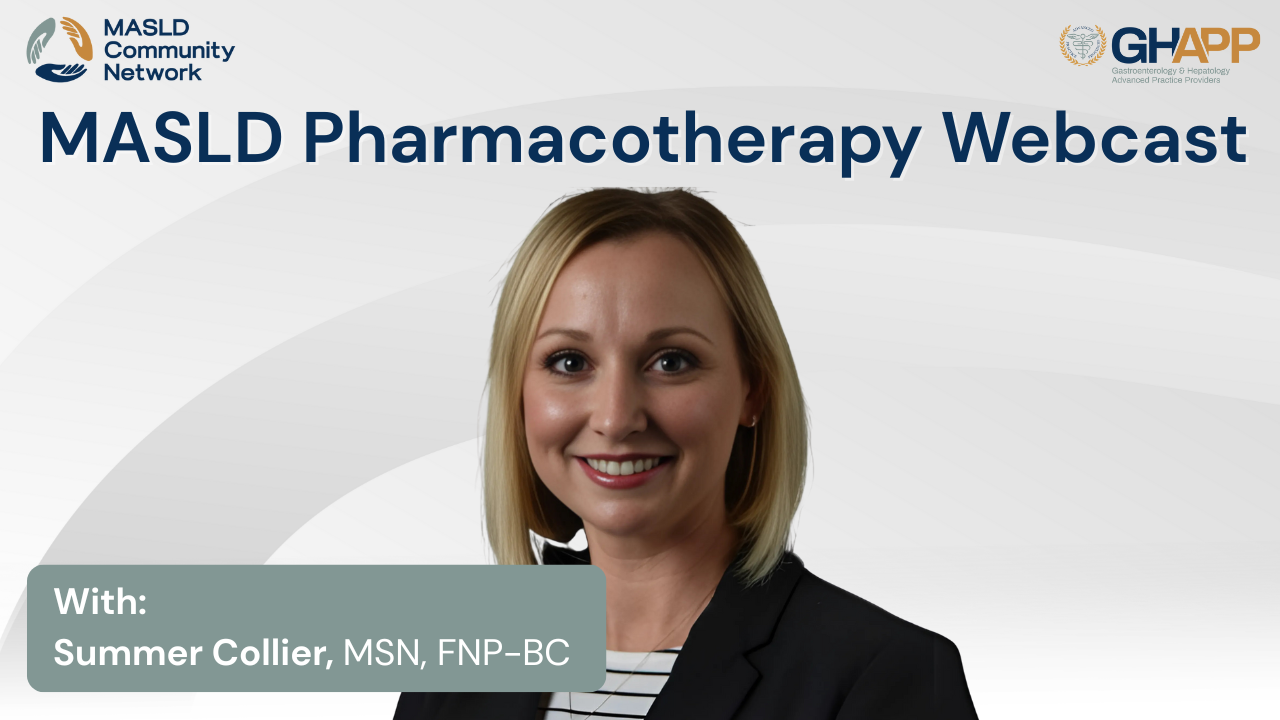
Webcast: MASLD Pharmacotherapy With Summer Collier

Join Summer Collier, FNP, from UC San Diego Health, for a comprehensive discussion on pharmacotherapy for Metabolic Dysfunction-Associated Steatotic Liver Disease (MASLD) and MASH, presented through the GHAPP MASLD/MASH Community Network and sponsored by Madrigal Pharmaceuticals. In this session, Summer outlines the foundational role of lifestyle modification in treating MASLD, including diet, exercise, and weight loss, while emphasizing the growing need for liver-directed therapies in patients with moderate to advanced fibrosis. She reviews the clinical use of GLP-1 receptor agonists such as semaglutide and tirzepatide, which aid in glycemic control and significant weight loss, and explores their application in hepatology—including key data showing MASH resolution and fibrosis improvement. The discussion also addresses older treatment options like vitamin E and pioglitazone, explaining their risks, limitations, and patient selection criteria. The highlight of the presentation is a detailed analysis of resmetirom (Rezdiffra)—the first FDA-approved therapy for non-cirrhotic NASH with F2–F3 fibrosis. Summer walks through the MAESTRO-NASH trial, covering the mechanism of THR-β activation, improvements in liver histology, safety data, and practical prescribing guidance, including non-invasive monitoring, statin dose considerations, and drug–drug interactions. The session concludes with expert insights on staging, treatment duration, insurance access, and the evolving future of MASLD therapy. A must-watch for hepatology, GI, and primary care providers seeking to implement the latest evidence-based approaches in managing fatty liver disease.
Watch Now
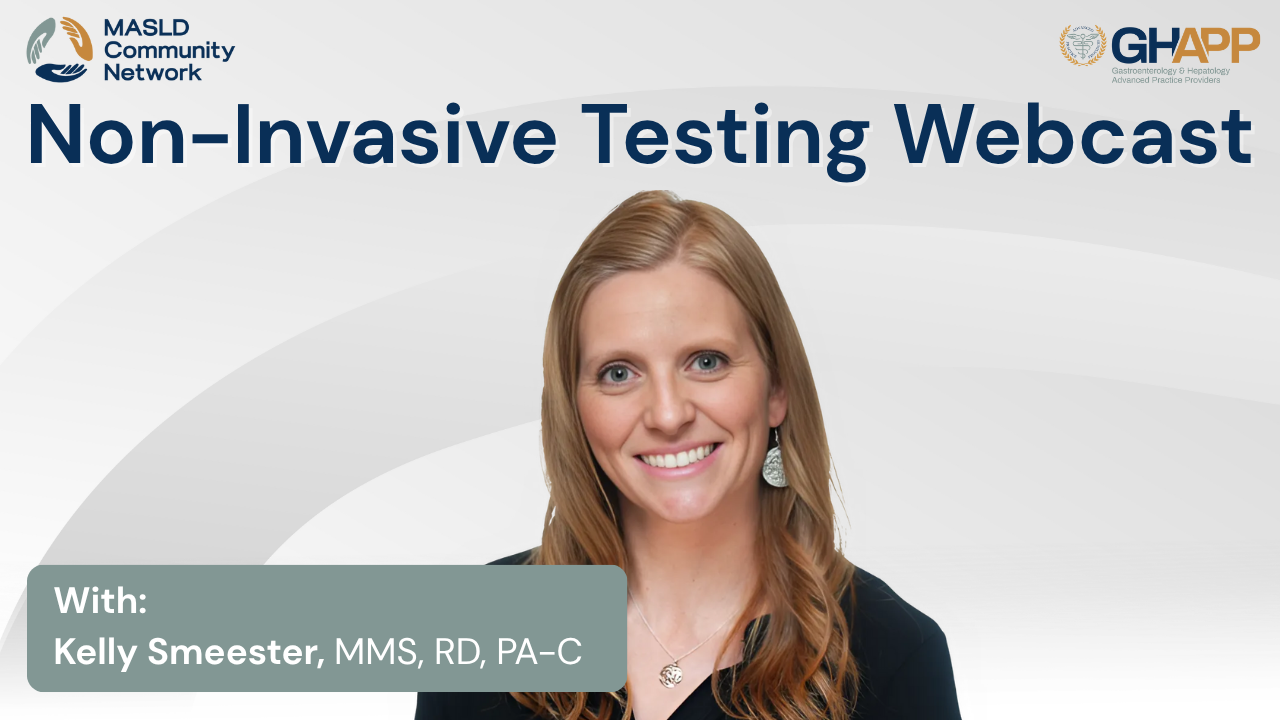
Webcast: Non-Invasive Testing With Kelly Smeester

Join Kelly Smeester, MMS, RD, PA-C, from South Denver Gastroenterology, for an in-depth discussion on the latest tools and strategies in non-invasive liver disease assessment, presented through the GHAPP MASLD Community Network. This evidence-based session walks viewers through a case study of a patient with Metabolic Dysfunction-Associated Steatotic Liver Disease (MASLD) and explores the full range of non-invasive testing modalities used to evaluate liver fat, stiffness, and fibrosis risk. Kelly breaks down the utility of key tests including FIB-4, ELF Score, FibroScan (VCTE), and MR Elastography, and compares their accuracy, accessibility, limitations, and clinical value. Learn how to interpret biomarkers such as CAP (Controlled Attenuation Parameter) and kPa (Kilopascals), how to navigate indeterminate FIB-4 results, and when to escalate to more advanced imaging like MRE. The session also provides insights into combined scoring models (FAST, MAST, MEFIB), real-world use cases, and how comorbidities and patient-specific factors (BMI, ALT, bilirubin, ascites) can impact test reliability. Whether you're managing early-stage fatty liver disease or advanced fibrosis, this session provides essential knowledge to guide accurate diagnosis, risk stratification, and long-term monitoring without a liver biopsy.
Watch Now
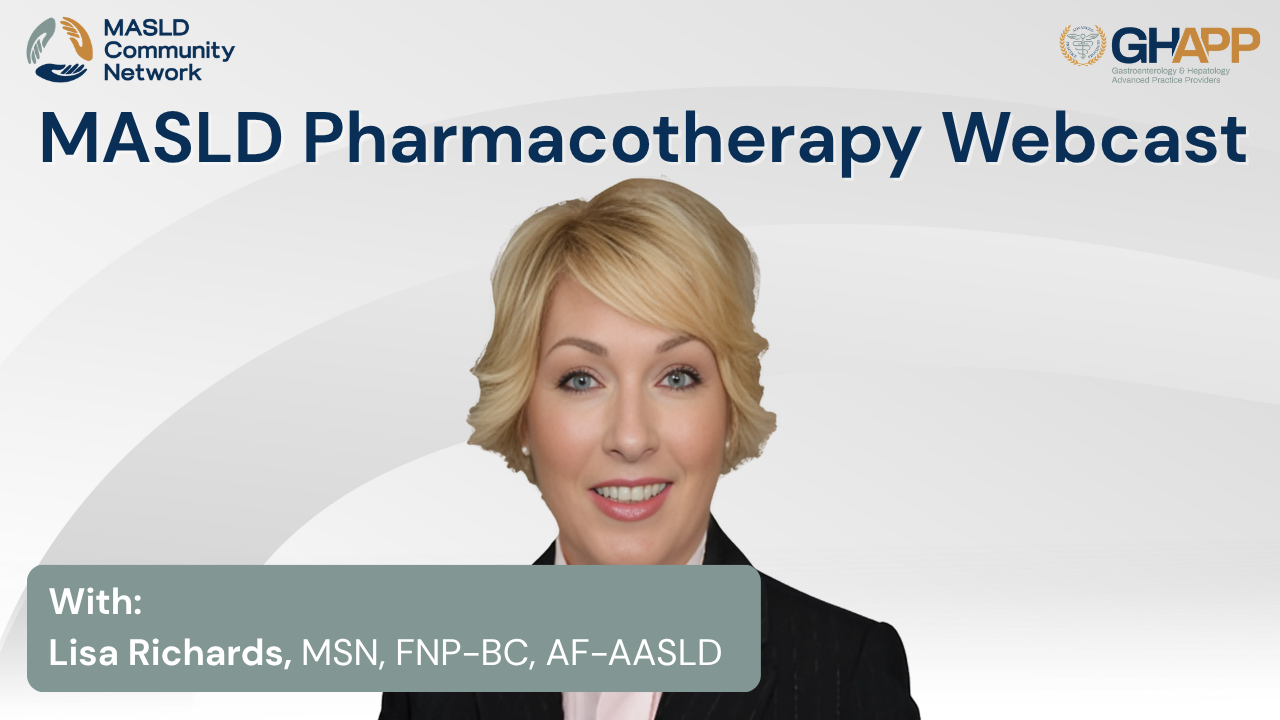
Webcast: MASLD Pharmacotherapy With Lisa Richards

Join Lisa Richards from UC San Diego Health, for a comprehensive overview of MASLD Pharmacotherapy as part of the GHAPP MASLD Community Network, proudly sponsored by Madrigal Pharmaceuticals. This educational session explores the evolving treatment landscape for Metabolic Dysfunction-Associated Steatotic Liver Disease (MASLD) and MASH (Metabolic Dysfunction-Associated Steatohepatitis), including the shift from exclusive reliance on lifestyle interventions and comorbidity optimization to the introduction of targeted pharmacologic therapies. Lisa reviews the role of GLP-1 receptor agonists, such as semaglutide, and the ESSENCE trial results demonstrating significant improvements in MASH and liver fibrosis. She also outlines the clinical considerations and limitations of legacy treatments like vitamin E and pioglitazone, based on data from the PIVENS trial. The highlight of the session is a detailed exploration of resmetirom (Rezdiffra)—the first FDA-approved therapy for non-cirrhotic NASH with moderate to advanced fibrosis (F2–F3). Lisa reviews key findings from the MAESTRO-NASH trial, including improvements in fibrosis and MASH resolution, and discusses real-world implementation strategies, including non-invasive monitoring tools (FibroScan, ELF, MRI-PDFF), statin dose adjustments, and managing drug–drug interactions. This session equips hepatology and GI providers with the tools to personalize MASH care, navigate insurance and safety considerations, and deliver cutting-edge, evidence-based treatment to patients with MASLD.
Watch Now
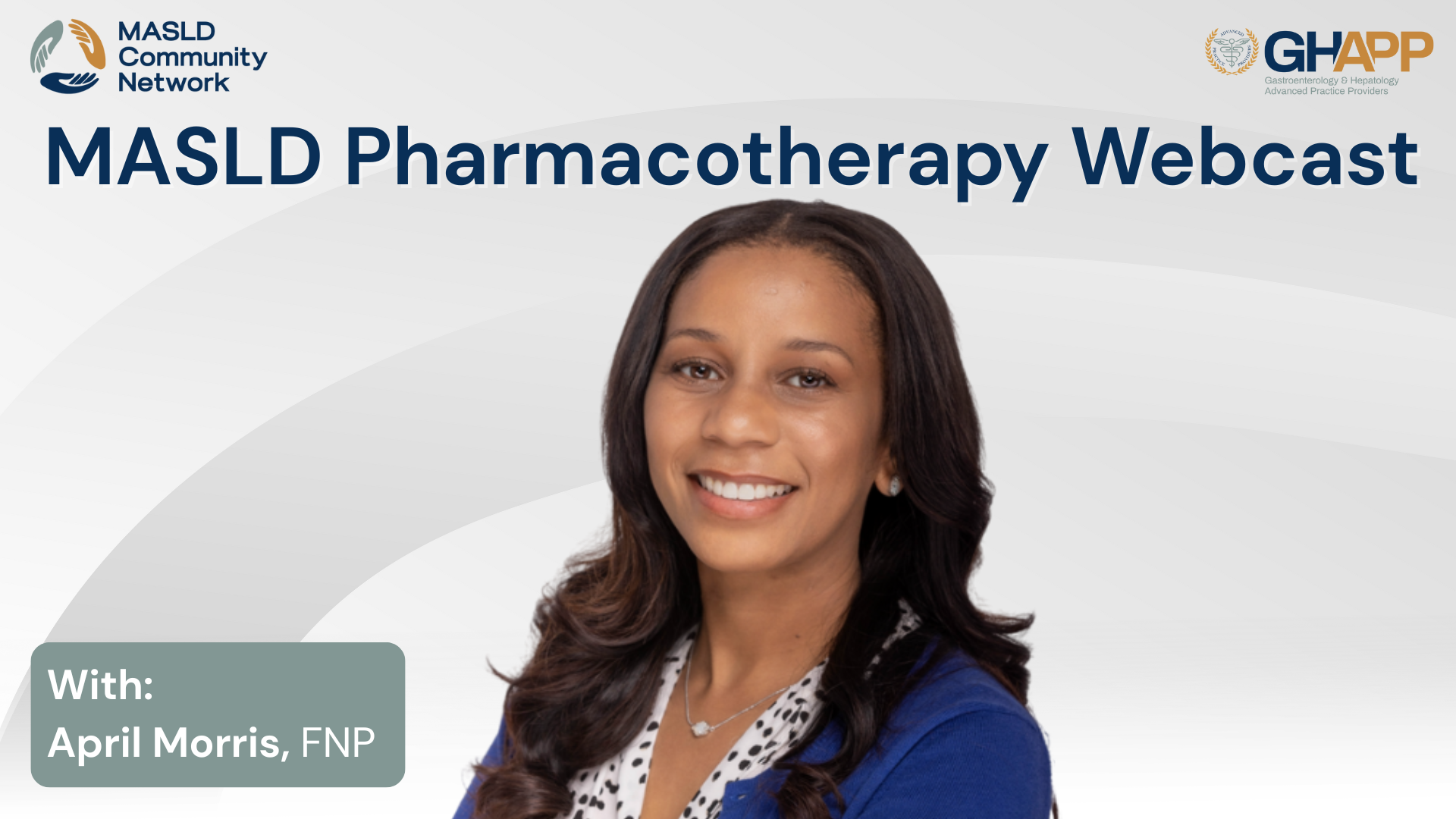
Webcast: MASLD Pharmacotherapy With April Morris

Join April Morris, NP, a hepatology and endocrinology nurse practitioner, for a comprehensive review of MASLD pharmacotherapy as part of the GHAPP MASLD Community Network. This expert-led session outlines a three-pronged strategy for managing Metabolic Dysfunction-Associated Steatotic Liver Disease (MASLD) and MASH, focusing on obesity reduction, cardiometabolic risk control, and liver-directed treatment. April walks through first-line lifestyle approaches, highlights key pharmacologic agents like GLP-1 receptor agonists, and explains their mechanisms and clinical relevance—including the groundbreaking data from the semaglutide trials showing resolution of MASH and improvement in liver fibrosis. The session also reviews the role and limitations of vitamin E and pioglitazone, emphasizing their risks in patients with diabetes or cardiovascular disease. The spotlight then shifts to resmetirom (Rezdiffra), a thyroid hormone receptor beta agonist FDA-approved for adults with non-cirrhotic NASH and moderate-to-advanced fibrosis (F2–F3). April explains the MAESTRO-NASH trial endpoints, clinical efficacy, common side effects, and appropriate patient selection. Learn how resmetirom improves fatty acid oxidation, reduces hepatic fat and fibrosis, and the key drug–drug interactions and statin dose considerations to manage during treatment. The discussion concludes with practical tips for monitoring, non-invasive staging (FibroScan, ELF, MRI-PDFF), and the evolving guidance on treatment duration, safety labs, and insurance barriers. This session is essential for clinicians navigating the growing landscape of therapeutic options in MASLD/MASH care.
Watch Now
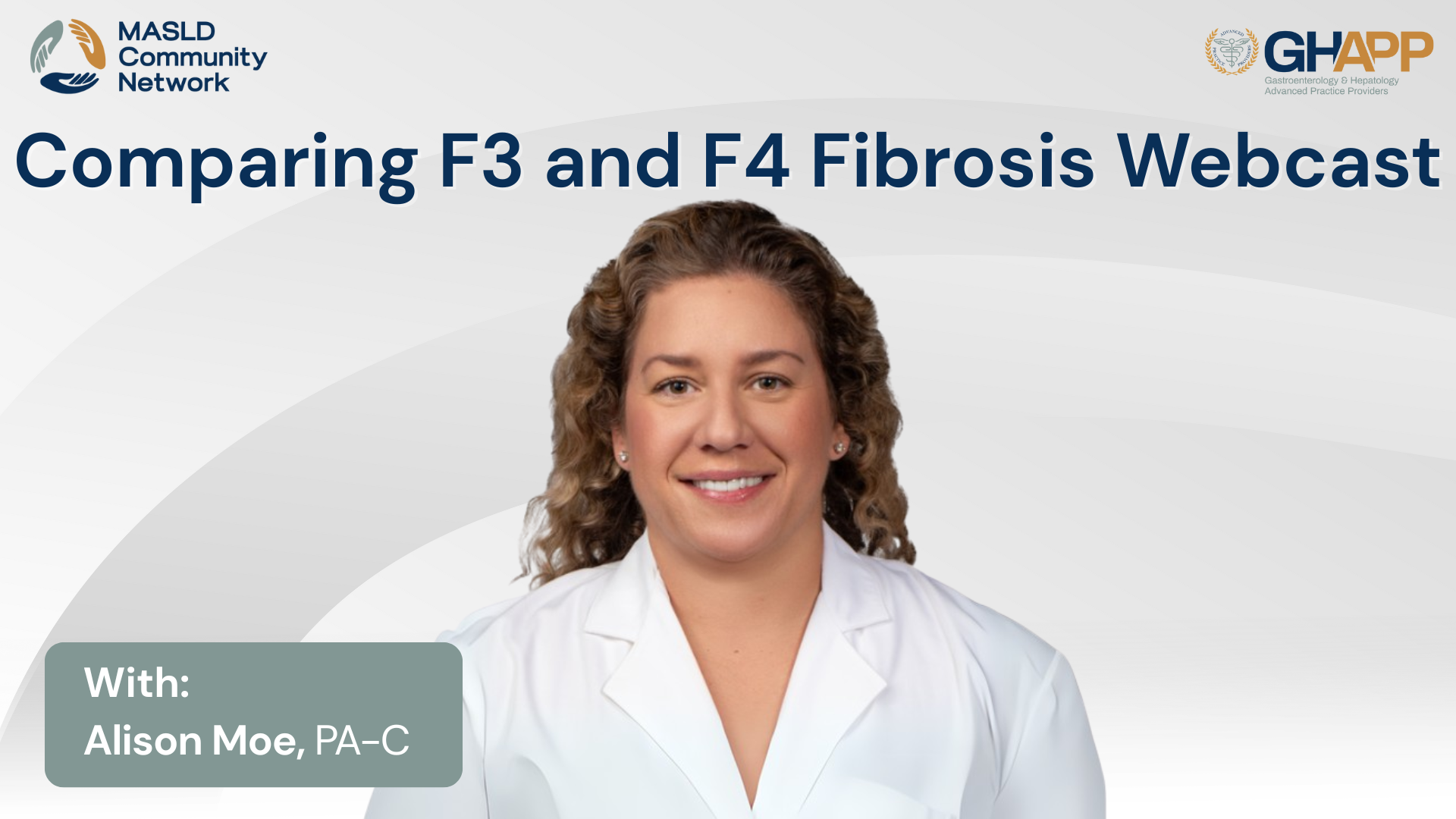
Webcast: Comparing F3 and F4 Fibrosis With Alison Moe

Join Alison Moe, PA-C, from Atlanta Gastroenterology Associates, for a case-based, practical exploration of how to identify, risk stratify, and manage patients with Metabolic Dysfunction-Associated Steatotic Liver Disease (MASLD) and MASH (Metabolic Dysfunction-Associated Steatohepatitis). In this engaging session from the GHAPP MASLD Community Network, Alison walks through the clinical implications of differentiating F3 fibrosis from F4 cirrhosis, highlighting the importance of non-invasive testing tools such as FIB-4, FibroScan (KPA scores), CAP scores, and ELF tests in determining appropriate treatment pathways. Learn how platelet counts, ALT/AST levels, and liver stiffness scores play a critical role in determining whether a patient qualifies for medical therapy like resmetirom (Rezdiffra), or instead requires HCC surveillance and screening for portal hypertension. The session also reviews how to integrate GLP-1 receptor agonists for patients with concurrent type 2 diabetes and obesity, and why diet and lifestyle modifications remain foundational in all stages of care. Allison emphasizes FDA treatment criteria, shares decision-making strategies around ambiguous fibrosis scoring, and explains how to use real-world diagnostic markers to drive individualized liver care. This is an essential update for GI, hepatology, and primary care providers managing the growing population of MASLD/MASH patients.
Watch Now
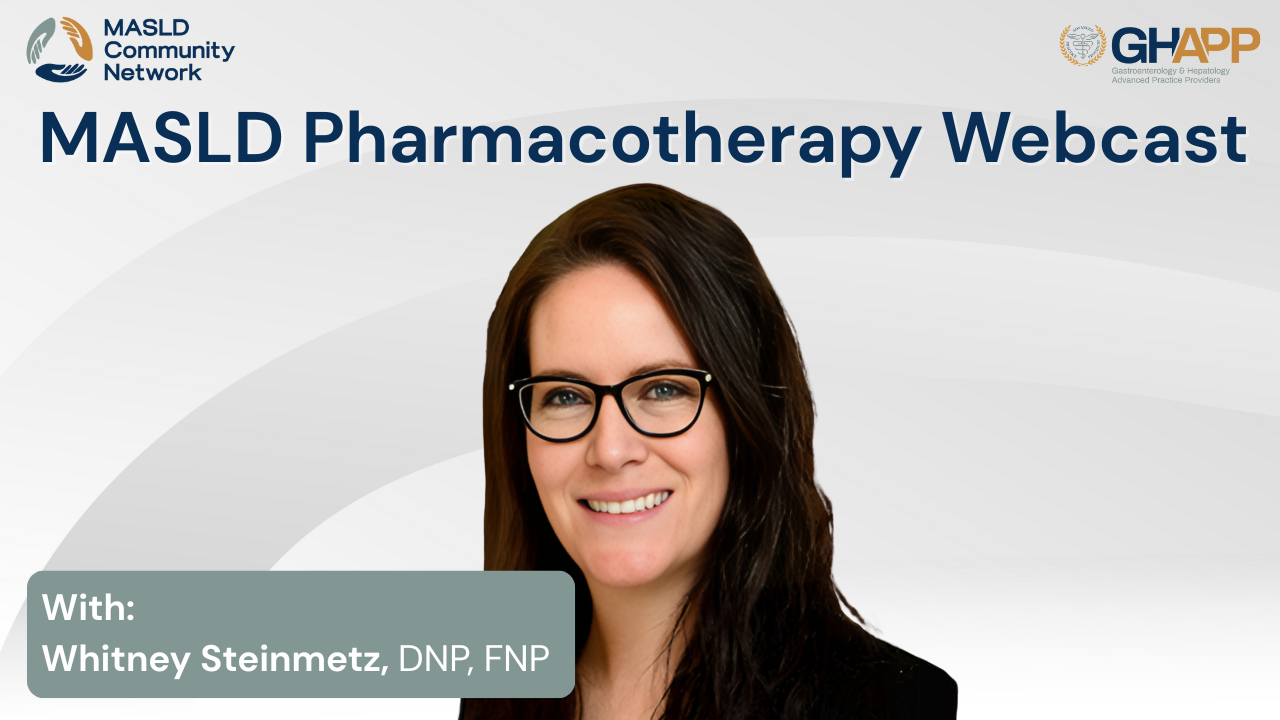
Webcast: MASLD Pharmacotherapy With Whitney Steinmetz

Join Whitney Steinmetz, NP, from Presbyterian Medical Group in Albuquerque, NM, for an in-depth review of pharmacotherapy in MASLD and MASH, presented as part of the GHAPP MASLD Community Network. In this comprehensive CME-eligible session, Whitney explores the multimodal treatment approach for patients with Metabolic Dysfunction-Associated Steatotic Liver Disease (MASLD) and Metabolic Dysfunction-Associated Steatohepatitis (MASH), focusing on three therapeutic pillars: obesity management, cardiometabolic risk reduction, and liver-directed therapies. The discussion covers mechanisms, clinical trial data, and practical considerations for key treatment options, including GLP-1 receptor agonists, vitamin E, pioglitazone, and resmetirom (Rezdiffra). Whitney highlights findings from landmark studies such as ESSENCE, PIVENS, and MAESTRO-NASH, and explains how thyroid hormone receptor beta activation through resmetirom reduces hepatic fat, inflammation, and fibrosis in F2-F3 patients. She also offers guidance on non-invasive monitoring (FibroScan, MRE, ALT), drug–drug interactions, and how evolving guidelines from AASLD and ESLD shape clinical decision-making. Whether you're treating early-stage fatty liver disease or managing moderate fibrosis in primary care or hepatology, this video provides evidence-based insights to optimize long-term outcomes through targeted pharmacologic strategies and patient-centered care.
Watch Now
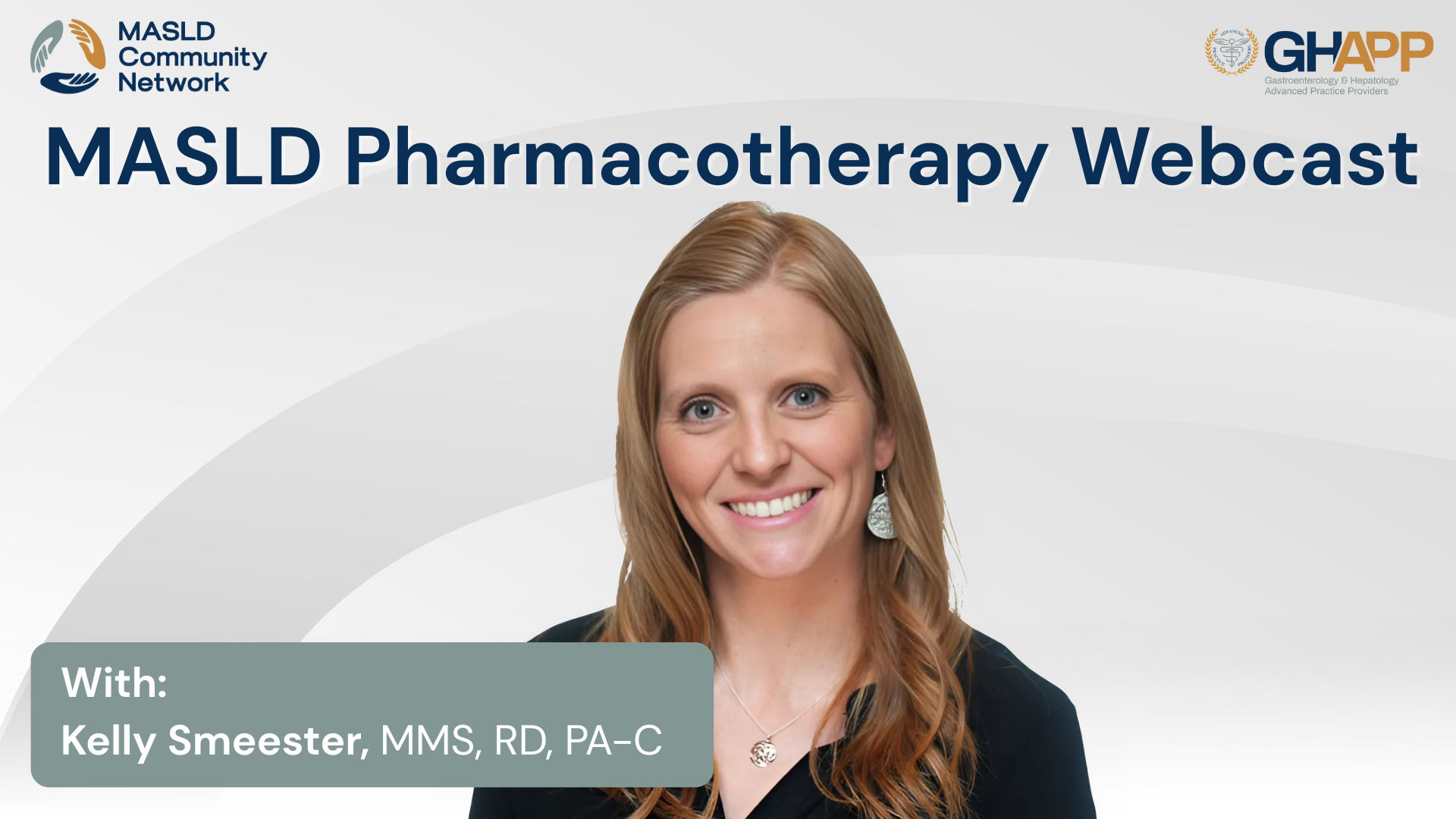
Webcast: MASLD Pharmacotherapy With Kelly Smeester

Join Kelly Smeester, MMS, RD, PA-C, from South Denver Gastroenterology for an in-depth pharmacologic review of current and emerging treatment options for Metabolic Dysfunction-Associated Steatotic Liver Disease (MASLD) and MASH (Metabolic Dysfunction-Associated Steatohepatitis), as part of the GHAPP MASLD Community Network. This session outlines a comprehensive treatment strategy focused on three key goals: promoting weight loss, reducing cardiovascular risk, and targeting liver-specific interventions. Kelly highlights lifestyle and pharmacologic interventions including GLP-1 receptor agonists, GIP/GLP-1 dual agonists, and bariatric surgery, while exploring evidence-based guidance for treating comorbidities like type 2 diabetes, hypertension, and dyslipidemia. She dives into the latest data on vitamin E, pioglitazone, and the newly FDA-approved Resmetirom (Rezdiffra)—a thyroid hormone receptor beta agonist indicated for adults with non-cirrhotic NASH and F2–F3 fibrosis. Learn about the results from pivotal clinical trials like ESSENCE, PIVENS, and MAESTRO-NASH, the importance of NAFLD activity scoring, as well as dosing strategies, adverse effects, and drug interactions to consider when using Resmetirom. The session also explores practical monitoring approaches including FibroScan, MRI-PDFF, and ELF scores, with an outlook on evolving treatment duration and insurance coverage considerations. Whether you're a hepatology provider or part of a multidisciplinary care team, this presentation offers critical insights to optimize MASH treatment pathways today and in the future.
Watch Now
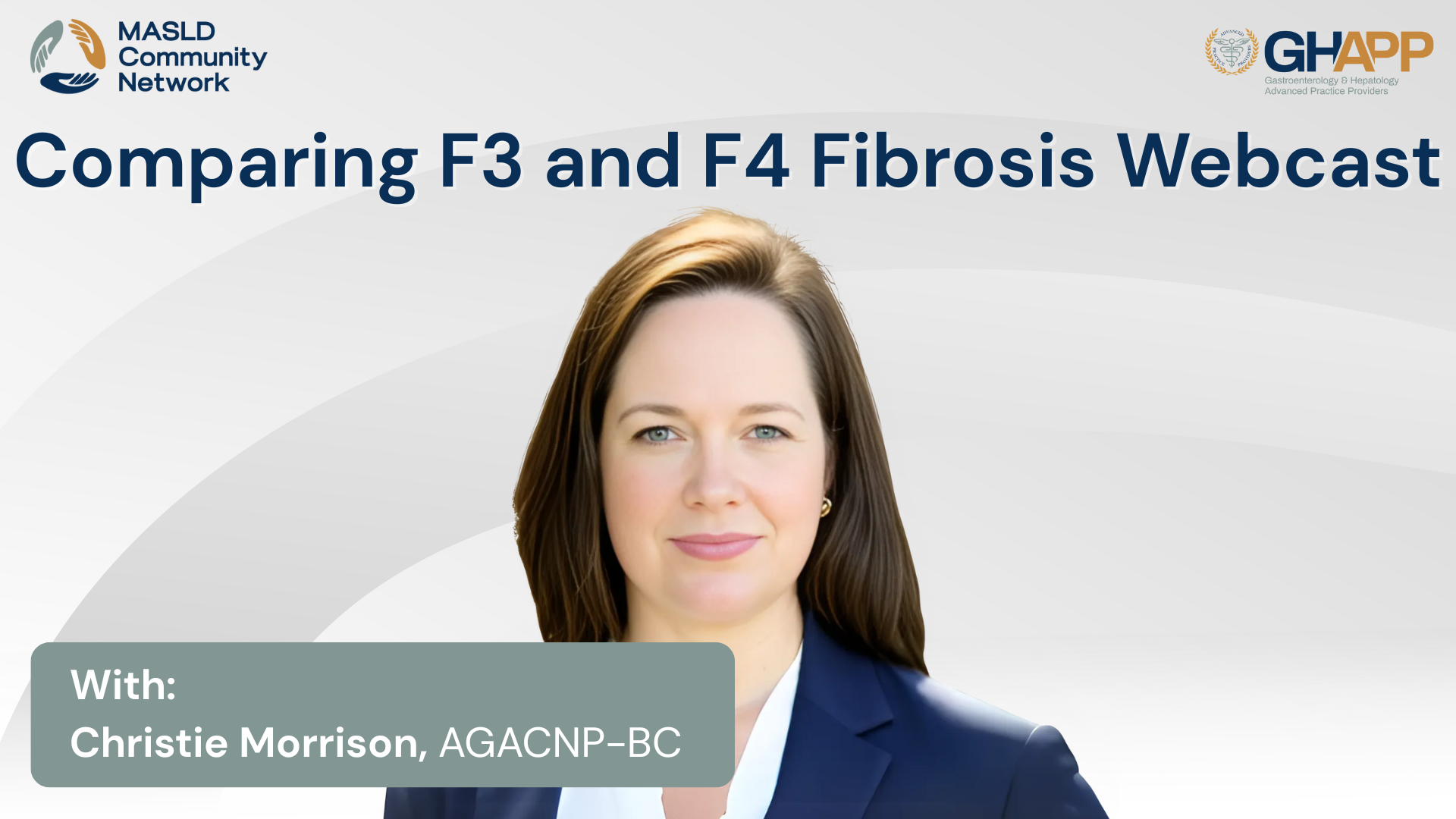
Webcast: Comparing F3 and F4 Fibrosis With Christie Morrison

In this expert-led session, Christie Morrison, NP, shares a comprehensive case-based discussion on comparing F3 vs F4 fibrosis in patients with MASH (Metabolic Dysfunction-Associated Steatohepatitis). Through the lens of two real-world clinical scenarios, Christie breaks down the nuanced differences in non-invasive diagnostic tools such as FIB-4, ELF scores, and FibroScan KPA readings, while guiding providers on how to stratify risk, monitor disease progression, and tailor interventions appropriately. Viewers will learn how elevated liver enzymes, declining platelet counts, and steatosis scores influence decision-making in patients with metabolic comorbidities like type 2 diabetes, hypertension, and hyperlipidemia. The session emphasizes evidence-based lifestyle and pharmacologic strategies, including the potential role of resmetirom (Rezdiffra) in F3 fibrosis and why it’s contraindicated in advanced cirrhosis. Learn when to initiate HCC surveillance, how to interpret borderline labs, and the importance of integrating GLP-1s, dietitian referrals, and cardiometabolic care to slow or reverse fibrosis progression. Whether you’re managing intermediate or advanced fibrosis, this educational session provides invaluable insights into optimal MASH care pathways and staging techniques.
Watch Now
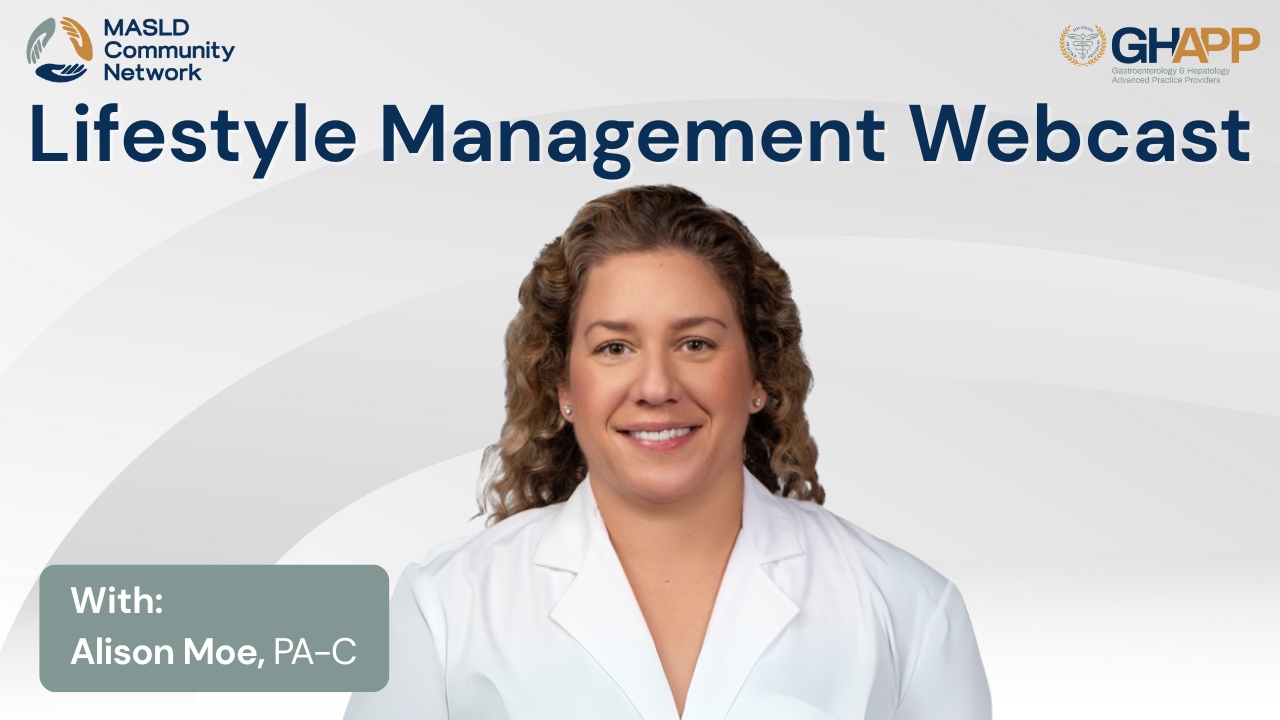
Webcast: Lifestyle Management With Alison Moe

Join Alison Moe, PA-C, from Atlanta Gastroenterology Associates, as she walks through a real-world clinical case highlighting the challenges and strategies in managing Metabolic Dysfunction-Associated Steatotic Liver Disease (MASLD) and Metabolic Dysfunction-Associated Steatohepatitis (MASH). In this engaging and educational session, Alison shares the case of a 65-year-old Hispanic male with obesity, type 2 diabetes, and fatty liver disease—diving deep into non-invasive diagnostic tools, including FIB-4 scoring and FibroScan, and how these help guide risk stratification for liver fibrosis. The discussion emphasizes the crucial role of dietary counseling, culturally sensitive lifestyle modifications, and exercise guidance to slow or even reverse disease progression. Learn how to set achievable goals for patients and explore effective methods for improving glycemic control, BMI, and overall liver health. Alison also touches on evidence-based interventions such as the Mediterranean diet, resistance training, and intermittent fasting, supported by AASLD and European liver guidelines. Whether you're a clinician treating MASLD or simply interested in the evolving approach to fatty liver disease, this case study offers practical takeaways and guidance to optimize patient outcomes.
Watch Now

Webcast: MASLD Pharmacotherapy With Sherona Bau

In this dynamic and highly informative session, Sherona Bau, NP, presents a comprehensive overview of pharmacotherapy in MASLD and MASH, breaking down current treatment strategies and emerging therapies for patients with metabolic dysfunction-associated steatotic liver disease. This presentation, part of the MASLD/MASH Community Network, begins by contextualizing the recent nomenclature shift from NAFLD/NASH to MASLD/MASH and its clinical implications. Sherona explores lifestyle intervention targets, including Mediterranean diet, weight loss goals based on fibrosis stage, and the role of GLP-1 and GIP receptor agonists in improving liver health. She highlights the ESSENCE trial results for semaglutide, discusses the only FDA-approved therapy to date—resmetirom (Rezdiffra)—and explains its mechanism of action via thyroid hormone receptor beta activation. The session dives deep into efficacy data from the MAESTRO-NASH trial, side effect profiles, drug–drug interactions, and monitoring recommendations. She also previews a pipeline of promising agents in phase 2 and 3 trials—including tirzepatide (GLP-1/GIP), cotadutide (GLP-1/GR), pemvidutide (GLP-1/GIP), and retatrutide (GLP-1/GIP/GR)—offering insight into what’s next in the evolving treatment landscape. This is a must-watch for hepatology and endocrinology clinicians focused on the future of fatty liver management.
Watch Now
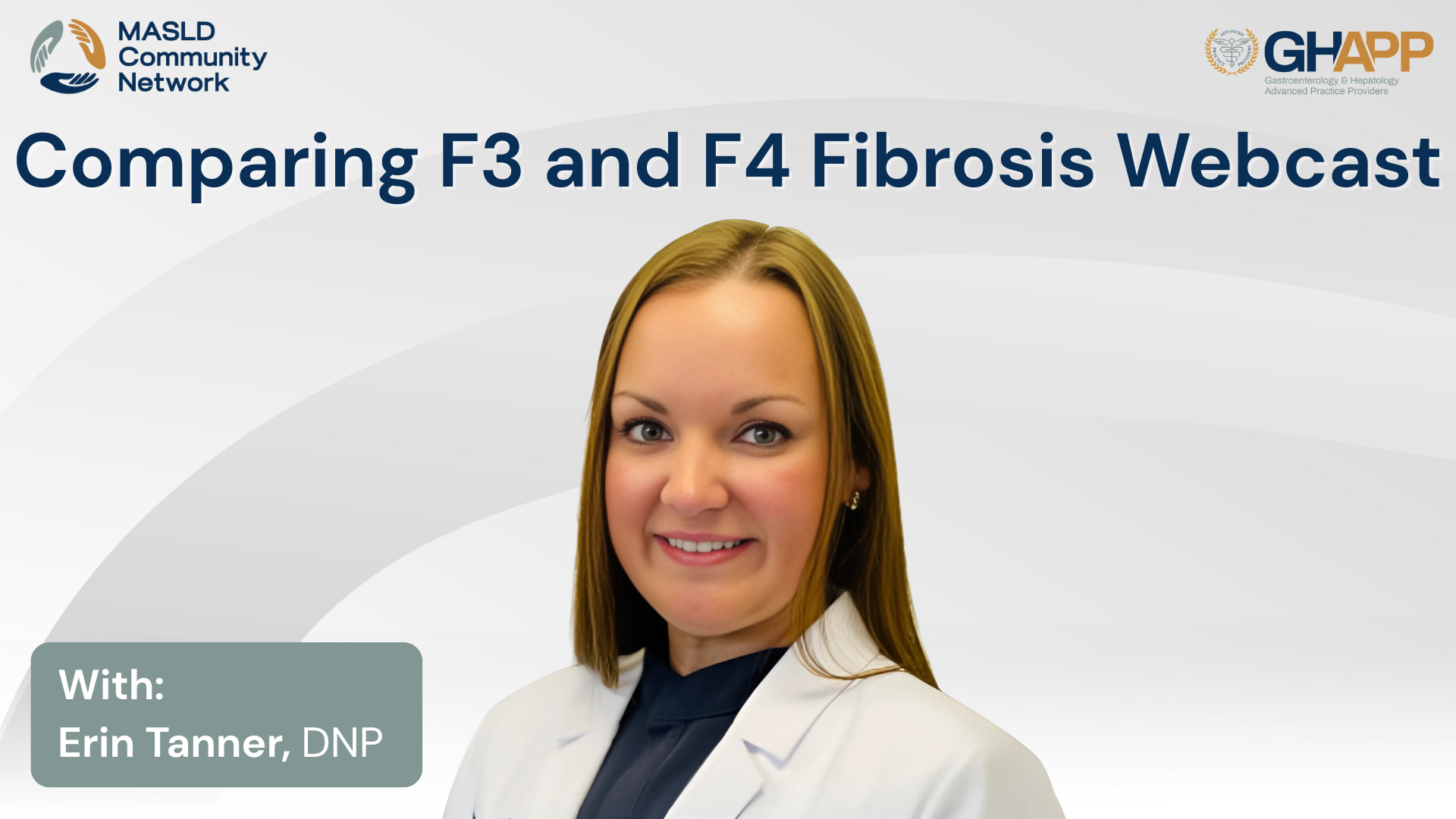
Webcast: Comparing F3 and F4 Fibrosis With Erin Tanner

Join Erin Tanner, NP from Gastro Health in Birmingham, Alabama, for a practical and in-depth exploration of how to differentiate and manage patients with F3 versus F4 fibrosis in the setting of MASLD (Metabolic Dysfunction-Associated Steatotic Liver Disease) and MASH. This session, part of the MASLD & MASH Community Network, features two detailed case studies—Sam A and Sam B—who share identical comorbidities but diverge in fibrosis stage, illustrating how non-invasive testing (NITs) can guide diagnosis and treatment. Erin walks through the clinical application of tools like FIB-4, FibroScan (VCTE), ELF test, and CAP score, emphasizing the importance of interpreting lab and imaging results in context. The discussion covers key decision points, including when to initiate pharmacologic therapy like resmetirom (Rezdiffra), how to determine eligibility for HCC surveillance, and when to consider liver biopsy. She also addresses common challenges in community GI settings, such as incidental fatty liver findings, elevated ferritin levels, and the limitations of FIB-4 in older or diabetic patients. Whether you're in hepatology, gastroenterology, or primary care, this talk offers actionable insights on fibrosis staging, lifestyle counseling, and long-term monitoring in patients with MASLD and MASH.
Watch Now
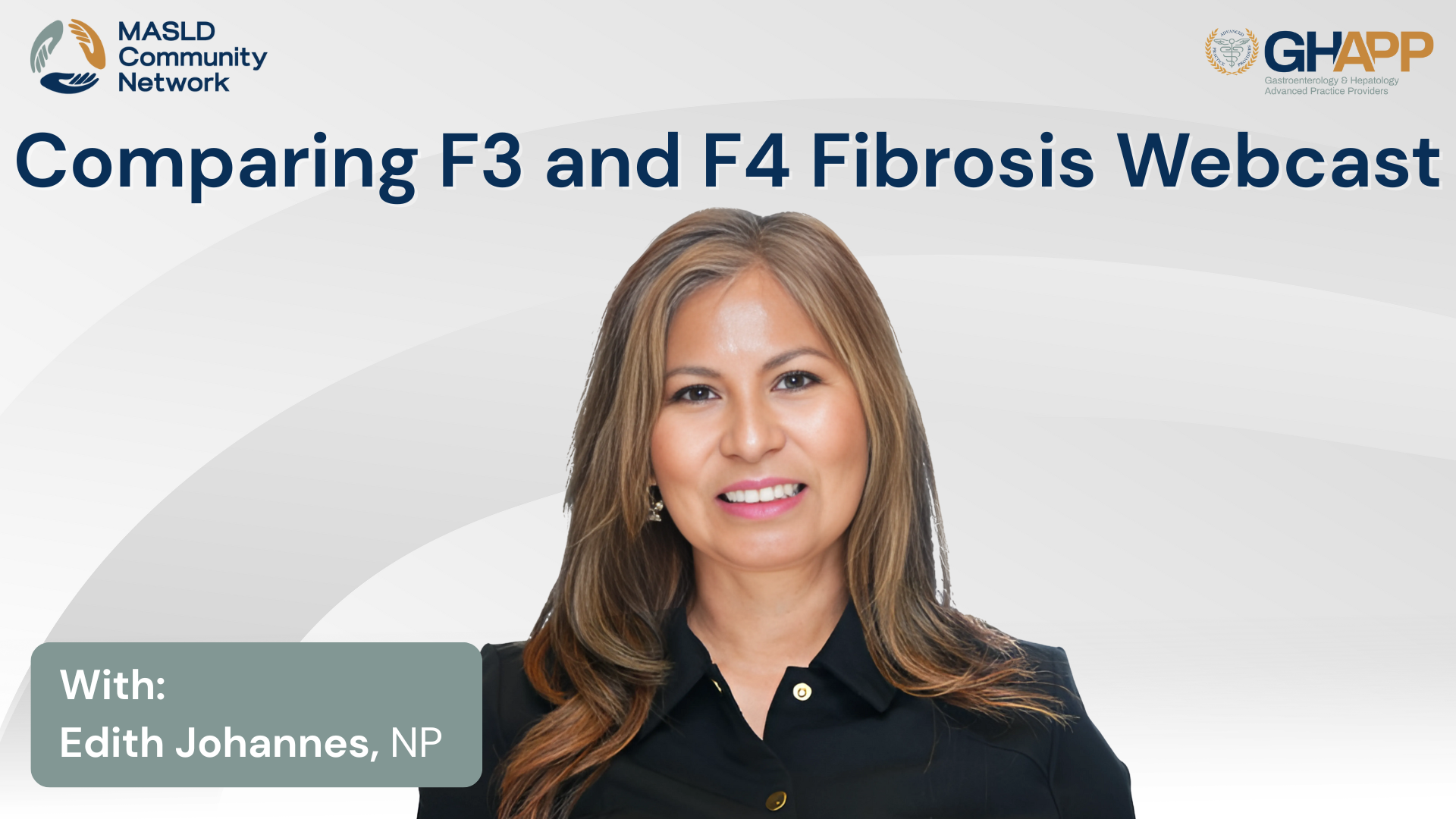
Webcast: Comparing F3 and F4 Fibrosis With Edith Johannes

Join Edith Johannes, NP from UCLA Health, for a comprehensive and approachable introduction to MASLD (Metabolic Dysfunction-Associated Steatotic Liver Disease)—formerly known as NAFLD—and how to accurately diagnose it. Designed for primary care providers and early learners in hepatology, this session outlines the fundamental criteria for diagnosing MASLD and MASH, the importance of ruling out alternate causes of hepatic steatosis, and the key role of cardio-metabolic risk factors. Edith discusses how to apply non-invasive testing tools such as the FIB-4 score, ELF test, and elastography to determine fibrosis stage, along with guidance on when to consider liver biopsy and refer to hepatology. The presentation also explores the overlap between MASLD and alcohol-related liver disease, addresses the impact of genetic risk factors like PNPLA3 (particularly in Hispanic populations), and reinforces the urgent need for early detection to prevent cirrhosis and liver cancer. With clinical pearls and case-based examples, this session helps clinicians feel confident in evaluating patients for MASLD and navigating next steps for care.
Watch Now

Webcast: Non-Invasive Testing With April Morris

In this educational presentation, April Morris, NP—an experienced provider in both liver disease and endocrinology—guides viewers through the evolving landscape of non-invasive testing (NITs) for diagnosing and managing patients with MASLD (Metabolic Dysfunction-Associated Steatotic Liver Disease) and MASH. Using the case of a 65-year-old male with metabolic co-morbidities and suspected liver disease, Morris reviews how to effectively apply tools like the FIB-4 score, ELF test, and FibroScan (VCTE) to assess fibrosis risk and stratify patients. She compares imaging modalities including transient elastography, MR elastography (MRE), and shear wave elastography, offering practical considerations such as patient eligibility, test accuracy, and insurance barriers. The discussion emphasizes the importance of interpreting NITs within clinical context—highlighting how to determine risk, guide patient counseling, and establish a follow-up plan for low-risk patients. This session also reinforces the role of primary care in longitudinal liver health management and directs providers to resources available through the GHAPP MASLD & MASH Community Network.
Watch Now

Webcast: Lifestyle Management With Whitney Steinmetz

In this case-based clinical discussion, Whitney Steinmetz, FNP from Presbyterian Medical Group in Albuquerque, New Mexico, offers an in-depth review of lifestyle management strategies for patients with MASLD and MASH. Using the case of a 65-year-old male with persistently elevated ALT and metabolic syndrome, she highlights the importance of individualized, culturally competent counseling around nutrition, exercise, and behavioral change. Steinmetz outlines how tools like the FIB-4 score and FibroScan can help guide management and determine fibrosis risk, while emphasizing the critical role gastroenterology providers must play in addressing obesity, insulin resistance, and dietary habits. From the utility of motivational interviewing and realistic meal planning to the integration of caloric restriction and personalized exercise, this presentation equips clinicians with practical tools to support sustainable behavior change in patients with metabolic liver disease. Genetic factors, social determinants of health, and patient empowerment are all addressed, offering a holistic perspective on disease progression and prevention.
Watch Now
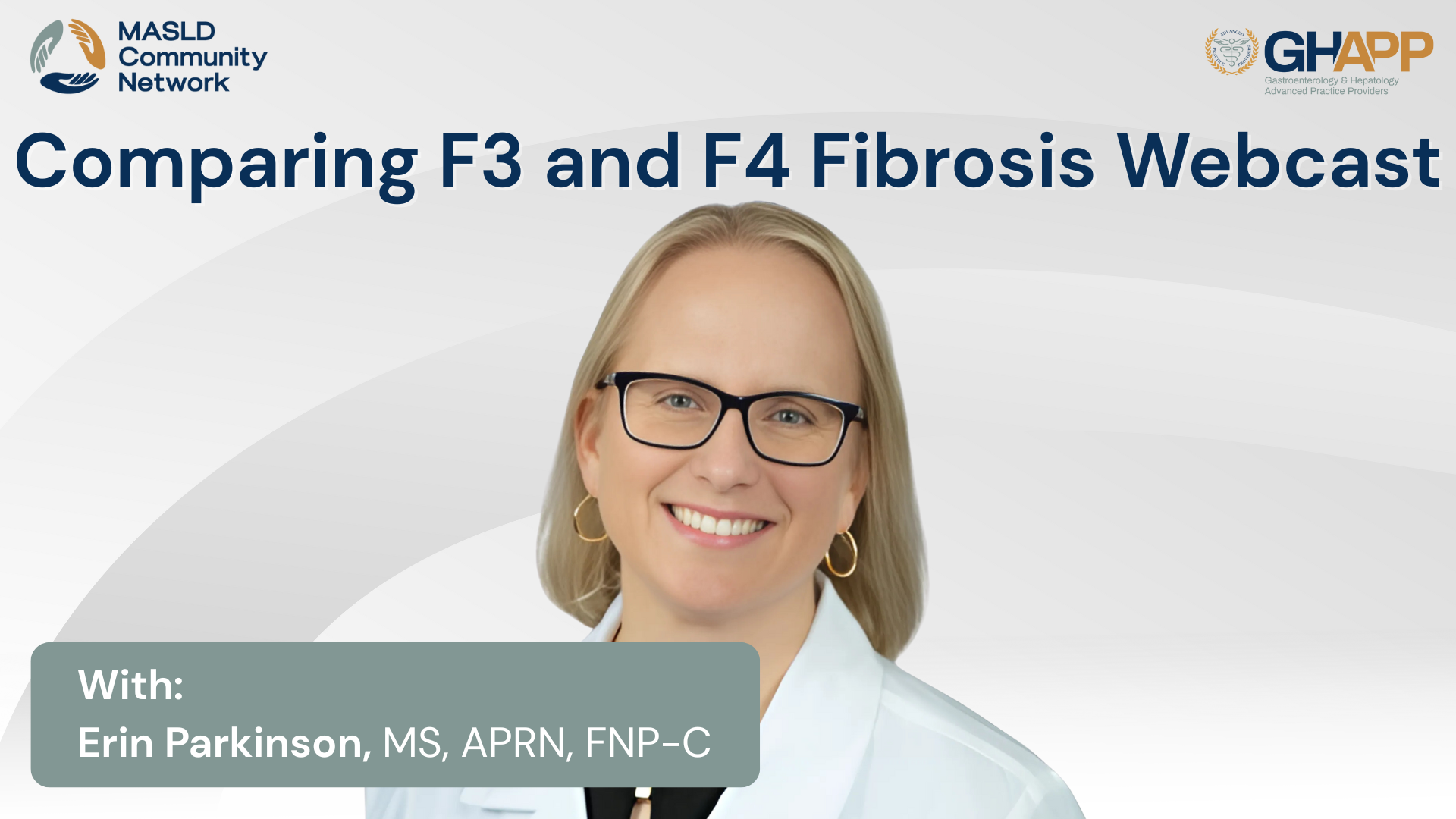
Webcast: Comparing F3 and F4 Fibrosis With Erin Parkinson

In this in-depth clinical discussion, Erin Parkinson, NP from the Tampa General Medical Group Transplant Institute, walks through the nuanced process of differentiating stage 3 and stage 4 fibrosis in patients with MASLD (Metabolic Dysfunction-Associated Steatotic Liver Disease). Using two illustrative case studies, she explores key clinical signs, lab values, and non-invasive staging tools such as FibroScan, FIB-4, ELF score, and MR elastography. Parkinson discusses the importance of early identification of advanced fibrosis, the reversibility of stage 3 disease, and the implications of a diagnosis of cirrhosis. Erin outlines evidence-based treatment pathways including lifestyle interventions, use of GLP-1 receptor agonists, and initiation of resmetirom (Rezdiffra) for stage 2–3 fibrosis. For cirrhotic patients, the focus shifts to HCC surveillance, screening for clinically significant portal hypertension, and consideration of non-selective beta blockers like carvedilol. This video offers practical insights for hepatology providers navigating the evolving MASLD landscape and highlights how early intervention and accurate staging can impact long-term outcomes.
Watch Now
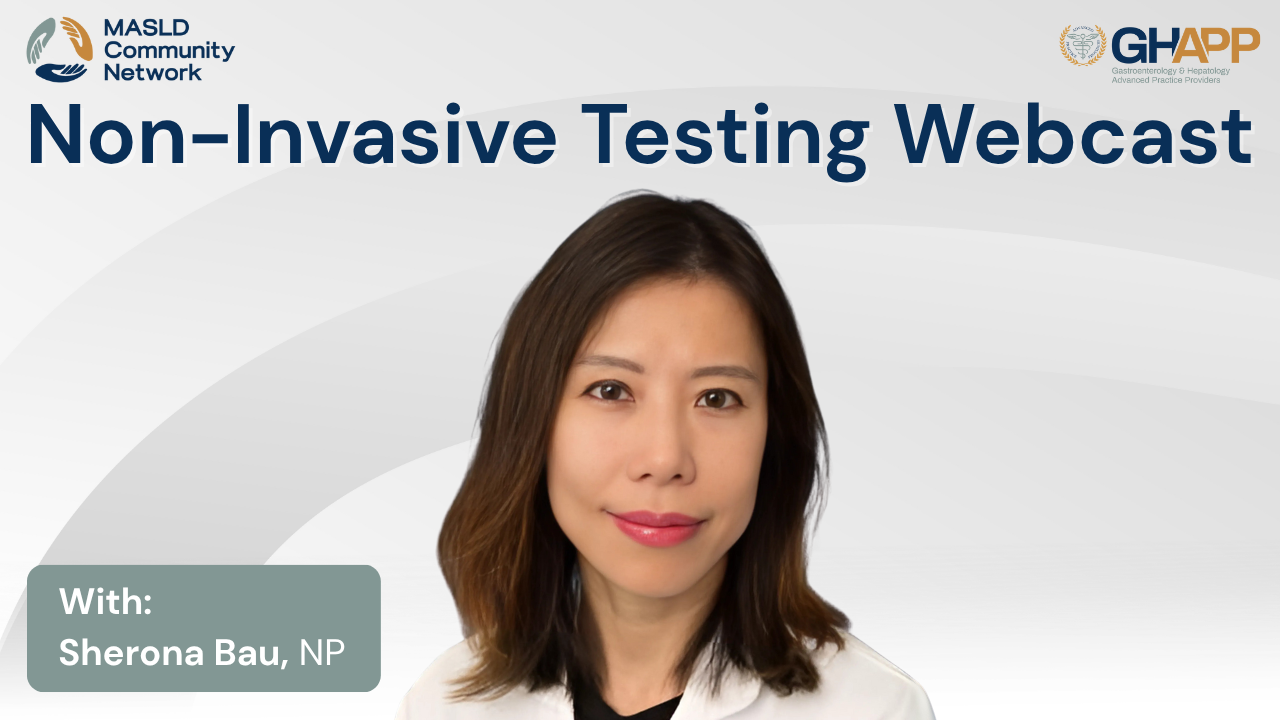
Webcast: Non-Invasive Testing With Sherona Bau

In this engaging and highly informative GHAPP MASLD Community Network session, Sherona Bau, NP, walks attendees through a practical overview of non-invasive testing (NIT) for evaluating liver health in patients with MASLD (Metabolic dysfunction-associated steatotic liver disease) and MASH (Metabolic dysfunction-associated steatohepatitis). Drawing on real-world clinical experience, Sherona explains why non-invasive testing is essential for identifying fibrosis risk in a population where liver steatosis is prevalent in up to 30% of U.S. adults. Through the case of a 65-year-old Hispanic male named Albert, Sherona demonstrates how to interpret and apply tools such as FIB-4, FibroScan (VCTE and CAP score), ELF (Enhanced Liver Fibrosis) test, and MR Elastography (MRE). She highlights their respective strengths, limitations, clinical cut-offs, and insurance-related considerations. The session also covers when to order tests, how to assess data quality (e.g., IQR/median ratio in VCTE), and when to escalate care to hepatology or cardiology. Whether you are a primary care provider, endocrinologist, or hepatology specialist, this talk delivers practical algorithms and decision-making pathways for managing MASLD, improving early detection of fibrosis and cirrhosis, and integrating cardiovascular risk assessment into liver care. Sherona also emphasizes the importance of alcohol use history, metabolic syndrome risk factors, and annual NIT follow-up in patients at risk for disease progression.
Watch Now
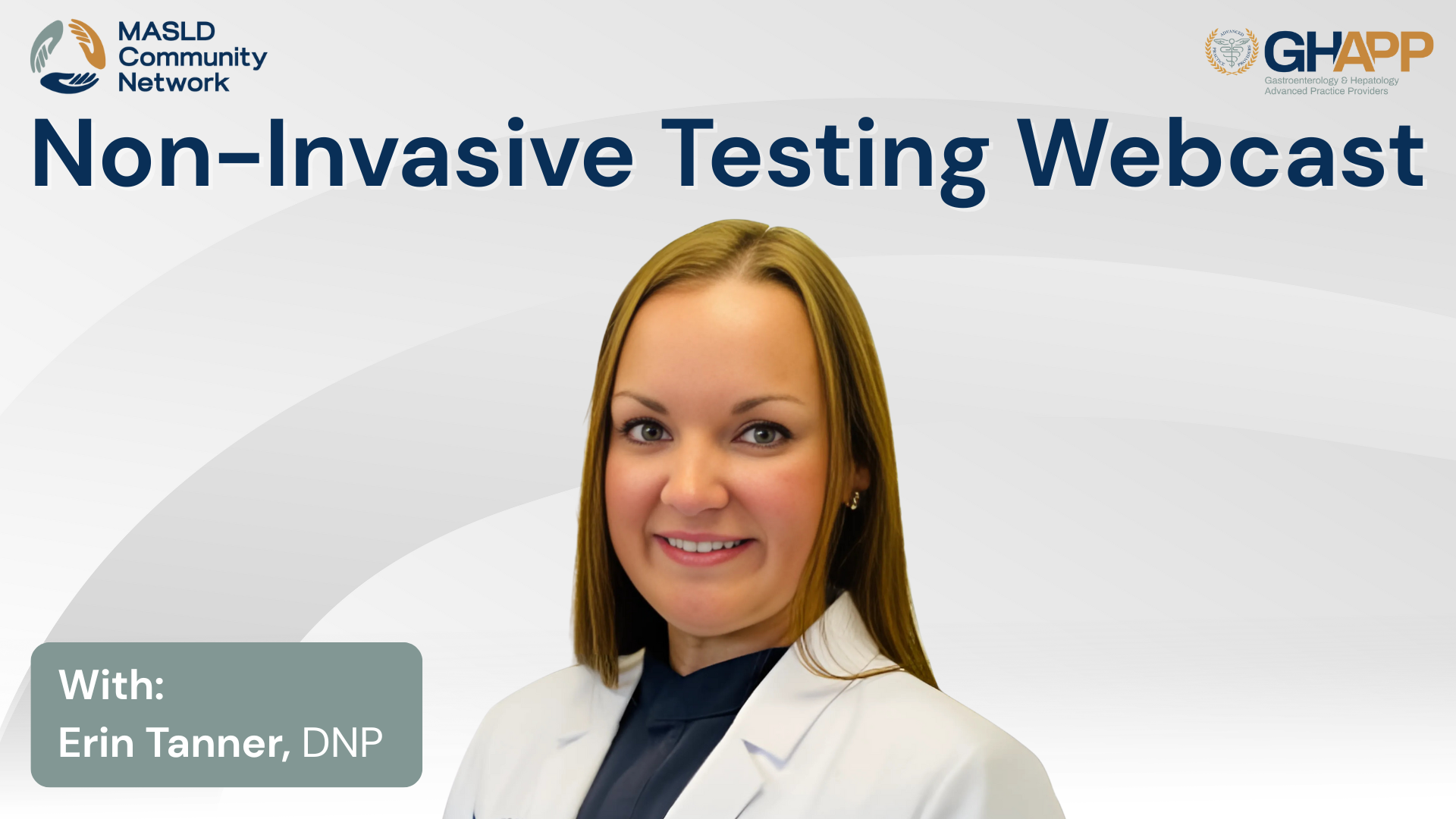
Webcast: Non-Invasive Testing With Erin Tanner

In this educational session from the GHAPP MASLD & MASH Community Network, Erin Tanner, PA-C from Gastro Health in Birmingham, Alabama, presents a practical overview of non-invasive testing (NIT) options for evaluating and managing MASLD (Metabolic dysfunction-associated steatotic liver disease) and MASH (Metabolic dysfunction-associated steatohepatitis). Using a patient case study, Erin explores how clinicians can effectively utilize tools like FIB-4, FibroScan® (VCTE and CAP), ELF, MRE, and other emerging imaging and serum biomarkers to assess hepatic steatosis and fibrosis without the need for liver biopsy. The talk breaks down the pros, cons, and clinical accuracy of various NITs—including shear wave elastography, MRI-PDFF, and proprietary serum markers—and offers guidance on how to apply these tools in real-world hepatology and primary care settings. Special attention is given to identifying patients with metabolic risk factors, interpreting indeterminate FIB-4 scores, and knowing when to refer patients for further hepatology evaluation. Whether you’re new to liver disease management or looking to update your MASLD/MASH care pathways, this session offers clarity on how to stratify fibrosis risk and make informed clinical decisions using non-invasive diagnostics.
Watch Now
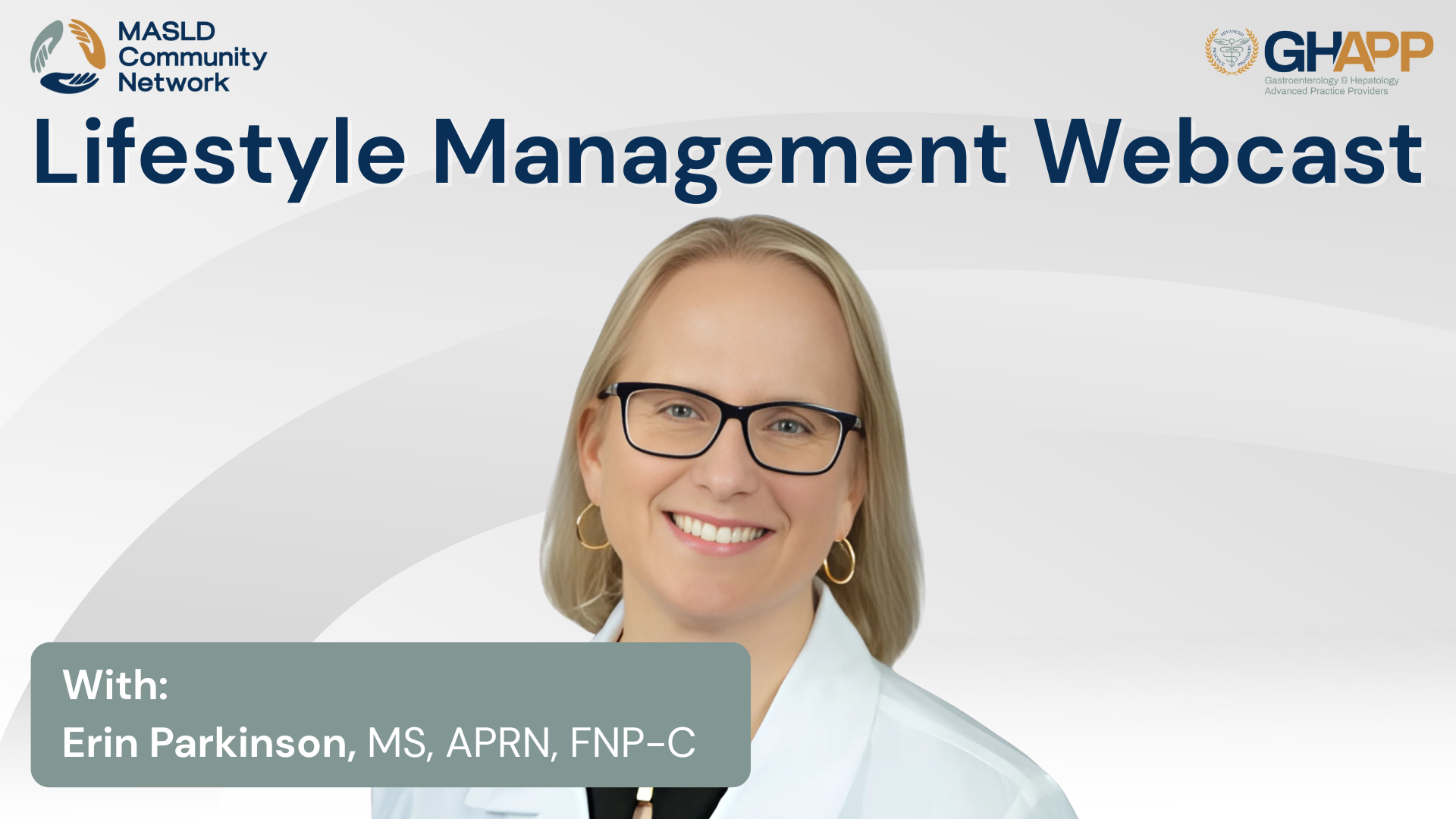
Webcast: Lifestyle Management With Erin Parkinson

In this impactful session from the GHAPP MASLD Community Network, Erin Parkinson, APRN, explores the vital role of lifestyle modifications in the management of MASLD (Metabolic dysfunction-associated steatotic liver disease) and MASH (Metabolic dysfunction-associated steatohepatitis). Through the lens of a real-world case study, Erin illustrates how clinical tools like FIB-4 and FibroScan® can be used to assess fibrosis risk and guide interventions for patients presenting with metabolic syndrome and hepatic steatosis. With a focus on practical, personalized care, this presentation highlights how diet, exercise, and culturally sensitive counseling can meaningfully reduce hepatic fat, inflammation, and fibrosis—key factors in preventing progression to cirrhosis or hepatocellular carcinoma. Erin discusses the impact of processed foods, high-fructose corn syrup, and sedentary behavior, while offering actionable guidance on introducing Mediterranean diets, intermittent fasting, and realistic exercise goals tailored to individual readiness and barriers. Whether you're a hepatology specialist, primary care provider, or obesity medicine clinician, this talk delivers tools to better support patients with MASLD/MASH through sustainable behavioral change and longitudinal follow-up.
Watch Now
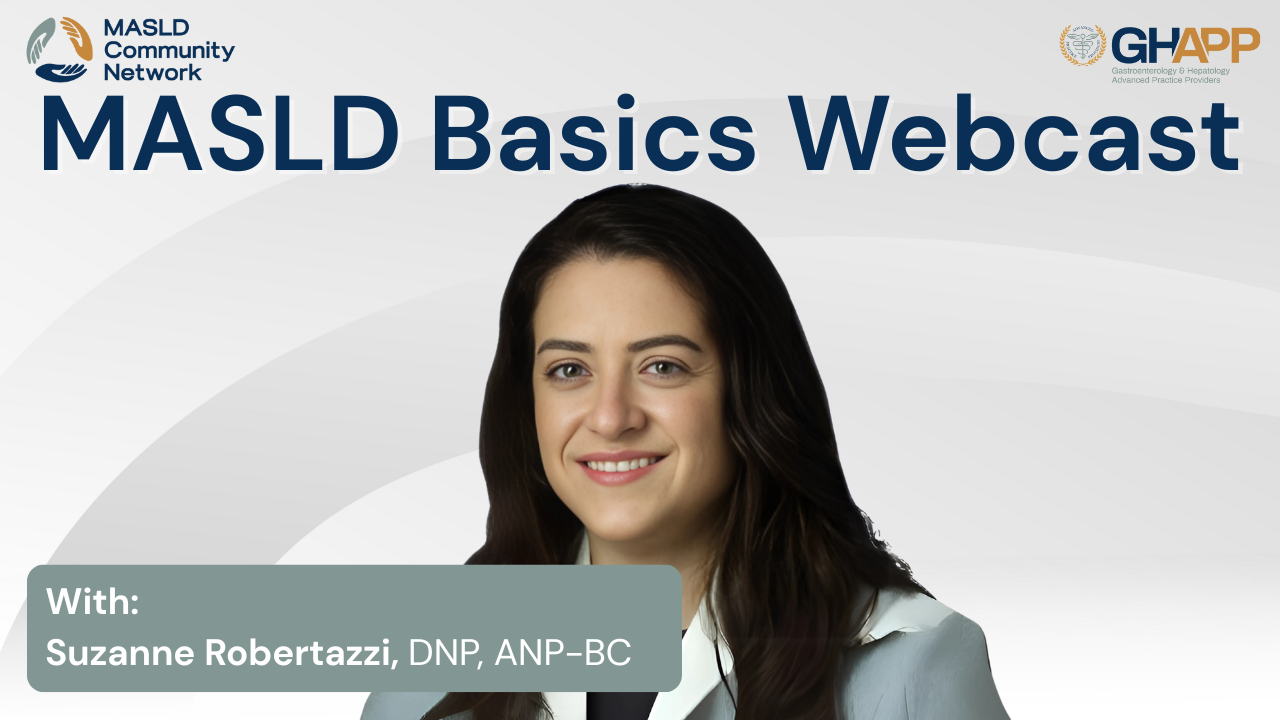
Webcast: MASLD Basics With Suzanne Robertazzi

Join Suzanne, a nurse practitioner from the Washington DC VA Medical Center, as she kicks off a comprehensive lecture series on steatotic liver disease, focusing on the evolving understanding of MASLD (Metabolic dysfunction-associated steatotic liver disease) and MASH (Metabolic dysfunction-associated steatohepatitis). In this foundational session, Suzanne walks through the new nomenclature replacing NAFLD and NASH, and outlines the clinical criteria used to identify and stratify patients along the MASLD–MASH spectrum. Learn how metabolic risk factors such as obesity, prediabetes, hypertension, and dyslipidemia contribute to disease progression, and explore the use of non-invasive diagnostic tools like Fib-4, FibroScan, and ELF scores to assess fibrosis. The session also discusses indications for liver biopsy, the implications of overlapping etiologies (like alcohol-associated liver disease), and strategies for identifying patients at high risk for cirrhosis, hepatocellular carcinoma (HCC), and liver-related mortality. This lecture equips clinicians, particularly those in primary care and hepatology, with a practical framework to evaluate steatosis, interpret metabolic profiles, and determine when to refer patients for specialty care. Whether you're new to liver disease or looking for updates on MASLD and MASH terminology, this session is an essential starting point.
Watch Now
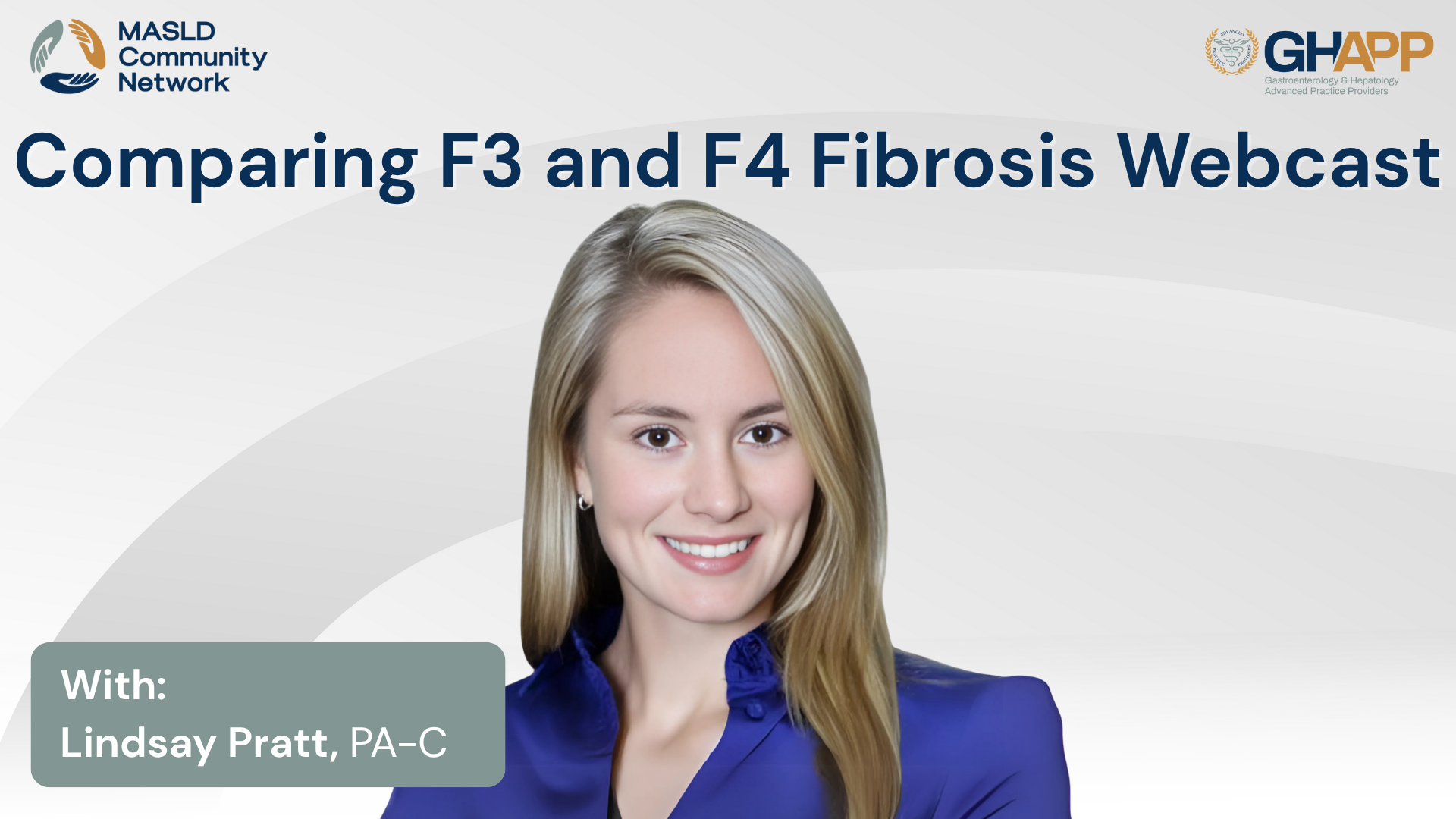
Webcast: Comparing F3 and F4 Fibrosis With Lindsay Pratt

Join Lindsay Pratt, PA-C from the University of Colorado Liver Transplant Program, for an in-depth clinical comparison of F3 and F4 fibrosis in patients with MASLD (Metabolic Dysfunction–Associated Steatotic Liver Disease) and MASH (Metabolic Dysfunction–Associated Steatohepatitis). Using an identical patient profile with differing non-invasive testing results, Lindsay demonstrates how to accurately stage fibrosis using tools like FIB-4, FibroScan, CAP score, and ELF test—emphasizing when pharmacologic intervention is appropriate and when advanced monitoring becomes critical. This session explores the clinical implications of fibrosis staging, treatment pathways including resmetirom (Rezdiffra), the role of GLP-1 receptor agonists, and practical nutrition and lifestyle strategies. For F4 patients, Lindsay outlines key elements of surveillance for hepatocellular carcinoma (HCC), portal hypertension management, and transplant evaluation. Whether you're in hepatology or primary care, this case-based discussion offers evidence-backed guidance for managing patients across the MASLD/MASH spectrum and preventing liver disease progression.
Watch Now
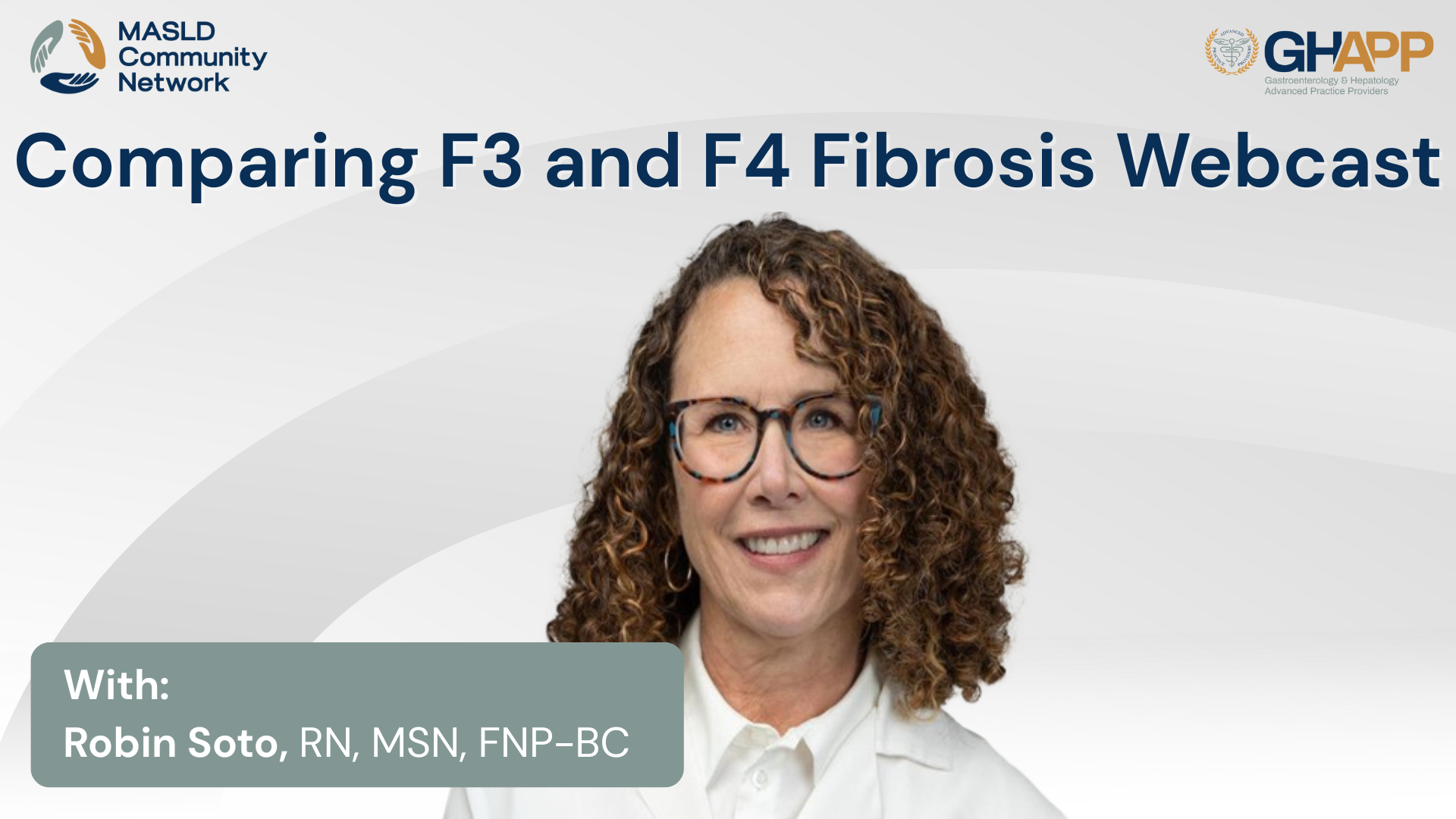
Webcast: Comparing F3 and F4 Fibrosis With Robin Soto

In this in-depth case-based session from the GHAPP MASLD/MASH Community Network, Robin Soto, NP from UC San Diego Health, explores the clinical nuances of diagnosing and managing fibrosis stage 3 versus stage 4 in patients with MASH (Metabolic Dysfunction–Associated Steatohepatitis). Using a real-world case study of a patient named Sam, Robin demonstrates how to interpret and reconcile non-invasive tests (NITs) like FIB-4, FibroScan, CAP score, and ELF test to guide accurate staging. She offers practical insights into treatment decisions, including when to use resmetirom, the importance of lifestyle modification, and how to assess comorbidities like diabetes, obesity, and cardiovascular risk. The session also outlines when and how to monitor for hepatocellular carcinoma (HCC), implement liver cancer surveillance strategies, and approach multidisciplinary care for advanced fibrosis or cirrhosis. Whether you’re a hepatology specialist or a primary care provider, this video equips you with evidence-based tools for managing MASLD and optimizing outcomes in complex liver disease.
Watch Now
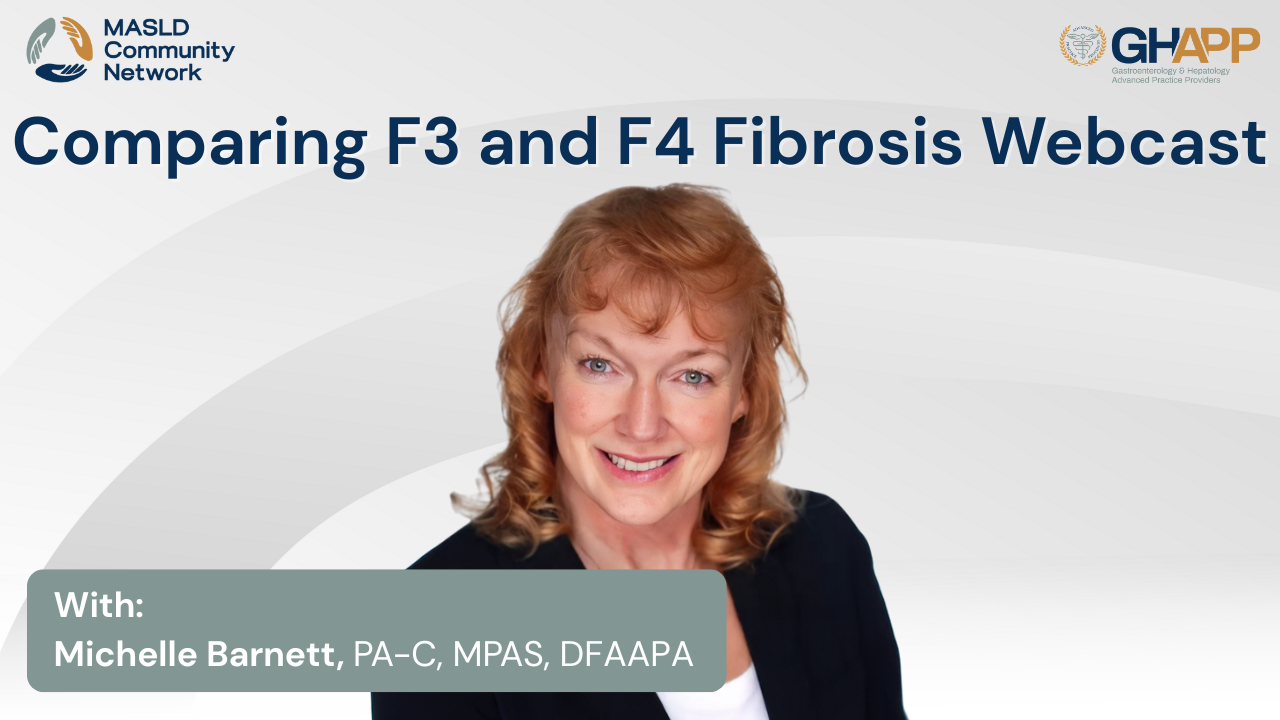
Webcast: Comparing F3 and F4 Fibrosis With Michelle Barnett

In this installment of the GHAPP MASLD Community Network, Michelle Barnett, PA-C from Peak Gastroenterology in Colorado Springs, presents a deep dive into the clinical management of MASH—formerly known as NASH or non-alcoholic steatohepatitis. Through two comparative case studies, Michelle explores the nuances of diagnosing and managing patients with F3 and F4 fibrosis. Learn how to effectively use non-invasive diagnostic tools like FIB-4, FibroScan, and ELF testing, and gain valuable insights into stratifying fibrosis risk, monitoring hepatocellular carcinoma (HCC), and determining when resmetirom is appropriate. This session also covers practical guidance on nutrition, exercise, medication safety, and multidisciplinary care for patients with advanced liver disease. Whether you're a hepatology specialist or a primary care provider navigating the MASLD/MASH landscape, this video offers actionable strategies to improve long-term patient outcomes and reinforces the critical role of lifestyle intervention and liver disease surveillance.
Watch Now

Webcast: Lifestyle Management With Lisa Richards

Join Lisa Richards, FNP-BC, from UC San Diego Health, as she leads a powerful educational session on the lifestyle management of MASLD (Metabolic Dysfunction–Associated Steatotic Liver Disease) in this GHAPP MASLD/MASH Community Network event, sponsored by Madrigal Pharmaceuticals. Through a compelling clinical case study, Lisa walks viewers through a step-by-step approach to diagnosing MASLD, assessing fibrosis risk using noninvasive tools like FIB-4 and FibroScan, and implementing guideline-based interventions. Learn how to counsel patients on culturally sensitive dietary modifications, physical activity strategies, and behavior change techniques that improve outcomes. This session also explores the clinical relevance of weight loss thresholds, Mediterranean-style eating plans, and the importance of patient-centered goal setting. Whether you’re a provider managing metabolic liver disease or looking to integrate newer therapies like resmetirom, this video offers practical tools to empower sustainable change and improve liver health.
Watch Now
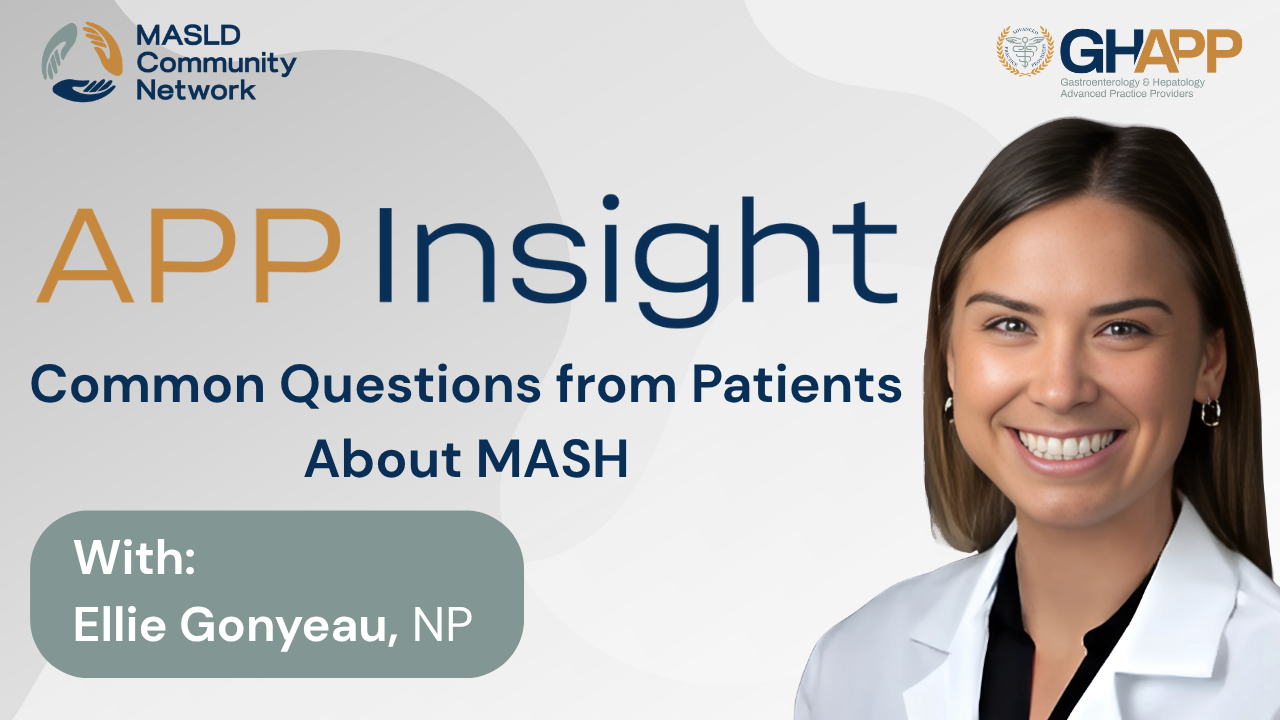
Common Questions From Patients About MASH

In this informative video, Ellie Gonyeau, a nurse practitioner in general gastroenterology at Beth Israel in Boston, answers some of the most common questions she hears from patients about MASLD (Metabolic dysfunction-Associated Steatotic Liver Disease). With compassion and clarity, Ellie addresses concerns about the seriousness of the condition, explaining that while MASLD can progress to advanced liver disease, early intervention can make a significant difference. She emphasizes the importance of not delaying care and encourages patients to take manageable steps—like losing just 5–10% of their body weight—to reduce liver inflammation and slow disease progression. Nutrition, exercise, and proactive conversations are central to her patient-centered approach. Whether you're newly diagnosed or seeking guidance, this episode offers valuable, practical insights for anyone navigating MASLD. #MASLD #FattyLiver #LiverHealth #GIcare #BethIsrael #NursePractitioner #Gastroenterology #PatientEducation #LiverDisease #WeightLossSupport
Watch Now

APP Insight: Common Questions from Patients About MASH

In this impactful episode, Sherona Bau, NP from UCLA, addresses the most frequent and pressing questions patients ask after being diagnosed with MASLD (Metabolic dysfunction-associated steatotic liver disease) or MASH (Metabolic-associated steatohepatitis)—including concerns about life expectancy, risk of liver failure, liver cancer, and genetic impact on family members. She emphasizes the importance of risk stratification using non-invasive testing, particularly FibroScan®, to determine the extent of fat accumulation and liver fibrosis. Sherona explains that early identification of stage 2 or 3 fibrosis is critical, as treatment options are now available for these stages, offering hope for patients. She also stresses that MASLD is not just a liver disease—it's a systemic, metabolic condition—and encourages coordinated care with endocrinologists, cardiologists, and dietitians. Additionally, she discusses the hereditary nature of fatty liver and the importance of family screening, especially for children of affected individuals. This video offers clear, compassionate guidance for patients and providers navigating the complexities of fatty liver disease.
Watch Now
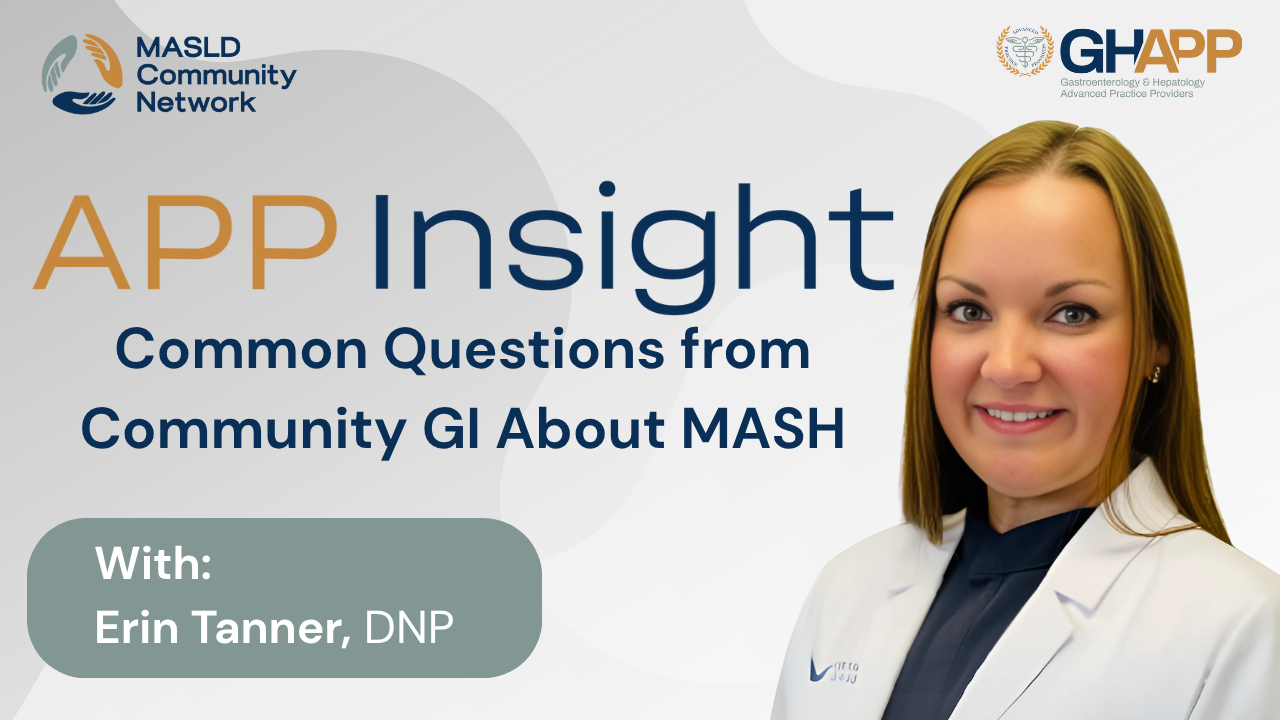
Common Questions from Community GI About MASH

In this practical and timely video, Erin Tanner, NP at Gastro Health in Birmingham, Alabama, shares expert insights on how community gastroenterology providers should approach incidental findings of fatty liver (MASLD/MASH) on abdominal imaging. With over 14 years of experience in GI and hepatology, Erin emphasizes that fatty liver can no longer be ignored, even when discovered during workups for unrelated GI symptoms like reflux or diarrhea. She walks through the step-by-step use of the FIB-4 index to risk-stratify patients and explains when to follow up with further non-invasive testing such as FibroScan® or ultrasound elastography. For patients with F3 fibrosis, Erin outlines next steps including lifestyle interventions, the use of Resmetirom, and the promise of GLP-1 therapies for future treatment. This is a must-watch for GI clinicians aiming to improve outcomes by proactively managing fatty liver disease in everyday practice.
Watch Now
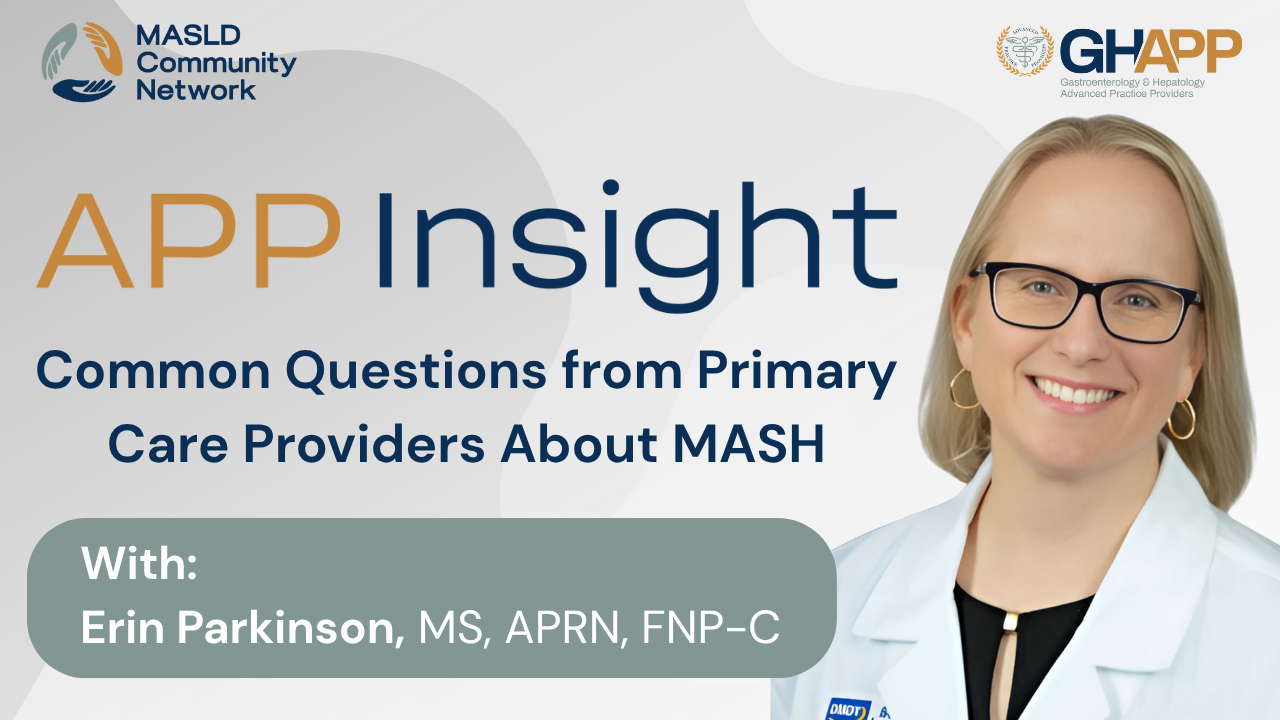
Common Questions from Primary Care Providers About MASH

In this educational video, Erin Parkinson, APRN at the Transplant Institute at Tampa General Medical Group, addresses two of the most frequently asked questions from primary care providers about MASLD (Metabolic dysfunction-associated steatotic liver disease) and MASH (Metabolic-associated steatohepatitis). First, she explains when it’s appropriate to refer a patient to GI or hepatology, emphasizing the use of FIB-4 for risk stratification and recommending referral when scores are indeterminate or high, especially if a FibroScan® result shows ≥8 kPa. Erin also discusses lifestyle interventions, reinforcing the importance of weight loss and dietary modification, with strong endorsement of the Mediterranean diet—a recommendation supported by major liver societies. She also notes that intermittent fasting may be a helpful adjunct for patients seeking to improve liver health through sustainable weight reduction. This video provides practical tools for frontline providers to improve early detection and management of fatty liver disease.
Watch Now

Common Questions from Primary Care Providers About MASH

In this informative episode, Emily Przybyl, PA-C at Erie County Medical Center in Buffalo, NY, answers two of the most common questions primary care providers have about MASLD (Metabolic dysfunction-associated steatotic liver disease) and MASH (Metabolic-associated steatohepatitis): When should I refer to hepatology? and Is it safe to prescribe statins in patients with fatty liver disease? Emily explains that any history of hepatic steatosis on imaging or elevated liver enzymes (LFTs) is reason enough to initiate referral for further workup, including non-invasive testing like FIB-4 or FibroScan®. She also debunks the common myth that statins should be avoided in this population, emphasizing that statins are not contraindicated and are critical for managing cardiometabolic risk factors that drive liver disease progression. This episode is a must-watch for clinicians navigating MASLD/MASH in primary care, with practical guidance that supports early intervention and evidence-based management.
Watch Now
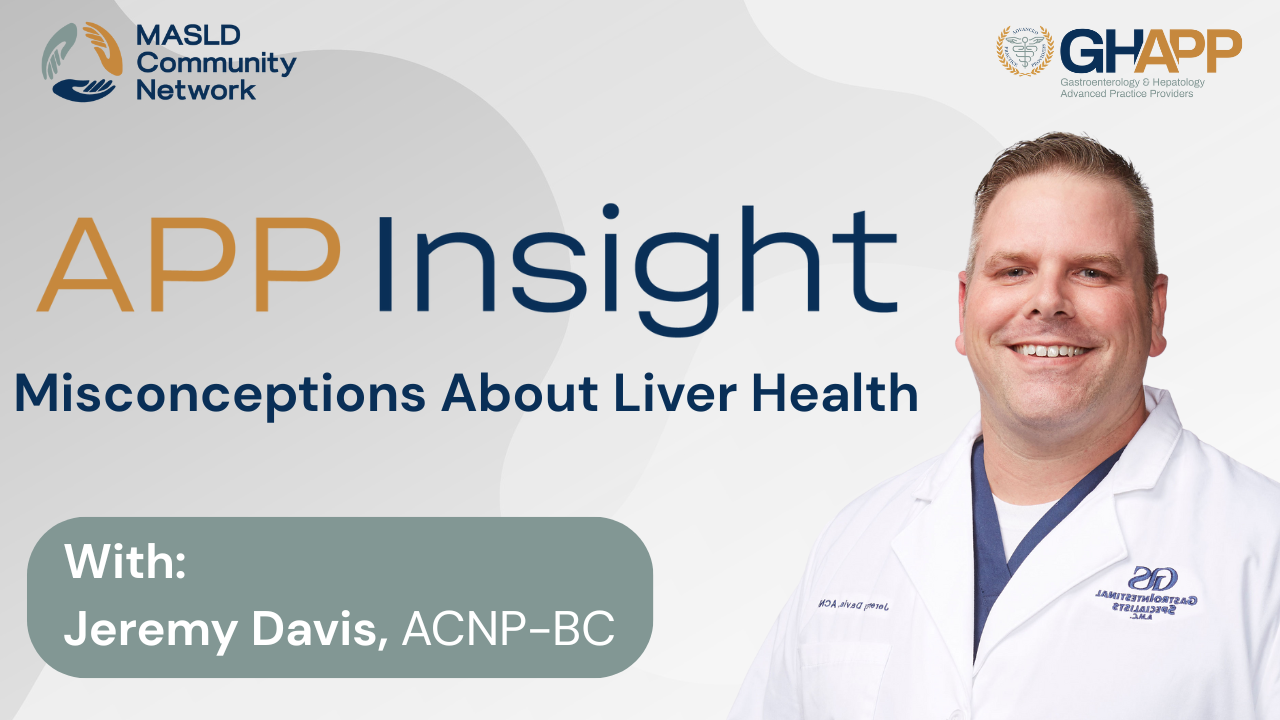
Misconceptions About Liver Health

In this quick but powerful video, Jeremy Davis, NP from Shreveport, Louisiana, addresses some of the most common misconceptions about liver health that he encounters in clinical practice. Many patients believe that liver disease only occurs in people who drink alcohol, but Jeremy explains how conditions like MASLD (Metabolic dysfunction-associated steatotic liver disease) and MASH (Metabolic-associated steatohepatitis) can affect individuals regardless of alcohol use. He also clears up the myth that only overweight patients are at risk, pointing out that co-morbidities such as hypertension, high cholesterol, cardiovascular disease, and type 2 diabetes can contribute to liver disease—even in patients with a normal BMI. Finally, Jeremy explains why normal liver enzyme labs (ALT and AST) don’t always rule out liver disease, making it crucial to assess underlying risk factors and improve provider and patient awareness. This video is a valuable resource for both healthcare professionals and patients looking to better understand non-alcoholic liver disease and why early screening matters.
Watch Now
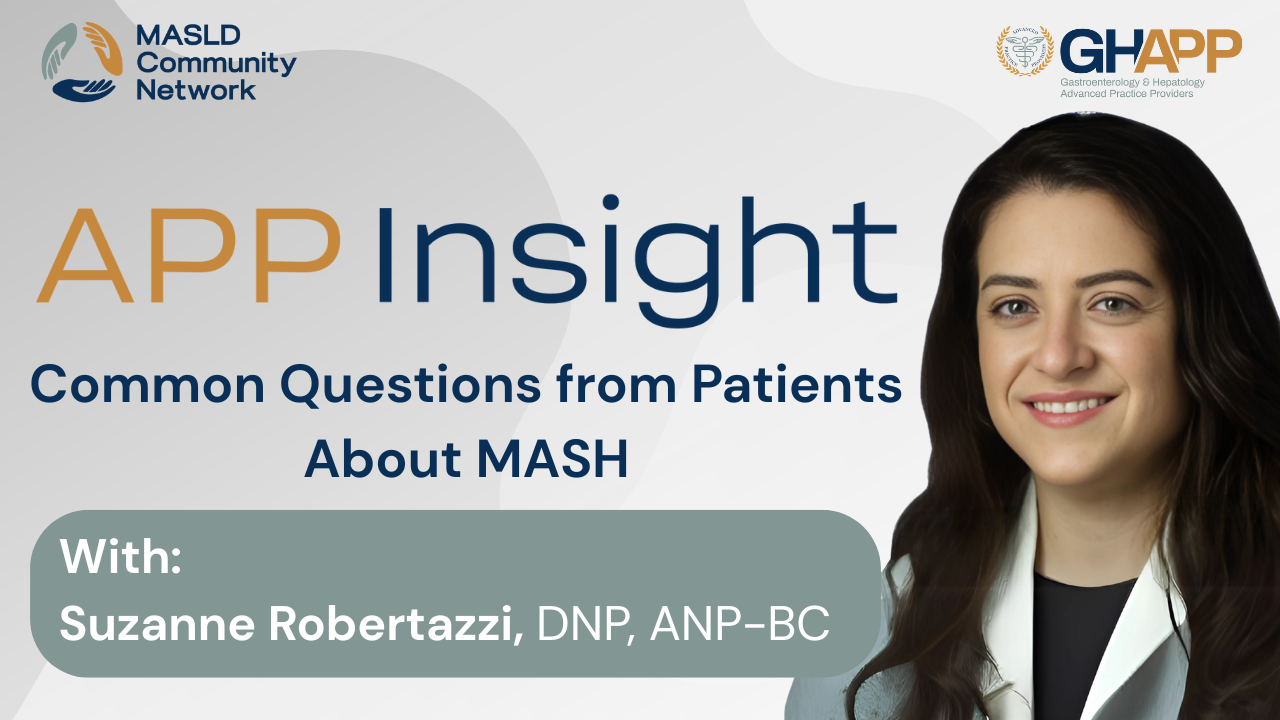
Common Questions from Patients About MASH

In this focused episode, Suzanne Robertazzi, NP at the Washington DC VA, shares expert insights on how to prevent recurrence of MASH (Metabolic-associated steatohepatitis) and MASLD (Metabolic dysfunction-associated steatotic liver disease) in liver transplant recipients. Drawing on her experience caring for post-transplant veterans, Suzanne explains that MASH can return even after liver transplantation, making ongoing metabolic management essential. She outlines key strategies including tight blood sugar and blood pressure control, especially since transplant medications can contribute to hypertension. Suzanne also emphasizes the importance of introducing regular physical activity post-recovery and adopting a Mediterranean-style diet—while tailoring nutrition guidance to meet the needs of patients in urban settings with limited access to fresh foods. This video is a must-watch for transplant teams, hepatology providers, and patients seeking to extend the life and health of their new liver through evidence-based lifestyle and clinical interventions.
Watch Now

Common Questions from Community GI About MASH

In this insightful video, Christie Morrison, a local advanced practice provider with the GHAPP MASLD/MASH Community Network, answers two of the most frequently asked questions from community GI providers: when to refer patients with MASH to a transplant center and how to evaluate liver fibrosis when FibroScan® isn’t accessible. Christy emphasizes the importance of using non-invasive testing (NITs)—including FIB-4 and ELF (Enhanced Liver Fibrosis) scores—to help identify patients with F3 fibrosis, who are at higher risk for rapid progression to cirrhosis and hepatocellular carcinoma (HCC). She encourages early referral to transplant hepatology to avoid delays in care, especially given long wait times and the value of multidisciplinary support teams at transplant centers. For clinicians without access to FibroScan, Christy shares practical alternatives such as ordering reflex testing to ELF via major labs and leveraging easy-to-use digital tools like MDCalc for FIB-4 calculation. This episode is a valuable resource for GI providers looking to optimize liver care pathways and prevent late-stage complications in MASLD and MASH patients.
Watch Now
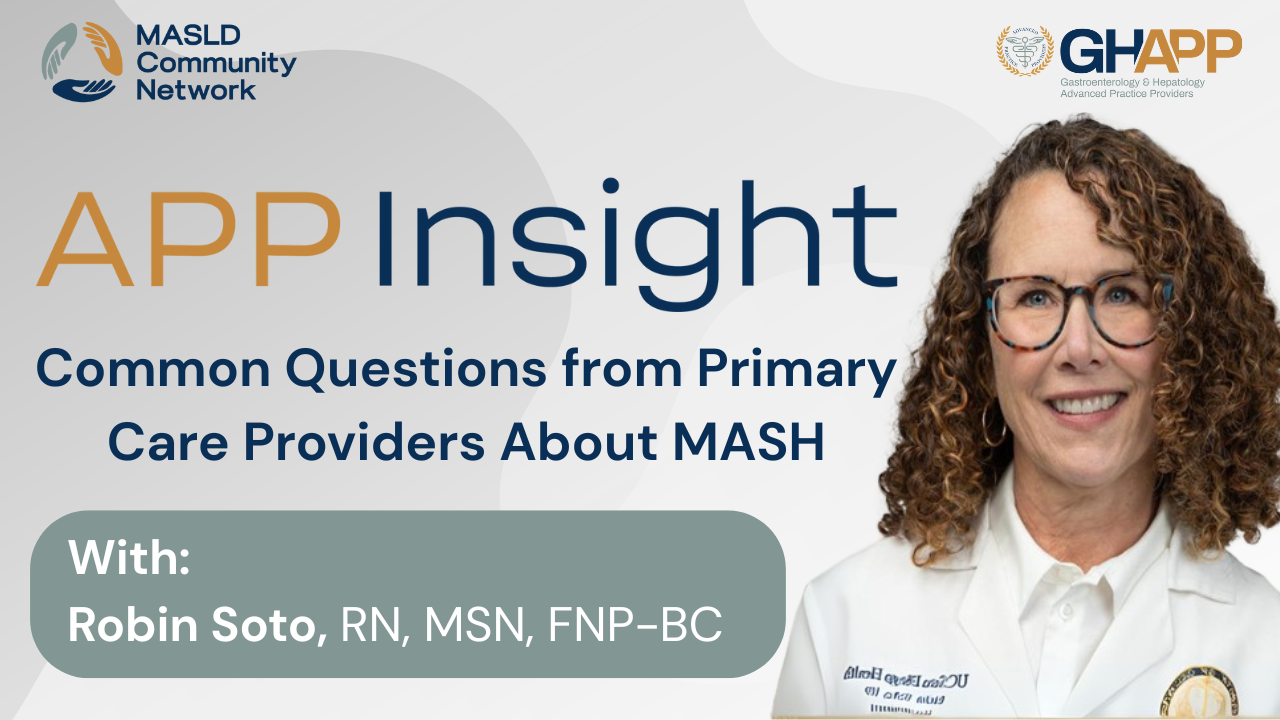
Common Questions from Primary Care Providers About MASH

In this educational video, Robin Soto, RN, MSN, FNP-BC from UC San Diego Health, answers common questions from primary care providers about the progression and management of MASLD (Metabolic dysfunction-associated steatotic liver disease) and MASH (Metabolic-associated steatohepatitis). She addresses the often-misunderstood reality that fatty liver disease can progress to cirrhosis, even in patients with no history of alcohol use—challenging the stigma that surrounds liver disease. Robin explains how MASH is a progressive condition, and if left unmanaged, can lead to advanced fibrosis and liver failure. She also shares practical dietary advice for patients, highlighting the benefits of the Mediterranean diet—rich in healthy fats, fiber, and low in processed foods and sugars—as recommended by hepatology societies like AASLD. Importantly, she emphasizes that even modest weight loss (3–10%) can significantly improve steatosis, inflammation, and even reverse fibrosis. This video is a valuable resource for clinicians and patients alike, focused on prevention, early intervention, and empowering lifestyle changes.
Watch Now

Common Questions From Primary Care Providers About MASH

In this insightful episode, Jessica Crimaldi, NP from the Cleveland Clinic, addresses two of the most frequently asked questions from primary care providers about MASLD (Metabolic dysfunction-associated steatotic liver disease) and MASH (Metabolic-associated steatohepatitis). First, she clarifies a common concern regarding statin use in patients with liver disease, emphasizing that statins are not only safe in most cases—including compensated cirrhosis—but also beneficial in managing cardiometabolic risk factors and slowing disease progression. She explains when statins are contraindicated and encourages collaboration with hepatology if there are concerns. Second, Jessica outlines a practical pre-referral workup for suspected MASLD/MASH patients. She details the labs needed to calculate FIB-4, suggests ordering an INR, and highlights the importance of screening for viral hepatitis, autoimmune liver disease, and common genetic liver disorders. This episode offers clear, actionable guidance for providers managing fatty liver disease in primary care and is a valuable resource for improving early diagnosis and coordinated care.
Watch Now

Common Questions From Community GI About MASH

In this session, Lavinia Iordache, PA-C, from the University of Miami, draws on a decade of experience in inpatient and outpatient hepatology to address common management questions related to MASLD (Metabolic dysfunction-associated steatotic liver disease) and MASH (Metabolic-associated steatohepatitis). She provides practical guidance for gastroenterology providers navigating when to monitor versus refer patients with fibrosis, how to interpret and time non-invasive testing (NITs) such as FIB-4, and when liver biopsy may still play a role—particularly in cases with persistently elevated liver enzymes despite lifestyle improvement. Lavinia also dives into the referral criteria for hepatology, the evolving role of resmetirom in stage 2–3 fibrosis, and the critical topic of HCC screening. While current AASLD guidelines limit HCC surveillance to cirrhosis, Lavinia highlights emerging evidence and EASL recommendations supporting imaging in patients with F3 fibrosis based on individualized risk factors like diabetes, genetics, and obesity. She also explains why CT or MRI is often preferred over ultrasound in MASLD patients due to obesity-related imaging limitations. This is a must-watch for hepatology and GI teams managing liver fibrosis in metabolic disease.
Watch Now
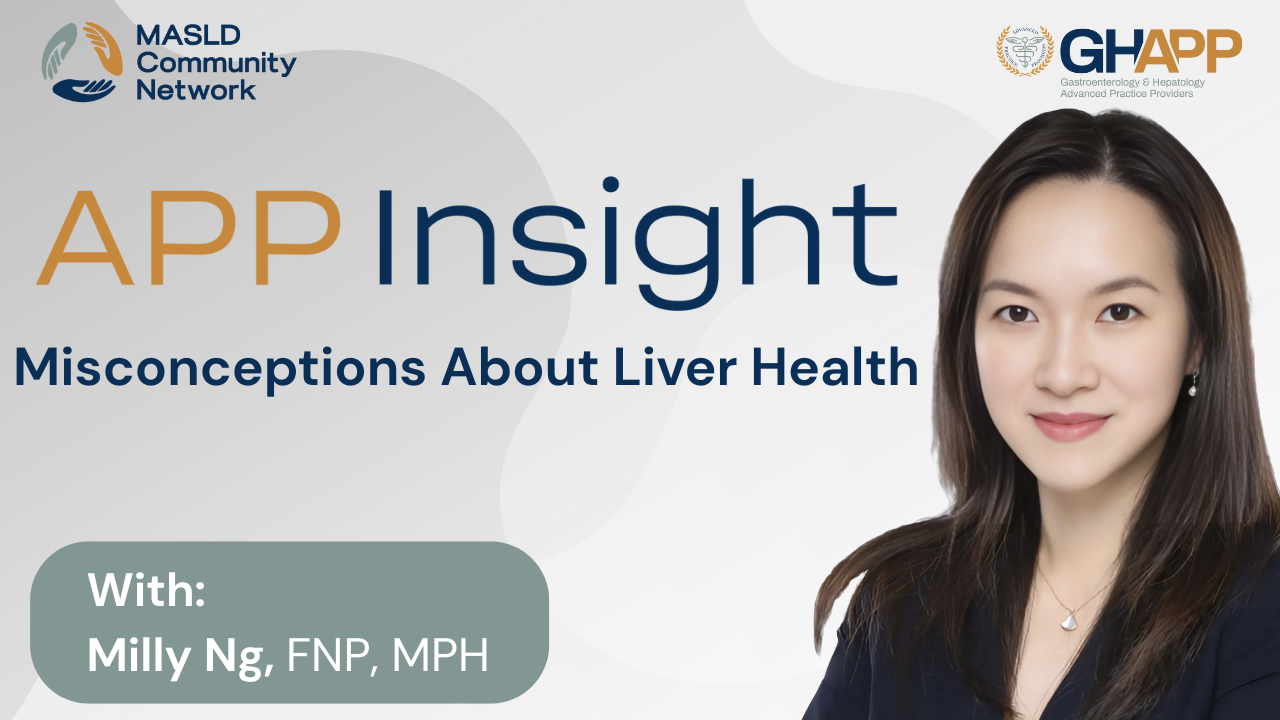
Misconceptions About Liver Health

In this short and informative video, Milly Ng, a nurse practitioner at Tufts Medical Center, debunks two of the most common myths about liver health. First, she sets the record straight on liver cleanses and detox teas—explaining that your liver already detoxifies your body daily and doesn’t need fad diets or trendy supplements. Instead, what your liver needs is support through sustainable habits like reducing alcohol intake, cutting back on processed sugars, and maintaining a healthy weight. She also highlights a critical point: liver disease is often silent, and many people with significant liver damage have no symptoms until it’s advanced. If you're at risk due to metabolic syndrome, alcohol use, or other factors, Miu Lai urges you to talk to your healthcare provider about screening options like FIB-4 or FibroScan®. Your liver works hard for you—this video is a reminder to return the favor with real, lasting care.
Watch Now
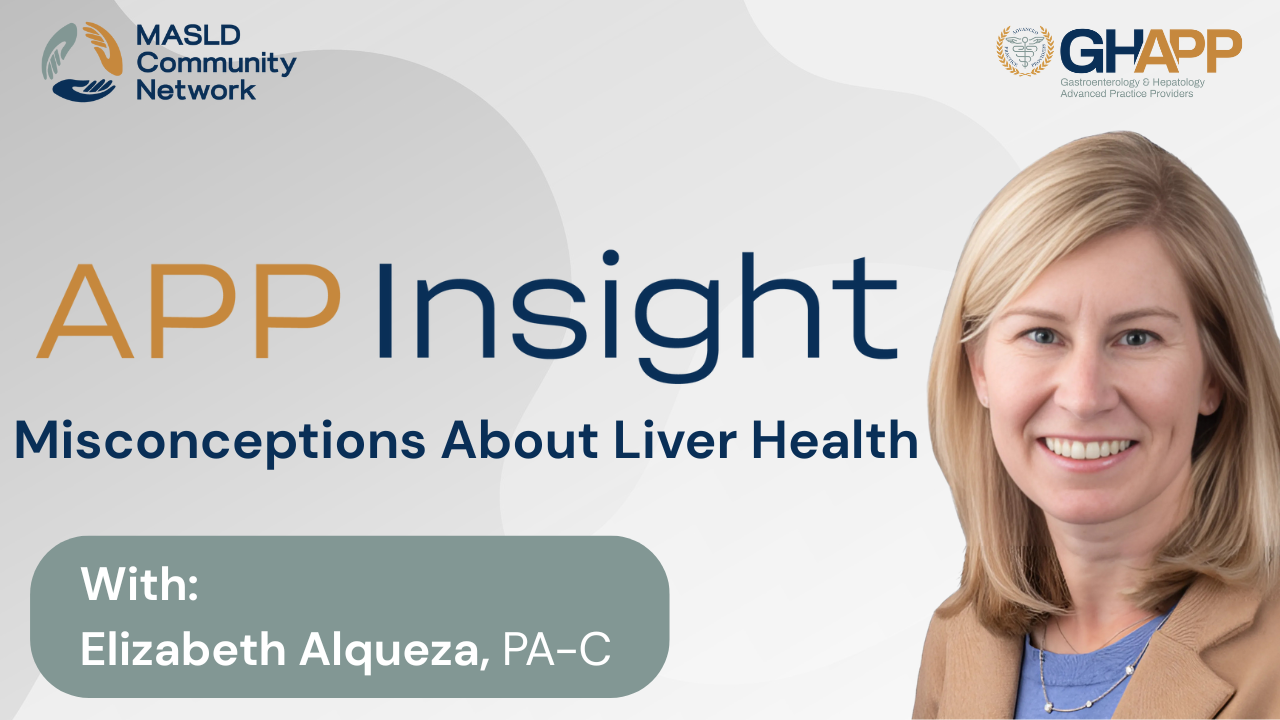
Misconceptions About Liver Health

In this quick myth-busting session, Elizabeth Alqueza, PA-C from Beth Israel Deaconess Medical Center in Boston, addresses two of the most common misconceptions in hepatology related to steatotic liver disease (MASLD/MASH). First, she explains that liver disease is not always fixed or irreversible—and with proper management and elimination of the underlying cause, liver fibrosis can improve over time, a trend often monitored through FibroScan®. Second, she clarifies that significant liver improvement does not require extreme weight loss. In fact, a modest 5–10% reduction in total body weight—sometimes as little as 10–20 pounds—can lead to measurable improvements in liver inflammation and fibrosis. This video is ideal for providers and patients seeking a clearer understanding of how lifestyle changes can reverse liver disease and why timely, targeted interventions matter.
Watch Now
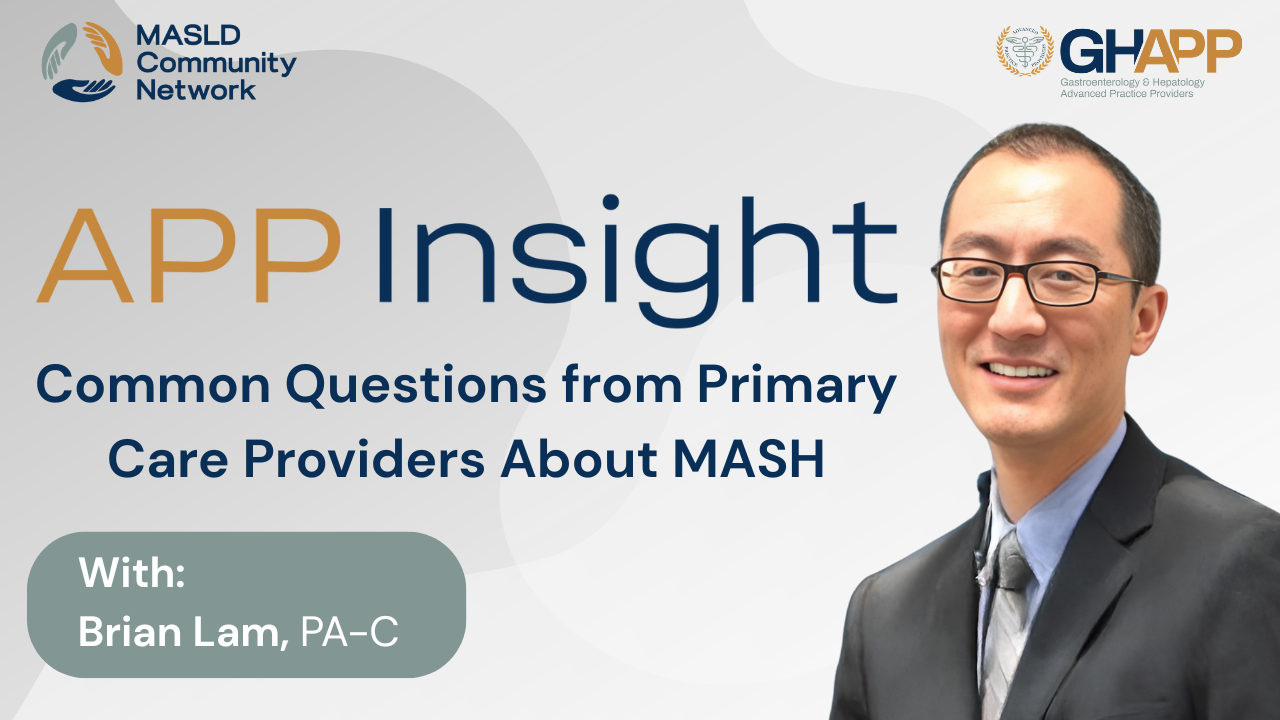
Common Questions from Primary Care Providers About MASH

In this FAQ session, Brian Lam, PA-C, breaks down a common question he receives from primary care providers, endocrinologists, and even other GI specialists: Which patients with fatty liver should be referred to hepatology or GI for further evaluation? Using a clear and practical approach, Brian explains how to apply FIB-4, a simple lab-based non-invasive test, to guide referrals. He emphasizes that patients with metabolic syndrome—especially those with diabetes—are at significantly higher risk for MASH (Metabolic dysfunction-associated steatohepatitis), with roughly 1 in 3 diabetic patients affected. If the FIB-4 is greater than 1.3, or greater than 2.0 in adults over 65, it's time to refer. Brian also highlights the utility of FIB-4 with reflex to ELF, now available through major labs like LabCorp and Quest, as an efficient two-step method to detect advanced fibrosis and at-risk MASH. This video is perfect for busy clinicians looking for a referral-friendly workflow to catch MASH early and improve liver health outcomes in high-risk populations.
Watch Now

Misconceptions About Liver Health

In this video, Gabriella McCarty, NP-C at Oshi Health, tackles common misconceptions surrounding fatty liver disease, also known as MASLD (Metabolic Dysfunction–Associated Steatotic Liver Disease). Drawing from her clinical experience, Gabriella highlights how fatty liver is often an incidental finding during routine GI visits, even when patients present for unrelated concerns like GERD or colon screenings. She emphasizes that MASLD is not caused by alcohol, but instead driven by metabolic risk factors such as obesity, diabetes, high cholesterol, and hypertension. Gabriella dispels the myth that normal liver enzymes indicate a healthy liver, explaining that liver markers are often unreliable in detecting advanced fibrosis or cirrhosis. She also warns against unregulated liver detox products and the outdated belief that fatty liver is harmless. With MASLD now the most common liver disease worldwide and increasing rates among younger populations, Gabriella stresses the importance of early screening, lifestyle modification, and patient education. This is a must-watch for anyone looking to better understand the silent progression of fatty liver disease and the tools available for timely intervention.
Watch Now
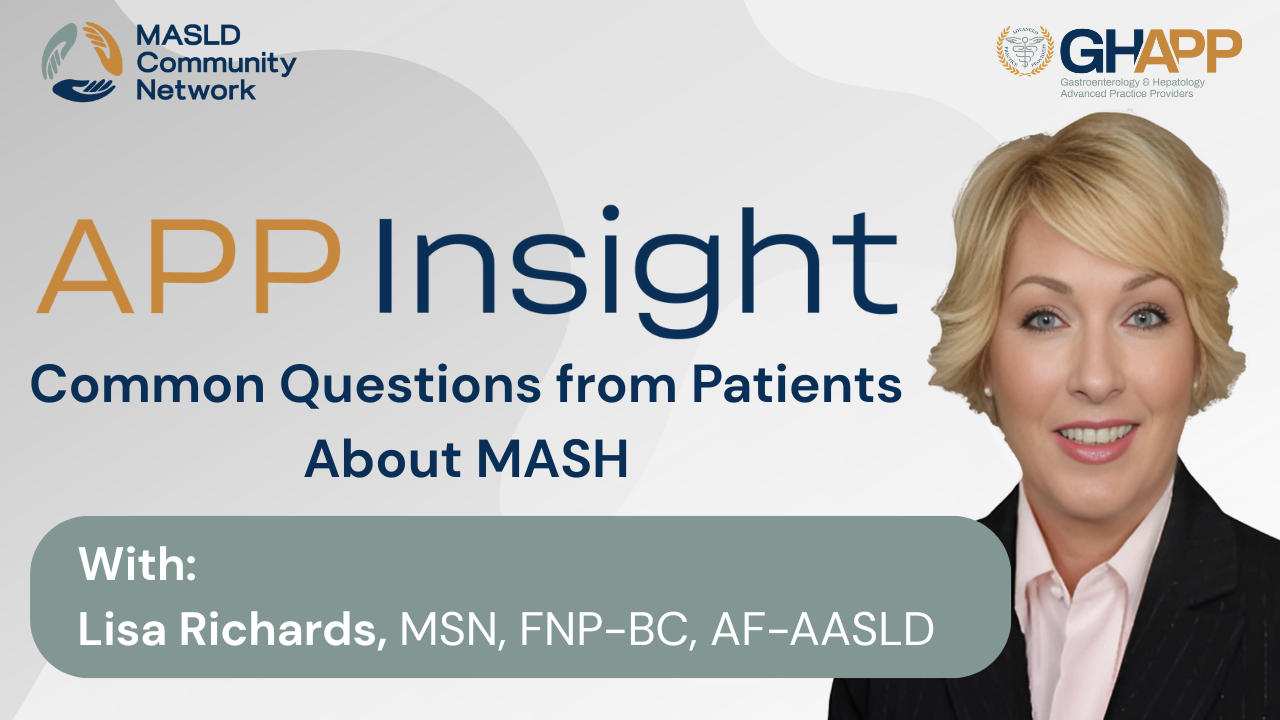
Common Questions From Patients About MASH

In this practical and patient-focused discussion from the GHAPP MASLD/MASH Community Network, we address some of the most frequently asked questions by patients newly diagnosed with MASLD (Metabolic dysfunction-associated steatotic liver disease). Many patients wonder how they can have liver disease if they don’t drink alcohol. This video explains the evolution from NAFLD to MASLD, emphasizing that MASLD is rooted in metabolic risk factors—not alcohol use—and commonly affects individuals with diabetes, obesity, and hypertension. Viewers will also learn about evidence-based lifestyle interventions, including the benefits of a hypocaloric diet, the recommended Mediterranean-style eating pattern, and 150 minutes of weekly physical activity. Finally, we tackle the question “Is MASLD curable?” with empowering guidance on how weight loss and exercise can help reverse liver damage and reduce liver fat. This is a must-watch for clinicians, care teams, and patients seeking clarity and confidence in managing this increasingly common liver disease.
Watch Now
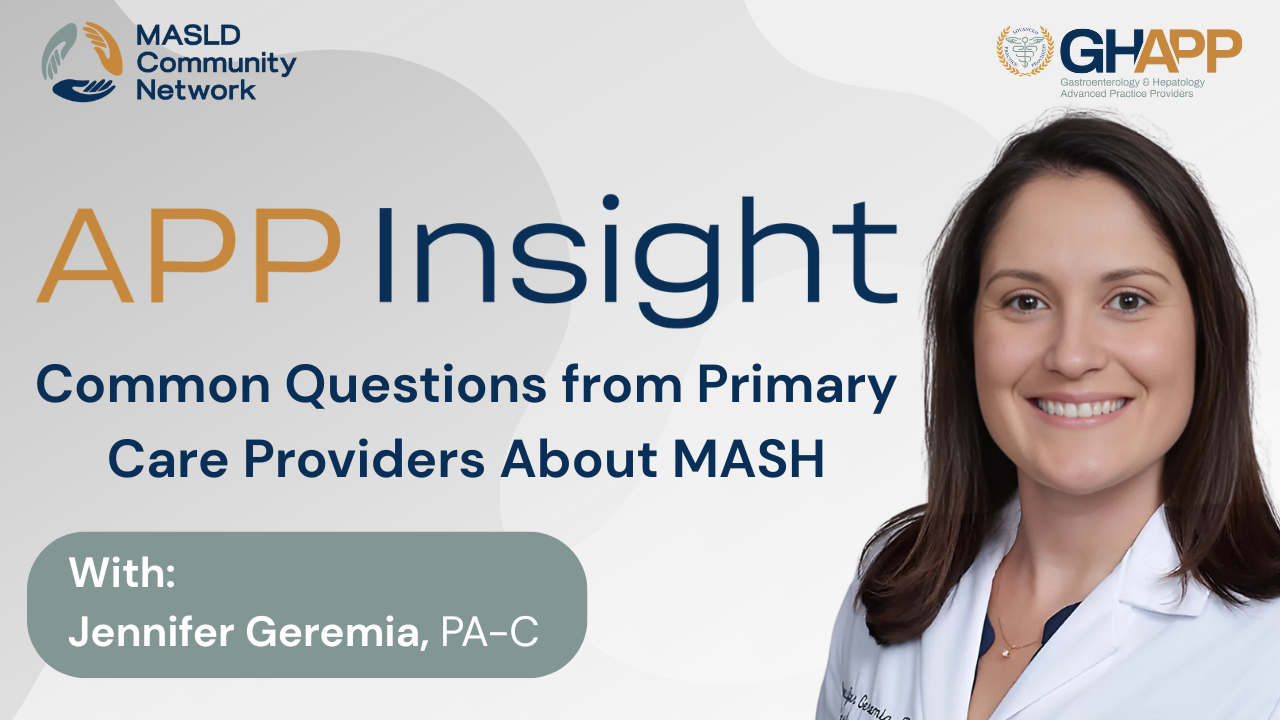
Common Questions From Primary Care Providers About MASH

In this informative session, Jennifer Geremia, PA-C, a seasoned gastroenterology physician assistant in tertiary care Boston, addresses some of the most common questions primary care providers have about identifying and managing patients with fatty liver disease, MASLD (Metabolic dysfunction-associated steatotic liver disease), and MASH (Metabolic-associated steatohepatitis). Jennifer highlights the importance of using FIB-4 as a first-line non-invasive test (NIT) in high-risk patients with diabetes, obesity, or other metabolic conditions—noting how easily this tool can be integrated into routine labs via the EMR. She underscores that the liver is often overlooked in chronic disease management and makes a strong case for routine fibrosis screening alongside cardiovascular and diabetes evaluations. The talk also dives into actionable next steps after FIB-4 testing, including elastography, ELF testing, and referrals to GI when needed. Jennifer closes by discussing realistic lifestyle intervention goals—especially the importance of 7–10% weight loss for meaningful reductions in steatosis and fibrosis risk. This session is a must-watch for PCPs, APPs, and clinicians managing metabolic comorbidities and seeking practical, evidence-based strategies for early MASH detection and management.
Watch Now
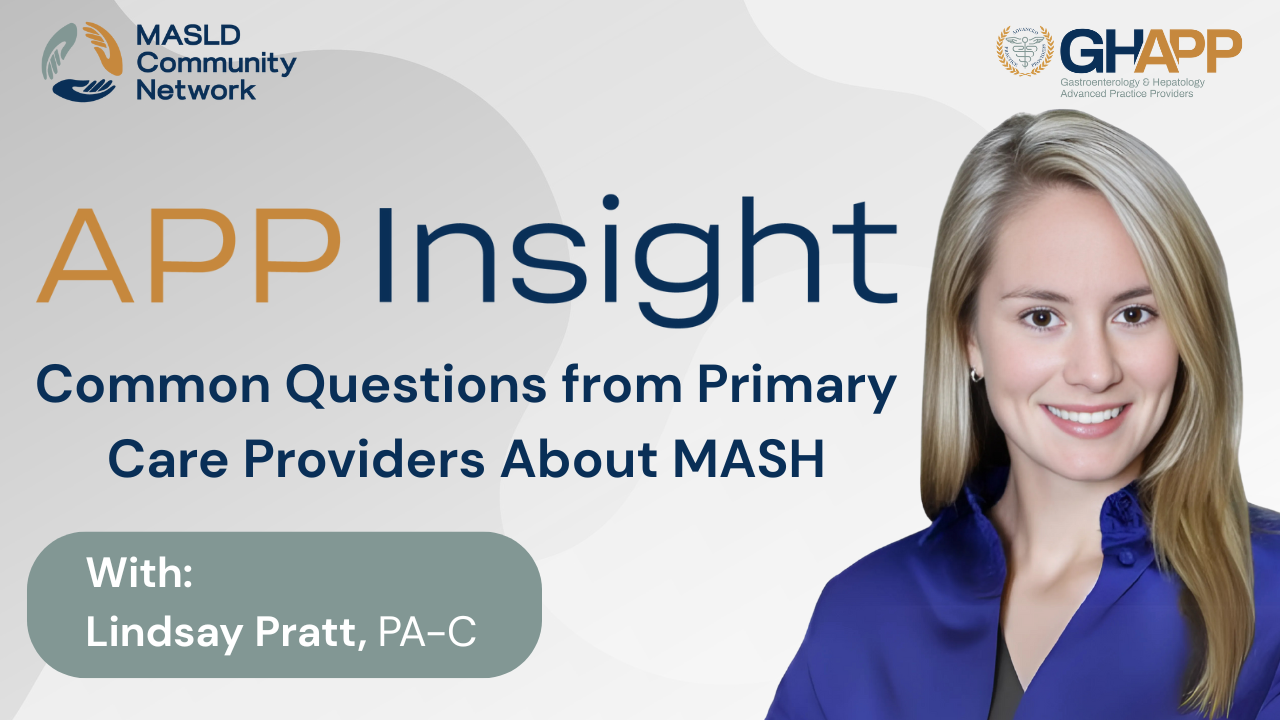
Common Questions From Primary Care Providers About MASH

In this concise and practical discussion, Lindsay Pratt, PA-C from the University of Colorado’s Department of Hepatology and Liver Transplant, shares expert guidance on screening and managing patients with MASLD (Metabolic dysfunction-associated steatotic liver disease) and MASH (Metabolic-associated steatohepatitis). Speaking directly to the common questions she receives from primary care providers, Lindsay outlines when to screen for MASLD/MASH—emphasizing the importance of evaluating patients with elevated liver enzymes, hepatic steatosis on imaging, and cardiometabolic risk factors like diabetes, hypertension, hyperlipidemia, and sleep apnea. She breaks down the utility of FIB-4 as a first-line non-invasive test, when to use FibroScan®, and clears up a common misconception about statin use in liver disease—encouraging providers to continue or initiate statins when indicated. This session is ideal for clinicians managing metabolic syndrome and its liver manifestations and offers simple, evidence-based tools to identify at-risk patients early.
Watch Now

Webcast: Non-Invasive Testing With Lindsay Pratt

In this educational session from the GHAPP MASLD/MASH Community Network, Lindsay Pratt, PA-C from the University of Colorado, guides viewers through the practical application of non-invasive testing (NITs) for assessing fibrosis in patients with MASLD (Metabolic dysfunction-associated steatotic liver disease). Using a real-world case study, she highlights how to interpret FIB-4, ELF score, vibration-controlled transient elastography (VCTE/FibroScan®), and MR elastography (MRE) to stratify patients by risk and guide next steps in management. Lindsay explains the strengths and limitations of each NIT, how lifestyle modifications and cardiometabolic risk factors play a role in disease progression, and how tools like the AGA Clinical Care Pathway can be applied in day-to-day practice. This session is ideal for hepatologists, GI providers, APPs, and primary care professionals working to improve outcomes in patients with fatty liver disease—without relying on liver biopsy.
Watch Now
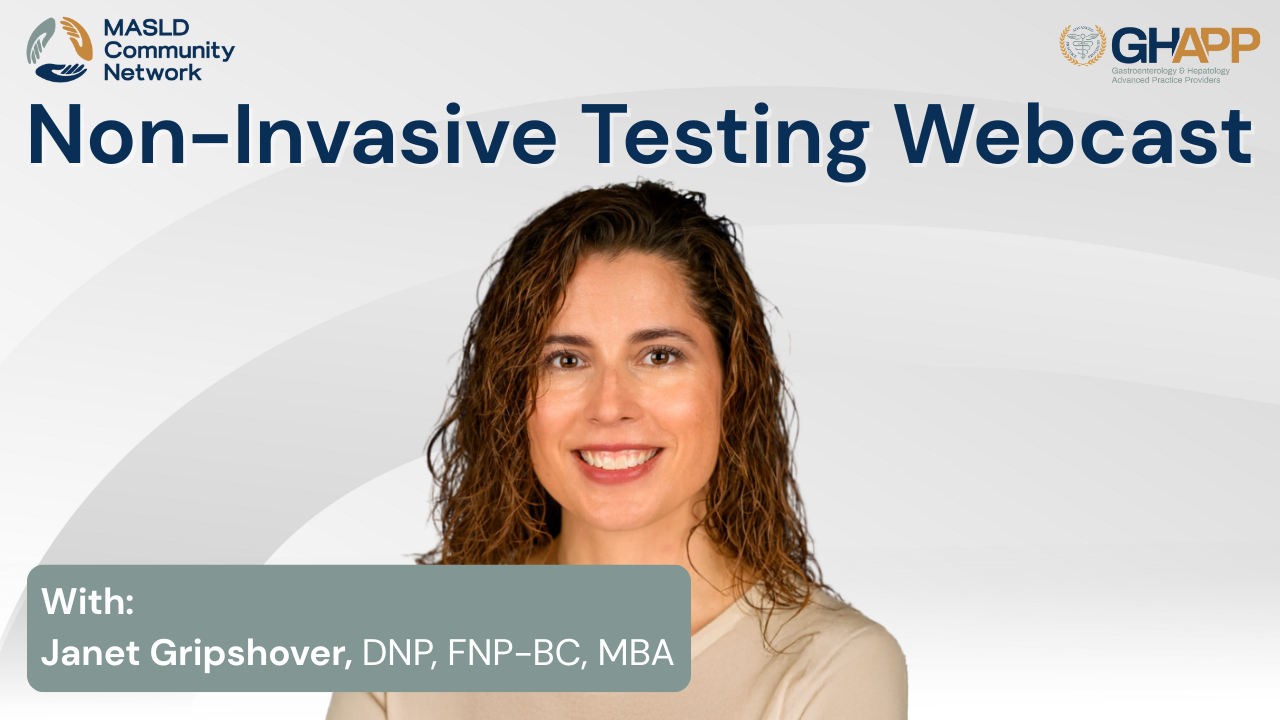
Webcast: Non-Invasive Testing With Janet Gripshover

In this in-depth and practical discussion, Janet Gripshover, NP from Cedars-Sinai in Los Angeles, explores the evolving role of non-invasive testing (NITs) in the diagnosis and risk stratification of MASLD (Metabolic dysfunction-associated steatotic liver disease) and MASH (Metabolic dysfunction-associated steatohepatitis). Drawing from real-world experience and a case study involving a 65-year-old patient with multiple cardiometabolic risk factors, she breaks down the latest 2025 approaches to fibrosis assessment—highlighting the use of FIB-4, ELF score, vibration-controlled transient elastography (FibroScan®), and MR elastography. Gryover also emphasizes how combining tests across modalities can improve accuracy and patient care while avoiding the risks of liver biopsy. Learn how liver stiffness, lab values, and clinical history all intersect to guide care and treatment decisions in patients with fatty liver disease. This session is part of the MASLD/MASH Community Network and is ideal for providers, specialists, and anyone interested in the forefront of liver disease management.
Watch Now

Common Questions From Community GI About MASH

In this informative video, Janet Gripshover, DNP, FNP-BC, and nurse manager for the liver transplant program at Cedars-Sinai, answers key questions about managing MASH (Metabolic Dysfunction–Associated Steatohepatitis) and navigating non-invasive testing. She addresses a common clinical challenge—what to do when FIB-4 and FibroScan results are discordant. Janet explains that while non-invasive tests are useful, they're not foolproof, and when results are unclear—especially in patients with significant metabolic risk factors—liver biopsy remains the gold standard for accurate diagnosis. She also shares expert recommendations on dietary changes for patients with fatty liver disease, emphasizing alcohol avoidance, high-protein, low-fat, and lower-carb diets, as well as achievable weight loss goals (around 5% of body weight). Janet highlights when to escalate care beyond lifestyle interventions—typically after 3 to 6 months if there’s no improvement—and discusses options such as pharmacologic therapy or bariatric surgery. This video provides practical, evidence-based guidance for healthcare providers managing the complexities of MASLD and MASH.
Watch Now

Webcast: Lifestyle Management With Christina Hanson

Join Christina Hanson, FNP-C from South Denver GI, for a practical and in-depth discussion on lifestyle management of MASLD (Metabolic Dysfunction-Associated Steatotic Liver Disease) and MASH (Metabolic Steatohepatitis). In this GHAPP MASLD/MASH Community Network session, Christina walks through the case of Albert, a 65-year-old patient with obesity, diabetes, and abnormal liver findings—representing a common clinical scenario in primary and specialty care. This session highlights how to apply non-invasive fibrosis assessment tools like FIB-4 and FibroScan, interpret metabolic risk factors, and differentiate patients based on fibrosis staging. Christina discusses how cultural dietary habits, access to care, and social determinants of health impact disease management, and emphasizes the importance of personalized counseling, accountability strategies, and gradual, sustainable changes to diet and exercise. The session also reviews the role of Resmetirom, the first FDA-approved treatment for MASH with F2-F3 fibrosis, and outlines guideline-recommended lifestyle interventions including the Mediterranean diet and combined aerobic/resistance exercise. Learn how to identify, stage, and manage patients with MASLD and MASH in a way that supports long-term adherence and improves liver-related outcomes. Educational support provided by Madrigal Pharmaceuticals.
Watch Now

Common Questions from Patients About MASH

In this insightful video, Patrick Horne, NP, from the University of Florida, addresses some of the most frequently asked questions from patients diagnosed with MASLD (Metabolic Dysfunction–Associated Steatotic Liver Disease) and MASH (Metabolic Dysfunction–Associated Steatohepatitis). Drawing from his clinical experience, he answers common concerns such as: “How did I get fatty liver if I don’t drink alcohol?”, clarifying that alcohol is not a necessary factor in developing these conditions—rather, metabolic risk factors like obesity, diabetes, hypertension, and genetic predisposition play a significant role. Patrick also dives into lifestyle recommendations, including the importance of adopting a mediterranean diet, engaging in regular physical activity, and setting realistic weight loss goals. Additionally, he tackles the nuanced question of alcohol consumption in patients with MASLD/MASH, emphasizing individualized care depending on the stage of liver disease. This session is a must-watch for both patients and providers seeking practical, evidence-based guidance on managing metabolic liver disease.
Watch Now

Webcast: MASLD Basics With Summer Collier

Join Summer Collier, NP from UC San Diego Health, for an essential overview of MASLD (Metabolic Dysfunction-Associated Steatotic Liver Disease) in this GHAPP MASLD Community Network session. Designed for clinicians and healthcare professionals, this case-based talk covers the evolving nomenclature shift from NAFLD/NASH to MASLD/MASH, including key definitions, diagnostic criteria, and practical tools for identifying and managing patients with steatotic liver disease. Summer walks through foundational concepts like the role of hepatic steatosis, cardio-metabolic risk factors, and the importance of excluding significant alcohol use to establish a MASLD diagnosis. She also provides clinical insights into non-invasive fibrosis staging using FIB-4, FibroScan, elastography, and blood-based tests, as well as how to differentiate patients who may require hepatology referral or biopsy. Emphasizing the importance of early detection and risk stratification in primary care, this session highlights how fibrosis stage impacts prognosis, treatment planning, and long-term liver-related outcomes. For more educational sessions and MASLD tools — visit the GHAPP MASLD Community Network.
Watch Now

Misconceptions About Liver Health

In this video, Christina Hanson, FNP-C, from South Denver Gastroenterology, dispels common myths around liver health and highlights a critical shift in how we identify and manage fatty liver disease. With the updated terminology from NAFLD/NASH to MASLD/MASH—Metabolic Dysfunction–Associated Steatotic Liver Disease—Christina explains how the new name more accurately reflects the underlying cardiometabolic drivers of the condition, such as obesity, type 2 diabetes, hypertension, and dyslipidemia. She emphasizes that liver enzyme abnormalities or incidental imaging findings should no longer be the only triggers for evaluation. Instead, clinicians—especially in primary care and endocrinology—should proactively screen high-risk patients using non-invasive tools like FIB-4 to assess for liver fibrosis. With over 50% of patients with type 2 diabetes and up to 90% of those with morbid obesity at risk for coexisting fatty liver, early identification and triage are vital to improving outcomes. This is a must-watch for healthcare providers seeking practical, guideline-driven strategies for detecting MASLD and MASH in everyday clinical practice.
Watch Now

How is MASH severity staged? What would an ideal MASH NIT algorithm look like?

Thank you to Madrigal for sponsoring this FAQ Video Module. In this GHAPP FAQ Video Module, Jonathan Yeh, a physician assistant at the Center for Liver Disease and Transplantation at Columbia University Irving Medical Center, discusses advancements in diagnosing and staging metabolic dysfunction-associated steatohepatitis (MASH). He explains the transition from traditional liver biopsy to non-invasive testing methods such as FibroScan and the Enhanced Liver Fibrosis (ELF) test for assessing fibrosis stages. Jonathan highlights the use of these methods, in combination with blood tests, to provide reliable staging of fibrosis in patients with MASH. For more information, visit the GHAPP website or ACE app.
Watch Now

Common Questions From Community GI About MASH

In this video, Lindsay Yoder, PA-C, a hepatology expert at Indiana University in Indianapolis, addresses some of the most common questions general GI providers have about diagnosing and managing MASLD (Metabolic Dysfunction–Associated Steatotic Liver Disease) and MASH (Metabolic Dysfunction–Associated Steatohepatitis). She explains the nuance of interpreting positive autoantibodies like ANA or ASMA, emphasizing that up to 30% of patients with MASLD/MASH may have non-specific reactive antibodies that are not clinically significant for autoimmune hepatitis. Lindsay walks viewers through how to evaluate serologic workups in context—considering IGG levels, ALT trends, and symptoms like fatigue or pruritus—and when to consider liver biopsy. She also shares expert guidance on when to refer patients to hepatology, particularly those with advancing fibrosis (F2-F4) or cirrhosis. Finally, she clarifies how to distinguish between MASLD and alcohol-associated liver disease (ALD), using daily alcohol consumption levels alongside cardiometabolic risk factors to help determine whether a patient falls into a MASLD, ALD, or mixed-etiology category like MetALD. This informative session is essential viewing for clinicians navigating the evolving landscape of metabolic liver disease.
Watch Now
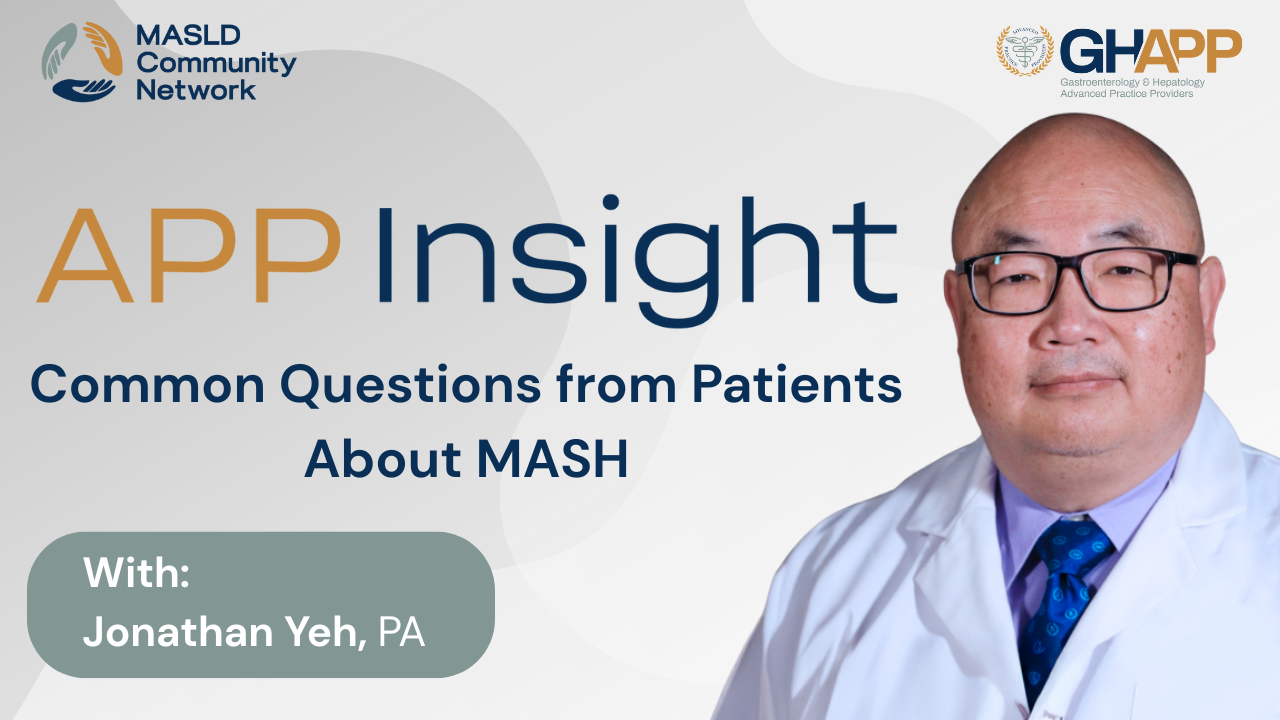
Common Questions From Patients About MASH

In this video, Jonathan Yeh, PA, answers three of the most frequently asked questions about MASH—Metabolic Dysfunction–Associated Steatohepatitis—and offers practical advice for understanding and managing this progressive form of fatty liver disease. He begins by explaining what MASH is: an inflammatory, more advanced stage of MASLD (Metabolic Dysfunction–Associated Steatotic Liver Disease), driven by abnormal fat accumulation in the liver due to impaired fat transport. Jonathan then breaks down the treatment approach, emphasizing the importance of lifestyle modification—particularly diet and exercise. He highlights the benefits of a green Mediterranean diet, regular physical activity, and sustainable weight loss, which can improve or even reverse MASH in many patients. For individuals with more advanced fibrosis, pharmacologic treatment with resmetirom (Rezdiffra) may be indicated. This concise FAQ offers helpful guidance for patients and providers alike on tackling MASH with evidence-based strategies.
Watch Now

Misconceptions About Liver Health

In this video, Scott Springer, PA-C, from Erie County Medical Center in Buffalo, NY, addresses one of the most common misconceptions in liver health—trusting over-the-counter supplements and detox products to improve liver function. Drawing from his experience in both hepatology and addiction medicine, Scott emphasizes that many non-prescribed products marketed for liver support are not only ineffective but can actually cause liver harm. He cautions against relying on unregulated supplements and urges patients to consult medical professionals before taking anything for liver health. One surprising and evidence-based recommendation he makes: drink coffee. Filtered coffee, in particular, has been shown to support liver health and may reduce the risk of liver disease progression. Scott recommends two to three cups per day, without added sugar or excess dairy—especially for patients with MASLD or MASH. This video offers practical, research-backed advice for patients and providers alike, highlighting what truly helps (and what may harm) the liver.
Watch Now

Webcast: Lifestyle Management With Robin Soto

Join Robin Soto, NP from UC San Diego Health, for a practical and case-based discussion on lifestyle management in patients with MASLD and MASH (Metabolic dysfunction-associated steatotic liver disease and steatohepatitis). In this presentation, Robin walks through the diagnosis and management of a representative patient case, highlighting how to assess fibrosis risk using non-invasive tools like FIB-4 and FibroScan, and emphasizing the critical role of lifestyle intervention. Learn how diet, exercise, and behavioral counseling can slow or reverse liver disease progression—especially in patients with cardiometabolic risk factors such as type 2 diabetes, obesity, and hyperlipidemia. Robin also addresses real-world barriers to dietary change, including cultural preferences, food accessibility, and socioeconomic challenges, while offering practical strategies for behavior change and patient engagement. This session is part of the GHAPP MASLD/MASH Community Network and includes educational resources on MASH and promotional information about Rezdiffra, a new treatment option for patients with advanced disease. Whether you're a hepatology provider or managing liver disease in primary care, this presentation offers essential, real-world guidance to support your clinical decision-making.
Watch Now

Webcast: Lifestyle Management With Anthony Derencius

Join Anthony Derencius, PA-C, at Pinnacle Clinical Research, for an in-depth, case-based discussion on the role of lifestyle management in MASH and MASLD. In this educational session from the GHAPP MASLD Community Network, Anthony walks through the real-world case of a 65-year-old patient with obesity, diabetes, and suspected metabolic liver disease, highlighting how to interpret non-invasive diagnostics like FIB-4 scores and transient elastography. He explains the clinical significance of metabolic risk factors, genetic predispositions (such as PNPLA3), and how personalized approaches to nutrition and exercise can alter the progression of fatty liver disease. With evidence-based insights on the Mediterranean diet, aerobic vs resistance training, and behavior change strategies, this video offers frontline strategies to support patients in reversing or slowing fibrosis. Watch to learn how providers can combine patient education, lifestyle interventions, and emerging pharmacotherapy to manage MASLD and MASH more effectively. Educational support provided by Madrigal Pharmaceuticals. For more disease state content, visit the GHAPP MASLD Community Network.
Watch Now
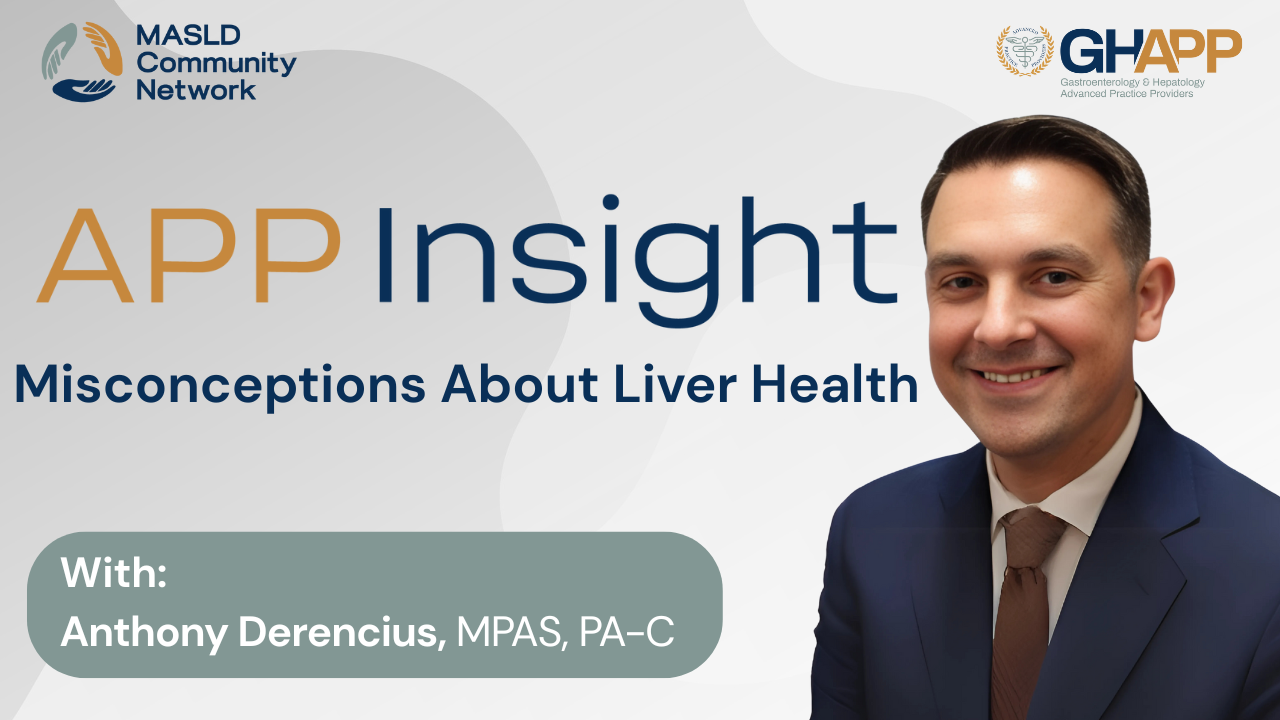
Misconceptions About Liver Health

In this video, Anthony Derencius, PA-C at Pinnacle Clinical Research, clears up some of the most common misconceptions about liver health—offering valuable insights for both patients and healthcare providers. With extensive experience in hepatology, Anthony emphasizes that liver disease is often silent and asymptomatic, meaning many individuals may feel completely fine while living with a significant liver issue. He cautions against relying on a single lab result or imaging test to determine liver status, especially when assessing for conditions like cirrhosis, and stresses the importance of confirming findings through multiple diagnostic tools over time. Anthony also highlights the need for proactive screening, particularly in patients with risk factors such as obesity, diabetes, or a family history of liver disease. Early detection is key, and he encourages patients to advocate for their liver health by seeking evaluation—even if their provider hasn’t suggested it. This is a must-watch for anyone aiming to better understand the complexities of liver disease and the importance of early and accurate diagnosis.
Watch Now

Misconceptions About Liver Health

In this video, Kelly Smeester, PA-C from South Denver Gastroenterology, addresses some of the most common and harmful misconceptions about liver health. One major myth she tackles is the belief that liver disease only affects those who drink excessive amounts of alcohol. Kelly explains that liver disease has many causes—including autoimmune conditions, viral infections, and metabolic dysfunction—meaning even individuals who don’t drink at all may still be at risk. She emphasizes the dangers of relying on unregulated “liver detox” supplements, clarifying that the liver is a natural detox organ and doesn’t require external cleanses, which may actually do more harm than good. Kelly also highlights how liver disease can be entirely asymptomatic, particularly in patients with conditions like type 2 diabetes, obesity, hypertension, and high cholesterol. Finally, she reinforces that cirrhosis is not solely alcohol-related and can result from steatotic liver disease, making regular liver evaluations and screenings crucial for early detection and management. This video is an essential resource for patients and providers aiming to better understand liver health beyond outdated myths.
Watch Now

Webcast: Lifestyle Management With Michelle Barnett

Join Michelle Barnett, PA-C, for an in-depth clinical case presentation as part of the GHAPP MASLD Community Network. With over 25 years of experience in GI and hepatology, Michelle walks through the real-world management of Albert, a 65-year-old patient newly diagnosed with MASLD (Metabolic Dysfunction-Associated Steatotic Liver Disease). In this session, she outlines key diagnostic criteria, the role of non-invasive tests (NITs) like FIB-4 and FibroScan, and how to risk-stratify patients using updated care pathways. Learn how to differentiate low-, moderate-, and high-risk cases and when to refer for hepatology evaluation or consider biopsy. Michelle also explores the clinical role of Resmetirom—the first FDA-approved medication for patients with MASH and F2-F3 fibrosis—and emphasizes the importance of sustained lifestyle modification, dietary change, and exercise in liver disease management. This expert discussion includes cultural and socioeconomic considerations, adherence strategies, and patient tools like the Exercise and Diet Adherence Scale. Visit the GHAPP MASLD Community Network for more resources, disease-state education, and updates on the evolving care landscape. Educational content supported by Madrigal Pharmaceuticals.
Watch Now
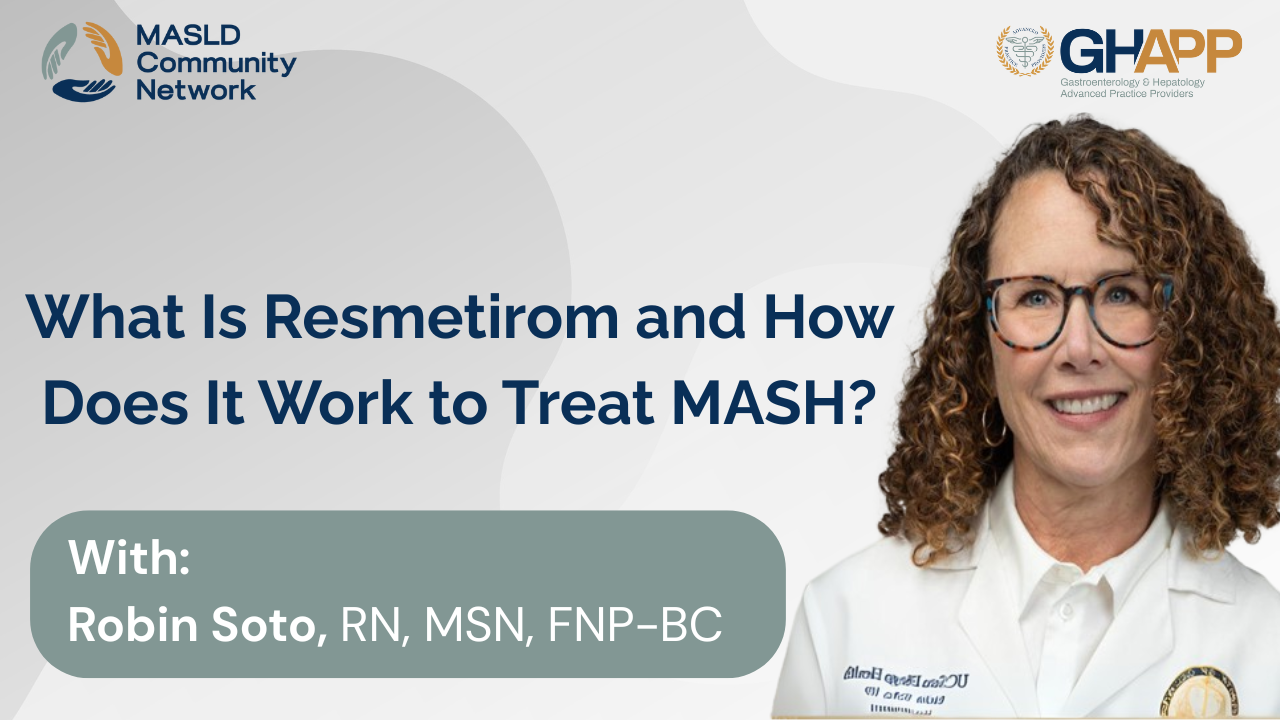
What is Resmetirom and how does it work to treat MASH?

Thank you to Madrigal for sponsoring the Medication Review Video Module. In this GHAPP Medication Review video, Robin Soto, a board-certified nurse practitioner at UC San Diego Health Hepatology, explains the mechanism of action of Resmetirom, the first and only FDA-approved drug for the treatment of MASH in adults with mild to moderate fibrosis (F2-F3). Robin describes how Resmetirom, a liver-directed, thyroid hormone receptor beta agonist, targets liver fat accumulation, promoting fatty acid oxidation and improving cholesterol metabolism. She highlights its anti-inflammatory effects and ability to reduce liver fibrosis by selectively activating receptors in the liver, while minimizing systemic side effects. For more information, visit the GHAPP website and ACE app.
Watch Now
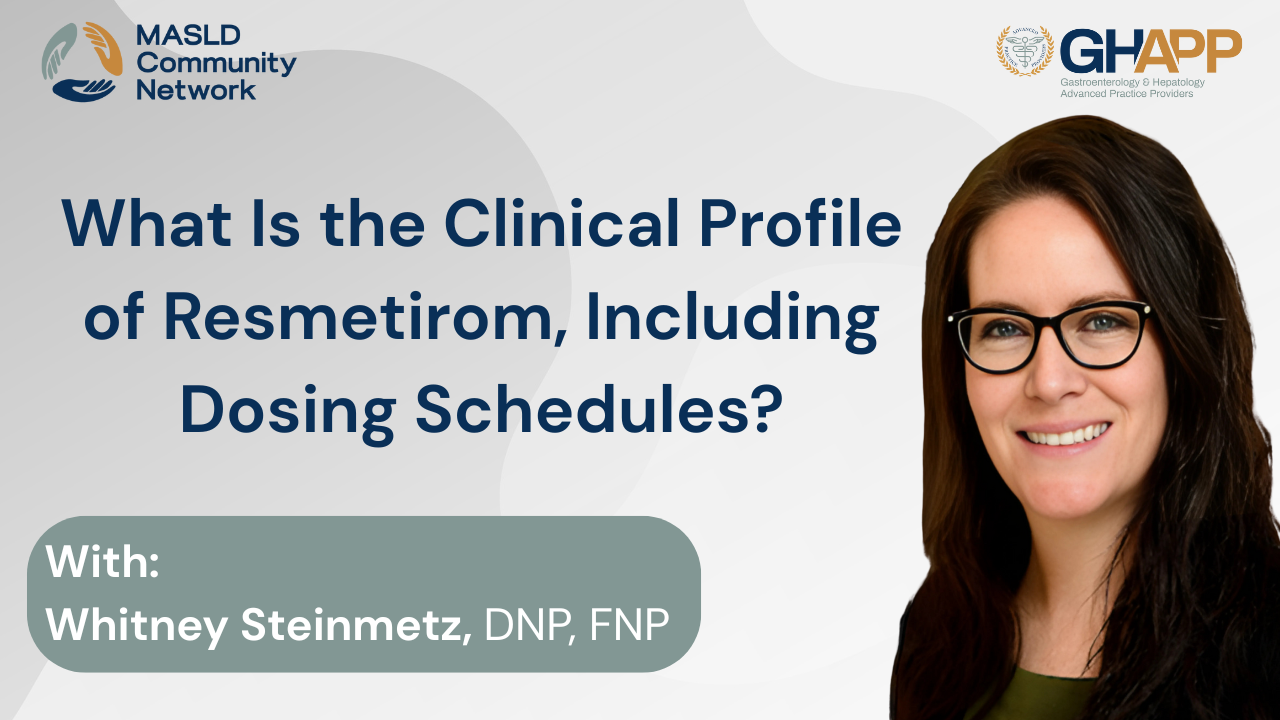
What is the clinical profile of Resmetirom, including dosing schedules?

Thank you to Madrigal for sponsoring this Medication Review Video Module! In this GHAPP Medication Review Video Module, nurse practitioner Whitney Steinmetz discusses the clinical profile of Resmetirom, a thyroid hormone receptor beta agonist indicated for adults with metabolic-associated steatohepatitis (MASH) and moderate to advanced liver fibrosis. Whitney explores the mechanism of action, dosage recommendations, and the dual primary endpoint success of Resmetirom in clinical trials. She highlights key considerations, including drug interactions and common side effects such as nausea and diarrhea, and how they are generally well-tolerated over time. Learn more about Resmetirom's impact on liver health and patient care by visiting the GHAPP website or app.
Watch Now
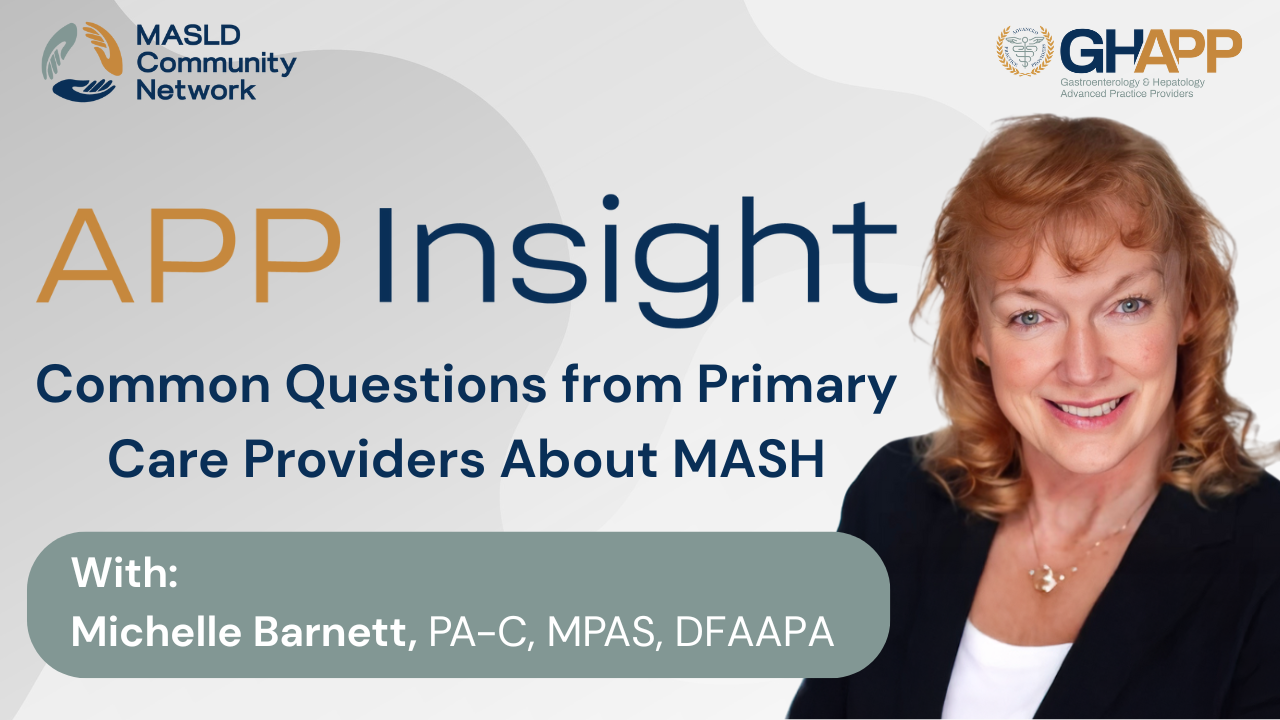
APP Insight: Common Questions from Primary Care Providers About MASH

In this informative video, Michelle Barnett, PA-C, a hepatology expert based in Colorado Springs, answers frequently asked questions about elevated liver enzymes in the context of MASH (Metabolic Dysfunction–Associated Steatohepatitis) and MASLD (Metabolic Dysfunction–Associated Steatotic Liver Disease). She breaks down how to interpret common liver enzyme patterns—such as ALT greater than AST versus AST greater than ALT—and what these patterns may indicate, from MASH to alcohol-related liver disease and other potential causes like autoimmune hepatitis or drug-induced liver injury. Michelle outlines how to perform a thorough workup, including patient history, medication review, and physical exam findings, and emphasizes the importance of using tools like FIB-4 and abdominal ultrasound to assess for fibrosis and portal hypertension. The discussion also covers the clinical value of GGT, alkaline phosphatase, bilirubin, albumin, and platelets in evaluating liver function. Michelle shares practical guidance on when to refer patients to hepatology and how to monitor liver enzymes over time, particularly in those undergoing lifestyle changes or pharmacologic treatment. This comprehensive Q&A is an essential resource for providers managing patients with suspected or confirmed metabolic liver disease.
Watch Now

Updates On Approved Treatments for MASH

Join Robin Soto, NP, for an engaging session at the MASH Boot Camp during the 2024 GHAPP National Conference as she provides updates on improved treatments for metabolic-associated steatohepatitis (MASH). Robin dives into the mechanisms of action, key clinical data, and prescribing guidelines for current therapies, including groundbreaking updates from the MAESTRO-NASH study. She also explores the game-changing potential of FDA-approved therapies like Resmetirom, offering insights into its efficacy, safety, and impact on patients with at-risk fibrosis.
Watch Now

Defining, Diagnosing, & Treating MASH

Join Jordan Mayberry, PA-C, for an insightful video from the MASH Boot Camp at the 2024 GHAPP National Conference. Jordan covers the latest advancements in diagnosing metabolic-associated steatohepatitis (MASH). She provides a comprehensive overview of the evolution of MASH terminology, the diagnostic criteria, and the critical role of patient history in identifying steatosis. Discover how metabolic risk factors, genetic predispositions, and alcohol consumption influence disease progression. Jordan also explores the importance of non-invasive diagnostic tools, when to consider liver biopsies, and how to differentiate MASH from other liver conditions. Perfect for healthcare professionals seeking to refine their approach to liver disease management.
Watch Now

Management of Lifestyle Modification

This video focuses on the comprehensive management of patients with metabolic-associated steatohepatitis (MASH), emphasizing lifestyle modifications, dietary adjustments, and exercise strategies. Key topics include the importance of addressing risk factors like diet, exercise habits, and alcohol intake, as well as referrals to medically supervised weight loss clinics or bariatric surgery for advanced cases. The speaker highlights the benefits of the Mediterranean diet, intermittent fasting, and avoiding ultra-processed foods while discussing the role of resistance training to combat sarcopenia and maintain muscle mass. Practical advice and tailored recommendations ensure a holistic approach to managing MASH and improving patient outcomes.
Watch Now

Third Step of Lifestyle Management

This video provides a comprehensive overview of emerging pharmacologic treatments for metabolic-associated steatohepatitis (MASH) and their tailored applications based on patient profiles. Topics include FDA-approved therapies, drugs in advanced clinical trials (such as semaglutide and lanifibranor), and the potential for combination treatments targeting both steatohepatitis and fibrosis. The speaker emphasizes the importance of patient-specific approaches considering metabolic profiles, obesity, and diabetes status, alongside lifestyle interventions. Additionally, the video discusses the evolving interdisciplinary care model and highlights the exciting progress in non-invasive testing and treatment advancements for F2-F3 fibrosis.
Watch Now

Approved Medication for MASH/NASH

This video provides detailed guidance on selecting and monitoring patients for emerging therapies targeting advanced fibrosis (F2-F3) in NASH. Key topics include contraindications for patients with cirrhosis, considerations for concomitant medications, and dose adjustments for statins. The video outlines ideal candidates based on specific thresholds for VCTE, MRE, ELF scores, and other non-invasive tests while emphasizing the importance of ruling out portal hypertension and other liver diseases. It also reviews a stepwise monitoring approach, focusing on tolerability at three months and efficacy assessments at six and twelve months, with an emphasis on histologic and non-invasive test improvements.
Watch Now

Types of Diet for the Treatment of MASLD

This video explores comprehensive strategies for managing metabolic-associated steatohepatitis (MASH), focusing on fibrosis risk stratification, lifestyle modifications, and pharmacologic interventions. Learn about dietary recommendations like the Mediterranean diet, exercise guidelines emphasizing resistance training, and the role of intermittent fasting and processed food avoidance. The video also highlights weight loss targets, diabetes management, and emerging therapies such as GLP-1 receptor agonists and bariatric surgery, all aimed at improving liver health and patient outcomes.
Watch Now

NITs to Identify High Risk MASH Patients

Explore advancements in non-invasive diagnostics and risk stratification for liver fibrosis and MASH. This video highlights tools like FIB-4, transient elastography, and innovative scoring systems (e.g., FAST and Agile) to identify and predict outcomes for high-risk patients. Learn about serum biomarkers, updated guidelines, and the role of lifestyle interventions alongside targeted therapies for managing metabolic risks and advancing care in hepatology.
Watch Now

A Phase 3, Randomized, Controlled Trial of Resmetirom in MASH with Liver Fibrosis

Thank you to Madrigal for sponsoring this Journal Club Video Module! In this GHAPP Journal Club review, Lisa Richards, a board-certified family nurse practitioner specializing in hepatology at UC San Diego Health, presents pivotal research from a February 2024 New England Journal of Medicine publication. The phase 3 randomized controlled trial evaluated the efficacy of Resmetirom, the first FDA-approved therapy for non-alcoholic steatohepatitis (NASH) with moderate to advanced liver fibrosis. Lisa discusses key findings from the study, including improvements in liver fibrosis and NASH resolution in patients treated with Resmetirom compared to placebo. Join her for an in-depth look at this groundbreaking therapy and its impact on patient care.
Watch Now
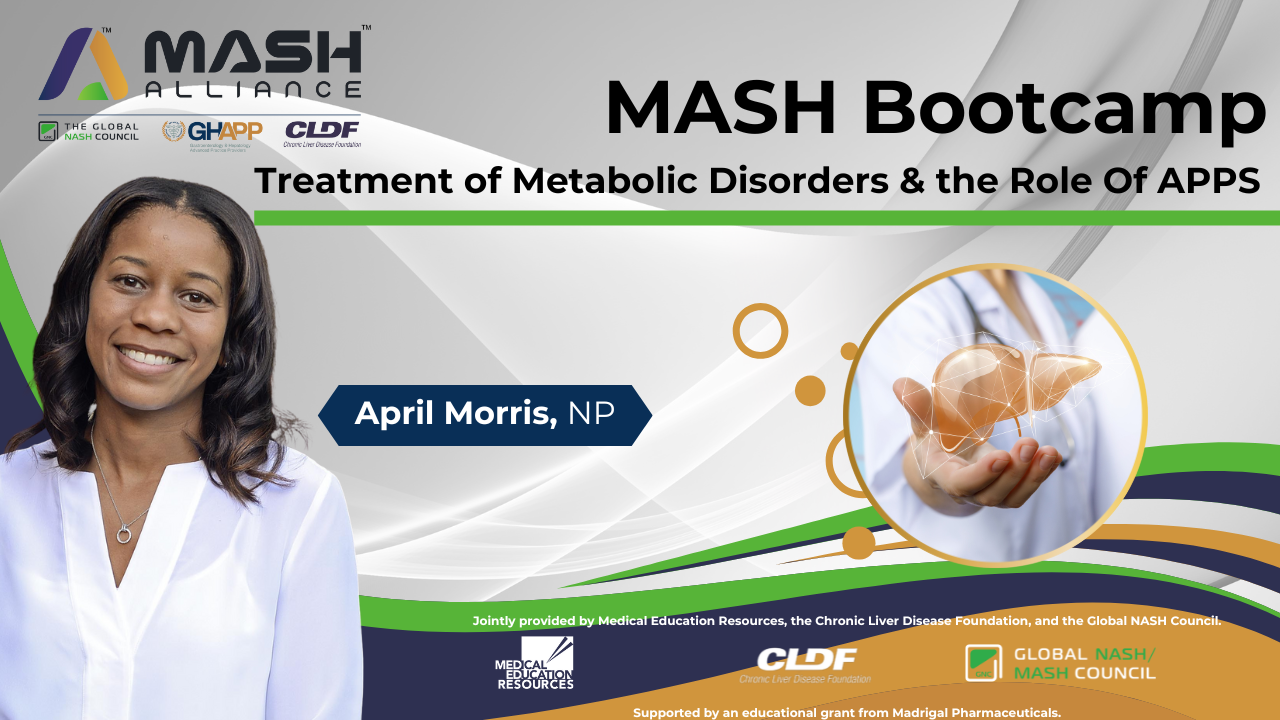
Treatment of Metabolic Disorders and the Role of APPs in MASH

In this video, April Morris, NP, a specialist in hepatology and endocrinology, discusses the comprehensive management of metabolic syndrome and the critical role of advanced practice providers (APPs) in optimizing patient care. With a multidisciplinary approach, she highlights the importance of weight management, medication selection, and addressing comorbidities such as hypertension, hyperlipidemia, and diabetes to improve metabolic-associated steatohepatitis (MASH) and overall health outcomes. April explores various weight loss medications, including GLP-1 receptor agonists and older alternatives, while emphasizing the need for personalized treatment plans that consider insurance coverage and patient history. She also discusses obesogenic medications that contribute to weight gain and suggests safer alternatives that are weight-neutral or promote weight loss. Managing comorbidities is another key focus, as she explains the importance of blood pressure, cholesterol, and diabetes control in reducing cardiovascular risks. Additionally, she stresses the impact of lifestyle modifications, including diet, exercise, and behavioral interventions, for long-term success. Throughout the discussion, April provides clinical insights into medication-induced weight gain, the barriers to accessing newer treatments, and why collaborative care across specialties, including primary care, endocrinology, hepatology, and bariatric surgery, is essential for effective disease management. For more expert insights, visit RhAPP.org and explore the RhAPP ACE 2.0 App for the latest digital education in metabolic and rheumatologic care.
Watch Now

MASH Bootcamp Q&A

In this interactive Q&A session, a panel of liver disease experts discusses key challenges in diagnosing and treating metabolic dysfunction-associated steatohepatitis (MASH) using non-invasive testing and the latest therapeutic advancements. The panel explores the role of FibroScan, ELF scores, and cardiometabolic risk factors in diagnosing fibrosis, especially in patients with limited access to MRI or VCTE-based assessments. They also discuss how serologic testing can be a viable alternative in resource-limited settings and when a liver biopsy may not be necessary for diagnosis. The discussion highlights the FDA approval criteria for Resmetirom, its limitations in F4 patients, and practical strategies for determining treatment eligibility. The experts address real-world challenges, including diagnosing MASH in rural areas, evaluating confounding factors in fibrosis assessment, and ensuring comprehensive liver disease workups to rule out autoimmune conditions.
Watch Now

Lifestyle Modifications for Patients With MASH

In this engaging presentation, Jonathan Yeh, PA, from the Center for Liver Disease and Transplantation at Columbia University, explores the critical role of lifestyle modifications in managing metabolic dysfunction-associated steatohepatitis (MASH). He breaks down the pathogenesis of MASH, explaining how obesity, diabetes, and metabolic dysfunction drive disease progression from steatosis to fibrosis and cirrhosis, and why weight loss and exercise are essential for reversing liver damage. Jonathan highlights the impact of dietary interventions, including the Mediterranean diet, low-carb approaches, and ketogenesis, while emphasizing the importance of calorie restriction over simply eliminating certain food groups. He also discusses the role of exercise, comparing the effectiveness of aerobic training, resistance training, and high-intensity interval training (HIIT) for improving liver health. Surprisingly, research suggests that resistance training may be just as beneficial as aerobic exercise while being more accessible to patients with physical limitations. The discussion also touches on the latest weight loss treatments, including GLP-1 receptor agonists like semaglutide and tirzepatide, which are rapidly transforming obesity management. However, Jonathan underscores that medications alone are not a solution—sustainable lifestyle changes remain the foundation of MASH treatment.
Watch Now

Identifying & Diagnosing MASH Patients with Non-Invasive Tests

In this informative session, Lisa Richards, NP, a hepatology expert from UC San Diego Healthcare, explores how non-invasive tests (NITs) can effectively diagnose metabolic dysfunction-associated steatohepatitis (MASH) and fibrosis without the need for a liver biopsy. She discusses the role of imaging and blood-based biomarkers, such as FibroScan, MRE, ELF, and FIB-4, in identifying patients with stage 2 or higher liver fibrosis and highlights their clinical applications in real-world settings. Lisa walks through a detailed case study, demonstrating how to interpret non-invasive test results, assess risk stratification, and make confident diagnostic decisions using combined NITs like FAST, MEFIB, and MAST scores. She also addresses key limitations of FibroScan and MRI elastography, including BMI constraints, insurance coverage challenges, and patient-specific factors like claustrophobia. Additionally, Lisa introduces clinical care pathways from leading hepatology organizations, explaining how primary care providers and specialists can collaborate to monitor and manage at-risk MASH patients. She emphasizes that, with modern non-invasive tools, biopsies are no longer necessary for diagnosing most MASH patients, enabling earlier intervention and improved patient outcomes.
Watch Now
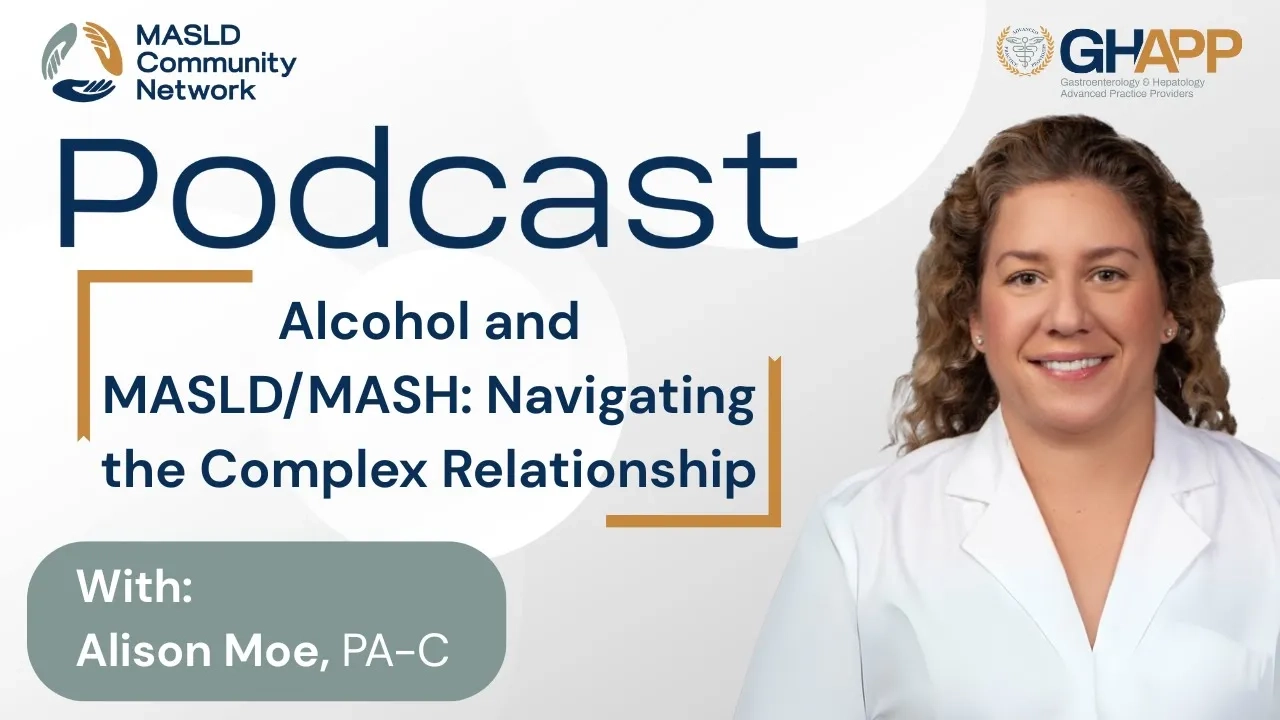
Alcohol and MASLD/MASH: Navigating the Complex Relationship

In this insightful session from the GHAPP MASLD Community Network, Alison Moe, PA-C, dives into the complex and often misunderstood relationship between alcohol use and metabolic dysfunction–associated steatotic liver disease (MASLD). Drawing from clinical experience, Alison explains why accurately screening, quantifying, and discussing alcohol consumption with patients is essential to understanding disease progression, treatment eligibility, and overall liver health. She outlines how continued alcohol use can alter liver function tests (LFTs), confound noninvasive test results, and affect candidacy for emerging MASH pharmacotherapies. Viewers will learn how to approach sensitive conversations about drinking habits without stigma, interpret AASLD alcohol threshold guidelines, and apply effective counseling strategies for patients with combined alcohol-related and metabolic liver disease. Alison also discusses the role of PEth urine testing, lifestyle counseling, and the importance of complete abstinence for those with advanced fibrosis. This educational talk provides clinicians with actionable insights to support patients in improving their metabolic and liver health through honest communication, behavioral change, and evidence-based management.
Watch Now
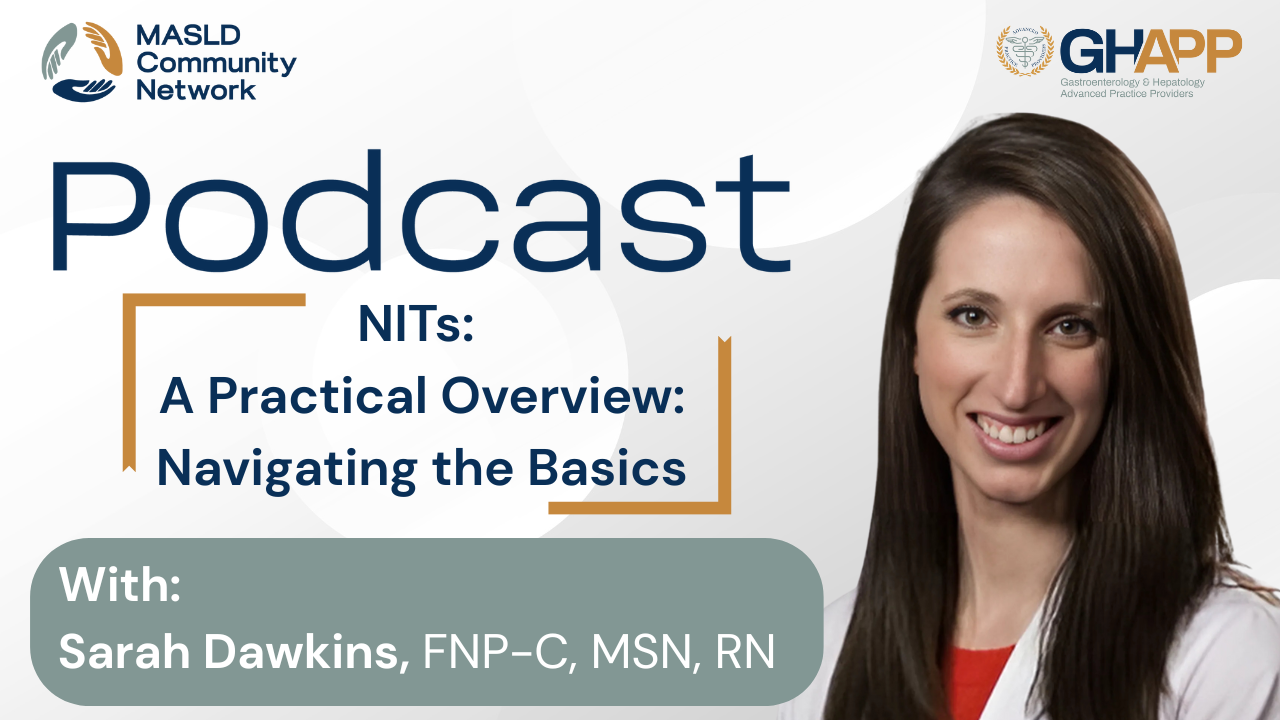
NITs: A Practical Overview: Navigating the Basics

Learn how non-invasive testing (NITs) is transforming fibrosis assessment in patients with MASLD and MASH. In this educational talk, Sarah Dawkins, NP, from Duke University Liver Clinic, breaks down the differences between simple steatosis (MASLD) and steatohepatitis (MASH), explains when and how to use serum-based tests like FIB-4 and ELF, and explores the advantages and limitations of imaging tests such as FibroScan and MRI elastography. Discover how to interpret results, avoid false positives, and determine when hepatology referral or biopsy is needed. Perfect for clinicians managing metabolic liver disease and looking to integrate non-invasive testing into everyday practice.
Watch Now
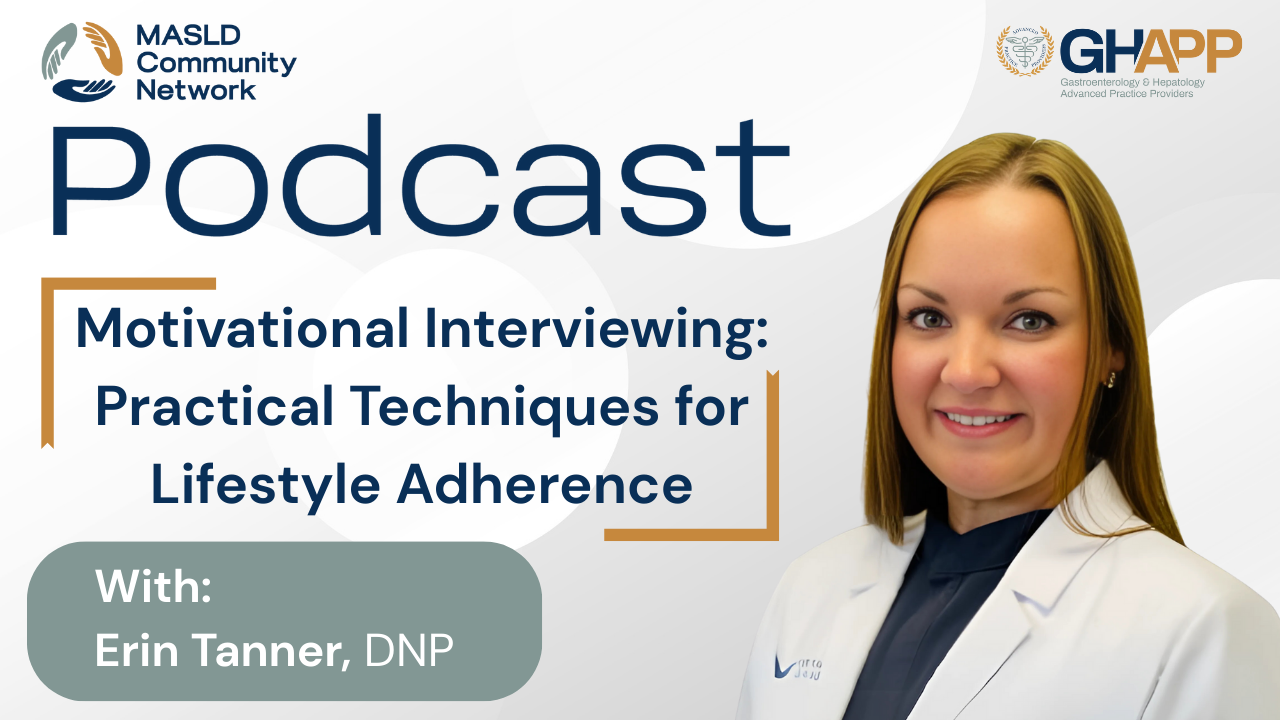
Motivational Interviewing: Practical Techniques For Lifestyle Adherence

In this engaging session from the GHAPP MASLD Community Network, Erin Tanner, DNP, from Gastro Health in Birmingham, Alabama, discusses how motivational interviewing can empower patients with fatty liver disease to make meaningful lifestyle changes. Drawing from over 14 years of experience in hepatology and gastroenterology, Erin explains how a collaborative, patient-centered approach can improve adherence to diet, exercise, and weight management plans. Using the RULE framework—Resist the righting reflex, Understand motivation, Listen with empathy, and Empower the patient—she demonstrates practical ways to foster trust and promote behavior change without judgment. Erin also introduces the SMART goals method (Specific, Measurable, Achievable, Relevant, Time-bound), guiding clinicians on how to set realistic, personalized goals that patients can achieve and sustain. Through reflective listening, affirmation, and consistent follow-up, providers can help patients overcome ambivalence, build confidence, and stay motivated on their journey to better liver and metabolic health.
Watch Now
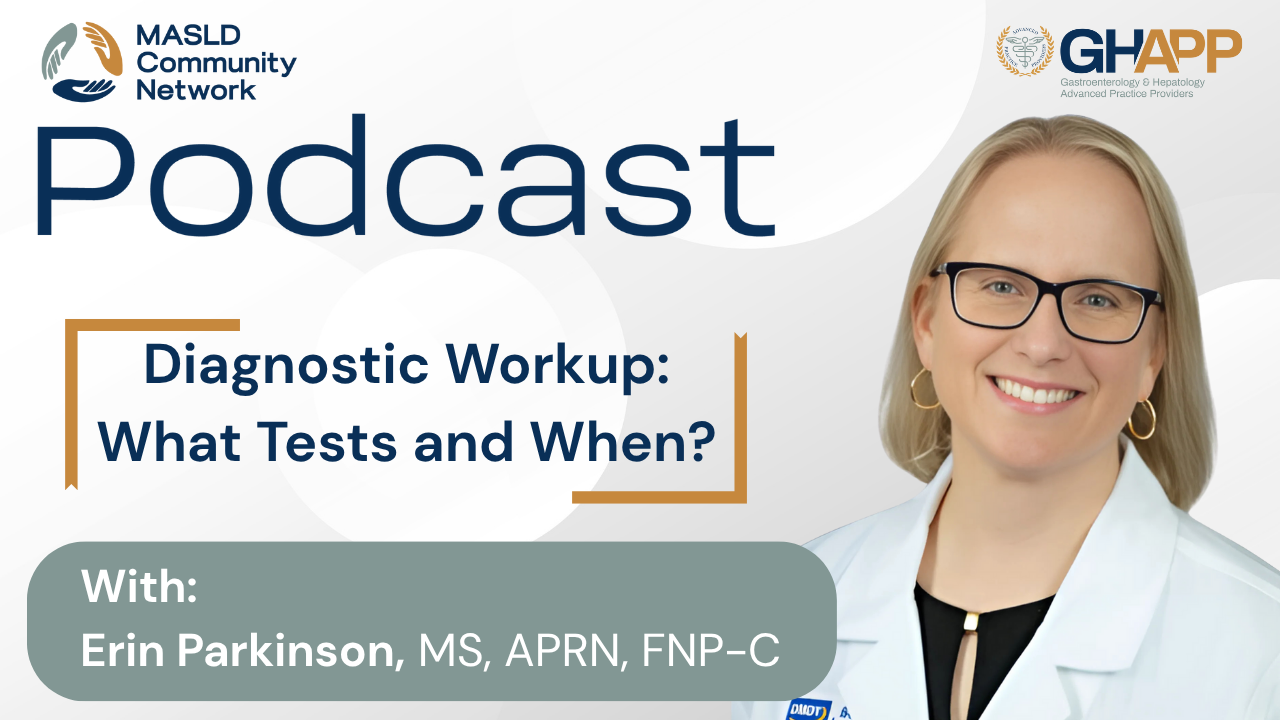
Diagnostic Workup: What Tests and When?

In this educational session from the GHAPP MASLD Community Network, Erin Parkinson, APRN, from the Transplant Institute at Tampa General Medical Group, provides a detailed walkthrough of the diagnostic workup for metabolic dysfunction–associated steatotic liver disease (MASLD) and metabolic dysfunction–associated steatohepatitis (MASH). With experience in both general and transplant hepatology, Erin explains how to identify and evaluate patients at risk—beginning with key metabolic risk factors such as obesity, diabetes, and hypertension, and moving through the essential steps of imaging, laboratory testing, and fibrosis assessment. Viewers will learn when and how to use tools like ultrasound, FIB-4, FibroScan, ELF testing, and MR elastography to differentiate mild disease from advanced fibrosis or cirrhosis. Erin also emphasizes the importance of quantifying alcohol intake, ruling out viral, autoimmune, and genetic liver diseases, and applying risk stratification to determine appropriate follow-up and hepatology referral. This comprehensive overview equips APPs and clinicians with the practical framework needed to confidently diagnose, stage, and monitor MASLD and MASH, while incorporating HCC screening and long-term management strategies for high-risk patients.
Watch Now
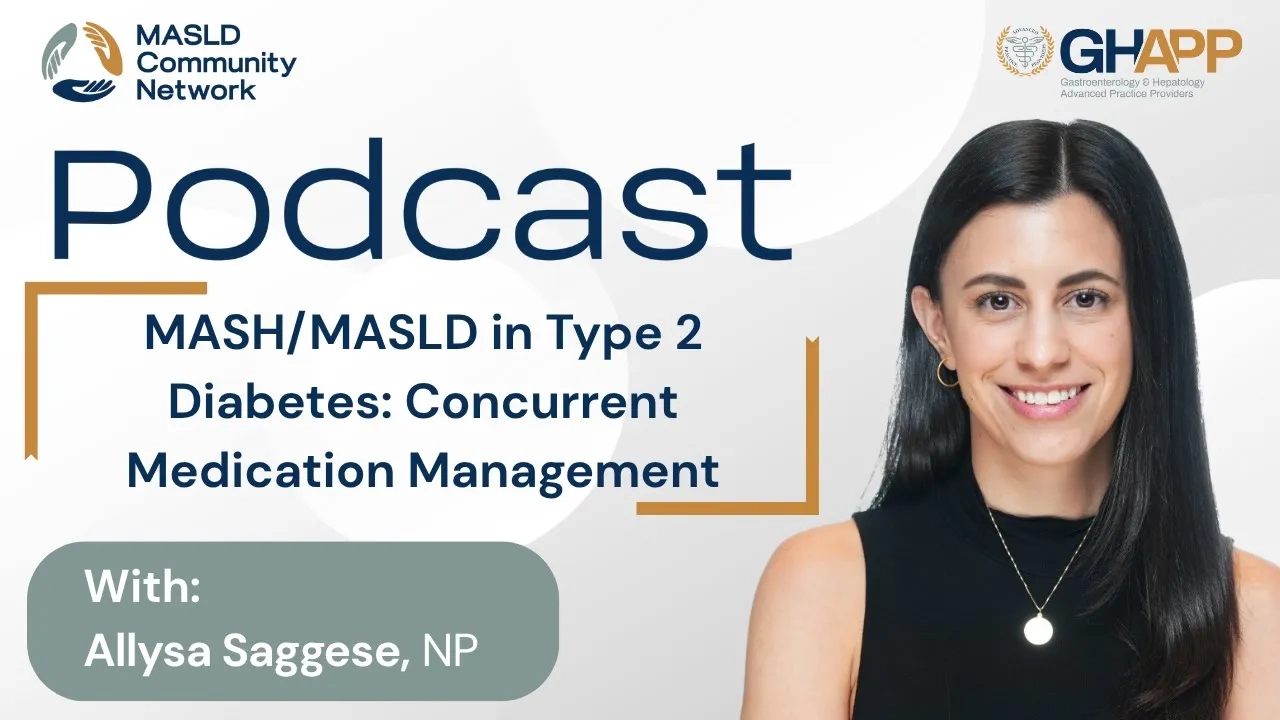
MASH/MASLD in Type 2 Diabetes: Concurrent Medication Management

In this in-depth educational discussion from the GHAPP MASLD Community Network, Allysa Saggese, NP, from Weill Cornell Medicine in New York City, explores the critical intersection between type 2 diabetes, metabolic dysfunction–associated steatotic liver disease (MASLD), and metabolic dysfunction–associated steatohepatitis (MASH). Allysa explains why patients with diabetes are at higher risk for developing MASH and advanced fibrosis, detailing how insulin resistance, excess glucose, and fat accumulation drive inflammation and liver damage. She reviews the most common diabetes medication classes—including metformin, GLP-1 receptor agonists, SGLT2 inhibitors, TZDs (pioglitazone), and DPP-4 inhibitors—and discusses their impact on liver fat, inflammation, and fibrosis, highlighting which options offer the most dual benefit for both glycemic and liver health. Viewers will learn how to approach medication selection and sequencing, when to use caution in cirrhosis or decompensated liver disease, and how to tailor treatment to each patient’s metabolic profile. With clear clinical reasoning and practical insights, Allysa provides a concise roadmap for optimizing diabetes management in patients with MASLD and MASH—balancing glycemic control, liver protection, and overall metabolic wellness.
Watch Now
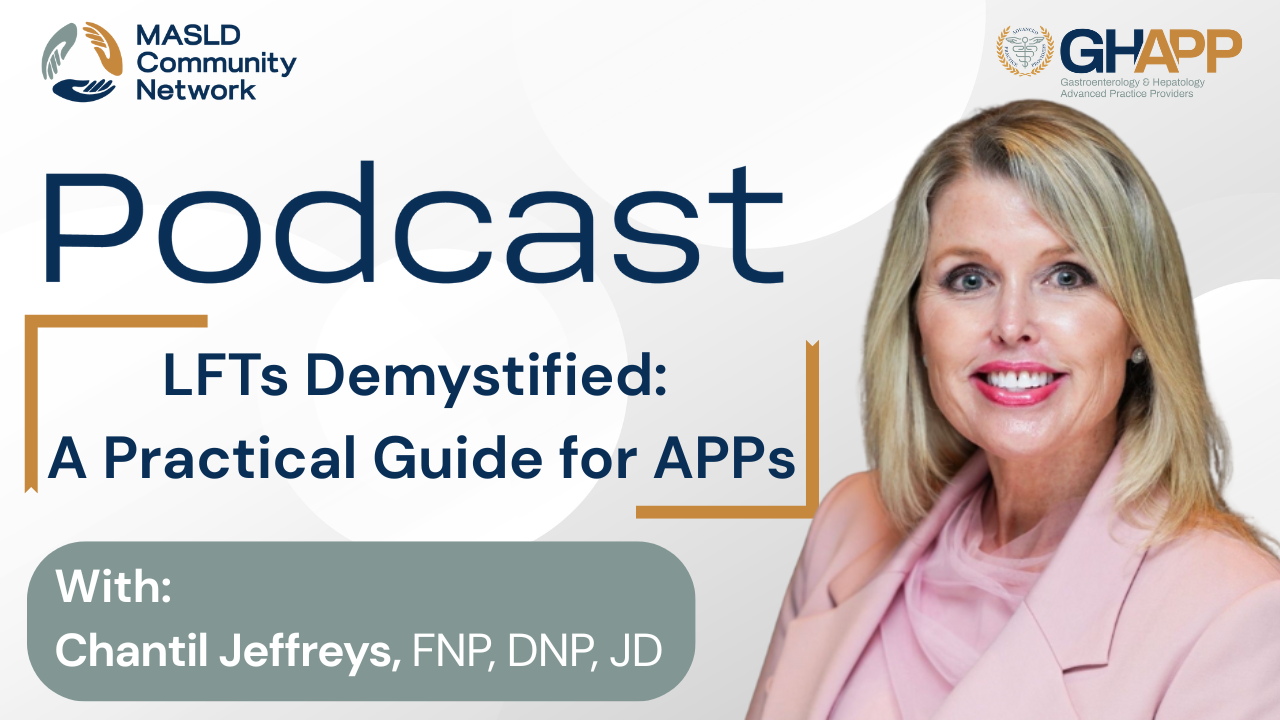
LFTs Demystified: A Practical Guide for APPs

In this episode of Liver Functions Demystified, Chantil Jeffreys, FNP from Gastro One in Memphis, Tennessee, shares a practical guide for interpreting liver enzyme results and identifying when to evaluate patients for MASLD (metabolic dysfunction–associated steatotic liver disease) and MASH (metabolic dysfunction–associated steatohepatitis). Drawing from 24 years of clinical experience, she explains how to recognize key patterns such as persistent ALT and AST elevations, the significance of ALT being higher than AST in early MASH, and why associated metabolic risk factors—like type 2 diabetes, obesity, hypertension, and hyperlipidemia—make even mild elevations clinically important. Chantil also reviews the role of other markers including GGT, alkaline phosphatase, bilirubin, albumin, and INR in assessing disease severity and progression. She highlights how to differentiate MASH from alcohol-associated liver disease, viral hepatitis, and drug-induced liver injury, and underscores the importance of serial monitoring to track improvement or progression. This video offers a clear, practical framework for clinicians, APPs, and primary care providers to better evaluate and manage patients with liver disease in everyday practice.
Watch Now

NITs: A Practical Overview: Navigating the Basics

Join Renee Pozza, a hepatology nurse practitioner with more than 25 years of experience, as she breaks down the essentials of non-invasive testing and fibrosis assessment in patients with metabolic-associated steatotic liver disease (MASLD) and metabolic-associated steatohepatitis (MASH). In this educational session, Renee reviews how to identify patients early, interpret key laboratory scores such as FIB-4 and ELF, and apply imaging tools like FibroScan® and MRE to evaluate liver fat and fibrosis. Learn how to distinguish simple steatosis from progressive fibrosis, recognize markers of advanced liver disease, and integrate non-invasive tests into clinical workflows across primary care, GI, endocrinology, and hepatology settings. Renee also highlights when to consider pharmacologic interventions—including resmetirom and GLP-1 therapies—and when to refer to hepatology for advanced fibrosis or cirrhosis. For more expert-led resources on MASLD, MASH, and liver health, visit the MASLD Community Network to access webinars, clinical insights, and continuing education for advanced practice providers.
Watch Now
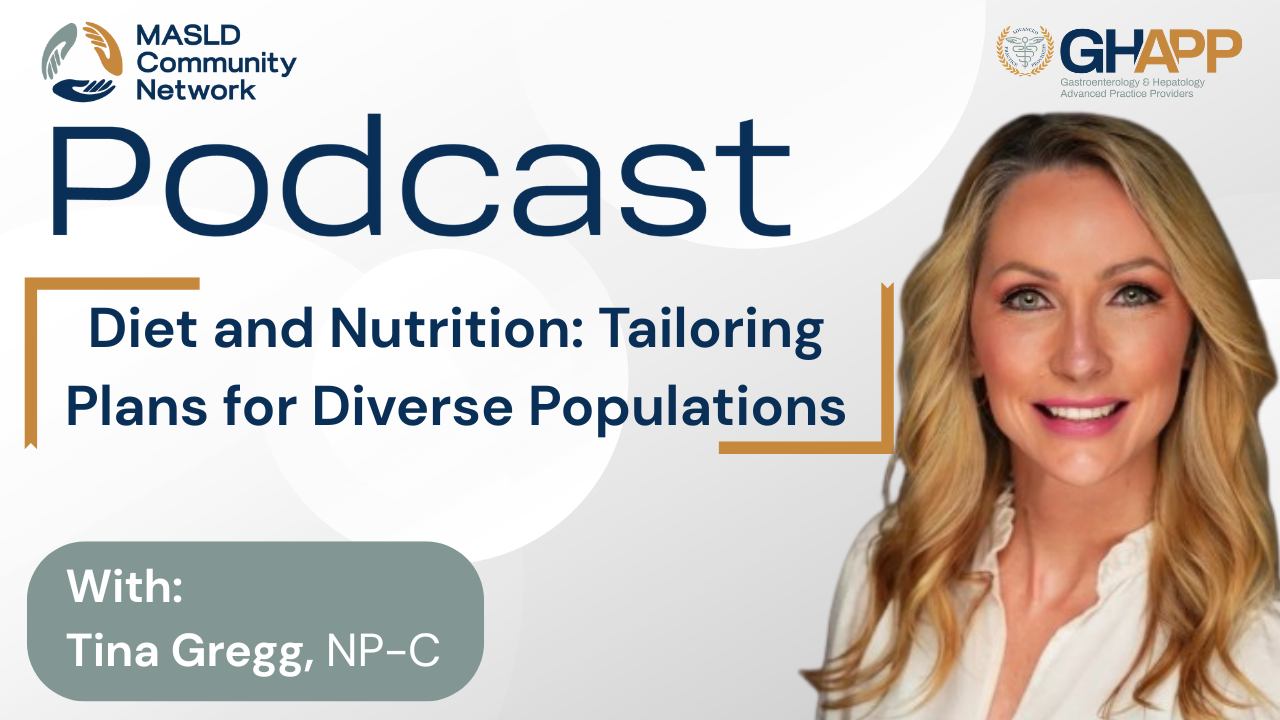
Diet and Nutrition: Tailoring Plans For Diverse Populations

In this presentation, Tina Gregg, NP-C, from GI Associates, shares practical, evidence-based strategies for nutrition and lifestyle management in MASLD and MASH. With nearly two decades of experience caring for patients with liver disease, Tina emphasizes that lasting improvement requires more than telling patients to “lose weight”—it calls for tailored, culturally sensitive, and sustainable dietary guidance. She explores data supporting the Mediterranean diet, DASH diet, low- and moderate-carbohydrate approaches, intermittent fasting, and plant-based eating, detailing how each can reduce liver fat, improve insulin sensitivity, and decrease inflammation. Tina also discusses how to adapt these principles for patients’ cultural preferences, socioeconomic barriers, and comorbidities such as diabetes, CKD, and hyperlipidemia. This session, part of the GHAPP MASLD & MASH Community Network, highlights how APPs can guide patients toward realistic dietary changes that enhance both liver and metabolic health.
Watch Now
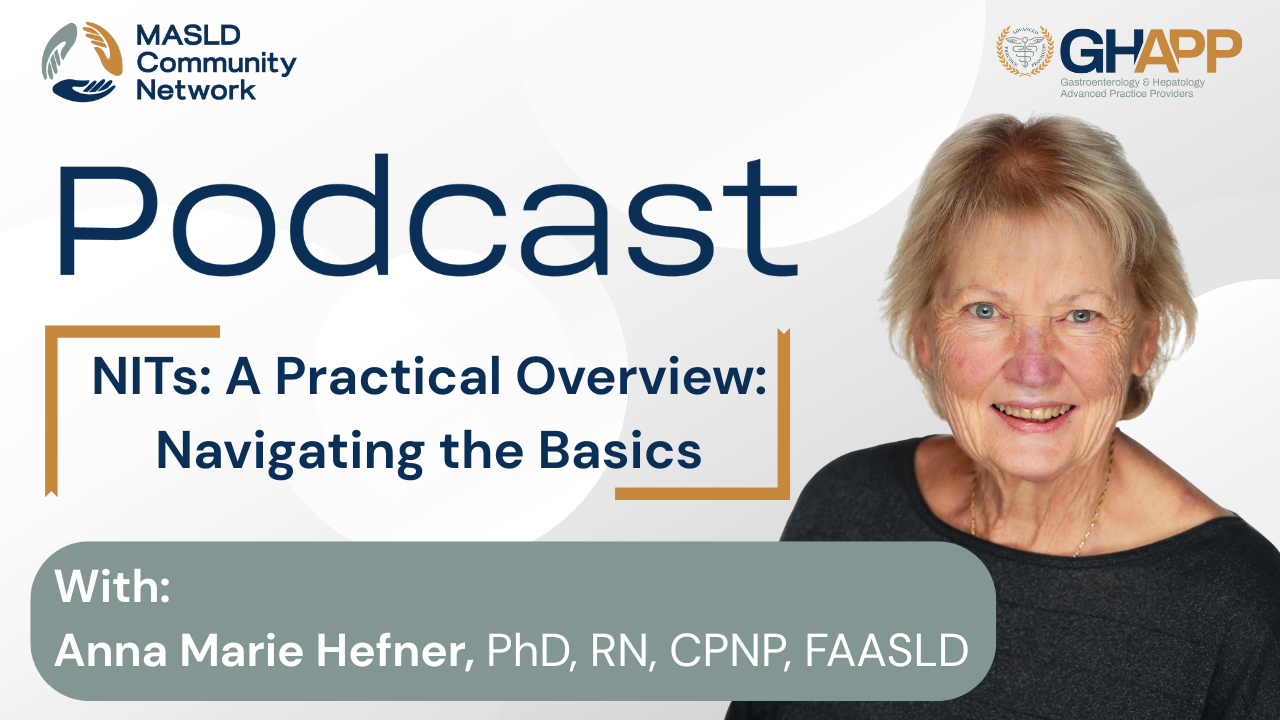
NITs: A Practical Overview: Navigating the Basics

In this informative session, Anna Marie Hefner, CPNP, a hepatology nurse practitioner at the Southern California Liver and GI Center, shares her 15+ years of experience managing patients with MASLD (Metabolic Associated Steatotic Liver Disease) and MASH (Metabolic Associated Steatohepatitis). She explains how her clinic has created a collaborative, patient-centered approach—hosting dedicated fatty liver clinics that foster education, peer support, and lifestyle discussion among patients. Anna Marie walks viewers through how to distinguish between simple steatosis and MASH, emphasizing that proper diagnosis drives appropriate management—from lifestyle counseling and diet modification for early stages to medication and specialist referral for advanced fibrosis or cirrhosis. She offers a detailed overview of non-invasive tests (NITs) such as FIB-4, ELF, FibroScan, and MRI elastography, outlining how each test is performed, how to interpret key cutoff values, and when to refer patients to hepatology. She also highlights the importance of evaluating comorbidities, including cardiovascular and metabolic risk factors, medication history, and family health background, as part of comprehensive liver assessment. Finally, she encourages providers to follow AASLD and EASL guidelines, utilize collaborative care across specialties, and engage with professional APP organizations like GHAPP to stay current on evolving best practices in fatty liver disease management.
Watch Now
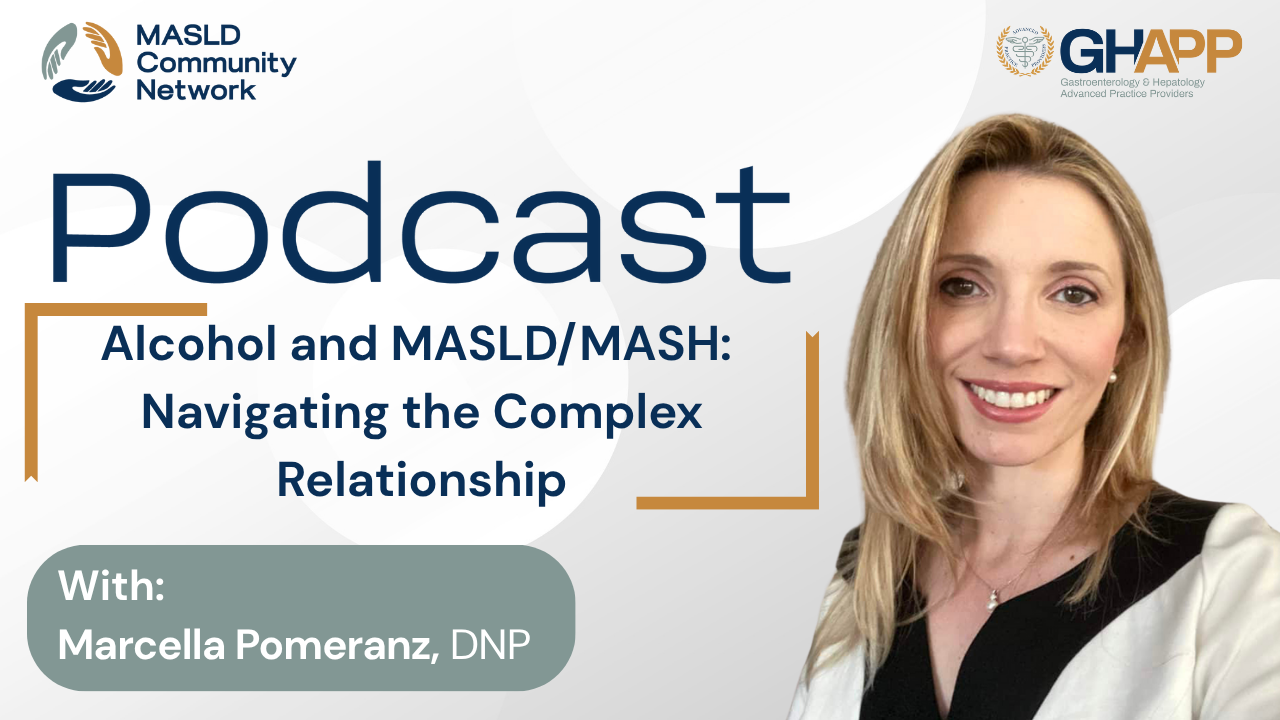
Alcohol and MASLD/MASH: Navigating the Complex Relationship

In this insightful presentation, Marcella Pomeranz, DNP, lead nurse practitioner at Digestive Associates in Las Vegas, shares practical strategies for managing patients with alcohol use and MASLD. Drawing on her experience leading a team of 12 APPs, Marcella explains how to effectively screen for alcohol consumption, build trust and openness with patients, and use tools like the AUDIT-C and phosphatidylethanol (PEth) testing to accurately assess alcohol intake and monitor progress. She highlights the synergistic relationship between alcohol and metabolic dysfunction, emphasizing how even low to moderate alcohol use can accelerate liver injury, fibrosis, and the progression to cirrhosis or hepatocellular carcinoma. Marcella breaks down the biological mechanisms behind this interaction—oxidative stress, inflammation, mitochondrial dysfunction, and increased gut permeability—and provides evidence-based advice on lifestyle modification, structured support programs such as AA and addiction medicine referrals, and potential roles for GLP-1 therapies in managing both metabolic and behavioral aspects. She also discusses the importance of interpreting non-invasive tests (NITs) like FibroScan and serum markers in the context of recent alcohol use, using them as motivational tools to show patients measurable improvement. This session offers real-world clinical guidance for APPs, GI providers, and hepatology teams working to reduce risk and optimize care for patients with alcohol-associated MASLD and MASH.
Watch Now
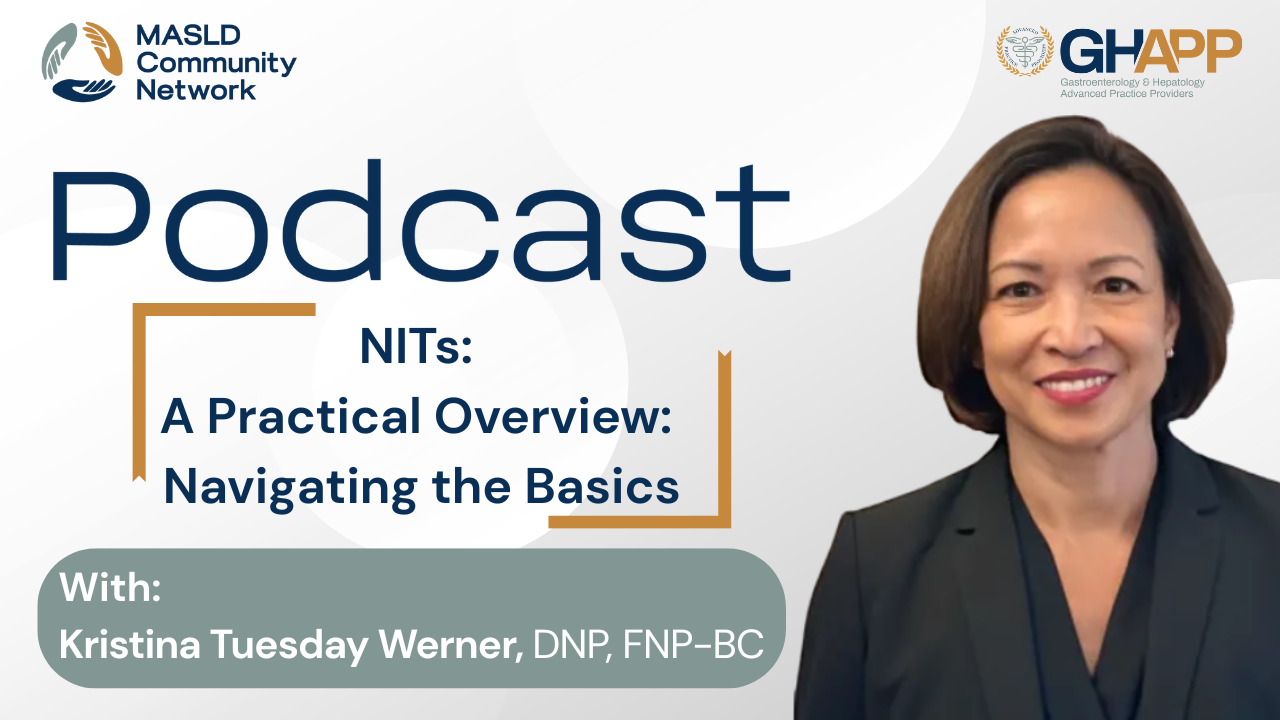
NITs: A Practical Overview: Navigating the Basics

In this educational session, Tuesday Werner, DNP, from Mayo Clinic Arizona, provides an in-depth overview of non-invasive testing (NITs) and their critical role in the diagnosis and management of MASLD (Metabolic Associated Steatotic Liver Disease) and MASH (Metabolic Associated Steatohepatitis). With over 20 years of experience in hepatology, she breaks down the fundamental differences between simple steatosis (MASLD) and inflammatory steatohepatitis (MASH), explaining why identifying fibrosis risk through non-invasive methods—such as FIB-4, NFS, ELF, FibroScan (VCTE), and MRE—is essential for guiding patient management, referrals, and surveillance. Tuesday discusses the strengths and limitations of serum-based vs. imaging-based NITs, emphasizing their complementary roles in evaluating fibrosis and preventing unnecessary biopsies. She also outlines how to integrate NIT results with patient history, comorbidities, and liver function tests to determine monitoring intervals and hepatology referrals. Viewers will learn key thresholds and cutoff values for interpreting FIB-4 and liver stiffness measurements, helping to stratify patients into low-, moderate-, and high-risk categories for advanced fibrosis or cirrhosis. This session underscores how NITs are transforming liver care—allowing for early detection, better patient stratification, and proactive management of MASLD and MASH through evidence-based, non-invasive approaches.
Watch Now
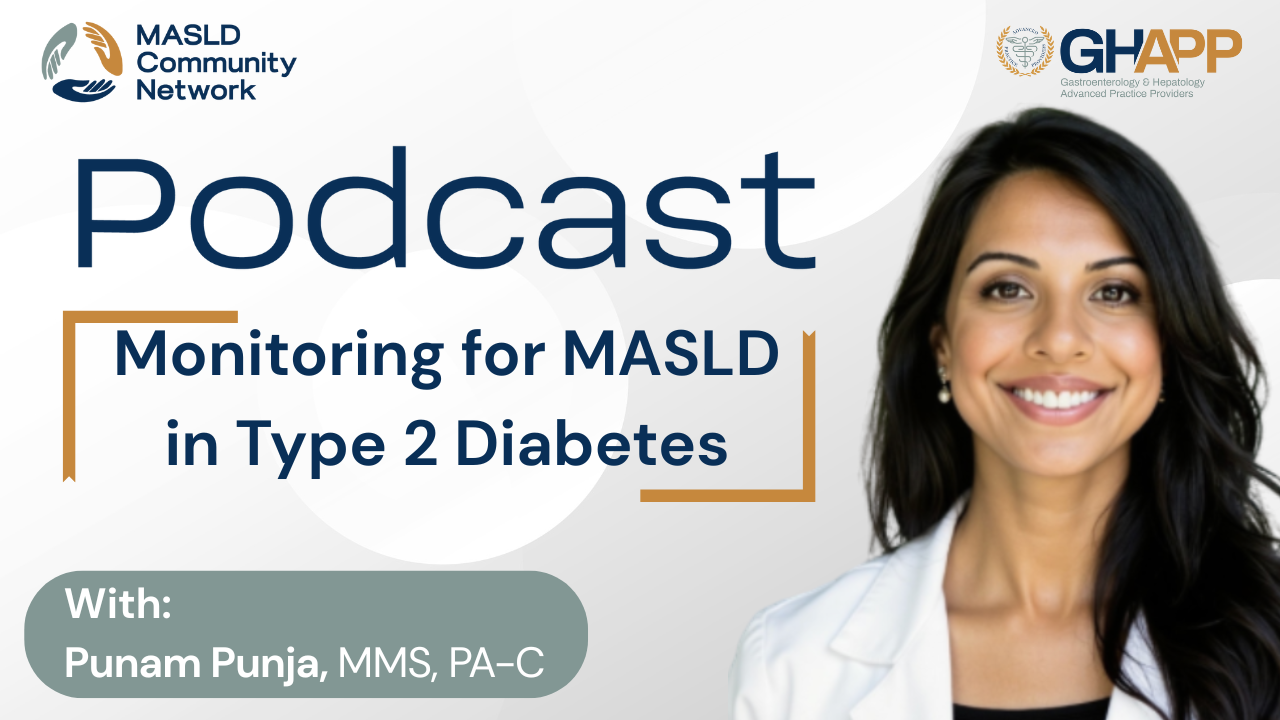
Monitoring for MASLD in Type 2 Diabetes

In this educational session, Punam Punja, MMS, PA-C, from Emory Healthcare in Atlanta, discusses the crucial connection between type 2 diabetes and MASLD (Metabolic Dysfunction–Associated Steatotic Liver Disease). With over 15 years of hepatology experience, Punam outlines a practical, evidence-based approach for screening and monitoring patients with type 2 diabetes who are at risk for MASH (Metabolic Associated Steatohepatitis). She explains how the American Diabetes Association (ADA) now recommends routine fibrosis screening using the FIB-4 index, a simple, non-invasive calculation that helps identify patients at risk for advanced fibrosis — the strongest predictor of liver-related outcomes. Punam breaks down risk thresholds, screening intervals, and the role of secondary assessments such as transient elastography or ELF testing. She also emphasizes the importance of patient education, noting that unlike diabetic complications such as retinopathy, MASH is often silent but reversible with lifestyle modification. As October marks National Liver Awareness Month, Punam encourages APPs to make liver screening a standard part of diabetes care.
Watch Now
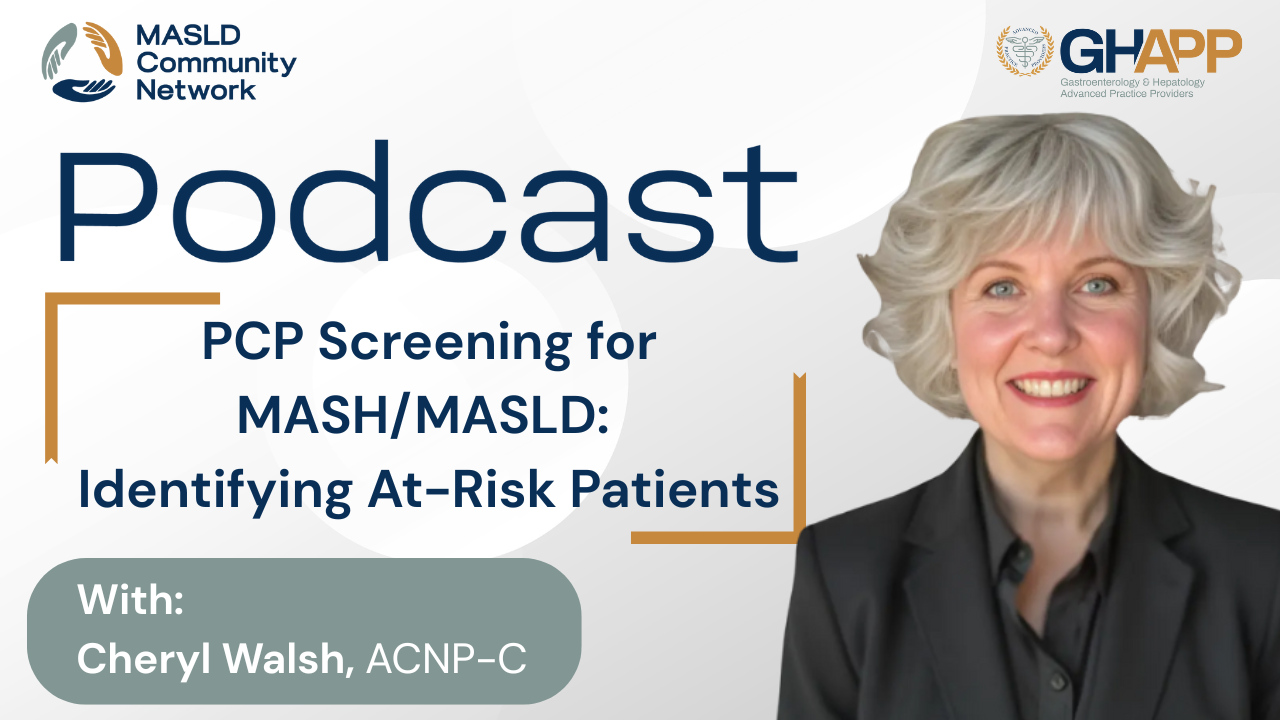
PCP Screening for MASH/MASLD: Identifying At-Risk Patients

In this educational video, Cheryl Walsh, ACNP-C, from GI Alliance in Arkansas, shares practical guidance on screening for MASH (Metabolic Associated Steatohepatitis) and MASLD (Metabolic Dysfunction–Associated Steatotic Liver Disease) in the primary care setting. Drawing from over 15 years of experience in gastroenterology, Cheryl highlights how nurse practitioners and advanced practice providers can efficiently identify at-risk patients—particularly those with type 2 diabetes, obesity, or cardiometabolic risk factors such as hypertension and elevated triglycerides. She explains how simple, validated tools like the FIB-4 index and ELF score can be incorporated into routine labs to detect early signs of fibrosis and liver disease progression. Cheryl also discusses communicating positive results, setting appropriate follow-up intervals, and empowering patients through lifestyle modifications and diet counseling. By streamlining screening into busy primary care workflows, clinicians can play a vital role in early detection and prevention of advanced liver disease.
Watch Now
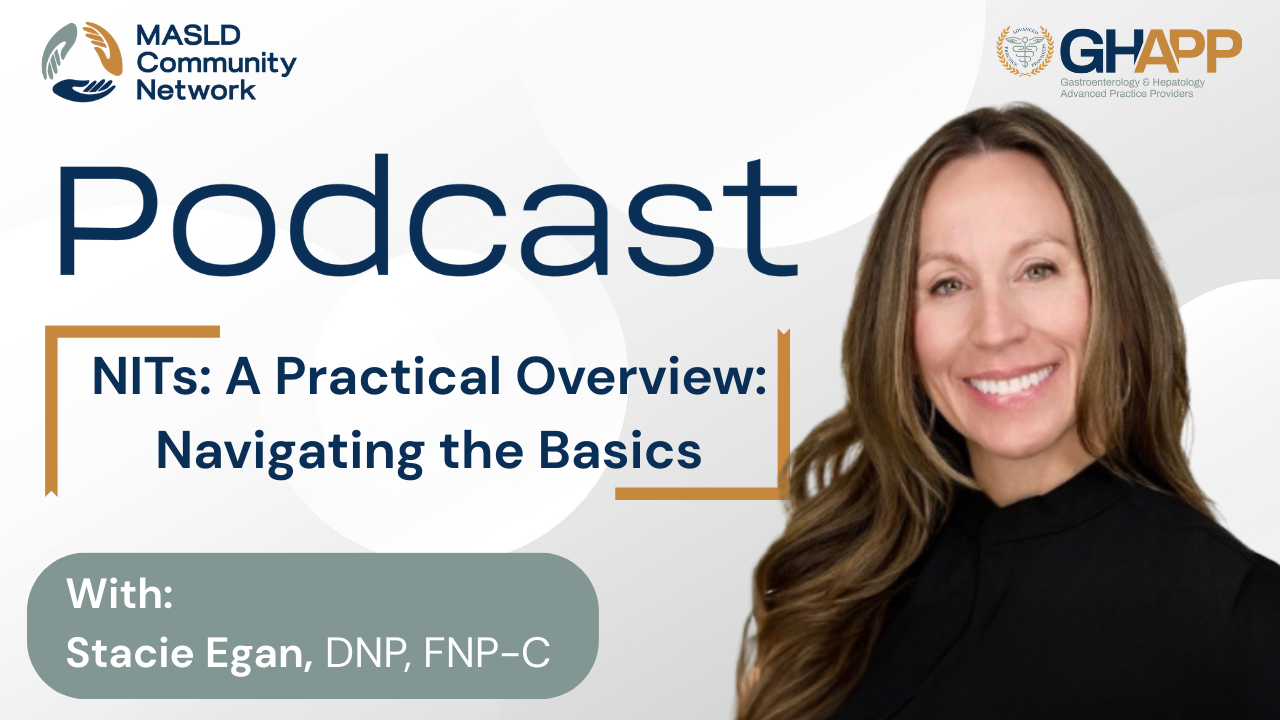
NITs: A Practical Overview: Navigating the Basics

In this educational session, Stacie Egan, NP, from Ogden Clinic Gastroenterology, explores the critical role of non-invasive testing (NITs) in diagnosing and managing MASLD (Metabolic Dysfunction–Associated Steatotic Liver Disease) and MASH (Metabolic Dysfunction–Associated Steatohepatitis). Stacy explains the key differences between MASLD—fat accumulation without active damage—and MASH, where inflammation and cellular injury drive fibrosis, cirrhosis, and hepatocellular carcinoma. Understanding this distinction is vital for early detection and intervention. This session also highlights how ALT levels, metabolic comorbidities, and alcohol use should influence decision-making, and why combining test results with clinical context ensures accurate risk stratification. Clinicians will learn how to use NITs not as standalone diagnostics, but as integrated puzzle pieces that drive earlier treatment with lifestyle modification and emerging pharmacotherapies for F2–F3 fibrosis. Perfect for APPs, NPs, and GIs managing patients with fatty liver disease, this video offers a clear roadmap to detect, monitor, and manage MASH with fibrosis—improving outcomes while minimizing invasive procedures.
Watch Now
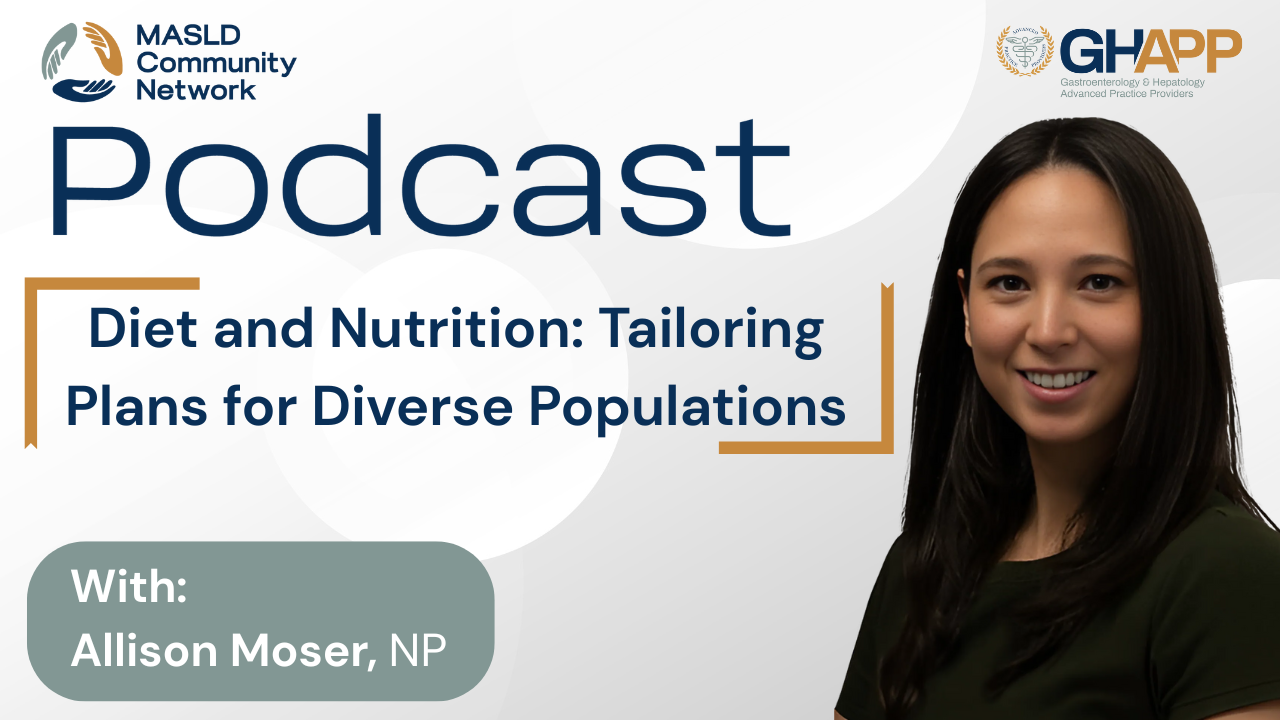
Diet and Nutrition: Tailoring Plans for Diverse Populations

In this episode, Allison Moser, NP, from Rush University Medical Center, dives into one of the most impactful aspects of MASH (Metabolic Dysfunction–Associated Steatohepatitis) management — diet and nutrition. While weight loss is often the starting point, Allison explains why sustainable liver health depends on personalized, culturally sensitive, and practical nutrition strategies. Learn how evidence-based eating patterns like the Mediterranean diet and plant-based diets can reduce hepatic steatosis, improve insulin sensitivity, and lower inflammation, even without weight loss. Allison shares actionable food swaps for diverse cultures, affordable ways to eat healthy when access is limited, and tailored recommendations for patients with comorbidities like diabetes, CKD, and cardiovascular disease. She also discusses the major role of added sugars, processed foods, and sugary or diet beverages in driving liver damage — and how to help patients make realistic, stepwise changes that last. Whether you’re an APP, NP, PA, or clinician treating patients with MASH or MASLD, this episode offers practical, evidence-based tools to improve nutrition counseling, build patient trust, and support long-term liver health.
Watch Now
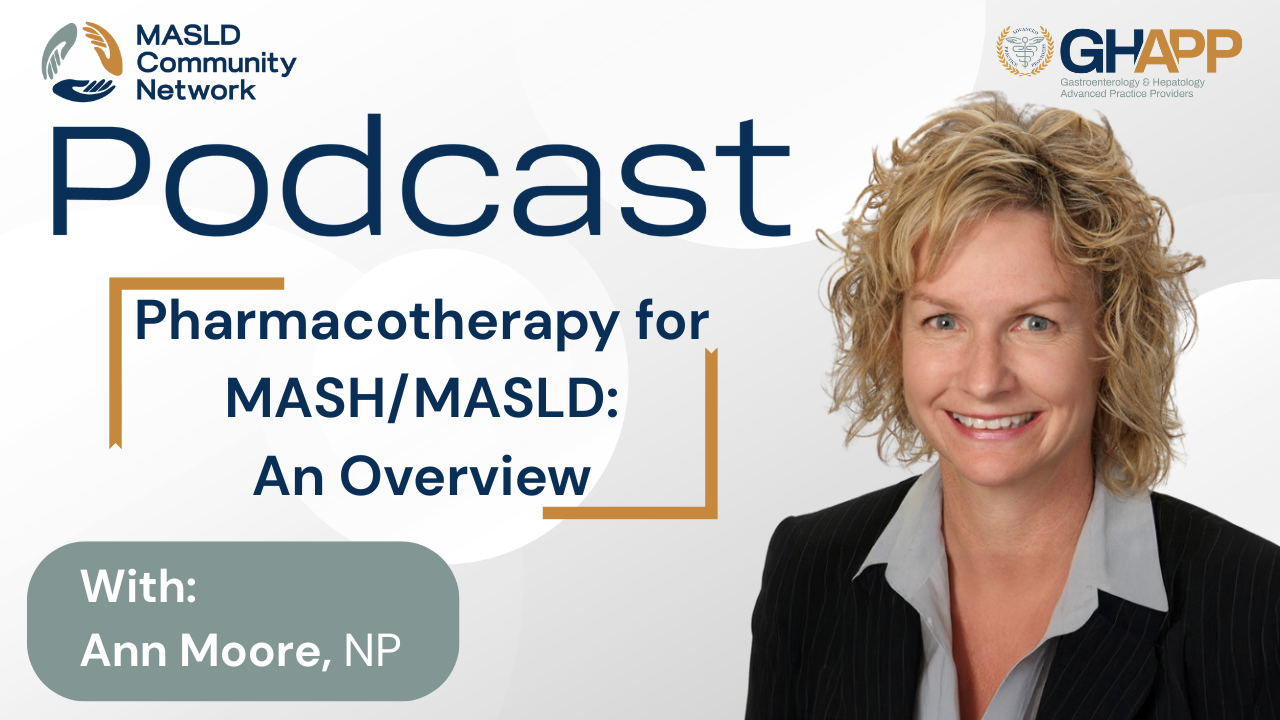
Pharmacotherapy for MASH/MASLD: An Overview

In this expert discussion, Anne Moore, NP with Arizona Liver Health in Phoenix, shares key insights into the evolving landscape of pharmacotherapy for MASH and MASLD. She explains the primary histological endpoints that matter most in clinical trials—MASH resolution and fibrosis improvement—and why these markers are critical for both regulatory approval and long-term patient outcomes. Anne highlights the approval of resmetirom, the first FDA-approved treatment for MASH with F2–F3 fibrosis, and reviews how it works as a selective THR-beta agonist to reduce liver fat and inflammation while improving fibrosis. Drawing on Phase 3 trial data, she outlines its efficacy, safety profile, and side effects, as well as strategies for monitoring patients through non-invasive testing, liver chemistries, and metabolic risk factors. This session also explores which patients are most appropriate candidates for MASH pharmacotherapy, with a focus on those at high risk of progression but still early enough in their disease to benefit. For advanced practice providers and hepatology specialists, this video provides a clear, practical roadmap to identifying, treating, and monitoring patients with MASH in everyday clinical practice.
Watch Now

Serological Workup: A Step-by-Step Guide With Jill Olmstead

Join Jill Olmstead, DNP from Providence Health in Southern California for a step-by-step guide on working up patients with elevated liver enzymes in this MASLD & MASH Community Network podcast. Jill reviews how to distinguish acute vs. chronic liver injury, interpret patterns of hepatocellular vs. cholestatic damage, and order the right serologic tests, including viral hepatitis panels, autoimmune markers (ANA, ASMA, AMA), Wilson’s disease, alpha-1 antitrypsin deficiency, iron studies, and celiac screening. She highlights common causes such as alcohol use and MASLD—now one of the leading causes of liver transplantation—and explains when to use abdominal ultrasound, MRCP, or ERCP to assess for gallstones, biliary obstruction, or sludge. Jill also emphasizes the role of noninvasive fibrosis assessment (FIB-4 score, FibroScan®, fibrosis panels) in staging and treatment planning. With practical insights on history taking, medication review, alcohol counseling, and referral thresholds, this episode provides APPs, GI providers, and hepatology clinicians with a clear framework to evaluate and manage patients with abnormal liver tests and protect long-term liver health.
Watch Now
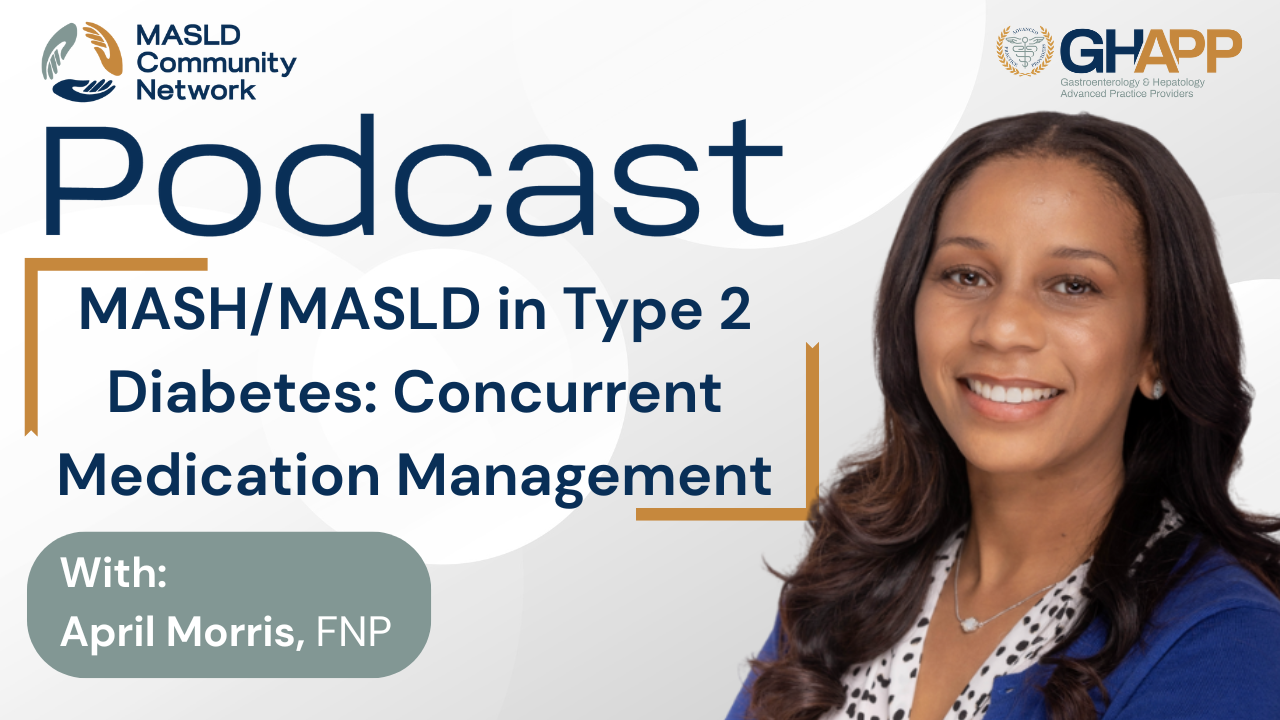
MASH/MASLD in Type 2 Diabetes: Concurrent Medication Management

In this video, April Morris, FNP, shares her expertise on the close connection between type 2 diabetes and fatty liver disease (MASLD/MASH). With over 16 years of experience in hepatology and endocrinology, she explains why patients with type 2 diabetes are at a higher risk of developing MASH due to shared risk factors like insulin resistance and obesity. April highlights how improving glycemic control, lowering A1C, weight loss, and lifestyle modifications can significantly reduce liver fat, inflammation, and fibrosis progression. She discusses the benefits of modern diabetes medications—including GLP-1 receptor agonists such as semaglutide and tirzepatide, SGLT2 inhibitors, and metformin—and how they not only improve blood sugar and weight management but also support liver, kidney, and heart health. Importantly, she notes that most diabetes medications remain safe for patients with liver disease unless advanced decompensated cirrhosis is present, where caution with metformin may be necessary due to lactic acidosis risk. April emphasizes that treating diabetes aggressively and reaching an A1C target around 7% can slow or even prevent progression of liver fibrosis. For APPs and providers, the takeaway is clear: effective diabetes management is one of the most powerful tools to improve liver outcomes.
Watch Now

Motivational Interviewing: Practical Techniques for Lifestyle Adherence

In this episode, Emily Przybyl, PA-C at Erie County Medical Center in Buffalo, NY, dives into the foundations of motivational interviewing for patients with MASLD (metabolic dysfunction-associated steatotic liver disease) and MASH. With practical, real-world insights from her clinical experience, Emily shares how providers can build trust, meet patients where they are, and guide them toward meaningful, sustainable lifestyle changes. She emphasizes asking open-ended questions, assessing social determinants of health like income and food access, and collaboratively developing realistic diet and exercise plans tailored to each patient’s circumstances. Emily also highlights culturally sensitive counseling techniques, strategies for overcoming barriers like limited mobility or unsafe environments, and the importance of setting SMART goals for weight loss and liver health. Whether patients are struggling with motivation, resistant to change, or unsure where to start, this episode provides a supportive, patient-centered framework for fostering long-term behavior change in metabolic liver disease.
Watch Now
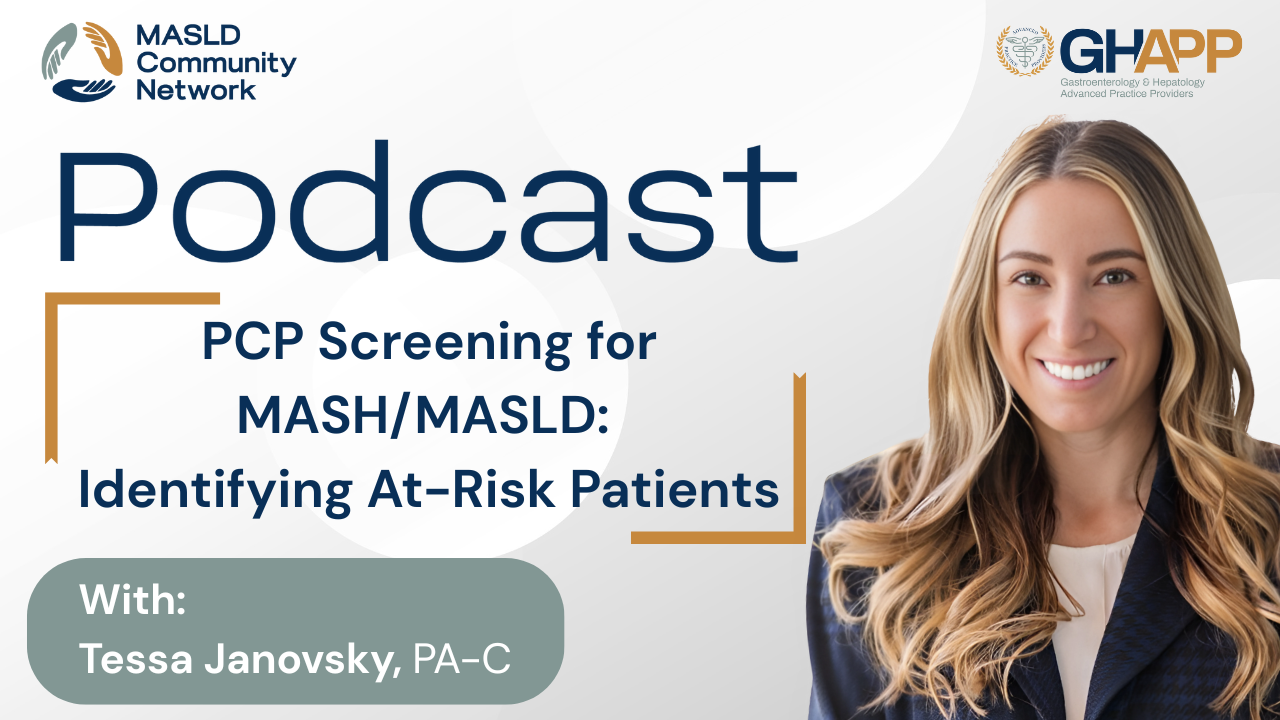
PCP Screening for MASH/MASLD: Identifying At-Risk Patients

Join Tessa Janovsky, PA-C from Arizona Liver Health, for a practical and guideline-based discussion on screening for Metabolic Dysfunction-Associated Steatotic Liver Disease (MASLD) and Metabolic Dysfunction-Associated Steatohepatitis (MASH) in primary care. This session outlines which patient populations Advanced Practice Providers (APPs) should routinely screen—such as individuals with type 2 diabetes, medically complicated obesity, metabolic risk factors with fatty liver on imaging, moderate alcohol use (MetALD), or a family history of MASH cirrhosis. Learn how to apply first-line non-invasive screening tools like FIB-4 and the NAFLD Fibrosis Score, understand their limitations, and incorporate them into busy clinic workflows. Tessa shares strategies for communicating positive results to patients, next steps for further evaluation (ELF test, FibroScan, MRI elastography), and criteria for timely referral to gastroenterology or hepatology. With practical tips for integrating MASLD/MASH screening into electronic medical records, building clinical pathways, and standardizing protocols, this episode equips PCPs and specialists to detect high-risk patients earlier, intervene effectively, and ultimately improve liver health outcomes.
Watch Now

Motivational Interviewing: Practical Techniques for Lifestyle Adherence

Discover how motivational interviewing can transform the management of Metabolic Dysfunction-Associated Steatotic Liver Disease (MASLD) by empowering patients to make sustainable lifestyle changes. In this session, we explore why lifestyle modification—particularly achieving 5–10% weight loss—is the most effective intervention for MASLD, yet often fails when approached through traditional “diet and exercise” advice alone. Learn the four core principles of motivational interviewing—expressing empathy, developing discrepancy, rolling with resistance, and supporting self-efficacy—and how to apply them in real-world clinical encounters to improve patient engagement and outcomes. Through practical strategies, sample dialogue, and a compelling patient case study, this discussion highlights how small, achievable changes in diet and physical activity can reduce hepatic inflammation, improve insulin resistance, and even reverse fibrosis. Whether you’re a hepatology provider, primary care clinician, or allied health professional, you’ll gain actionable tools to activate patient motivation, overcome barriers, and support lasting behavioral change in MASLD care.
Watch Now
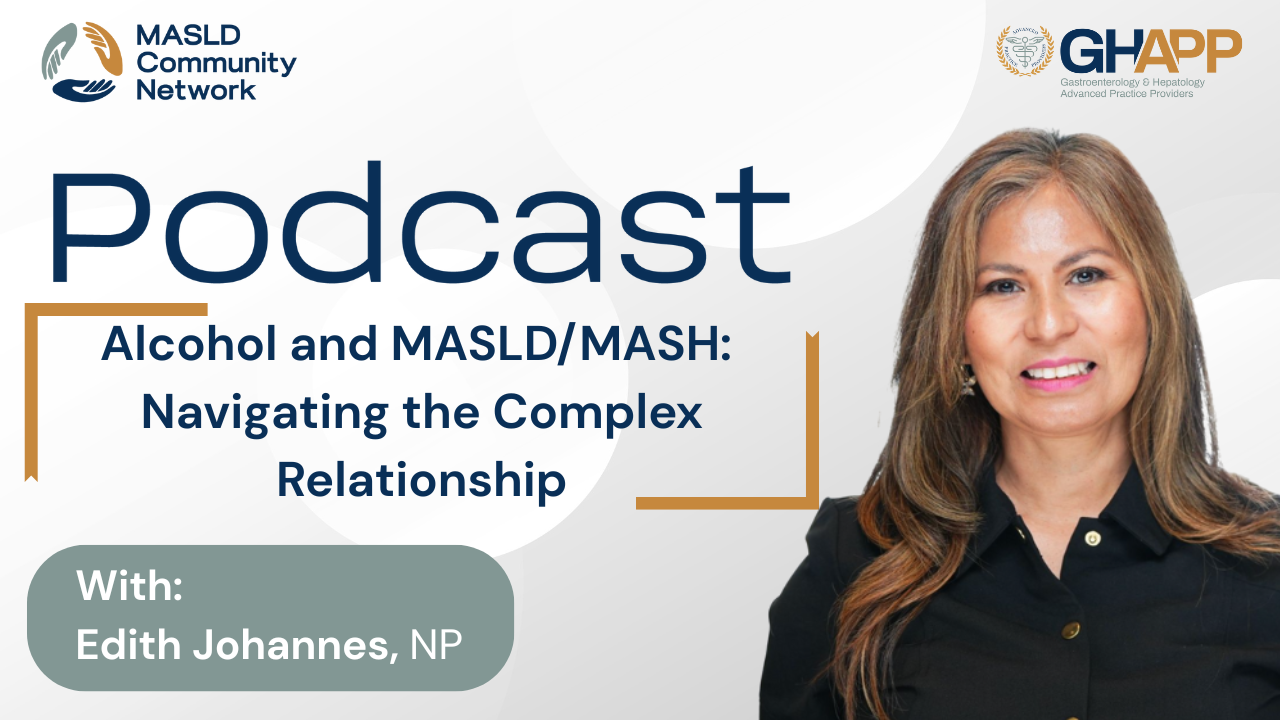
Alcohol and MASLD/MASH: Navigating the Complex Relationship

Join Edith Johannes, NP, UCLA Health, for an in-depth discussion on alcohol consumption in patients with Metabolic Dysfunction-Associated Steatotic Liver Disease (MASLD) and Metabolic Dysfunction-Associated Alcohol-Related Liver Disease (MetALD). Drawing on over 17 years of experience in liver disease and transplant care, Edith explains the clinical importance of accurately screening and quantifying alcohol use to differentiate between MASLD, MetALD, and Alcohol-Related Liver Disease (ALD). Learn the acceptable alcohol thresholds, how alcohol impacts diagnostic accuracy for fibrosis, and why precise history-taking—down to grams per day—is essential for guiding treatment. This session covers practical strategies for effective patient conversations, cultural sensitivity, use of validated screening tools (CAGE, AUDIT, AUDIT-C), and tips for uncovering underreported intake. Discover how alcohol use can confound non-invasive testing like FIB-4 and elastography, influence eligibility for pharmacotherapy, and accelerate disease progression, cardiovascular risk, and mortality. With a focus on early intervention, lifestyle modification, and multidisciplinary support for alcohol cessation, this talk provides actionable insights for improving liver health outcomes in MASLD and MetALD patients.
Watch Now
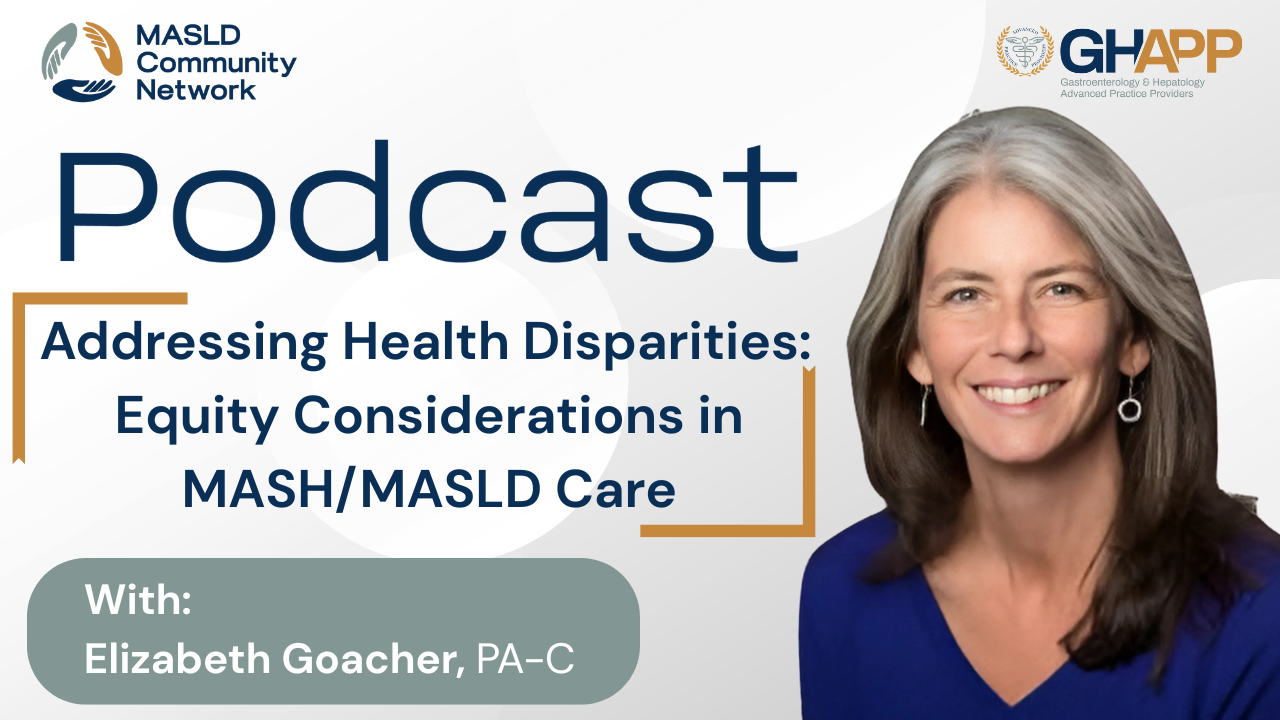
Addressing Health Disparities: Equity Considerations in MASH/MASLD Care

Join Elizabeth Goacher, PA-C from Duke University Medical Center, for an in-depth discussion on addressing healthcare disparities in Metabolic Dysfunction-Associated Steatotic Liver Disease (MASLD). As part of the MASLD Community Network, supported by Madrigal, Elizabeth explores how social determinants of health—including race, ethnicity, socioeconomic status, geography, and access to nutritious food—impact MASLD prevalence and outcomes. She highlights the higher rates of MASLD in Hispanic populations, individuals with obesity, diabetes, cardiovascular disease, and hypertension, and emphasizes actionable strategies clinicians can use in everyday practice to mitigate bias, improve screening, and provide equitable care. This episode underscores the importance of starting with the individual patient, asking the right questions, and tailoring recommendations based on access and resources to help reduce disparities and improve liver and metabolic health.
Watch Now
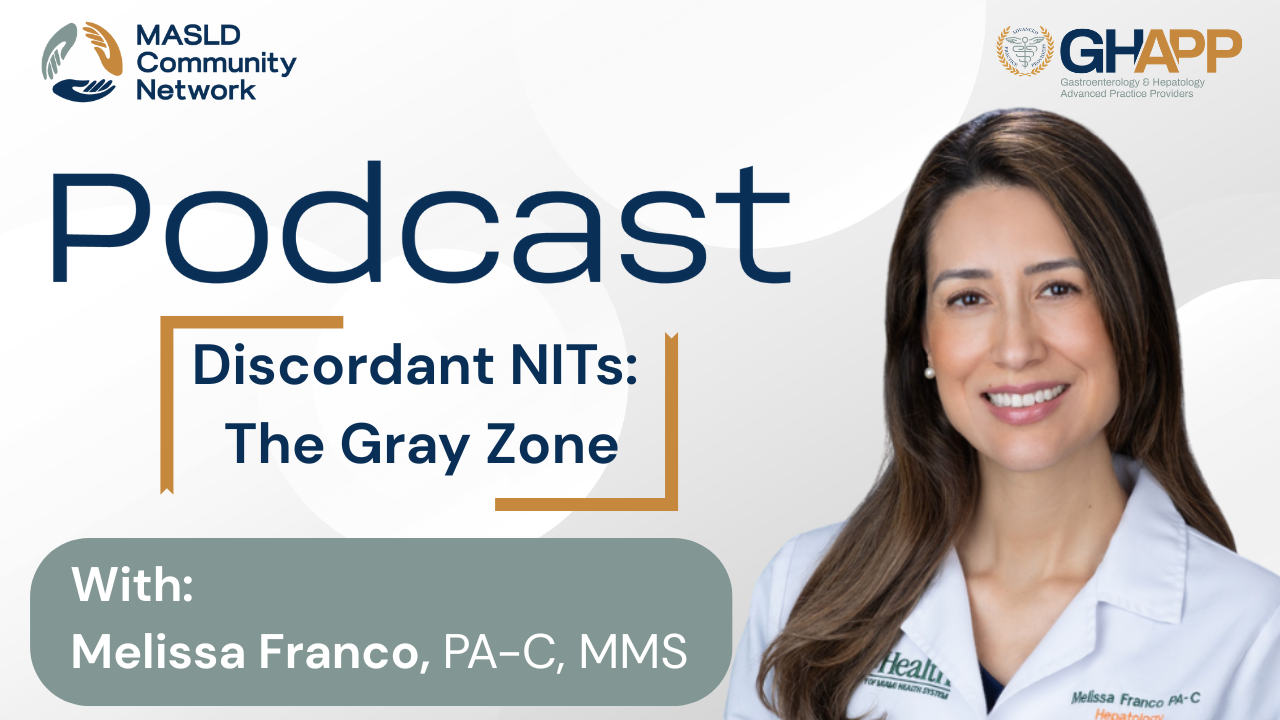
Discordant NITs: The Gray Zone

Join Melissa Franco, PA at the University of Miami, for an in-depth episode of the GHAPP MASLD Community Network podcast focused on discordant non-invasive tests (NITs) and navigating the "gray zone" of liver fibrosis staging. Melissa walks through common real-world scenarios where FIB-4, FibroScan, ultrasound, ELF score, and MR elastography deliver conflicting results—exploring why this happens and how to approach it clinically. Learn how patient factors such as obesity, alcohol use, co-morbidities, medications, and test limitations can impact NIT interpretation. Discover Melissa’s expert strategies for re-evaluating results, when to consider liver biopsy, and how to communicate these complexities with patients. From understanding how false elevations occur to using imaging and labs to confirm or exclude advanced fibrosis, this episode provides a practical and evidence-based approach to staging MASLD and MASH when results don’t align. Whether you're managing metabolic liver disease in hepatology or primary care, this is essential listening for interpreting liver diagnostics in nuanced clinical settings.
Watch Now
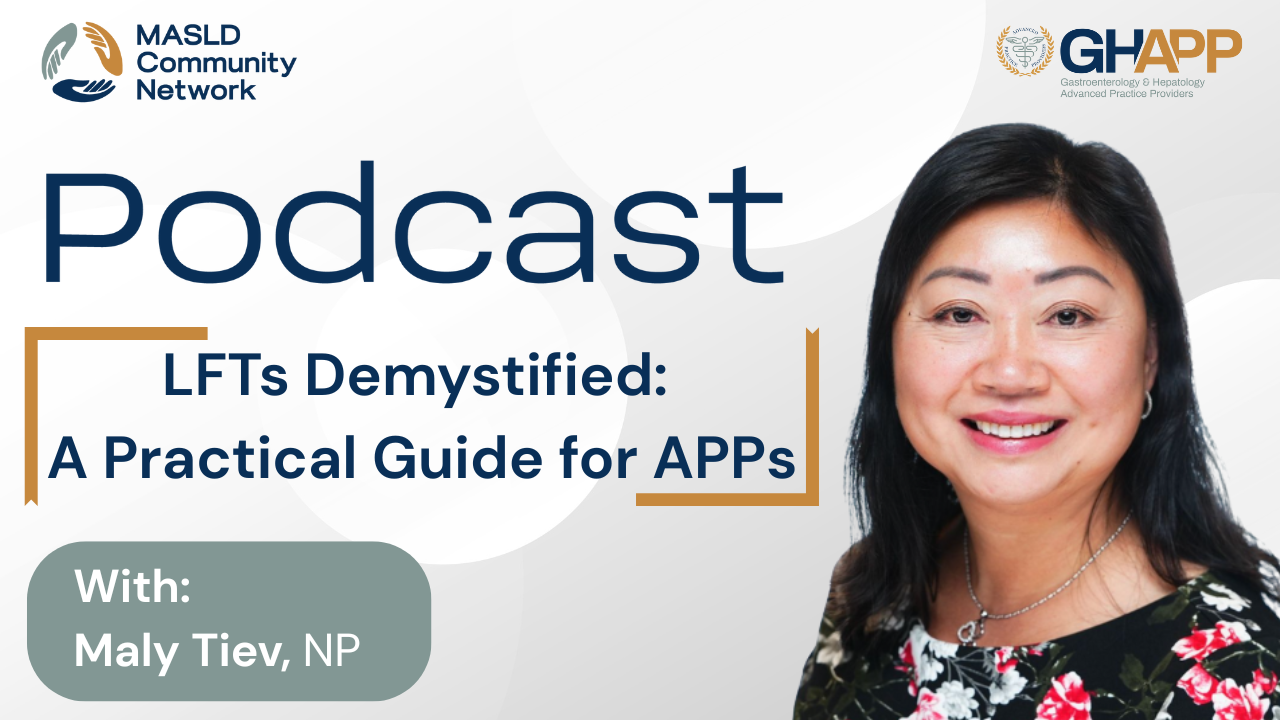
LFTs Demystified: A Practical Guide for APPs

Join Maly Tiev, NP at NYU Langone Health, for this essential educational session on demystifying liver function tests (LFTs), brought to you by the GHAPP MASLD Community Network. In this video, Maly explains how to interpret ALT, AST, alkaline phosphatase, GGT, bilirubin, albumin, INR, and platelet counts in the context of MASLD (Metabolic Dysfunction-Associated Steatotic Liver Disease) and MASH (Metabolic Steatohepatitis). Learn why elevated liver enzymes are not always present in MASH, how to distinguish between different causes of abnormal LFTs—including alcohol-related liver disease, viral hepatitis, and drug-induced liver injury—and how serial LFT monitoring can indicate treatment response or disease progression. Discover the importance of using non-invasive tools for fibrosis risk stratification, the role of platelets as a key marker, and how a deeper understanding of synthetic function tests can help identify cirrhosis earlier. Whether you're a clinician or a patient looking to understand the lab work behind fatty liver disease, this presentation offers practical insights for interpreting LFTs with confidence.
Watch Now
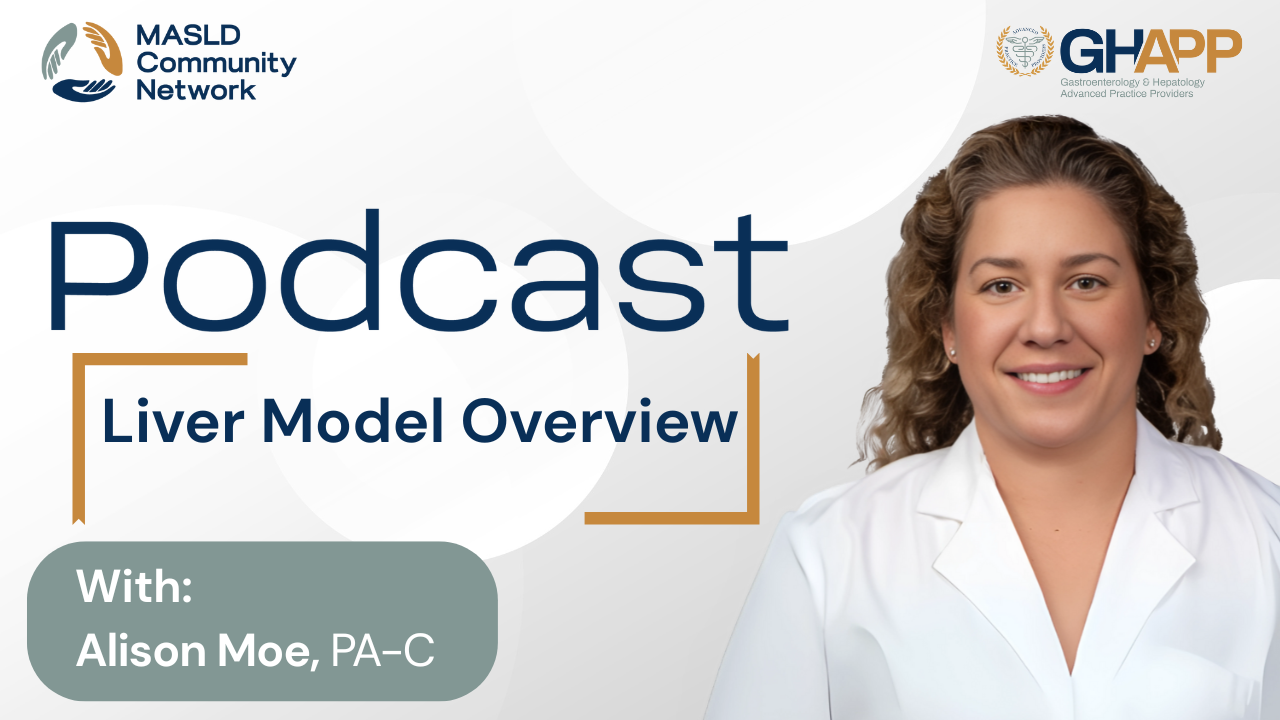
Liver Model Overview

Join Alison Moe, PA-C with United Digestive, as she walks through a hands-on demonstration using a life-sized liver model to help patients better understand fibrosis and liver disease progression. In this engaging and practical overview, Allison explains how different stages of liver fibrosis—from normal liver to cirrhosis and hepatocellular carcinoma—can be felt and visualized using a segmented anatomical model. She shares how this tool enhances patient education during discussions about non-invasive liver testing, such as FibroScan, CAP scores, FIB-4, ELF testing, and more. Designed to support visual learners and improve comprehension of disease state, this video is a valuable resource for clinicians and patients navigating the complexities of metabolic-associated fatty liver disease (MASLD) and its progression to MASH. Learn how tactile and visual teaching aids can bridge the gap between diagnostics and patient understanding in hepatology care.
Watch Now
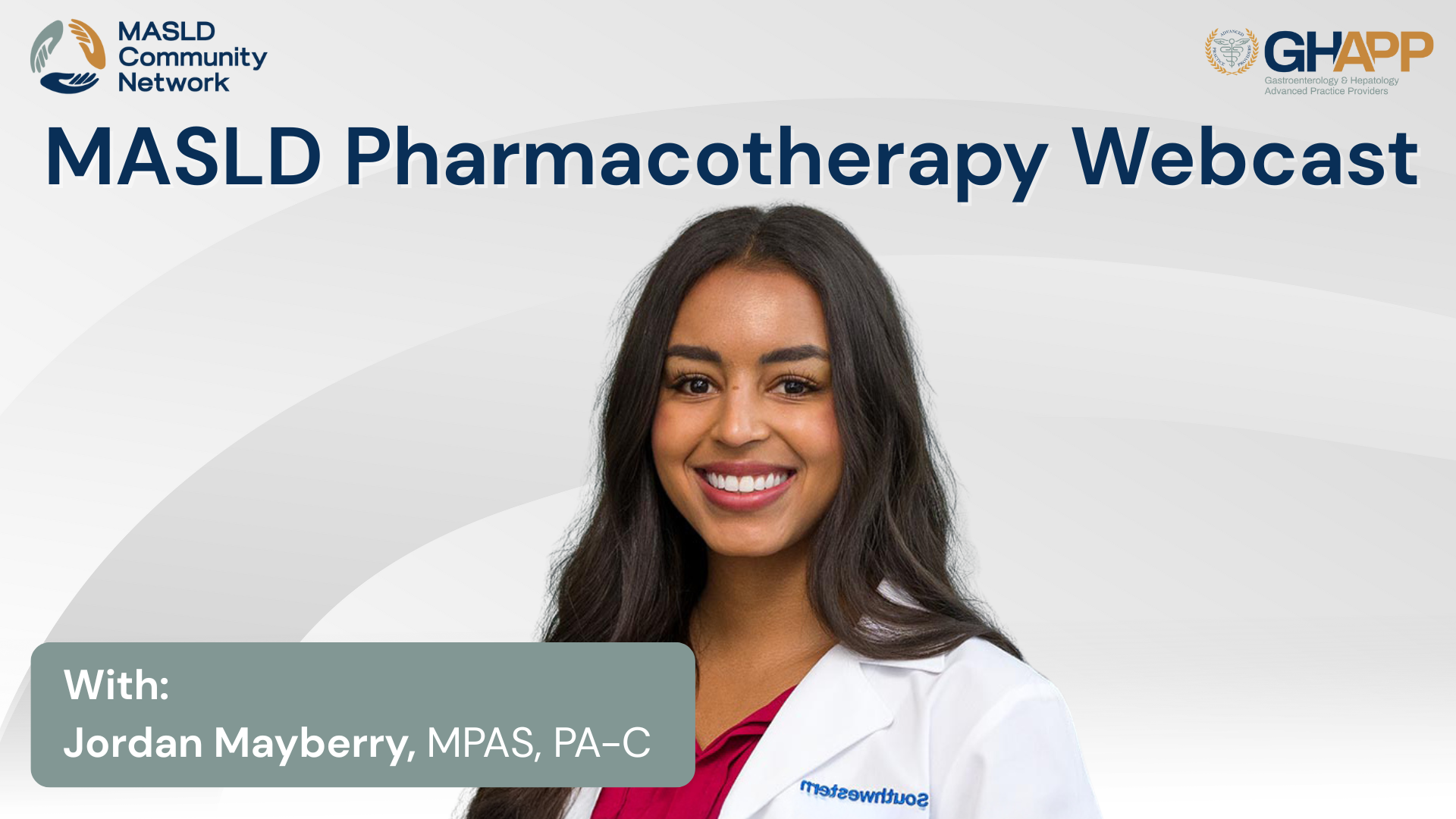
MASLD Pharmacotherapy With Jordan Mayberry

Join Jordan Mayberry, MPAS, PA-C from UT Southwestern, for an insightful session from the GHAPP MASLD/MASH Community Network focused on the evolving landscape of pharmacotherapy in MASLD and MASH. This presentation explores evidence-based strategies for treating metabolic dysfunction–associated steatotic liver disease (MASLD), with an emphasis on weight loss, diabetes management, and liver-directed therapies. Jordan breaks down key data on GLP-1 receptor agonists, SGLT2 inhibitors, Vitamin E, pioglitazone, and highlights the latest clinical evidence supporting the use of Resmetirom—the first FDA-approved treatment for MASH with stage 2 or 3 fibrosis. Learn how these therapies fit into hepatology practice, including clinical considerations, side effect management, and patient selection. Stay up to date on ongoing research, treatment duration, and real-world application of these new therapies. Don’t forget to register and join the GHAPP MASLD/MASH Community Network for continued education and access to valuable resources.
Watch Now

Discordant NITs, the Gray Zone

In this episode, Gabriella McCarty, NP-C at Oshi Health, shares her deep clinical insights on the evolving landscape of MASLD (Metabolic Dysfunction–Associated Steatotic Liver Disease) and MASH (Metabolic Dysfunction–Associated Steatohepatitis). With over 26 years of experience in private practice, Gabriella explains that the majority of fatty liver cases she encounters are found incidentally—often during evaluations for unrelated GI issues like GERD or routine colon screenings. She discusses the updated nomenclature from NAFLD to MASLD and outlines the cardiometabolic risk factors that inform diagnosis, such as obesity, diabetes, hypertension, and dyslipidemia. Gabriella emphasizes the importance of non-invasive assessments like FibroScan, FIB-4, ELF testing, and, in select cases, liver biopsy or MR elastography for accurate fibrosis staging. She also highlights the challenges of discordant test results and shares practical strategies for follow-up and monitoring. With a strong focus on lifestyle modification—promoting a Mediterranean diet, targeted weight loss, regular exercise, and alcohol avoidance—this episode provides essential education for providers managing patients with fatty liver disease, even when it's not the primary reason for the visit.
Watch Now
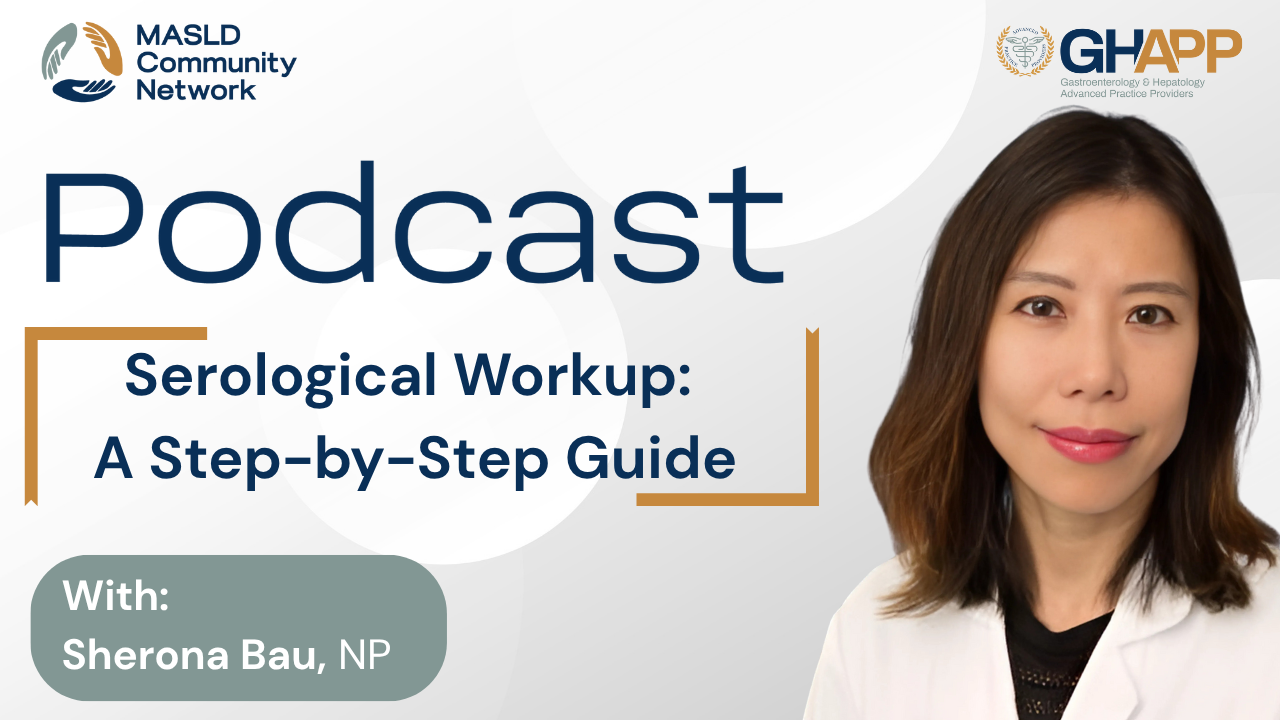
Serological Workup: A Step-by-Step Guide

In this comprehensive video, Sherona Bau, NP from UCLA, breaks down the essential hepatology workup for patients with MASLD (formerly NAFLD) and MASH, offering guidance for both primary care providers and GI/hepatology specialists. Drawing from her extensive clinical experience, she outlines a systematic approach to evaluating abnormal liver ultrasound findings—starting with critical labs to rule out chronic liver conditions like hepatitis B, hepatitis C, autoimmune hepatitis, PBC, and hereditary hemochromatosis. Sherona discusses the importance of ordering ANA, AMA, ferritin, serologies, and even specialized labs like the phosphatidylethanol (PEth) test to uncover alcohol-related liver disease that may be overlooked. She emphasizes the need to screen for cardiometabolic risk factors including type 2 diabetes and dyslipidemia and highlights non-invasive tests such as FibroScan and FIB-4 to help identify patients at risk of advanced fibrosis who may benefit from specialist referral. Most importantly, Sherona addresses the fears many patients face around liver disease progression and life expectancy, encouraging early intervention and coordinated care to improve long-term outcomes. This video is a must-watch for any clinician managing steatotic liver disease.
Watch Now
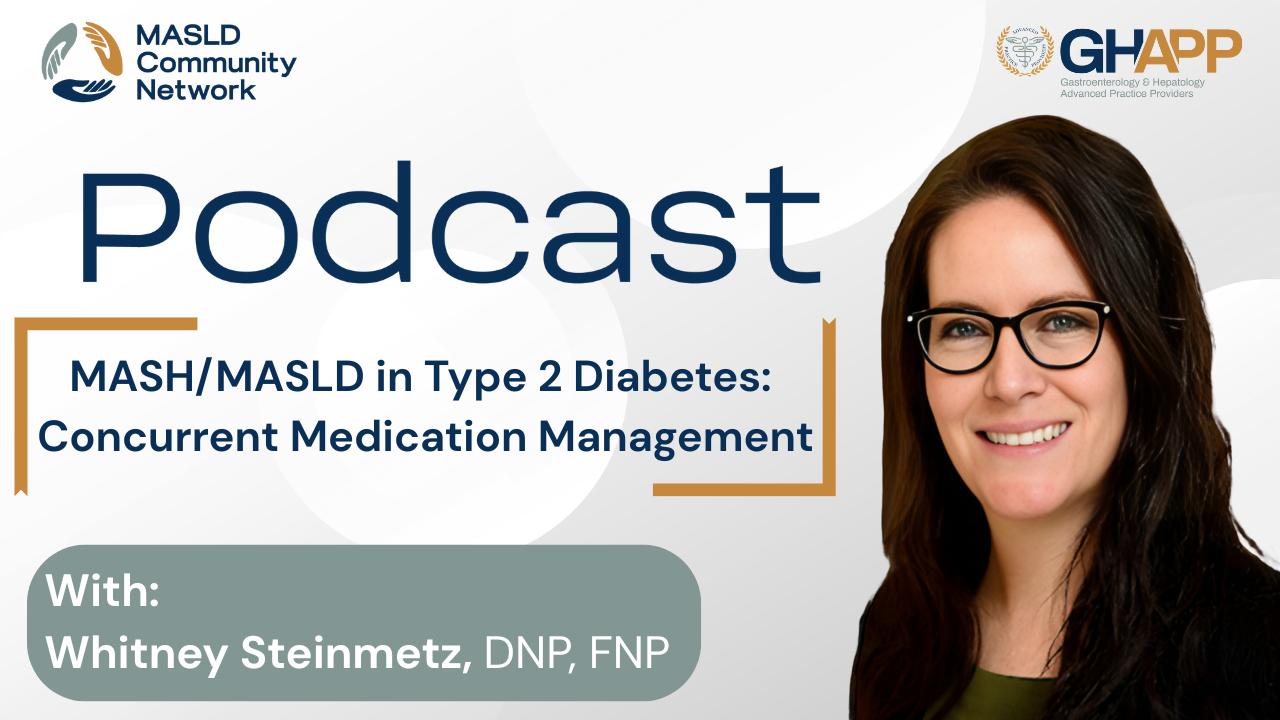
MASH/MASLD in Type 2 Diabetes: Concurrent Medication Management

In this informative episode, Whitney Steinmetz, NP from Presbyterian Medical Group in Albuquerque, NM, explores how to optimize medication strategies for patients with type 2 diabetes who are also living with MASLD and MASH. She discusses why individuals with type 2 diabetes are at significantly higher risk for developing advanced liver fibrosis—highlighting the overlapping metabolic, inflammatory, and insulin-resistant pathways that accelerate liver damage. Whitney breaks down how commonly prescribed diabetes medications—like GLP-1 receptor agonists, SGLT2 inhibitors, TZDs, and dual/triple incretins—impact liver fat, inflammation, and fibrosis progression. She offers practical guidance on selecting therapies that balance glycemic control with hepatic benefits while minimizing polypharmacy. Learn which medications may offer dual cardiometabolic and hepatic advantages, and which should be avoided or used with caution in patients with cirrhosis or advanced fibrosis. Tune in for real-world insights into how advanced practice providers can take ownership of MASH management in diabetes care.
Watch Now
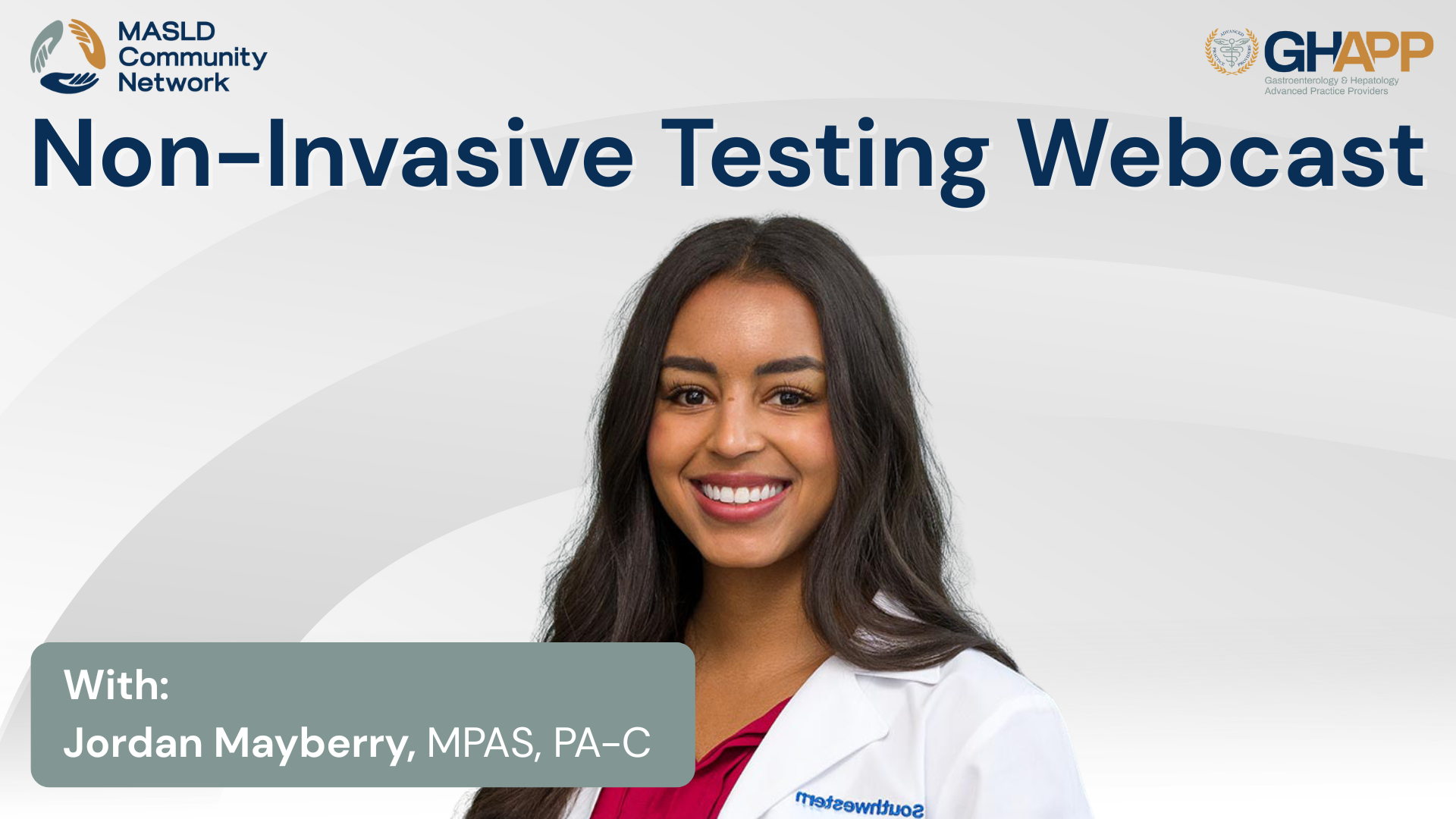
Non-Invasive Testing With Jordan Mayberry

In this educational session, Jordan Mayberry, PA-C from UT Southwestern, presents a practical overview of non-invasive testing for diagnosing and staging metabolic dysfunction-associated steatotic liver disease (MASLD) and metabolic-associated steatohepatitis (MASH). Using a real-world patient case, Jordan discusses how clinicians can leverage key tools—such as FIB-4, ELF testing, FibroScan (VCTE), and MRI elastography—to assess fibrosis and stratify risk in patients with MASLD. She explains the benefits, limitations, and clinical applications of each modality, including guidance on when and how to use them in everyday practice. Whether you're a hepatology specialist or a provider managing patients with cardiometabolic risk factors, this talk delivers a clear, step-by-step approach to incorporating non-invasive liver assessment into your workflow. Viewers are also invited to explore the GHAPP MASLD/MASH Community Network for ongoing education, resources, and clinical insights.
Watch Now
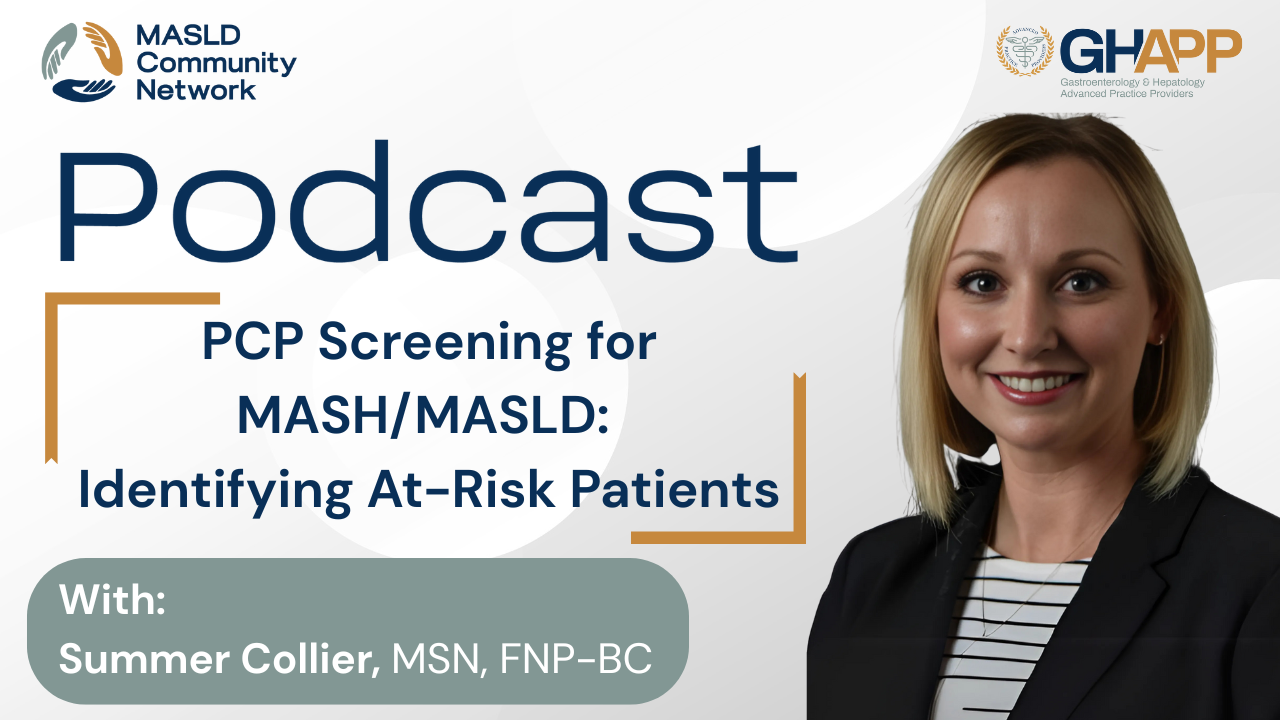
PCP Screening for MASH/MASLD: Identifying At-Risk Patients

In this essential podcast episode from the GHAPP MASLD/MASH Community Network, Summer Collier, NP at UC San Diego Health, dives into the critical role that primary care providers and advanced practice providers play in recognizing and managing MASLD (Metabolic dysfunction-associated steatotic liver disease) and its progressive form, MASH (Metabolic-associated steatohepatitis). With MASLD affecting a growing number of patients—many undiagnosed—Summer walks through practical strategies for early identification, starting with high-risk individuals such as those with type 2 diabetes, obesity, or metabolic syndrome. She highlights the use of the FIB-4 index as a quick, validated, and guideline-recommended first-line screening tool, and explains how to interpret FIB-4 results to stratify risk and determine next steps, including ELF testing, FibroScan®, or referral to GI/hepatology. Summer also offers actionable workflow tips to integrate liver screening into routine primary care, like embedding FIB-4 calculators in EMRs or incorporating assessments into annual diabetes visits. This episode is a must-listen for clinicians seeking to prevent liver fibrosis progression and liver cancer through early, proactive care.
Watch Now

APP Insight: Common Questions from Patients About MASH

In this episode, Jordan Mayberry, MPAS, PA-C, a seasoned hepatology provider at UT Southwestern in Dallas, Texas, addresses some of the most frequently asked questions from patients diagnosed with MASLD (Metabolic Dysfunction–Associated Steatotic Liver Disease) and MASH (Metabolic Dysfunction–Associated Steatohepatitis). With over 12 years of clinical experience, Jordan explains the root causes of MASLD/MASH, including key cardiometabolic risk factors like obesity, diabetes, hypertension, and hyperlipidemia, as well as genetic predispositions—particularly in Hispanic populations. He emphasizes the importance of fibrosis assessment in guiding treatment decisions, explaining that patients with early-stage disease should focus on lifestyle changes, while those with more advanced fibrosis (stages F2–F3) may be candidates for pharmacologic therapy such as resmetirom (Rezdiffra). Jordan also explores how prognosis depends on fibrosis stage and long-term management of comorbidities, making early intervention and risk stratification essential. This episode offers practical insights for clinicians aiming to improve conversations and care strategies for patients living with MASLD or MASH.
Watch Now
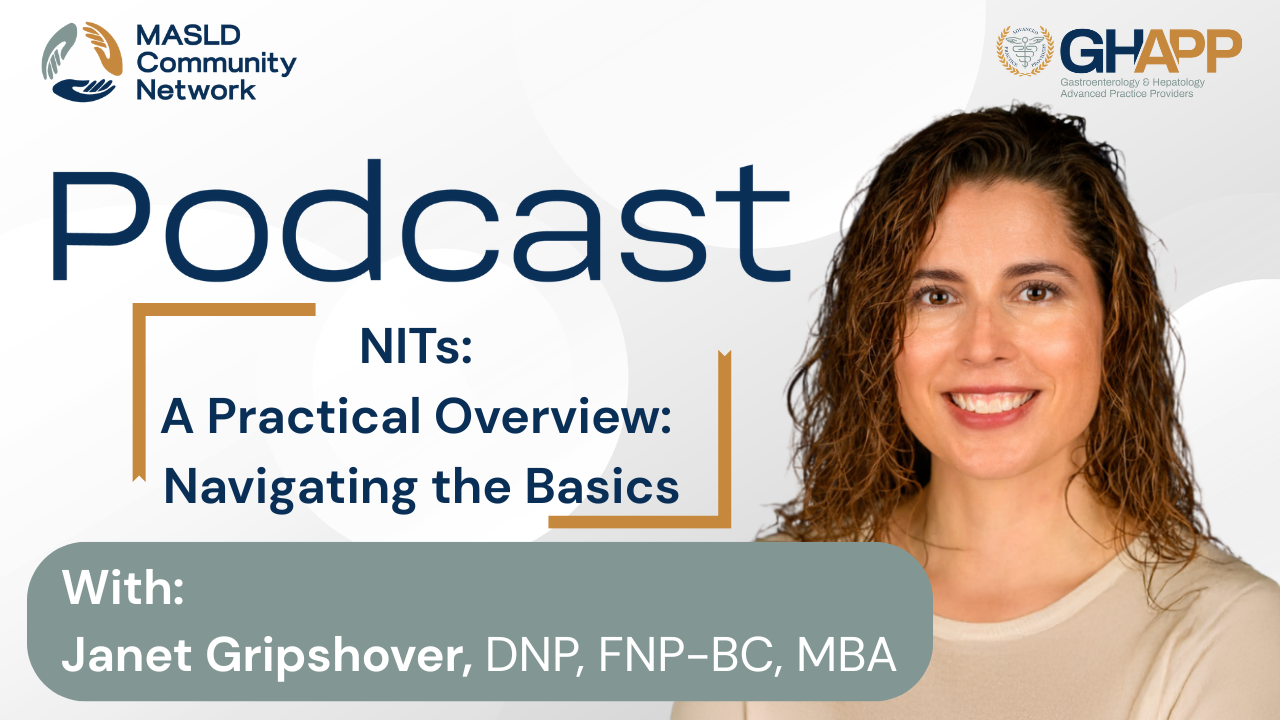
NITs: A Practical Overview: Navigating the Basics

In this practical and engaging overview, Janet Gripshover, nurse practitioner and nurse manager for the Cedars-Sinai Liver Transplant Program, breaks down the essentials of non-invasive testing (NITs) for assessing fibrosis in patients with metabolic-associated steatotic liver disease (MASLD). She explains the critical distinction between MASLD and MASH (metabolic-associated steatohepatitis), highlighting why early identification of aggressive liver disease is essential—even in patients without cirrhosis. Janet reviews key NIT tools, including FibroScan, MR elastography, and serum biomarkers like FIB-4 and ELF score, providing clinical insights on interpreting results, integrating them into risk stratification, and tailoring next steps for patient care. Viewers will learn when to act on elevated liver stiffness, how to interpret CAP scores, and why weight loss and comorbidity control remain foundational treatments. Whether you're new to hepatology or seeking a refresher on navigating fibrosis assessments, this video offers a clear, actionable framework to help prevent disease progression and optimize outcomes for patients with fatty liver disease.
Watch Now

GHAPPcast: Recognizing the Severity of MASH

Thank you to Madrigal for sponsoring this episode of GHAPPcast. In this episode of GHAPPcast, nurse practitioners Patrick Horne and April Morris from discuss the complexities of identifying and managing patients with metabolic-associated steatohepatitis (MASH). They explore clinical approaches, including the use of bloodwork, family history, and advanced diagnostic tools such as FibroScan, to recognize patients at risk. Patrick and April emphasize the importance of lifestyle interventions like diet and exercise alongside new medical therapies, while also offering practical tips for clinicians on patient monitoring and treatment management. Tune in for valuable insights into managing MASH in clinical practice.
Watch Now

Alcohol and MASLD/MASH: Navigating the Complex Relationship

In this insightful episode, Oyin Penny, NP with Premier Gastroenterology of Kansas City, addresses the complex clinical challenge of managing patients with MASLD (metabolic dysfunction-associated steatotic liver disease) who also consume alcohol. Oyin shares practical, evidence-based strategies for screening alcohol use in MASLD and MASH, emphasizing the importance of creating a nonjudgmental, patient-centered environment. She outlines how to use tools like PEth (phosphatidylethanol) testing to objectively quantify alcohol intake and explains the synergistic hepatotoxicity that occurs when alcohol use coexists with metabolic liver disease. Oyin also explores when to initiate non-invasive tests (NITs), why alcohol can distort fibrosis staging, and how to time assessments and treatment appropriately. From setting SMART goals to recommending behavioral support, medications like naltrexone, and exploring mental health and social work interventions, this episode offers a full-spectrum approach to managing high-risk patients. Whether you're a GI, hepatology provider, or in primary care, this episode provides tools for personalized care, alcohol harm reduction, and effective long-term MASLD management.
Watch Now
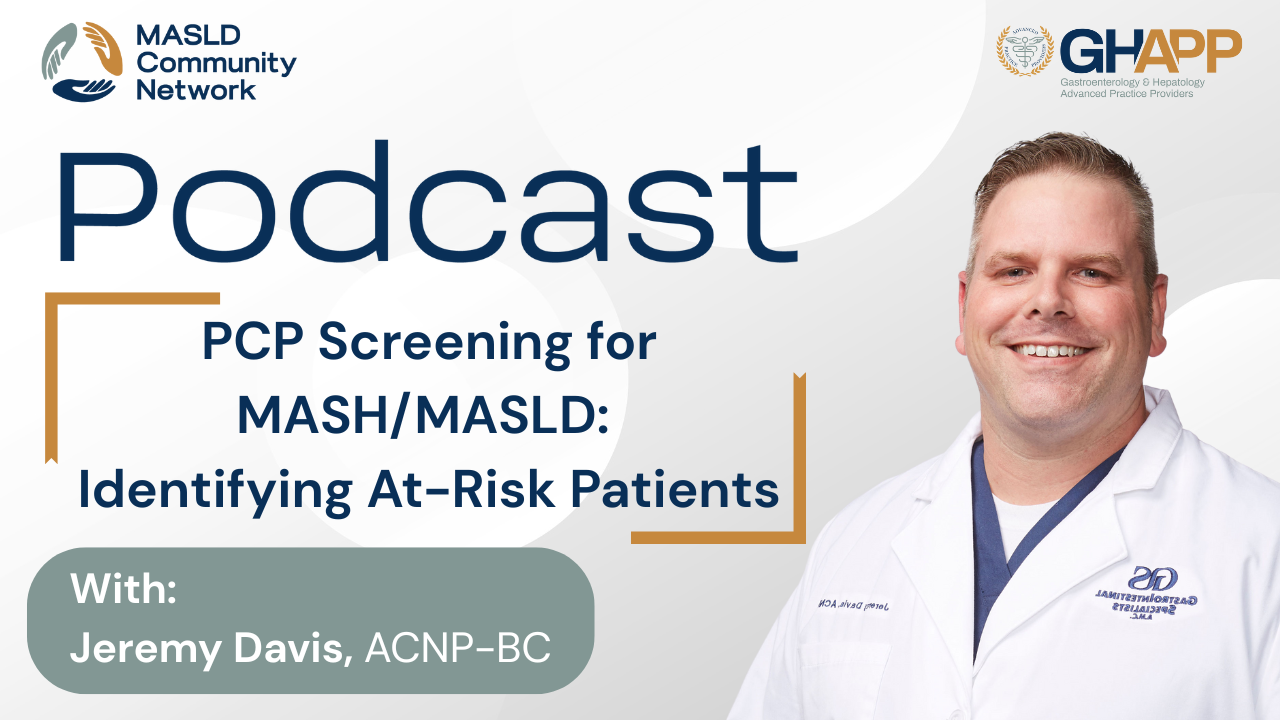
PCP Screening for MASH/MASLD: Identifying At-Risk Patients

In this episode, Jeremy Davis, NP from Gastrointestinal Specialists in Shreveport, Louisiana, discusses the vital role of primary care screening for MASLD (metabolic dysfunction-associated steatotic liver disease) and MASH (metabolic-associated steatohepatitis). With the rising prevalence of metabolic co-morbidities like type 2 diabetes, hypertension, dyslipidemia, and obesity, early identification of at-risk patients is more critical than ever. Jeremy outlines practical and evidence-based strategies for screening in the primary care setting, starting with simple tools like the FIB-4 score—which relies on common lab values—and how to interpret results to guide referrals to hepatology or GI specialists. He also discusses the downstream workup upon referral, including non-invasive tests like FibroScan, ELF score, and liver ultrasound. Treatment fundamentals such as the Mediterranean diet, physical activity, and weight loss remain the cornerstone of care, while emerging therapies like GLP-1 agonists and resmetirom offer new options for high-risk patients. Whether you’re a PCP, APP, or specialist, this episode offers clear guidance on how to incorporate MASLD screening into everyday workflows to catch liver disease early and optimize outcomes.
Watch Now

Monitoring for MASLD in Type 2 Diabetes

In this episode, Kelly Smeester, PA-C from South Denver Gastroenterology, explores the critical intersection of type 2 diabetes and metabolic dysfunction-associated steatotic liver disease (MASLD). Drawing from her background in both hepatology and endocrinology, Kelly offers practical, evidence-based strategies for non-invasive monitoring of liver fibrosis in patients with diabetes who may initially appear low risk. She highlights the utility of tools like FIB-4, ELF score, FibroScan, and MR elastography, while emphasizing the limitations of relying solely on liver function tests (LFTs). Kelly recommends annual FIB-4 screening—easily calculated with existing lab values—and discusses when to escalate to more advanced diagnostics. She also shares how advanced practice providers (APPs) can seamlessly integrate MASH education, lifestyle counseling, and routine screening into the diabetes care workflow, supporting early intervention and long-term liver health. This episode is a must-listen for clinicians looking to optimize care for patients at risk of silent liver disease progression in the setting of metabolic co-morbidities.
Watch Now

Diet and Nutrition: Tailoring Plans for Diverse Populations

In this quick and practical video, Miu Lai Ng, a nurse practitioner at the hepatology clinic at Tufts Medical Center in Boston, shares simple, culturally sensitive, and cost-effective dietary tips to help patients manage fatty liver disease—also known as MASH (metabolic dysfunction–associated steatohepatitis). From avoiding white-colored refined carbs like sugar, white rice, and potatoes to smart swaps like oatmeal—rich in soluble fiber and low on the glycemic index—this video emphasizes realistic changes tailored to diverse backgrounds. Miu Lai Ng also covers powerful tools for sticking with a liver-friendly diet, including food tracking apps, photo logging, meal planning tools, and the importance of social support. Plus, she highlights the hidden dangers of liquid calories found in sodas, juices, and bubble tea, which spike liver fat and cost more than you think. Whether you're supporting a patient or managing MASH yourself, this video offers actionable advice that respects both culture and budget—because small changes can lead to big results for your liver and your life.
Watch Now
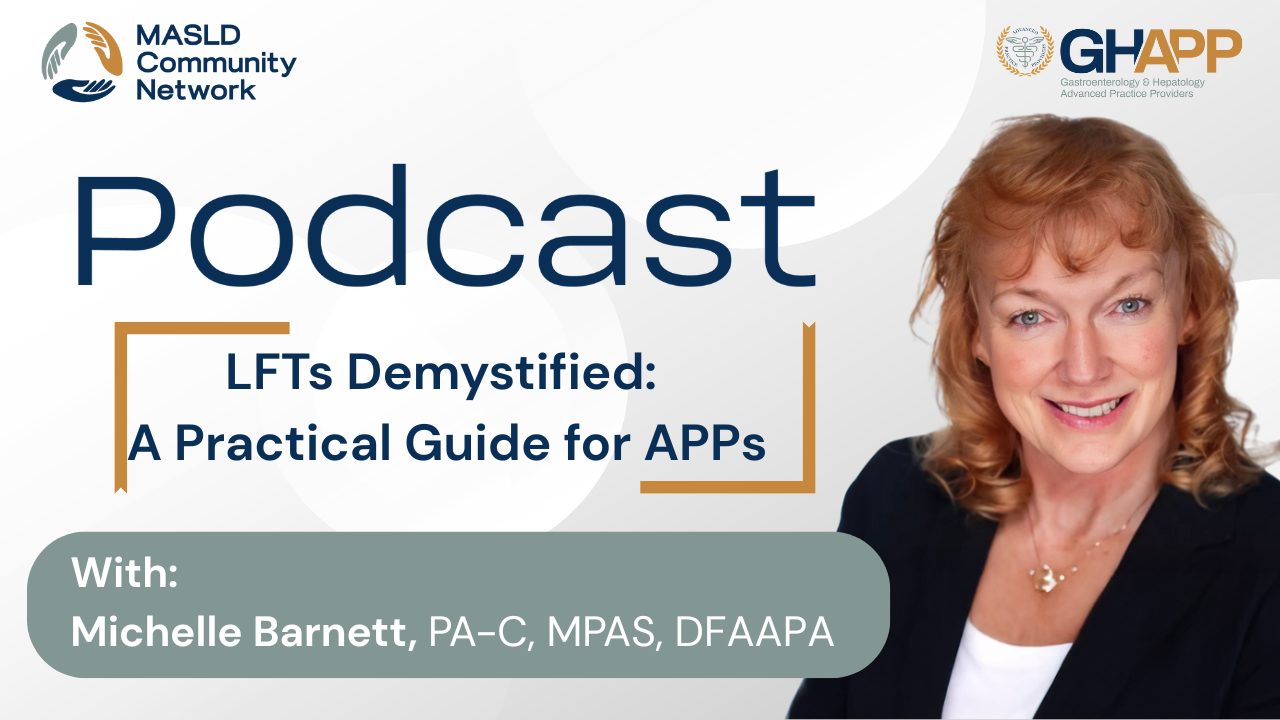
LFTs Demystified: A Practical Guide for APPs

In this podcast episode, Michelle Barnett, PA-C, a liver disease specialist based in Colorado Springs, provides a clear and practical overview on demystifying liver enzyme abnormalities—particularly in the context of MASH (Metabolic Dysfunction–Associated Steatohepatitis) and MASLD (Metabolic Dysfunction–Associated Steatotic Liver Disease). With MASLD affecting nearly 1 in 4 American adults, understanding liver enzyme patterns is critical for early detection and effective management. Michelle breaks down commonly reported values from hepatic function panels—ALT, ALP (alkaline phosphatase), and total bilirubin—explaining what constitutes normal, acute, subacute, and chronic elevations. She walks through hepatocellular, cholestatic, mixed, and isolated hyperbilirubinemia patterns and what they reveal about underlying liver conditions such as MASH, alcohol-associated liver disease, viral hepatitis, biliary obstruction, and drug-induced liver injury. Whether you're a provider or a patient looking to better understand lab results, this episode delivers expert guidance on interpreting liver enzyme elevations to support more informed clinical decisions.
Watch Now

The Role of Exercise in Liver Health

In this episode, Suzanne Robertazzi, DNP at the Washington DC VA Medical Center, discusses the vital role of exercise in liver health, especially for patients at risk of or living with MASLD (metabolic dysfunction-associated steatotic liver disease) and MASH. With a background in liver transplant care, Suzanne emphasizes the importance of tailoring exercise recommendations to each patient’s abilities, goals, and environment. She outlines practical, empathetic strategies for setting realistic fitness goals, celebrating small milestones, and integrating physical activity with nutritional counseling and behavioral support. Whether it's walking, swimming, or group classes, Suzanne explores low-cost and community-based options for promoting long-term adherence. This episode also highlights the benefits of a multidisciplinary approach, including collaboration with physical therapists, mental health professionals, and dietitians. Packed with actionable insights, this conversation is essential for healthcare providers working to empower patients with fatty liver disease through sustainable lifestyle interventions.
Watch Now
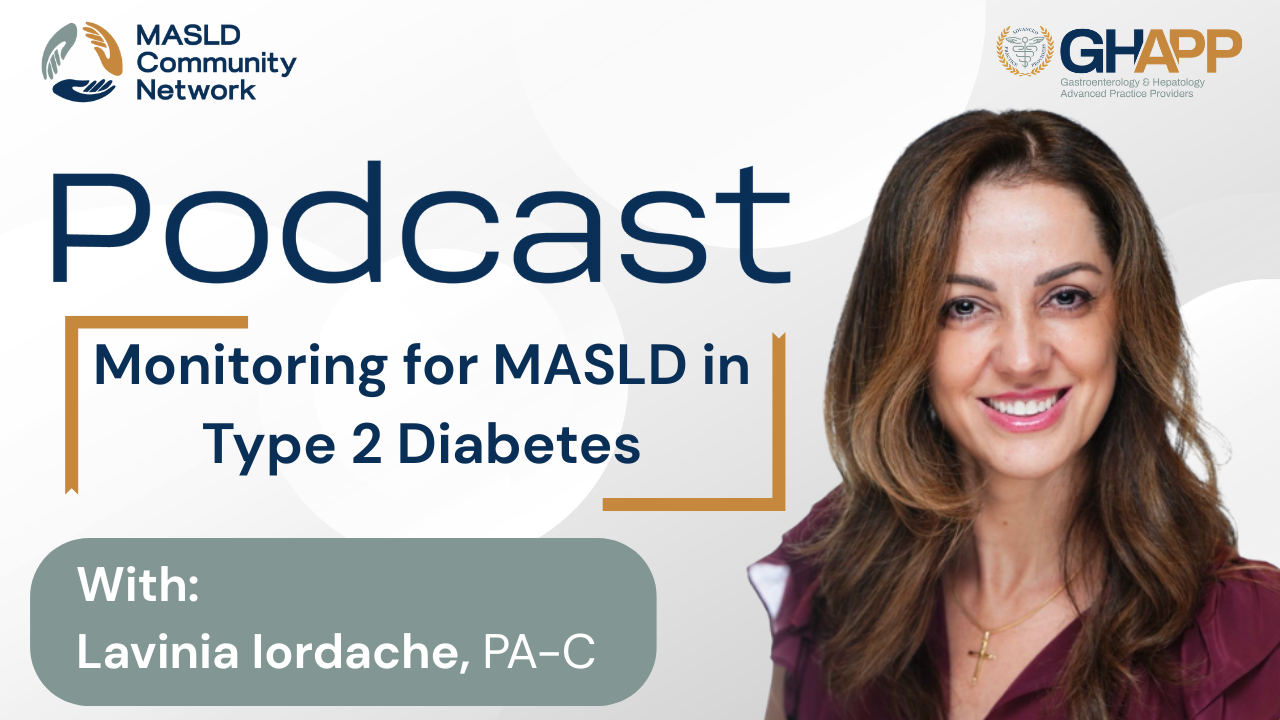
Monitoring for MASLD in Type 2 Diabetes

In this episode of the GHAPP MASLD podcast series, Lavinia Iordache, PA-C from the University of Miami, shares expert guidance on monitoring metabolic dysfunction-associated steatotic liver disease (MASLD) in patients with type 2 diabetes—a group at particularly high risk for disease progression. Lavinia explains the bidirectional relationship between MASLD and diabetes, highlighting the importance of early screening, timely non-invasive testing (NITs), and proactive management strategies to prevent advanced fibrosis and cirrhosis. She reviews essential tools such as FIB-4, ELF score, FibroScan, and MRI-PDFF, and offers clear recommendations on when to escalate care, refer to specialty clinics, or intensify follow-up. The discussion also covers the role of lifestyle interventions including the Mediterranean diet, intermittent fasting, exercise, and coffee consumption, as well as strategies to improve adherence despite psychosocial, cultural, or financial barriers. Lavinia emphasizes a multidisciplinary approach to managing MASLD and provides practical tips for tracking lifestyle changes, such as journaling and the use of the EDAS questionnaire. Whether you’re a GI, endocrinology, or primary care provider, this episode offers an actionable roadmap for reducing liver-related complications in patients with diabetes.
Watch Now
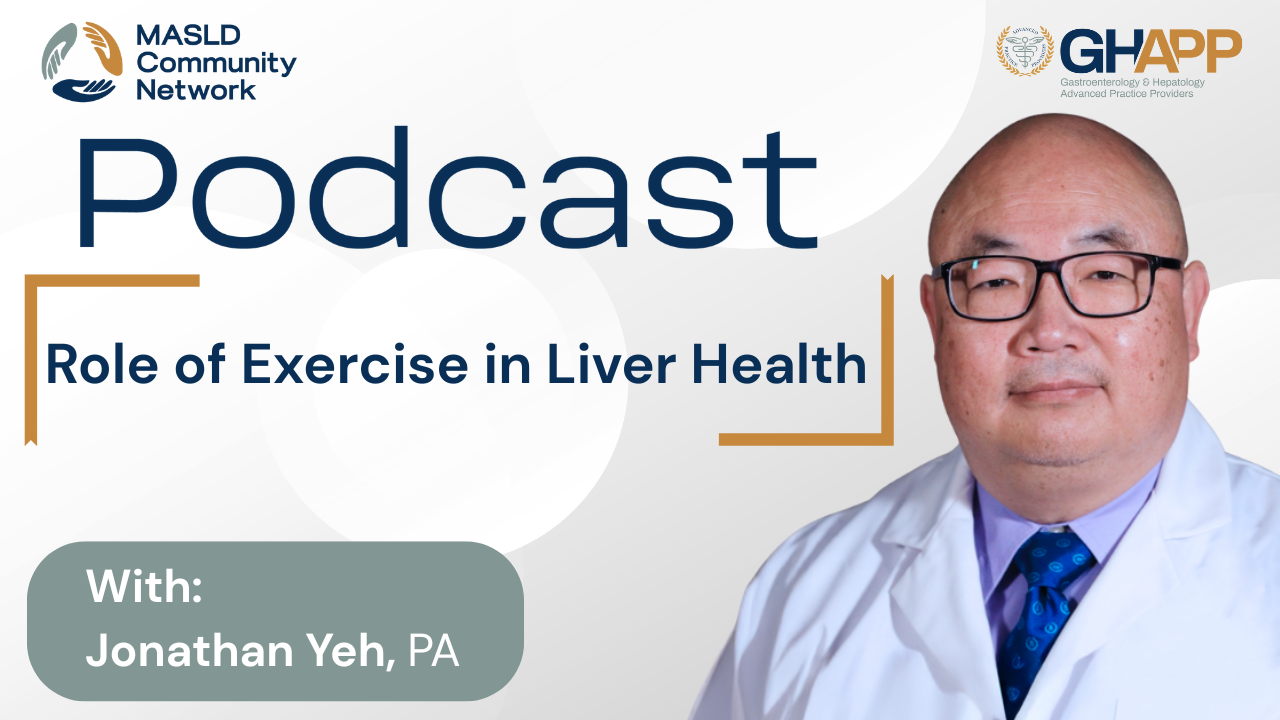
Role of Exercise in Liver Health

In this engaging episode of the GHAPP MASLD/MASH Community Network podcast, Jonathan Yeh, PA at Columbia University Medical Center, discusses the essential role of exercise in liver health—especially in managing MASLD (Metabolic Dysfunction–Associated Steatotic Liver Disease) and MASH (Metabolic Dysfunction–Associated Steatohepatitis). With over 14 years of hepatology experience, Jonathan breaks down the most effective types of physical activity, highlighting the benefits of combining aerobic and resistance training over high-intensity interval training (HIIT) alone. He provides practical, personalized exercise recommendations tailored to patients’ physical abilities, access to resources, and comorbidities—including suggestions for those with mobility limitations or time constraints. Jonathan also offers motivational strategies to help patients overcome common barriers such as lack of time, motivation, or access to fitness facilities. From parking farther from a destination to lunchtime walks and home-based workouts using resistance bands, he emphasizes creative and realistic ways to build physical activity into daily routines. Beyond weight loss, he explains how exercise directly improves liver function by reducing liver fat, enhancing insulin sensitivity, and preventing fat and sugar buildup in the liver. This episode is a must-watch for clinicians and patients alike seeking to understand and implement exercise as a cornerstone in the management of fatty liver disease.
Watch Now

Addressing Health Disparities: Equity Considerations in MASH/MASLD Care

In this powerful and timely episode, Robin Soto, FNP at UC San Diego Health, explores the deep-rooted health disparities impacting patients with MASH (metabolic dysfunction-associated steatohepatitis) and MASLD (metabolic dysfunction-associated steatotic liver disease). With a focus on equity in liver care, Robin highlights the disproportionate burden of disease in Hispanic and underserved populations and the complex interplay of genetics, socioeconomic status, healthcare access, and systemic bias that drives these outcomes. She shares actionable strategies for advanced practice providers (APPs) to implement culturally sensitive communication, bias-conscious screening protocols using tools like FIB-4, NAFLD fibrosis score, and transient elastography, and how to leverage telehealth and community partnerships to bridge gaps in care. Robin also addresses the importance of culturally relevant dietary counseling, inclusive family engagement, and motivational interviewing to enhance adherence and improve long-term outcomes. Whether you're in primary care, hepatology, or community health, this episode offers a roadmap to advance health equity in the management of fatty liver disease.
Watch Now
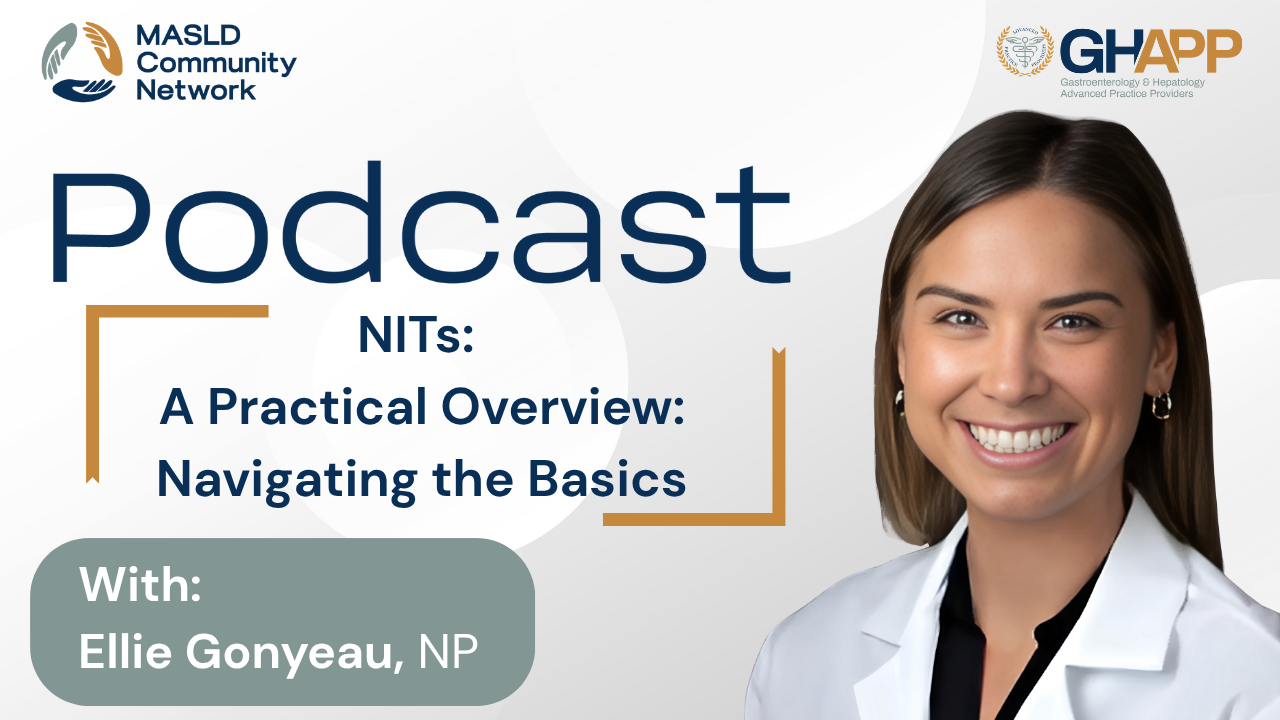
NITs: A Practical Overview: Navigating the Basics

Join Ellie Gonyeau, a nurse practitioner at Beth Israel in Boston, for an insightful podcast episode on metabolic dysfunction-associated steatotic liver disease (MASLD) and MASH, and how to effectively use non-invasive testing (NITs) to evaluate and manage patients with fatty liver disease. Ellie breaks down the differences between MASLD and MASH—explaining why distinguishing simple steatosis from inflammatory liver injury matters for long-term outcomes. She covers first-line serum-based tools like FIB-4 and ELF score, as well as imaging-based modalities including FibroScan and MR elastography, helping clinicians understand when and how to apply each test. With practical tips on interpreting fibrosis risk thresholds, stratifying patients with metabolic comorbidities, and educating primary care teams, this episode emphasizes the power of early identification, appropriate triage, and collaborative care to prevent disease progression. Whether you're working in general GI, primary care, or hepatology, this episode equips you with tools to make liver disease detection more proactive and patient-centered.
Watch Now

NITs: A Practical Overview: Navigating the Basics

In this episode, Christie Morrison breaks down the fundamentals of non-invasive testing (NITs) for evaluating patients with fatty liver disease, including MASLD and MASH. She explains the key differences between steatosis (MASLD) and steatohepatitis (MASH), highlighting how non-invasive tests can replace liver biopsy for staging fibrosis. Christy reviews common tools like FIB-4, NAFLD fibrosis score, Enhanced Liver Fibrosis (ELF) score, transient elastography (FibroScan), and MR elastography, and outlines how to choose the right test based on patient factors such as co-morbidities, geography, access to labs, and imaging availability. The episode also emphasizes the importance of fibrosis risk stratification, interpreting FIB-4 cutoffs, and monitoring liver stiffness or ELF scores after initiating lifestyle or pharmacologic treatment—including newer therapies like resmetirom. This is a must-watch for APPs, GI clinicians, and primary care providers seeking to improve care pathways and outcomes in patients with metabolic liver disease through practical, accessible strategies for fibrosis detection and management.
Watch Now

Alcohol and MASLD/MASH: Navigating the Complex Relationship

In this powerful and highly educational episode, Scott Springer, PA-C at Erie County Medical Center in Buffalo, NY, explores the complex and often overlooked relationship between alcohol use and metabolic dysfunction–associated steatotic liver disease (MASLD/MASH). Drawing from his dual expertise in hepatology and addiction medicine, Scott outlines the importance of accurately assessing alcohol use when diagnosing MASLD, MASH, MetALD, or ALD—emphasizing that MASLD and MASH are diagnoses of exclusion and heavily influenced by alcohol consumption thresholds. He discusses best practices for screening, including patient-centered, nonjudgmental interviewing, the use of biomarkers like PEth and urine ethyl glucuronide, and how these tools enhance accuracy and accountability in care. Scott reviews national guidelines that recommend alcohol abstinence for patients with chronic liver disease and presents data showing how even small reductions in alcohol use can significantly lower the risk of cirrhosis. He also unpacks the challenges of interpreting liver tests in patients with ongoing alcohol use, the limitations of non-invasive testing like FibroScan and FIB-4, and how alcohol may disqualify patients from emerging pharmacotherapy such as resmetirom. Finally, he highlights the promising potential of GLP-1 medications in managing both liver fibrosis and alcohol use. This episode is essential listening for hepatology providers, addiction specialists, and any clinician involved in the care of patients with coexisting liver disease and substance use disorders.
Watch Now

Beyond Basic NITs: When is Liver Biopsy or Advanced Imaging

In this episode, Brian Lam, PA, Associate Director of Research at Inova’s Liver and Obesity Research Program in Northern Virginia, explores the nuanced decision-making involved in going beyond basic non-invasive tests (NITs) for diagnosing and managing MASH (metabolic dysfunction-associated steatohepatitis). While FIB-4 and transient elastography are useful initial tools, Brian breaks down when and why clinicians should consider more advanced diagnostics—such as MR elastography (MRE), proton density fat fraction (PDFF), and in certain cases, liver biopsy. Learn how to assess the reliability of a TE exam, interpret discordant NITs, and when to escalate to cross-sectional imaging or histologic confirmation. This podcast also highlights the evolving role of fat fraction in therapy response, limitations in current FDA indications for resmetirom, and how emerging data may shape future clinical pathways for patients with compensated cirrhosis. Whether you're in primary care, GI, or hepatology, this discussion offers critical insights to improve accuracy in staging liver disease and optimizing treatment strategies for patients with MASH.
Watch Now
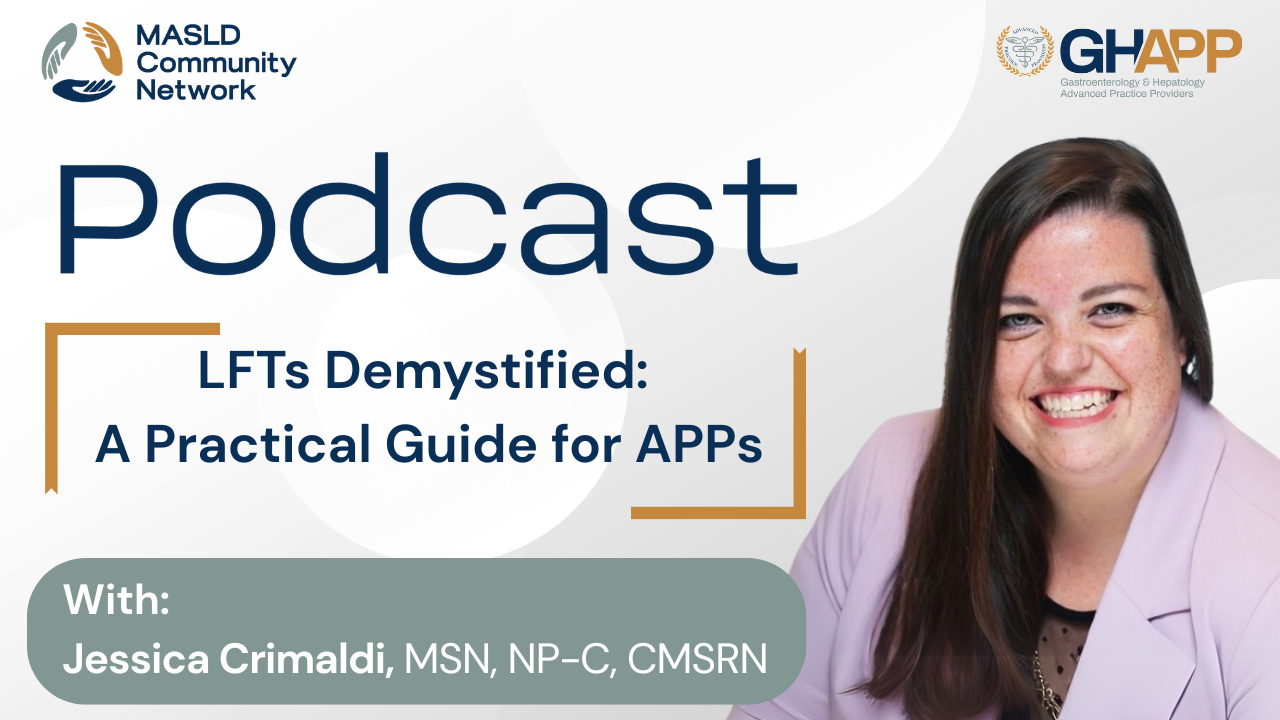
LFTs Demystified: A Practical Guide For APPs

In this GHAPP MASLD Community Network podcast, Jessica Crimaldi, NP, from the Cleveland Clinic, provides practical, real-world insights into interpreting liver function tests (LFTs) in the context of MASLD (metabolic dysfunction-associated steatotic liver disease) and MASH (steatohepatitis). Drawing on over a decade of experience in GI and hepatology, Jessica explains common ALT and AST elevation patterns that should prompt a diagnostic workup, even in asymptomatic patients. She reviews the hepatocellular vs. cholestatic patterns of injury, the value of the R-factor calculator in identifying the likely etiology of liver enzyme abnormalities, and how to differentiate MASH from other liver diseases such as PBC, viral hepatitis, or bile duct obstruction. The episode also addresses key non-liver labs like triglycerides, A1C, and cholesterol, and how they contribute to assessing metabolic risk. Finally, Jessica discusses the role of serial LFT monitoring in evaluating treatment response—highlighting what it means when liver enzyme levels fall and why "normal" LFTs don’t always indicate disease resolution. Whether you're a primary care provider or hepatology specialist, this podcast offers valuable guidance for early detection, risk stratification, and longitudinal monitoring of patients with MASH.
Watch Now
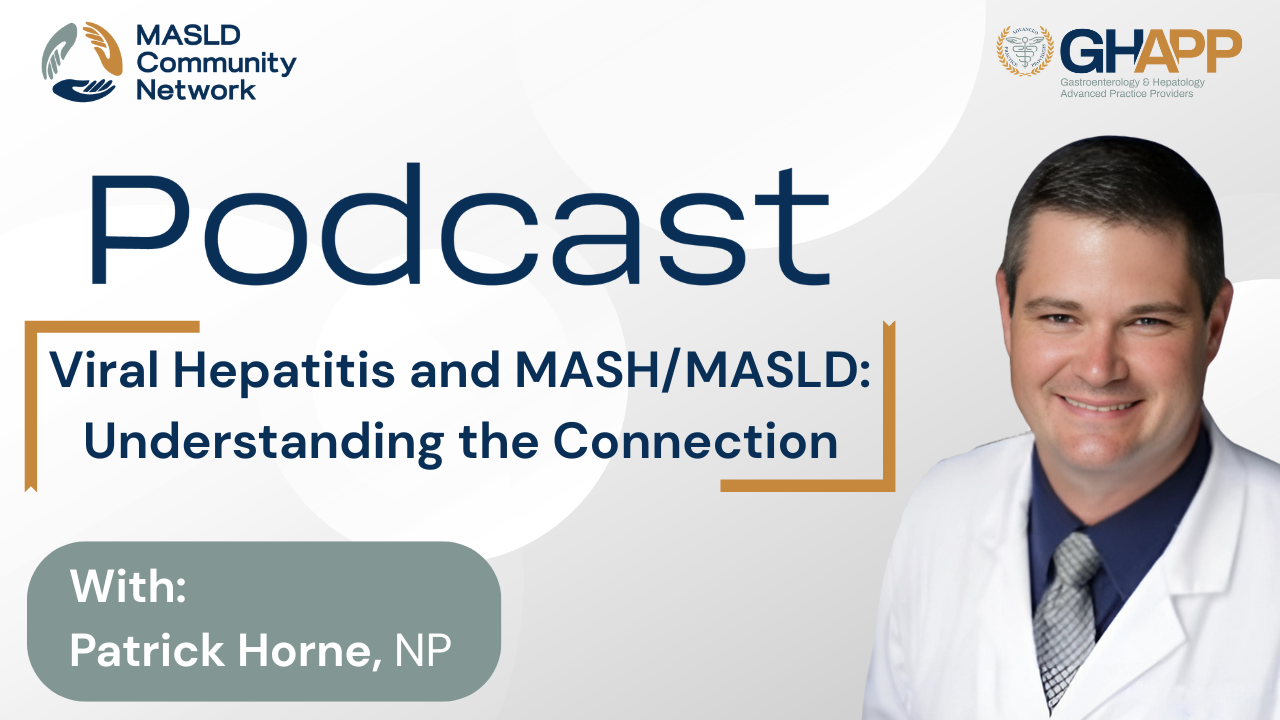
Viral Hepatitis and MASH/MASLD: Understanding the Connection

In this episode, Patrick Horne, NP from the University of Florida, explores the important connection between viral hepatitis and MASLD/MASH (Metabolic Dysfunction–Associated Steatotic Liver Disease/Steatohepatitis). While patients may present with a presumed diagnosis of MASLD or MASH, Patrick emphasizes the critical need to rule out coexisting liver diseases such as hepatitis B and C. The presence of both metabolic and viral liver diseases can significantly accelerate liver inflammation, fibrosis progression, and ultimately cirrhosis—a concept he explains using the “two-hit” or even “three-hit” theory. Patrick walks through the recommended screening protocols, including one-time HCV testing for all adults over 18 and complete HBV panels to assess for immunity, past exposure, and chronic infection. He stresses that treating viral hepatitis—especially with today's highly effective antivirals—can and should occur alongside lifestyle modification strategies for MASLD/MASH. He also discusses how liver stiffness measurements can be skewed by active inflammation and suggests reassessing fibrosis after treating viral hepatitis. This episode is a must-watch for providers managing patients with liver disease, highlighting the need for a comprehensive, layered diagnostic approach.
Watch Now

HCC Surveillance: Implementation in Patients with Advanced Fibrosis/Cirrhosis from MASH

In this expert-led session, Elizabeth Alqueza, PA-C, from Beth Israel Deaconess Medical Center in Boston, discusses the critical importance of hepatocellular carcinoma (HCC) surveillance in patients with steatotic liver disease, including MASLD and MASH. HCC is a leading cause of cancer-related death worldwide, and early detection is vital for improving survival outcomes. Using a real-world case study, Elizabeth highlights risk factors such as obesity, type 2 diabetes, and advanced fibrosis—and underscores the growing role of MASH in HCC development, even in the absence of cirrhosis. She outlines best practices for staging, the importance of early referral to hepatology, and AASLD-recommended surveillance protocols using ultrasound and AFP testing every 6 months. The video also explores systemic barriers to screening and actionable strategies to improve adherence, such as EMR alerts, streamlined imaging protocols, and improved coordination between primary care and hepatology. This presentation is essential viewing for healthcare professionals managing patients with liver disease, offering practical tools to enhance HCC detection and optimize long-term outcomes.
Watch Now

Alcohol and MASLD/MASH: Navigating the Complex Relationship

In this insightful video, Jordan Mayberry, a seasoned physician assistant at UT Southwestern in Dallas, explores the complex intersection of alcohol use and metabolic-associated steatotic liver disease (MASLD), including its progressive form, MASH. With over 12 years of hepatology experience, Jordan breaks down why accurate assessment of alcohol intake is essential—not just for diagnosis but for guiding patient management. Learn how to use motivational interviewing techniques to respectfully screen for alcohol use, quantify intake effectively, and differentiate between MASLD, MASH, and the emerging diagnosis of MetALD (metabolic dysfunction-associated alcoholic liver disease). Jordan also shares practical tips on managing patients with MASH who drink above recommended thresholds, including behavioral interventions, medications like acamprosate, and referral pathways such as SMART Recovery or addiction psychiatry. The video also highlights how ongoing alcohol use can skew liver function tests (LFTs), distort non-invasive testing (NIT) results like FibroScan or MRE, and potentially affect eligibility for future MASH pharmacotherapies. This session is a must-watch for clinicians aiming to provide holistic, evidence-based care to patients navigating the dual challenges of liver disease and alcohol use.
Watch Now

HCC Surveillance: Implementation in Patients with Advanced Fibrosis/Cirrhosis from MASH

In this episode of the GHAPP MASLD Community Network podcast, Lisa Richards, a hepatology-focused nurse practitioner in San Diego, shares expert insights on hepatocellular carcinoma (HCC) surveillance for patients with advanced fibrosis and cirrhosis due to MASH (metabolic dysfunction-associated steatohepatitis). Lisa outlines which patients require routine HCC surveillance, emphasizing the importance of staging—particularly stages F3 and F4—and how AASLD guidelines guide surveillance strategies. She discusses recommended surveillance modalities, including ultrasound with AFP every six months, and introduces the LIRADS visualization score to help interpret imaging quality and follow-up needs. Lisa also addresses practical challenges in implementation, from patient education and engagement to overcoming barriers like cost, transportation, and care coordination. For advanced practice providers (APPs), this podcast delivers clear guidance on what to do when new liver lesions are detected and how to proceed with diagnostic imaging and referrals for multidisciplinary review or intervention. Empower your clinical practice with strategies that promote early detection and improve outcomes in patients at risk of HCC.
Watch Now

LFTs Demystified: A Practical Guide for APPs

In this informative session, Anthony Derencius, PA-C and sub-investigator at Pinnacle Clinical Research, provides a practical and accessible breakdown of liver function tests (LFTs) and liver-associated enzymes, with a focus on their role in diagnosing and monitoring fatty liver disease—including MASLD (metabolic dysfunction-associated steatotic liver disease) and MASH (metabolic-associated steatohepatitis). Drawing from years of experience in both general and transplant hepatology, Anthony explains how to interpret key markers like ALT, AST, alkaline phosphatase, bilirubin, albumin, and GGT. He emphasizes why elevated or even normal LFTs don’t always tell the whole story, and how a full workup—including viral hepatitis panels, autoimmune markers, alcohol-related labs, imaging, and non-invasive fibrosis assessments—can help uncover the root cause of liver injury. This video also walks viewers through when to consider additional tools like FIB-4, ELF score, FibroScan, or even liver biopsy. Whether you're a primary care provider or hepatology specialist, this session will sharpen your ability to distinguish between benign lab variations and signs of serious liver disease, ultimately supporting earlier diagnosis and better outcomes for your patients.
Watch Now

PCP Screening for MASH/MASLD: Identifying At-Risk Patients

In this essential FAQ video, Jennifer Geremia, PA-C, a seasoned gastroenterology provider practicing in Boston, outlines current primary care screening guidelines for identifying patients at risk for metabolic dysfunction-associated steatohepatitis (MASH) and MASLD. With nearly two decades of experience caring for GI and liver patients, Jennifer emphasizes the importance of integrating liver health into routine health maintenance—particularly for individuals with type 2 diabetes, obesity, metabolic syndrome, and related conditions. She reviews practical steps for risk stratification, beginning with FIB-4 scoring using readily available labs, and discusses how to interpret and act on the results, including when to refer for further testing like elastography or ELF testing. Viewers will also gain insight into patient counseling strategies, alcohol intake guidance, and the urgency of acting early—even in asymptomatic patients. This video is a must-watch for primary care clinicians aiming to improve detection and management of MASH and MASLD through evidence-based screening and timely intervention.
Watch Now
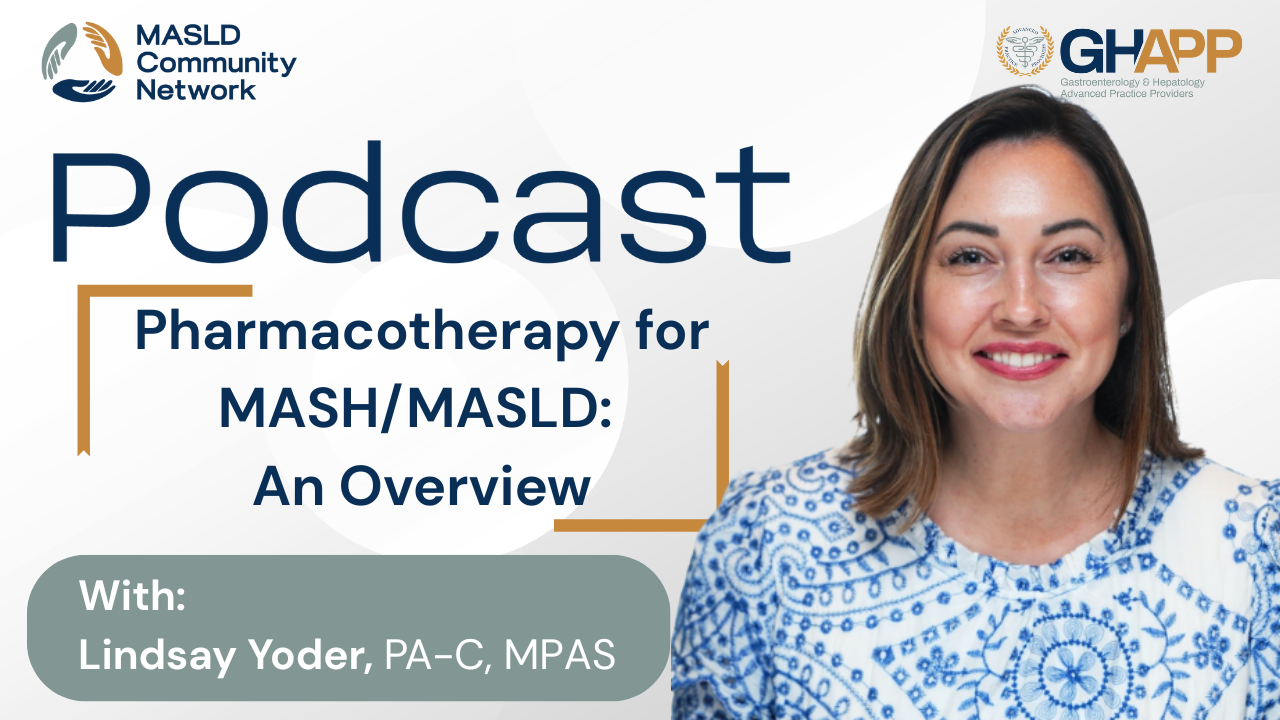
Pharmacotherapy for MASH/MASLD: An Overview

In this informative episode, Lindsay Yoder, PA, a hepatology expert at Indiana University, provides a comprehensive overview of current pharmacotherapy options for MASH (Metabolic Dysfunction–Associated Steatohepatitis), focusing on the first FDA-approved medication, resmetirom (brand name: Rezdiffra). Speaking directly to the MASLD/MASH Community Network, Lindsay breaks down the key histologic endpoints that led to resmetirom’s conditional approval—namely, fibrosis improvement without worsening of steatohepatitis, and MASH resolution without worsening fibrosis. She shares real-world data from clinical trials showing that resmetirom nearly doubles the rate of fibrosis improvement and triples MASH resolution compared to placebo. Lindsay also explains how the drug works: as a thyroid hormone receptor beta agonist, resmetirom improves hepatic lipid metabolism, reduces liver fat, and dampens inflammation—all key drivers of MASH progression. She outlines ideal patient criteria (stage F2–F3 fibrosis without cirrhosis), safety considerations, tolerability, potential side effects, and statin interactions. With an emphasis on combining pharmacotherapy with lifestyle changes, this episode serves as a practical guide for clinicians treating patients with MASH who qualify for advanced intervention.
Watch Now

Discordant NITs, the Gray Zone

Join Lindsay Pratt, PA-C, from the University of Colorado School of Medicine’s Hepatology and Liver Transplant Department, as she unpacks the challenges of interpreting discordant results between non-invasive liver testing tools such as FIB-4 and FibroScan in patients with MASLD and MASH. With over 15 years of clinical experience, Lindsay walks viewers through how age, transaminase levels, platelet count, and patient factors like BMI and fasting status can impact test accuracy and reliability. She emphasizes when to consider advanced diagnostics like MRI elastography (MRE) or liver biopsy, and how to tailor decisions to the individual patient, especially when results don't align. This practical session is ideal for hepatology and GI providers navigating complex liver disease management, and includes tips for communicating test limitations and next steps with patients. Learn how to make informed decisions using non-invasive tests while maintaining patient-centered care in the management of fatty liver disease.
Watch Now
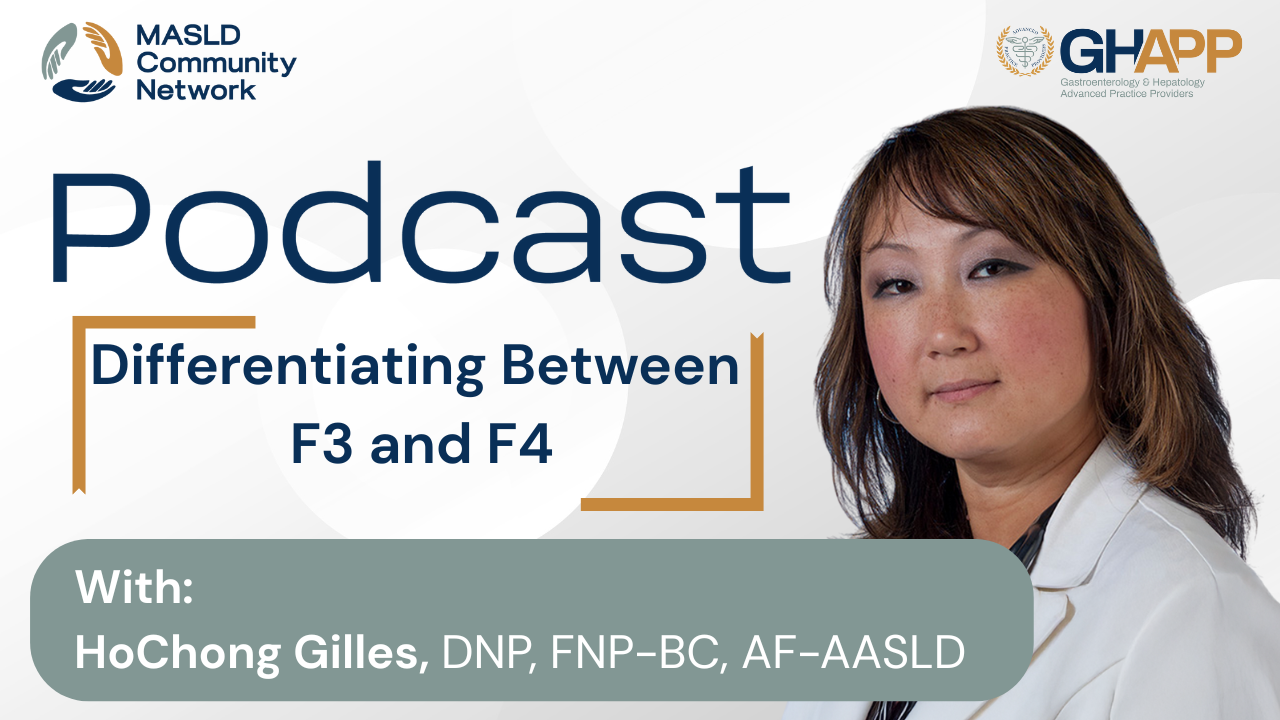
Differentiating Between F3 and F4

In this comprehensive discussion, HoChong Gilles, a nurse practitioner with 25 years of hepatology experience at the Richmond VA Medical Center, explores the critical importance of accurately distinguishing between F3 (advanced fibrosis) and F4 (cirrhosis) in patients with MASH (metabolic-associated steatohepatitis). While both stages carry increased risks of liver-specific and overall mortality, Gilles explains that F3 may still be reversible with lifestyle changes or pharmacotherapy, whereas F4 signals irreversible liver damage with heightened risk of complications like portal hypertension, hepatic encephalopathy, and liver cancer. Viewers will gain a deeper understanding of how non-invasive tests—like FIB-4, ELF, FibroScan, and MRE—perform in identifying fibrosis stage, including their limitations and overlaps. Gilles also outlines when to consider liver biopsy, especially in cases with discordant test results, atypical features, or clinical uncertainty. This video emphasizes how staging accuracy informs eligibility for therapies, surveillance strategies like HCC screening, and overall prognosis. Learn how to approach this nuanced distinction in clinical practice and why F3 vs. F4 isn't just semantics—it's a turning point in patient care.
Watch Now
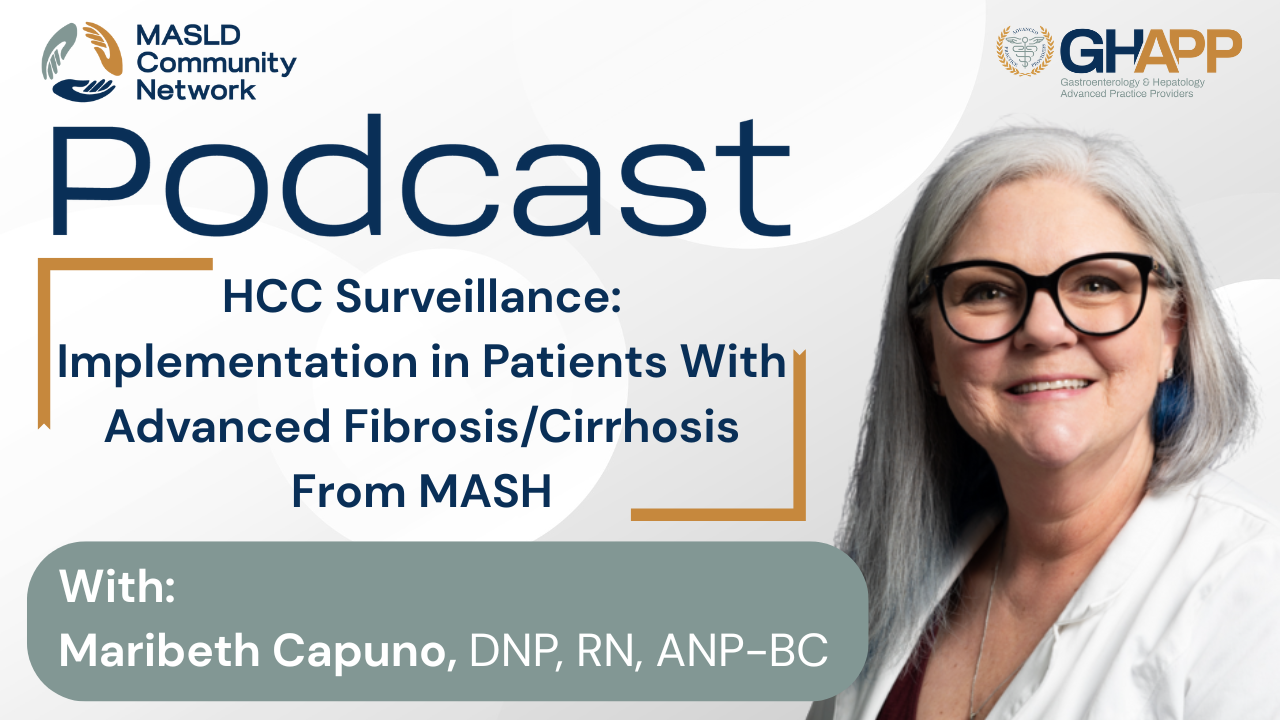
HCC Surveillance: Implementation in Patients With Advanced Fibrosis/Cirrhosis From MASH

Learn when and how to effectively screen for hepatocellular carcinoma (HCC) in patients at risk, especially those with metabolic dysfunction-associated steatotic liver disease (MASLD). In this informative video, Maribeth Capuno, an adult nurse practitioner at the Richmond Veterans Affairs Medical Center, shares her clinical approach to early HCC surveillance. While AASLD guidelines recommend screening only after cirrhosis has been diagnosed, Maribeth highlights the growing evidence that patients with stage 3 fibrosis can still develop liver cancer—and why she begins surveillance earlier. She discusses the recommended tools, including liver ultrasound every six months and alpha-fetoprotein testing, and explores practical workflow tips to ensure patients remain adherent. Learn how imaging modalities like MRI and CT with liver protocol, along with tools like LI-RADS and tumor board consultations, contribute to timely and accurate diagnosis. The video also emphasizes key risk factors—such as obesity, diabetes, viral hepatitis, and lifestyle behaviors—and how managing these can help prevent the progression to HCC.
Watch Now

Addressing Health Disparities: Equity Considerations in MASH/MASLD Care

In this episode, Patrick Horne, NP at the University of Florida (UF Health), explores the impact of health disparities and socioeconomic inequality on the diagnosis and management of MASH (metabolic-associated steatohepatitis) and MASLD (metabolic dysfunction-associated steatotic liver disease). With a focus on rural and underserved populations, Patrick discusses how limited access to quality healthcare, healthy food, exercise options, and non-invasive testing (NITs) like FibroScan or MRI elastography can delay diagnosis and worsen outcomes. He shares practical, empathetic strategies for individualizing care, such as using accessible tools like FIB-4 or APRI, promoting low-cost physical activity like walking or swimming, and providing culturally sensitive nutrition advice tailored to financial and geographic realities. Patrick emphasizes the provider’s role as a patient advocate and coach, helping patients navigate barriers and create sustainable lifestyle modifications. This episode offers key insights for clinicians working to close gaps in care and promote equity in liver disease management.
Watch Now

Pharmacotherapy Review

Join Christina Hanson, FNP-C, from South Denver Gastroenterology, as she provides an in-depth overview of the current pharmacologic treatment landscape for Metabolic Dysfunction-Associated Steatotic Liver Disease (MASLD) and Metabolic Dysfunction-Associated Steatohepatitis (MASH). This expert-led session explores the three cornerstones of MASH management—lifestyle and weight loss interventions, cardiovascular risk reduction, and liver-directed therapy—while highlighting the evolving role of GLP-1 receptor agonists and the recent FDA approval of resmetirom, the first medication indicated for adults with MASH and moderate to advanced fibrosis. Christina also discusses clinical trial data from MAESTRO-NASH, reviews historical agents like vitamin E and pioglitazone, and offers practical guidance on patient selection, safety considerations, and monitoring strategies. Whether you’re a GI provider, hepatology specialist, or primary care clinician managing fatty liver disease, this video provides valuable insights into how emerging therapies are shaping the future of MASH treatment.
Watch Now

Pharmacotherapy for MASH/MASLD: An Overview

In this comprehensive episode, Christina Hanson, FNP-C at South Denver GI, provides an in-depth overview of pharmacotherapy for MASLD and MASH, with a focus on the FDA-approved therapy resmetirom (brand name Rezdiffra). Drawing on over 18 years of experience in hepatology and GI care, Christina explains the histologic endpoints used in clinical trials—MASH resolution and fibrosis improvement without worsening disease—and how they guided the approval of resmetirom. She breaks down the drug’s mechanism of action as a selective thyroid hormone receptor beta (THR-β) agonist, which promotes lipid metabolism and reduces liver inflammation without systemic toxicity. Christina reviews key Phase 3 data from the MAESTRO-NASH trial, showing resmetirom’s significant impact on both MASH resolution and fibrosis regression across diverse patient populations. She also outlines criteria for appropriate patient selection (those with stage F2-F3 fibrosis), clinical monitoring strategies, and management of side effects like transient GI discomfort. Christina emphasizes the importance of baseline screening for liver disease, autoimmune conditions, thyroid function, and lipid levels before initiating therapy. She highlights best practices from the 2024 AASLD guidelines for ongoing monitoring and treatment response assessment, including ALT and liver stiffness thresholds that help determine whether to continue or discontinue therapy. This episode is a must-watch for hepatology clinicians looking to implement evidence-based, patient-centered strategies in the management of MASH.
Watch Now
Latest News & Blogs
Evaluation of a novel albumin platelet product (APP) fibrosis index and three non-invasive fibrosis indices in metabolic dysfunction-associated steatotic liver disease

CONCLUSION: APP outperformed FIB4 in detecting cirrhosis or advanced fibrosis among patients with DM and was comparable in non-DM patients. Revised FIB-4 thresholds may be needed in MASLD/MASH patients with DM to improve its diagnostic accuracy.
Read More
Inhibiting peripheral serotonin activates liver AMPK and reduces monocyte-derived macrophages and fibrosis

Monocyte-derived liver macrophages are critical in the pathogenesis of metabolic dysfunction-associated steatohepatitis (MASH) and liver fibrosis, but their recruitment mechanisms remain unclear. Serotonin (5-hydroxytryptamine [5HT]) is a conserved monoamine synthesized by tryptophan hydroxylase 1 (Tph1) in peripheral tissues and Tph2 in the brain. We show that, in mice housed at thermoneutrality and fed a high-fat, high-fructose diet, inhibition of peripheral serotonin (pe5HT) through genetic...
Read More
Tetrahedral Framework Nucleic Acid-Based Delivery of miR-34a Inhibitor for the Treatment of Metabolic Dysfunction-Associated Steatohepatitis

Metabolic dysfunction-associated steatohepatitis (MASH), a metabolic liver disorder with severe complications, features hepatic inflammation and oxidative stress. MiR-34a dysregulation is a critical contributor to MASH progression, making it a promising therapeutic target. However, clinical translation of miR-34a-targeted interventions remains limited by poor stability and cellular uptake. Here, we developed a miRNA-binding tetrahedral framework nucleic acids (TDN)-based system, termed Tm to...
Read More
Clinical trial: A Phase 2 Randomised Platform Study to Assess Monotherapy and Combination Treatment Regimens in Metabolic Dysfunction-Associated Steatohepatitis

CONCLUSIONS: LYS006 20 mg bid monotherapy and LYS006 20 mg bid+tropifexor 200 μg qd therapy were well tolerated with the exception of a high frequency of pruritus in the combination arm, consistent with the now known pharmacologic effect of farnesoid X receptor agonists. The greater reductions in ALT and liver fat in the combination arm versus monotherapy arm were similar to those observed with tropifexor as monotherapy in a previously reported phase 2 clinical trial, and clear additional...
Read More
Novel Aurone Derivative Ameliorates MASH Lipid Metabolism via the AMPK-ACC-PPARalpha Axis

Metabolic dysfunction-associated steatohepatitis (MASH), a progressive form of metabolic dysfunction-associated fatty liver disease (MASLD), is characterized by disrupted lipid metabolism and persistent inflammation, which can lead to cirrhosis and hepatocellular carcinoma. The novel pan-peroxisome proliferator-activated receptor (PPAR) agonist 1d has been previously shown to alleviate insulin resistance and hepatic steatosis in type 2 diabetic (T2DM) mice; however, its mechanism of action...
Read More
Farnesoid X Receptor Agonist INT-787 Inhibits Hepatic Mitochondrial Dysfunction in a Diet-Induced ob/ob Mouse Model of MASH

This study evaluated the protective role of farnesoid-X-receptor (FXR) agonist INT-787 in the control of mitochondrial changes using a metabolic dysfunction-associated steatohepatitis (MASH) model. Lep-ob/ob mice were fed a control diet (CD) for 21 weeks (wks), or a high-fat diet (HFD) for 9 or 21 wks; in the 21 wk HFD groups, INT-787 (30 mg/kg/day) dosed via HFD admixture was added. The hepatic ATP, ROS, GSH and MIC19, which stabilizes the structure of inner mitochondrial membrane (IMM), were...
Read More
Low-Abundance Proteomics Reveal Pleiotrophin and Fibroblast Growth Factor-21 as Biomarkers of Metabolic Dysfunction-Associated Steatohepatitis

Metabolic dysfunction-associated steatotic liver disease (MASLD) is closely linked to comorbidities like obesity, type 2 diabetes, and cardiovascular disease. Given that liver biopsy is the diagnostic gold standard, there is a critical need for minimally invasive tests, particularly for the inflammatory form, metabolic dysfunction-associated steatohepatitis (MASH). In this discovery study, we investigated the plasma proteome to identify blood biomarkers for MASH and explored their potential...
Read More
Improvement of Liver Fibrosis in Patients with MASLD Undergoing Pioglitazone Treatment: An Update

Metabolic dysfunction-associated steatotic liver disease (MASLD) is defined as steatotic liver disease with at least one cardiometabolic risk factor, in the absence of harmful alcohol intake, and includes a spectrum of conditions. These range from isolated liver steatosis to metabolic dysfunction-associated steatohepatitis (MASH), fibrosis, cirrhosis, and MASH-related hepatocellular carcinoma. Patients with MASLD and type 2 diabetes are at increased risk of developing MASH and...
Read More
Plasma Extracellular Vesicles Contain Protein Biomarkers for Capturing Stages of Metabolic Dysfunction-Associated Steatotic Liver Disease: A Preliminary Exploratory Study

Metabolic dysfunction-associated steatotic liver disease (MASLD) is increasing in both prevalence and severity, highlighting the need for non-invasive biomarkers to assess disease activity. Extracellular vesicles (EVs), which carry molecular cargo from their cells of origin, hold promise as accessible biomarkers. We performed proteomic profiling of plasma-derived EVs from 70 patients with MASLD to identify protein signatures associated with key histological features (steatosis, metabolic...
Read More
Ginsenoside Rg2 ameliorates metabolic dysfunction-related steatohepatitis via the Nrf2 pathway by suppressing inflammation, apoptosis, oxidative stress and fibrosis

CONCLUSION: This study is the first to confirm that G-Rg2 binds to and regulates Nrf2, and further illustrates that it alleviates MASH by activating the NRF2 signaling pathway to inhibit inflammation, cell apoptosis, oxidative stress, and fibrosis. This establishes a conceptual foundation for the future use of G-Rg2 in MASH treatment and supports the development of natural product-based therapeutic strategies derived from dietary sources.
Read More
Aberrant lipid metabolism renders an aggressive behavior of T-lymphoblastic lymphoma in a MASH model

Liver involvement of lymphomas is not rare in clinical patients. Metabolic dysfunction-associated steatohepatitis (MASH, formerly known as nonalcoholic steatohepatitis) is well accepted as a potential precursor for liver cancer, but it is unknown whether MASH could promote extranodal infiltration of lymphoma. In this study, the subpopulation of tumor-initiating cells and Wnt signaling pathway activation were studied in T-lymphoblastic lymphoma cells. Tumor growth, Wnt/β-catenin signaling, and...
Read More
Intracellular IL-24 ameliorates lipid metabolic disorders in metabolic dysfunction-associated steatohepatitis by restoring the autophagy-lysosome pathway

CONCLUSION: IL-24 preferentially utilizes the IL-22R1/IL-20R2 receptor complex to modulate the AMPK/mTOR/TFEB axis, thereby inducing autophagic-lysosomal activation, regulating glucose and lipid metabolism, and ameliorating hepatic lipid accumulation in MASH. These findings highlight IL-24 as a novel therapeutic target for MASH.
Read More
The impact of semaglutide on liver outcomes in patients with or at risk of MASH: a dose and duration response meta-analysis of randomized trials

CONCLUSION: Semaglutide represents a promising pharmacotherapeutic option for MASH, demonstrating significant improvements in histologic resolution, liver injury biomarkers, and metabolic parameters, particularly at higher doses and longer intervention durations, though its effect on fibrosis regression remains limited.
Read More
Emerging Perspectives in the Diagnosis and Management of Metabolic Dysfunction-Associated Steatotic Liver Disease (MASLD): A Narrative Review

Metabolic dysfunction-associated steatotic liver disease (MASLD, previously known as non-alcoholic fatty liver disease (NAFLD)) has emerged as the most prevalent chronic liver condition, affecting approximately 25% of the global population. The disease encompasses a spectrum ranging from simple steatosis to metabolic dysfunction-associated steatohepatitis (MASH, previously known as non-alcoholic fatty liver disease (NASH)), fibrosis, cirrhosis, and hepatocellular carcinoma (HCC). Despite its...
Read More
Spatially resolved multi-omics of human metabolic dysfunction-associated steatotic liver disease

Metabolic dysfunction-associated steatotic liver disease (MASLD) is a leading cause of chronic liver disease worldwide. We generated single-cell and spatial transcriptomic and metabolomic maps from 61 human livers, including controls (n = 10), metabolic dysfunction-associated steatotic liver (MASL) (n = 17) and metabolic dysfunction-associated steatohepatitis (MASH) (n = 34). We identified microphthalmia-associated transcription factor (MITF) as a key regulator of the lipid-handling capacity of...
Read More
Impact of Model for End-stage Liver Disease 3.0 on Waitlist Outcomes of Metabolic Dysfunction-associated Steatohepatitis Cirrhosis Among Liver Transplant Candidates

CONCLUSIONS: Although MELD 3.0 reclassifies a substantial proportion of patients with MASH-particularly women-it does not appear to increase transplant access despite higher predicted mortality risk. These findings highlight residual gaps in how MELD 3.0 captures clinical risk in MASH cirrhosis and underscore the need for prospective data following its implementation.
Read More
Semaglutide from Bench to Bedside: The Experimental Journey Towards a Transformative Therapy for Diabetes, Obesity and Metabolic Liver Disorders

CONCLUSIONS: The trajectory of semaglutide exemplifies how intentional peptide design, iterative translational research, and outcome-driven clinical trial design can lead to groundbreaking therapies for complex metabolic disorders.
Read More
Involvement of Activin E depletion in metabolic dysfunction-associated steatohepatitis

Activin E is a liver-derived hepatokine belonging to the transforming growth factor-β superfamily, and it promotes energy expenditure by activating brown and beige adipocytes. Activin E also possesses anti-lipolytic activity. When Activin E knockout (KO) mice are fed a high-fat diet, energy storage in adipose tissue is impaired, leading to ectopic fat accumulation in the liver. In this study, we investigated the involvement of Activin E depletion in metabolic dysfunction-associated...
Read More
Tank-Binding Kinase 1 protects against MASH progression via mitochondrial quality control

Mitochondrial dysfunction is a critical driver of metabolic dysfunction-associated steatotic liver disease (MASLD) progression to steatohepatitis (MASH), yet the mechanisms governing mitochondrial quality control in hepatocytes remain poorly defined. Here, we identify TANK-binding kinase 1 (TBK1) as an essential regulator of hepatic mitophagy and lysosomal activity. Using TBK1-deficient hepatocytes and liver-specific TBK1 knockout (LTKO) mice, we show that TBK1 loss leads to the accumulation of...
Read More
MicroRNA-21 is a potential therapeutic agent targeting Tgfbi and mitigating high-fat-diet-induced liver disease and cancer

Liver disease, including hepatocellular carcinoma (HCC), is a major global health concern, claiming approximately 2 million lives worldwide annually, yet curative treatments remain elusive. In this study, we aimed to investigate the role of microRNA-21-5p (miR-21) in metabolic-dysfunction-associated steatotic liver disease (MASLD), metabolic-associated steatohepatitis (MASH), and HCC within the context of a Western choline-deficient (CD) high-fat diet (HFD) and offer potential therapeutic...
Read More
Testimonial







